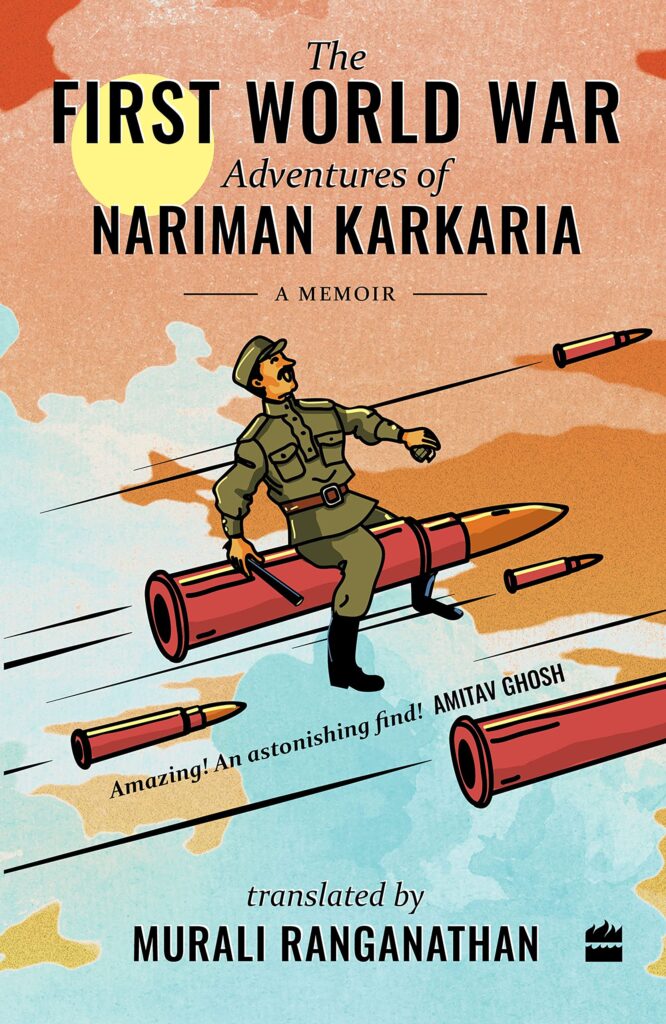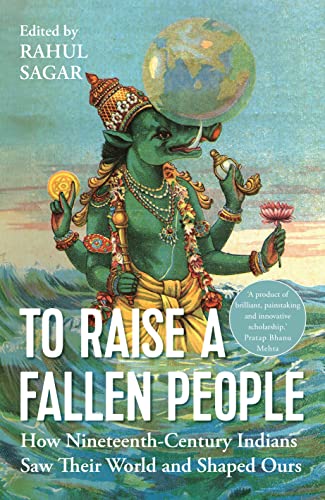ARCHIVE
The Battle of the Somme
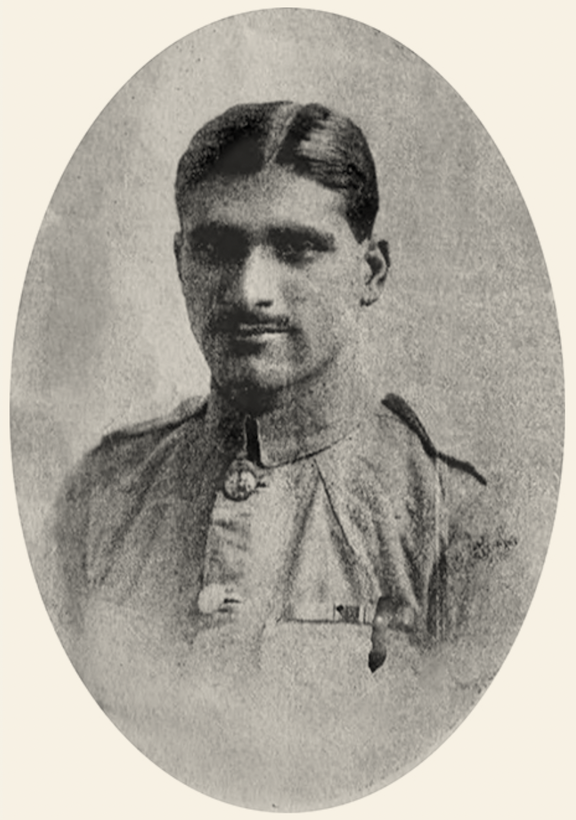
Nariman Karkaria
At last, it was our turn to see action, something we had been waiting for with our eyes peeled. Some of the soldiers were very eager to see the Germans in person and flaunt their muscle power, while quite a few were most distressed by the orders to advance forward to the front lines. We were to participate in the Battle of the Somme, which has already achieved legendary status in the Great War.
The Role of the Indian Army
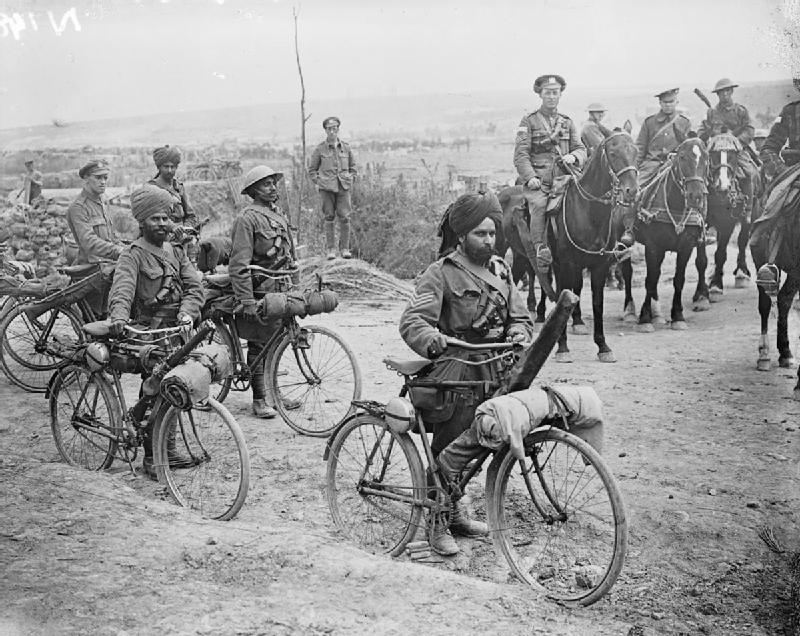
Indian bicycle troops at a crossroads on the Fricourt-Mametz Road, Somme, France. Dated July 1916. From the collection of Imperial War Museums, London.
The Indian Army also took part in the Battle of the Somme.
The Bengal Lancers advanced under heavy fire from the Germans right up to the German trenches and forced them to retreat. On this occasion, our platoon was ordered to advance to the firing line. Our undercover march started at about one o’clock in the night. We had been strictly warned not to utter a single word. With great difficulty, we managed to advance, digging a few trenches and walking all through the night, only to find ourselves in a very unfortunate position in the morning. A German observation balloon which had been flying above us had spotted us, and very soon our route came under heavy fire. Shells were exploding all around us. To escape them, we would lie flat on the ground for a short while before running to advance a little forward. A wave of fear rippled through our platoon. Soldiers were falling all around us with piteous shrieks, but there was nothing that could be done. Each man was on his own and could not be bothered about anybody else. Others would advance by stepping on those injured soldiers who had fallen to the ground. We had no option but to move forward. We also had no idea what kinds of difficulties we were to face as we advanced. Many of our men were lagging behind, but we could not wait for them, and at about twelve noon we reached the famous jungles of Del Ville Wood where we felt we could finally heave a sigh of relief. But fate had other things in store for us. There were no trenches beyond the next twenty-five yards from where we were located. We could not step out of the trenches as we would have been sitting ducks for German guns. The Germans were hardly at any distance from where we were—say about a hundred yards away in their trenches. In spite of this situation, the Commanding Officer gave orders to advance further. We had no option but to run, and we ran in pairs. We would advance about ten steps before throwing ourselves flat on the ground. Our progress did not last very long. Soon enough, the enemy started firing at us with their machine guns.
We were staring death in the eye. But as luck would have it, there had been a fierce battle on this very site just four days ago, and the bodies of dead soldiers were lying all around us. These corpses proved very useful in sheltering us from the enemy gunfire. As we advanced, we would lie behind these corpses, and they would act as our shield taking all the gunfire. Ah, what a terrible experience! Just one bullet and we would also have joined the army of cold corpses!
War in the Skies
After a very desperate battle and the loss of over fifty soldiers, we were lucky enough to be able to take possession of the trenches. Because of the non-stop action during the night and the better part of the day, we had not even had a cup of tea, much less anything to eat. I had managed to eat a couple of biscuits while moving forward. This was all I had had, with which I had to be content for the whole day. Once we took possession of the trenches, the different companies of the platoon were immediately assigned positions. While the A and C Companies were assigned the forward trenches, the B Company was assigned the communication line, which was about ten yards behind us, and the D Company was a further fifteen yards behind them in the support line. We were immediately ordered to make structural improvements in the trenches, which meant more digging. These trenches were not deep enough for a man to stand erect. The soldiers were tired of standing with their backs bent for extended lengths of time. The trenches were also rather narrow and we could hardly move around in them. We began using our small shovels and spades, and started digging at a steady pace, making as little noise as possible. We had hardly started digging when the sky above us was criss-crossed by enemy planes. They had been sent to monitor our progress and signal our position. Soon enough, our lines were bombarded by their artillery positions and we had to suspend our digging operations. Before we go further ahead with our story, let us take a look at the role of these aeroplanes in the war.
These aerial barques would fly high over enemy camps and their trenches, and photograph our positions to determine where the enemy was concentrated and how their lines were positioned. They would then go back and relay all the information to the base. They were, however, most deadly when they worked in conjunction with the artillery. These planes would be assigned to specific batteries; during an assault, these planes would hover above the enemy lines and relay back information on where the shells were landing. If the shells were landing at too short or too long a distance from the enemy trenches, they would immediately ask the battery to adjust its range. If they spotted a shell that had landed at the right place, they would immediately signal a ‘repeat fire’ to completely pulverize the position. Sometimes they would come in huge numbers and we would be carpeted with aerial fire. These aerial barques completely terrorized everybody in the trenches. The minute they appeared above us, we would be ordered to remain as still as possible. If we froze in our positions, it was possible that they might not spot us.
These planes were also mounted with machine guns that would merrily go ‘Bang! Bang!’ and wreak havoc on those below. Occasionally, planes from both the sides would engage each other in the skies, and this was indeed a sight to behold.
To contain these demons of the skies, a different kind of specially designed artillery known as ‘anti-aircraft guns’ would be deployed. They would keep up a relentless fire on the planes from the minute they were spotted.
Storm on a Dark Night
This being our first day in the firing-line trenches, all the soldiers were not assigned specific duties. Some of them were free while others were stationed at specific locations on sentry duty in batches. As these trenches were not deep enough for the soldiers to stand erect and peep over them to monitor the enemy’s movements, a special glass contraption was designed, which could be attached to the tip of the bayonet of one’s gun. This helped the sentry sit down and monitor the space between our trenches and those of the enemy. At short intervals, they would slightly raise their guns very carefully, and peep into the glass and see if there were any enemy advances. Every so often, German snipers would shoot at the bayonets of these soldiers with perfect aim. These German snipers were a real nuisance. At night, snipers from both sides would emerge from the trenches and shoot at the slightest movement. Besides these man-made miseries, we also had to face the fury of nature. In addition to the relentless noise of heavy guns firing through the dark night, we had to brave the most frightful thunder accompanied by incessant rain. It would rain all through the night and the trenches would be flooded. We would be standing in chest-deep water, wondering when the enemy would mount a surprise attack. Even as our boots and clothes were weighed down by the squelching mud and water, our officers would keep braying at us: ‘Beware! The enemy might attack!’ Buffeted from all sides and terrorized by the incessant guns, there were many soldiers who felt it would be far better to emerge from the trenches and take a chance with the enemy gunfire. There were others who were so paralysed by fear that they would appear almost insane and would not stir from their positions. Even if they had to answer nature’s call, they would be unable to take a single step. They would just dig a shallow hole right where they were and do their dirty business. In spite of their paralysis, they were somehow drafted to do some work by the booming orders of the officers. As mentioned earlier, the front line was manned by batches, each batch consisting of one sentry and five soldiers, with a non-commissioned officer in charge of them. They were responsible for holding the front line, and each soldier had to be on strict lookout for one hour at a time. A Lewis gun or a machine gun would be placed between every three batches. If the sentry felt that the enemy was trying to make an advance or if there was the slightest movement detected in the enemy lines, the guns would start firing. These Lewis guns played a very important role in this devastating war. These lightweight guns weighed only twenty-nine pounds and could be easily handled by one man who could move it from place to place, and when ordered, start firing at the rate of four hundred bullets per minute. Each of these guns was equivalent to a hundred rifles. We always had to be prepared at the firing line with all these arrangements.
Tear-Inducing Chilli Bombs
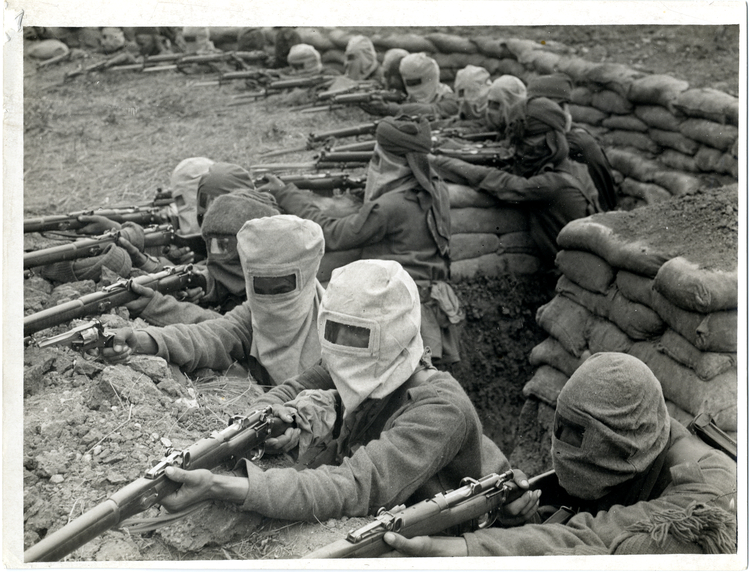
Indian infantry in the trenches, prepared against a gas attack [Fauquissart, France]. Dated 9th August, 1915. From the HD Girdwood collection, British Library.
After spending a miserable night in the trenches, we were shivering in our wet clothes in the morning. Suddenly we were ordered to ‘Stand to!’ Now what was this for? Even as we were wondering what it was all about, a gas that felt like chillies began pervading the trenches. Shrill orders to wear our goggles were urgently issued.
When the gas first attacked us, we could hardly understand what was happening. The gas began to envelop us from every direction and gas shells lobbed from the enemy lines were silently exploding all around us. Our eyes were in a state of extreme irritation. It felt as if they would burst.
We could hardly see anything; tears were flowing freely from our eyes, and it felt dark and terrifying. In spite of all this, everybody got into fighting position, facing the enemy lines and waiting for the inevitable attack. It was generally understood that the enemy released this gas just before it launched an attack. It rendered our soldiers blind and immobile for a brief while, and during this period, they could get the better of us and wrest our trenches. We could hardly open our eyes since the chilli gas had caused our eyes to turn red and swell up. How was a soldier to fight under such adverse circumstances? Along with this chilli gas, regular artillery fire was also kept up by the enemy, which further exacerbated the situation. To combat the nuisance of these ‘tear shells’ and to protect the eyes, a special kind of protective spectacles had been designed. They were made of ordinary glass through which everything could be seen, and the frame was fringed with flannel which ensured that the gas did not make contact with the eyes. The only saving grace was that exposure to tear gas, unlike poison gas, was not fatal; it merely left you blind for a short while.
On a Starvation Diet
Besides all the problems described above, we had yet another major problem to contend with: how to silence our hunger pangs. Soldiers on the firing line had to remain awake day and night and had no chance to lie down. To make matters worse, they had to scrounge for food. Admittedly, there was a lot of food dumped beyond the support lines as the motor transport guys would weave through the heaviest artillery fire to supply the food. Transporting the food from the dump to the firing lines was a major challenge for the soldiers. They would step out in large numbers to bring the food stuffed in small gunny bags back from the dump to the front line. The extreme conditions in the trenches, what with them being flooded with rainwater and slush, and the incessant firing of the enemy many a time prevented them from returning safely. They would be injured and fall down en route, and the food would also lie rotting there. The situation at the firing line was indeed desperate. The D Company had been assigned the support line and was responsible for supplying us with food, but as they came under heavy fire, they could not venture out of their trenches. Even though we were at the very front, the lines immediately to our rear suffered the most, bearing the brunt of the artillery fire. At least fifteen to twenty men from one company would get injured every day, and the condition of the injured was indeed very pitiable. How was food to reach us under this situation? We had to subsist on the few packets of biscuits and bully beef we had carried with us. Where was the question of getting a hot cup of tea? Not a single wisp of smoke was supposed to escape from the trenches. If the enemy spotted smoke coming from a trench, they would consider it to be a live target and fire immediately. The poor soldiers would go scrounging around for cigarette stubs.
Such was the dire situation at the front lines—starvation, mud and slush—and the relentless artillery fire had so harassed the soldiers that they were a pathetic sight to behold.
They had not shaved for days. How do you think they looked? It is best left to the imagination!
Our Final Assault
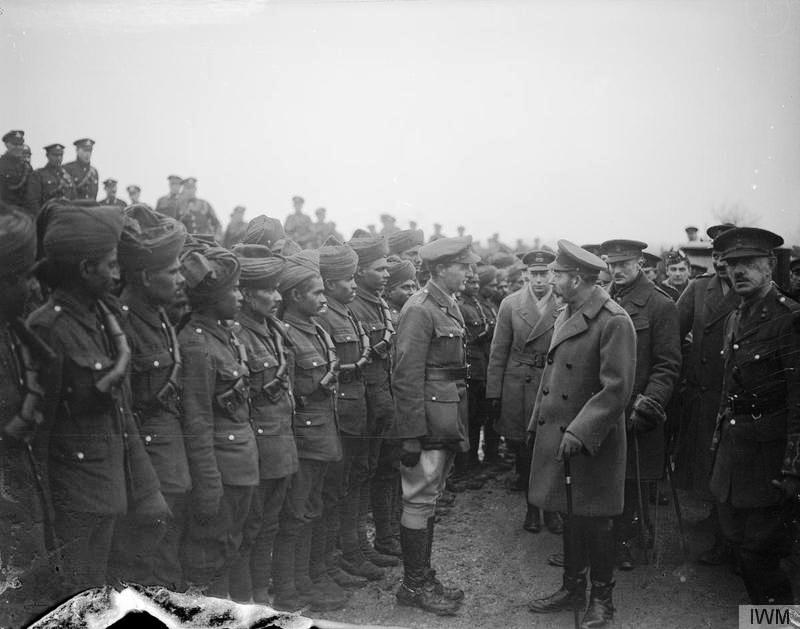
King George V inspecting Indian troops attached to the Royal Garrison Artillery, at Le Cateau on 2 December 1918. Imperial War Museums, London.
This was to be our last day at the famous Del Ville Wood. After many days of suffering and troubles, would it be too much to say that our imminent relief seemed like a new lease of life to us? Early in the morning, the news had already spread in the trenches that we were to be relieved tonight; our faces were aglow with delight. Just after noon, more authoritative news reached us, which was slightly different. We were indeed to be relieved, but we would have to perform some more arduous tasks tonight; the soldiers welcomed this news as a means of getting out of the trenches. All of us had been eagerly looking forward to being relieved for many days. Instead of spending yet another day in the slushy trenches, it was more preferable to emerge from them and show our courage in hand-to-hand combat. As per the orders issued to us, we were to launch our attack at ten in the night. Two companies were to lead the attack while the other two companies were to support us in the assault, and the trenches which we were to evacuate were to be occupied by the 4th Suffolk Regiment. All preparations had been made for a full-on artillery assault at the same time. Some of the soldiers were eagerly looking forward to the hour of the assault, while the colour had drained out of the faces of others. This supposedly minor assault was sure to claim the lives of many soldiers, but nobody knew who it would be. As things turned out, luck was on our side on this dark and evil night. It was pitch dark and the rain was falling steadily, and the roads were so slushy that they were of a porridge-like consistency. The enemy might have felt that there was very little likelihood of an attack from us in such awful weather. Our strategy was to attack under the cover of bad weather. Every minute seemed like an hour. As we waited, we could hear our hearts beating within our chests. After a seemingly eternal wait, it was finally the dark hour when we were to launch our attack. Just as orders were barked out to get us ready for the final assault, a volley of artillery fire passed over our heads towards the enemy lines. Within the blink of an eye, the Germans returned fire. Hundreds of shells were exploding loudly all around us. Their smoke darkened the skies, and we were already so scared that any enthusiasm we might have had for escaping from the trenches evaporated. Before we could think any further, orders were screamed out: ‘Over the top! Best to luck!’ The minute we heard the orders, we jumped out of the trenches and emerged into the open. We could soon hear the plaintive screams of our fellow soldiers, many of whom had fallen victim to the fire from the mortars and the machine guns. The rest of us braves, mindless of the fate of our colleagues, kept advancing. Lying flat on the ground, we crawled for over an hour and were lucky enough to finally make it to the enemy front lines. We then lobbed small bombs into their trenches and soon jumped into the trenches for a face-to-face duel. At this stage, many soldiers lost their lives to close-range enemy bullets, while some were bayoneted to death. We were able to take ten prisoners and capture one machine gun. We were about to turn back but heavy enemy artillery fire prevented us from doing so.
This was the heaviest bombardment I had ever seen, with thousands of shells exploding simultaneously all around us.
Because of the rain, mud and slush, our clothes felt like they weighed a ton. Dragging all this paraphernalia with us, a few of us were lucky enough to get back to our lines. Even as we were luxuriating in our good fortune, Lady Luck finally deserted us. A heavy shell landed just ten yards from where we were and exploded very loudly; we tried to jump away from it, but were not lucky enough to escape without being hit. I was also hit by a fragment. Even though I jumped as quickly as I could into a trench, my leg was injured in a gruesome manner. This had to happen just on the very last day when we were about to be relieved from trench duty. When fate turns against you, there is nothing you can do!
Adding Insult to Injury
Like me, there were hundreds of injured soldiers moaning and lying unattended in the trenches.
There was nobody to listen to our groans or pay any attention to us. Our troubles were just starting. If you managed to reach the dressing station, your troubles could come to an end. But in this bloody battle, it seemed like an impossibility. It was routine for hundreds of soldiers to get injured every day, and each platoon had its own stretcher-bearers who were supported by men from the Royal Army Medical Corps. For this assault, special working parties had also been formed. The firing and the destruction was, however, so severe that all these arrangements came to nought. Unlucky soldiers with stomach or leg injuries would frequently die a painful death in the trenches. If an injured soldier managed to drag himself away from the action, he stood a better chance of survival. Once you reached the dressing station, you would be one among thousands of injured soldiers crying for medical attention. The best possible care was given to them. There would be trolleys and vehicles from the Ambulance Corps to take them to the casualty clearing station. Once you reached this location, you could safely assume that your troubles had come to an end. All it needed was a cup of hot tea to make the injured soldier feel much better. After the seemingly endless days of nightmarish existence starving in the trenches, a cup of tea and the ministrations of female nurses felt like heaven. And then it was ‘Back for Blighty!’
This excerpt has been reproduced in arrangement with Harper Collins Publishers India Private Limited from the book The First World War Adventures of Nariman Karkaria: A Memoir written by Nariman Karkaria and translated by Murali Ranganathan. All rights reserved. Unauthorised copying is strictly prohibited. You can buy the book here.
ARCHIVE
Hinduism: Major Schools other than Bhakti
On a first view the continuing coexistence of Hinduism and Islam seems to be the most significant aspect of religious life in Mughal India. This very observation, however, tends to obscure the fact that Hinduism and Islam were not religions in the same sense. In his remarkable work on the religions of the world, the anonymous author of the Dabistan (written, c.1653), notes that “among the Hindus there are numerous religions, and countless faiths and customs.” In other words, while “Hindu” was the appellation of an Indian who was not a Muslim, it was yet difficult to speak of Hinduism as a single body of doctrine in the same sense as one could speak of Islam or, indeed, of the Semitic religions in general. It was equally true, however, that, having developed in mutual interaction and expressed in a large part in the same language (Sanskrit), the different sects of Hinduism yet shared the same idiom and even the same or similar deities. Written sixty years earlier, Abu’l Fazl’s A’in-i Akbarī (1595) precedes the Dabistan in giving us a very detailed and comprehensive description of Hindu beliefs.
On a first view the continuing coexistence of Hinduism and Islam seems to be the most significant aspect of religious life in Mughal India. This very observation, however, tends to obscure the fact that Hinduism and Islam were not religions in the same sense.
The Mughal period witnessed a continuing assertion in Brahmanical texts of almost all the basic elements of Higher or Orthodox Hinduism that the Ain-i Akbarī and the Dabistan outline. There was a notable exposition of Mimamsa in Narayana Bhatta’s Manameyodaya (c.1600). The school upheld the automatic functioning of the system of transmigration of souls in life-cycles, the station in each life being the result of deeds (karma) in the previous cycles. The author of the Dabistan makes the interesting observation that the “common belief” among the Hindus was that though there was one Creator, the created beings in their lives remained bound by the influence of their own deeds. The emphasis on karma was now the key to dharma, or prescribed conduct of the smriti schools. In this field the traditional doctrine continued to be reasserted in digests, commentaries and elaborations. Vachaspati (c.1510) wrote the Vivädachintamani in Mithila (Bihar). In Bengal, c.1567, Raghunandana of Navadvip wrote his twenty-eight treatises, the Smrititattva, which became an authority on ritual and inheritance. The Nirnayasindhu of Kamalakara Bhatta (1612), which cites Raghunandana as an authority, in turn, obtained legal and religious authority in Maharashtra. An encyclopedic legal work, the Viramitrodaya was compiled by Mitra Mishra under the patronage of Bir Singh, a leading noble of Emperor Jahangir (1605-27).
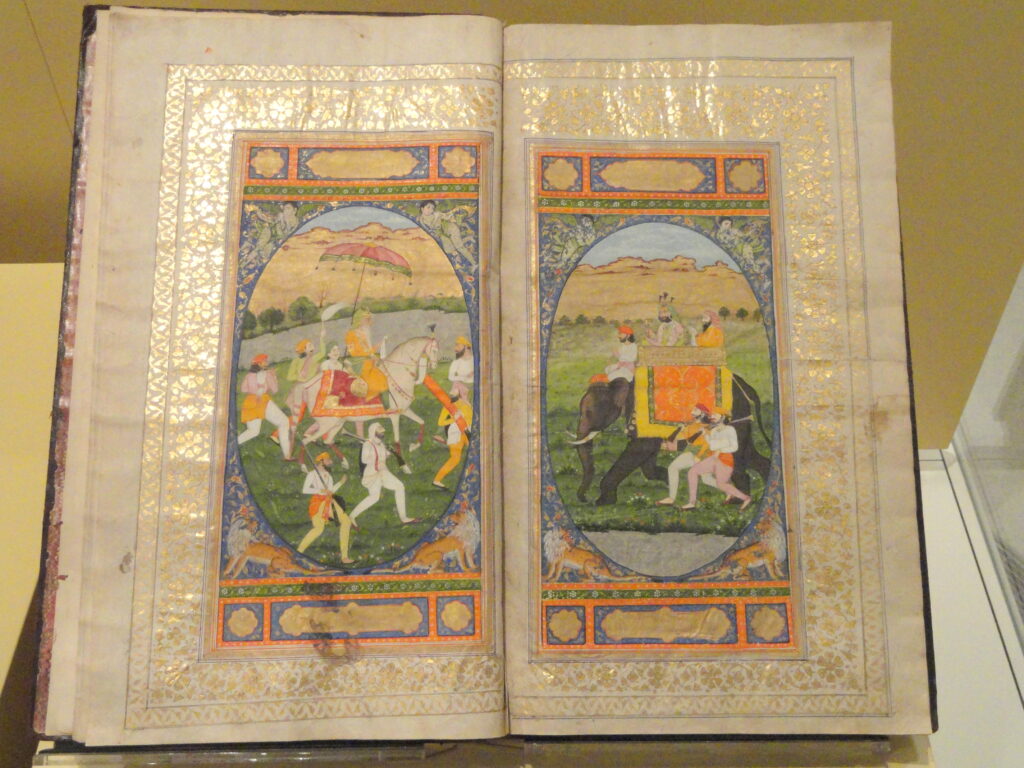
Ain-i-Akbari
![]() These works did not generally make any noteworthy deviations from positions adopted in respect of the supremacy of the Brahmans and the caste-rules as defined by the earlier Smritis. If anything, they repeated and elaborated the restrictions imposed on the lower castes and women. Raghunandana went so far as to declare that the Brahmanas were the only ‘twice-born’ left, since, according to him, the Kshatriyas and Vaishyas had by now fallen among the ranks of the Shudras!
These works did not generally make any noteworthy deviations from positions adopted in respect of the supremacy of the Brahmans and the caste-rules as defined by the earlier Smritis. If anything, they repeated and elaborated the restrictions imposed on the lower castes and women. Raghunandana went so far as to declare that the Brahmanas were the only ‘twice-born’ left, since, according to him, the Kshatriyas and Vaishyas had by now fallen among the ranks of the Shudras!
In Vedanta, the Shankaracharya tradition was influential enough to produce a number of texts. It is clear from various statements in the Dabistan that the pantheism of Shankaracharya had by the mid-seventeenth century permeated a large number of sects and schools. Sadananda in his Vedantasära (c.1500) exhibits an admixture of Samkhya principles. On the other hand, Vijñänabhikshu (c.1650), author of the Samkhyasara, admitted the truth of Vedanta, professing to see the Samkhya Duality as no more than one aspect of the Truth. A similar reconciliation of Vedanta with Shaivite beliefs seems to have been developed by Appayya Dikshita (1520-92) of Vellore, a prolific writer on many subjects. A Shaivite theologian of the south of a later phase was Shivananar (fl.1785).
Commensurate with the widespread currency of Tantrik beliefs and practices reported by the Dabistan, Tantrik literature received considerable additions during this period. Mahidhara of Varanasi wrote the Mantra-mahodadhi in 1589. In Bengal Pürnända (fl. 1571) wrote treatises on philosophy and magical rites; in the next century Krishnänanda Agamavägisha of Navadvip wrote the authoritative textbook, Tantrasara.
Bhakti Sects
The sixteenth and seventeenth centuries were, however, essentially the centuries of Vaishnavism. In the Northern India the Rama cult had its greatest propagator in Tulsidas who in his Ramcharitmanas, written in the Awadhi dialect, gave a popular garb to the original Rāmāyaṇa. Tulsidas was a firm believer in the dharmashastra, and he regarded the popular monotheistic cults, with their Shudra leaders, as signs of the degradation of the present age (kalijug). Yet this was not the main message of his work. In his fervent verses of devotion and portrayal of a just Rama, the incarnated deity became God, in full control of destiny.
The sixteenth and seventeenth centuries were, however, essentially the centuries of Vaishnavism.
The expression was still more emotional when the object of bhakti (devotion) was Krishna, another incarnation of Vishnu. Chaitanya (1485-1533), a Brahman priest of Navadvip (Bengal) initiated a cult of Krishna and his female lover Radhā, in which the devotee, repeating the deity’s name, pictured himself as a companion of Krishna at Vrindaban, re-enacting in his mind His “manifest” sports (lilas). These mental visions were the means of a communion with the Lord, in which Krishna too relished the devotee’s love. While Chaitanya had his followers mainly in Bengal, he left very active successors, the gosvamins, at Vrindaban near Mathura, who in a series of Sanskrit works gave a philosophical basis to the cult and outlined its ritual. To his followers Chaitanya himself appeared as a joint incarnation of Krishna and Radha. Though in their life as householders, the devotees followed the caste ritual, the right of worship was not denied to the lower classes; and the Sahajiya sect (eighteenth century) rejected life as ordained by the smritis and introduced shaktik and tantrik practices. In Assam, a Vaishnava sect paralleling that of Chaitanya was founded by a junior contemporary of his, Shankaradeva (d.1568), who however avoided image-worship and emphasized an Absolute, Personal God, to Whom all devotion directed in the form of love for Krishna.
Vallabhacharya (d.1531) and his son Vitthalnath (d.1576) propagated a religion of grace (pushtimarga); and Surdās, owing allegiance to this sect, wrote Sur-saravali (1545) in the local language, Braj, in which the sports of Krishna with Radhā and others were described as manifestations of the Lord’s supreme powers. The sect obtained some popularity in Gujarat and Rajasthan; there developed an excessive adoration of the descendants of Vallabhacharya (now regarded as an incarnation of Krishna), who obtained the designation ‘Mahārāj’, and relied on the following of a rich mercantile community. The Rädha vallabhis owed their foundation to Hita Harivamsha (d.1553) and assigned to Radha the more crucial position in the Duality of Divinity.
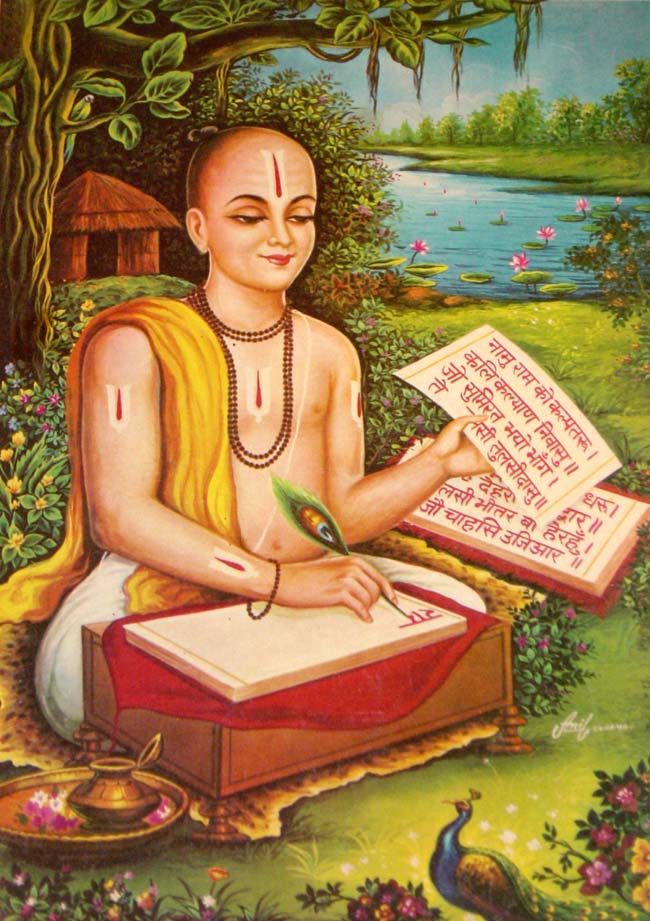
Tulsidas composing his famous Avadhi Ramcharitmanas (Wikipedia Commons)
The Vaishnavite movement in Maharashtra contained both Unitarian and conservative elements. Eknath (d.1599), a Brahman, expounded the principle of bhakti and allowed all castes as well as women to assemble and praise the Lord and join in the ecstasy of devotional chants (kirtan). He also tended to discount mere ritual. Tukārām, (d.1649), a Shūdra peasant, might possibly have been influenced by the Chaitanya sect yet while addressing himself to Vithoba, the Lord of Pandhari, his God (Vitthal) tends to be closer to the Ram of the monotheist Kabir than to the Krishna of Chaintaya. He sings of the possibility of recourse to God by a devotee, howsoever lowly in status, and does not hesitate to use the word Allah for his God. Quite different in approach was his junior contemporary, Rāmdās (d.1681), who combined the propagation of the worship of Rama as God with the upholding of the dharma (“the Maharashtra Dharma”), i.e. maintenance of “the holiness of the Brahmans and deities”. He organized maths or centres of ascetics, and was patronized by Shivaji, the Maratha ruler (d.1680),
In Karnataka, the Dāsakūta movement seems formally to have belonged to Madhvächärya’s system. It originated with Shripadaraya (d.1492), but was mainly spread by his disciple Vyasaraya (d.1539). The songs of the sect in Kannada show attachment to Viththala, the deity of Pandharpur, and yet revel in an ecstasy of devotion which recalls Chaitanya. A disciple of Vyasaraya, Kanakadas was a shepherd (Kurub) and in his popular compositions insisted on the lowly to the Lord.
Other Sects; Jainism
Logic and dialectics (nyaya and tarka) continued to attract attention through the compilation of commentaries and text-books. The Navadvip schools produced Raghunātha Siromani’s commentary (c.1500) on Gañgesha; and on this commentary Gadhādara (c.1700) in turn commented. Shañkara Mishra in Upaskära (c.1600) commented on the Nyāya-sütra. Among textbooks, Annam Bhațța wrote Tarkasamgraha (c.1585) and Jagadisha, the Tarkamyita (c.1700). A.B. Keith comments unfavorably on the obscurity and scholasticism of this literature; he also notes that all the schools were now “fully theistic”.
The survival of the materialist ideas of the Chārvākas, described in the Dabistān as constituting the ninth tradition within Hinduism, is of considerable interest. The Chārvākas believed that only the world perceived by the senses was real; “whether one becomes high or low results from the nature of the world”, and not from divine direction. The existence of a Creator or of gods was denied, and so also the truth of the Vedas. A number of specific criticisms by them of the beliefs in the miraculous and divine are quoted; possibly these circulated by word of mouth or are derived from the texts of opponents, for our author does not name any text or votary of the sect for his source.
The main area of strength of Jainism during this period was Gujarat, though Jain communities were found elsewhere too. Jain religious literature was composed in Gujarati, Sanskrit, Präkrit, Braj, Kannada and other languages, but much of it is described as repetitive or hagiological. The Jain version of dialectics was set out by Yashovijayaji in Jaina tarka-bhāshā, c.1670; he was the author of other religious books as well. Both the sects of the Jains, the Shvetāmbara and Digambara, flourished in the Vijayanagara empire. Jain priests also claimed exceptional proximity to Akbar and his court. The Jain laity was increasingly confined to “the Banya and Bohra castes of tradesmen, most of them selling foodgrains and some taking to service” (Dabistān).
Kabir and the Monotheistic Movement
A change of substantive proportions in the Indian mode of religious thought was marked by the preaching of the weaver Kabir (d., c. 1518) of Varanasi. One could, on the other hand, see in his compositions a distilling of Vaishnavite, Nath-yogic, even Tantric beliefs to obtain a rigorous monotheism, parallel to the Islamic; or see, alternatively, a rigorous acceptance of the logic of the monotheism of Islam, while rejecting its theology, with the exposition necessarily offered in a language that those outside the culture of Islam could understand. Strong arguments can be urged in favor of both views; but in whatever manner Kabir came to espouse the views he proclaimed, his contemporaries were deeply struck by their boldness and vigor.
A change of substantive proportions in the Indian mode of religious thought was marked by the preaching of the weaver Kabir (d., c. 1518) of Varanasi. One could, on the other hand, see in his compositions a distilling of Vaishnavite, Nath-yogic, even Tantric beliefs to obtain a rigorous monotheism, parallel to the Islamic; or see, alternatively, a rigorous acceptance of the logic of the monotheism of Islam, while rejecting its theology, with the exposition necessarily offered in a language that those outside the culture of Islam could understand. Strong arguments can be urged in favor of both views; but in whatever manner Kabir came to espouse the views he proclaimed, his contemporaries were deeply struck by their boldness and vigor.
Kabir propounded an absolute monotheism that countenanced no image-worship and no ritual. Servitude to God rather than offer of love to Him is the true means of salvation – love, though not absent, is clearly a subordinate element. This weakens any argument that Kabir derived his thought from either Vaishnav bhakti or Islamic Sufism. It was by one’s faith in God and work in this life one would be judged by God, for –
Kabir, the capital belongs to the Sah (Principal Merchant/Usurer)
And you waste it all.
There would be great difficulty for you
At the time of rendering of accounts.
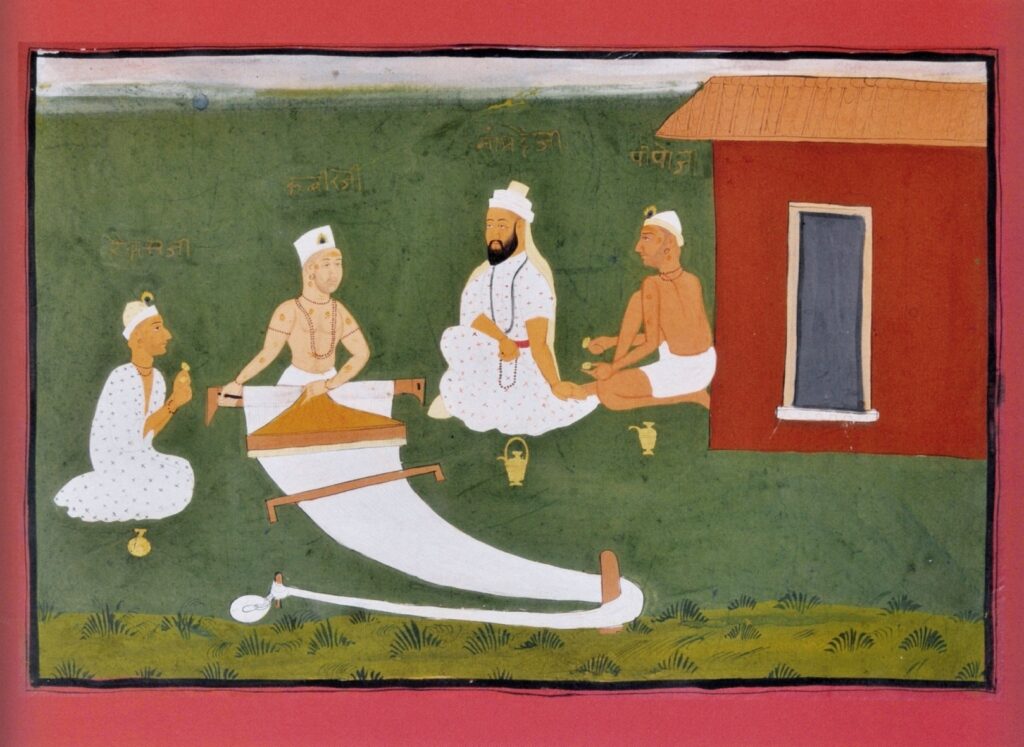
Kabir with Namadeva, Raidas and Pipaji. Jaipur, early 19th century
The Islamic influence in this concept of exact measurement of one’s thought and deed at the Day of Judgement is manifest; at the same time, the vision of God as a usurer certainly reflects not the traditional Muslim, but the impoverished artisan’s natural view of the Master. But if Kabir warns of punishment, he does not look forward to a heaven where one’s desires would be fulfilled this marks another departure from Islamic theology:
As long as man desires to go to heaven,
So long he shall find no dwelling at God’s feet.
Kabir’s rejection of the concepts of ritual purity and pollution, the laws of the smritis and the caste system is uncompromising in its completeness. As a late-sixteenth century summary of his teaching tells us, Kabir refused to acknowledge caste distinctions or to recognize the authority of the six schools of Hindu philosophy; nor did he set any store by the four divisions of life (ashrams) prescribed by the Brahmans.
As for the two contending religions, Kabir says scornfully: The Hindu dies crying “Rām”, the Muslim, “O Khudā (God).”
Says Kabir: He who lives, shall not go amongst either.
And then the triumphant revelation:
Ka’ba has once more become Kāsi, Rām has become Rahim!
Moth (a coarse pulse) has become fine flour; so sits down Kabir to enjoy it.
To a region, now torn in the struggle between temple and mosque, this teaching still retains a living and vibrant message.
Kabir’s audience was the common man, the artisan, the peasant, the village headman; his similes and metaphors came from their life and travels; and his language was the tongue that they spoke. Different regional dialects have left their imprint on his original Awadhi, as he or his verses traveled about. True, he is also influenced by some of the prejudices in his environment (chiefly poor and male) against women. Still, he had found a new dignity for the poor and the downtrodden in the world of his Lord. So came now a procession of his peers, lowly like him, seeking God in this land of Homo Hierarchicus. No one can, perhaps, improve upon how in 1604 Arjan, the fifth gurū of the Sikhs, saw this dramatic movement and made Dhannā, a Jāt peasant, sing of it.
To a region, now torn in the struggle between temple and mosque, this teaching still retains a living and vibrant message.
The evidence of their compositions show that Ravidās (or Räidās), the worker in hides, and Sain, the barber, both belonging to the sixteenth century, regarded Kabir as their precursor. A similar position with regard to Kabir was adopted by Dadū, the cotton-carder (d.1603), who obtained a considerable following in Rajasthan. A little later (1657) there appeared in Haryana the Satnāmi sect, again owing explicit allegiance to Kabir, and counting among its followers “peasants and tradesmen with small capital”. The sects of the follower of these teachers were called panth; in time, in spite of preserving the anti-ritualistic compositions of their founders, these tended to develop rituals of their own and to introduce notions and institutions taken from traditional religion, notably the ascription of avatār status to their original preceptor, and a caste-like status to the monotheistic community itself. Even a Brahman parentage came to be sought for Kabir, the weaver. Such a reshaping of the original message of the masters, is a testimony to the strong roots of ritual and the caste-order in those times; and our own times are, perhaps, no different.
Sikhism
The sixteenth century saw the rise of Sikhism, now one of the recognized religions of the world. It began as a sect (panth) of the followers of Gurū Nanak (1469-1538), a Khatrī (an accountant and mercantile caste) of the Panjab, more or less on the pattern of other sects of the contemporary popular monotheistic movement. The Gurü Granth Sahib, the scripture of the Sikhs, compiled by Gurū Arjan in 1604, includes, besides compositions of Nānak and the succeeding Gurus, those of the Muslim saint Shaikh Farid, and of Nāmdev, Kabir and Ravidās and other bhagats (saints), in the same manner as such compositions are included in the compilations of the Dādū panthis, viz., the Panchvānīs and the Sarbangī of Rajjabdās. This suggests that, at least till the beginning of the seventeenth century, there was a strong sense among Gurū Nānak’s followers that they belonged to a general monotheistic movement, with only some differences of both nuance and substance separating its different components.
Gurū Nanak believed in One God, and saw an intensely personal relationship between Him and the devotee, who would humbly serve and love Him and obtain His grace in return. At the same time God was formless and omnipresent and could not be represented in a physical form. Image worship and ritual were thus condemned. Nānak strongly emphasized ethical conduct, especially kindness to fellow human beings. He condemned arrogance of birth, the cult of ritual pollution and differences of caste. The salvation to be aimed at was nirvān or sach khand, the true abode, when man at last realizes God.
The Gurü Granth Sahib, the scripture of the Sikhs, compiled by Gurū Arjan in 1604, includes, besides compositions of Nānak and the succeeding Gurus, those of the Muslim saint Shaikh Farid, and of Nāmdev, Kabir and Ravidās and other bhagats (saints), in the same manner as such compositions are included in the compilations of the Dādū panthis, viz., the Panchvānīs and the Sarbangī of Rajjabdās. This suggests that, at least till the beginning of the seventeenth century, there was a strong sense among Gurū Nānak’s followers that they belonged to a general monotheistic movement, with only some differences of both nuance and substance separating its different components.
It is not clear to what extent Gurū Nānak gave an organizational form to his sect, nor whether the word gurū used in his compositions, e.g. in Japjī, means God or spiritual guide. But two processes appeared soon enough. First, a line of Gurūs or spiritual successors to Nānak was established. Their status came to be exalted to incarnations of the same perfect spirit (each gurū being known as the mahalla from Arabic mahall, or station); and total obedience to the Gurū was expected from each disciple, the Sikh-Gurū, whence the abbreviated name Sikh.” The second was the expansion of the sect among the Jatts or peasants of the Panjab: the Gurus were all Khatris, but their principal lieutenants, the masands, were already mostly Jatts in the seventeenth century.
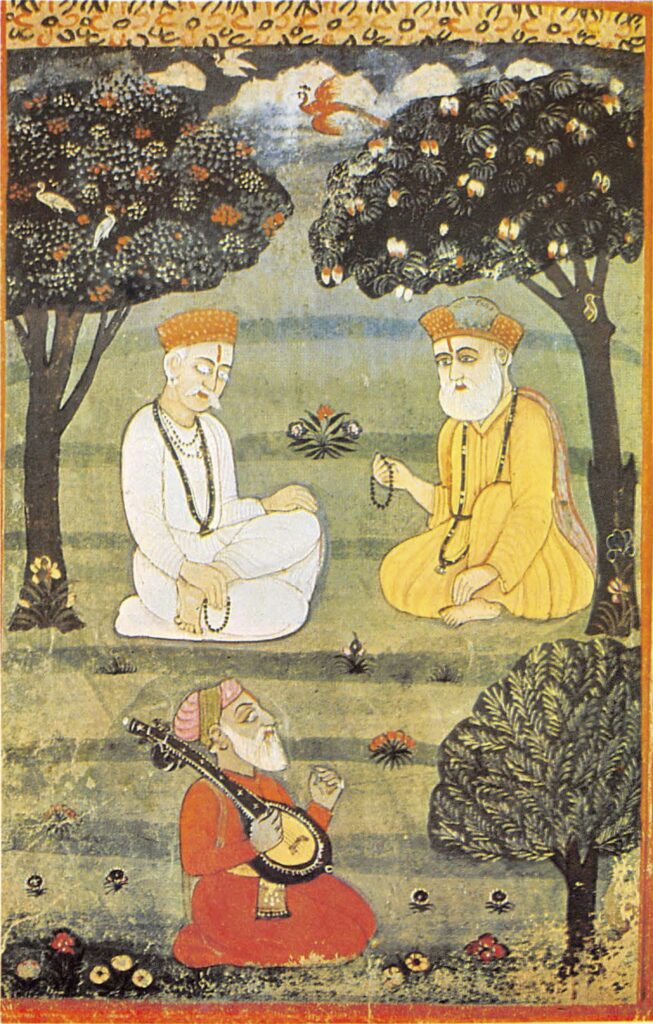
Nanak (right) and Mardana (foreground) with Bhagat Kabir (left). This painting is found in the B-40 Janamsakhi, written and painted in 1733. The painting was made by Alam Chand Raj
These two developments provided ground for a third, the acquisition of armed power. After the martyrdom of Gurū Arjan (1606), a conflict with the Mughal authorities could not be long avoided. The military power of the Gurüs reached its apex under the tenth and last Gurū, Gobind Singh (1666-1708). In 1699 he sought to weld his followers into a militant community (Khālsa’) by prescribing a common baptism for men of all castes and appointing the items everyone had to carry, including the dagger or sword (kirpān), which was part of the public bearing of a professional soldier of the time.
Immediately after Gurū Gobind Singh’s death at Nander in the Deccan (1708), his disciple Banda Bahādur returned to the North and raised a massive plebeian rebellion, in which Sikhs, including many fresh converts, joined along with discontented zamindars. He operated over large portions of the Panjab and Haryana plains, retiring to the hills for some time. The rebellion was ultimately suppressed, and Banda was executed in 1716. A period of demoralization and division followed, but recovery began as Mughal power collapsed under the impact of Nādir Shāh’s invasion (1739) and the repeated invasions of Ahmad Shah, the Afghan ruler (1747-73). From the 1750s onwards, the Sikh dals and misals (groups) became more and more powerful, led by individual chiefs (sardārs), who organized troops of increasingly professional mounted musketeers. Many of the chiefs came from peasant or artisan stock, like one of their foremost leaders at this time, Jassa Singh, reputed to be originally a carpenter. A semblance of unity was sought to be maintained by the tradition of an annual ‘sarbat Khālsa‘ at Chak Gurū (Amritsar); but dissensions grew apace, and each chief tended to carve out a separate territory for himself. The process was at last checked by Ranjit Singh (1780-1839), who established a traditional kingdom in the Punjab, ostensibly in the name of the Khālsa.
Islam: Sixteenth Century
Islam in India remained ideologically so closely linked to the main currents of Islamic thought transmitted through Arabic and Persian that it may not perhaps be wholly correct to speak of “Indian Islam” as an isolated compartment within the larger world of Islam. Such specificities in customs and beliefs as existed here were partly linked to the fact that India had much greater association with Iran and Central Asia than with the Arab countries. The continued co-existence with Hinduism brought into focus, in course of time, the problem of assessing non-Muslim faiths and beliefs. Sufism or Muslim mysticism, whose ‘chains’ (silsilahs) came from Iran and Central Asia, found a congenial soil in India. By the sixteenth century Sufism had been accepted by most orthodox theologians as a permissible discipline so long as the formal requirements of Sharīa, the law and ritual of Islam, were met. But the comfortable arrangement was seriously disturbed when mysticism opened the doors to the pantheistic doctrines and speculations of ibn al-‘Arabi (d. Damascus, 1240).
It may be justly held that ibn al-‘Arabi’s views were a bold but logical elaboration of the sufic concept of communion with God (fana). With him Separation, from being unnatural, became illusory, and the communion, from being the ultimate object, became the only eternal Reality. His doctrine of Wahdat al-Wujüd (Unity of Existence) had, by the latter half of the fourteenth century, begun to influence sufic circles in India and, despite opposition, had steadily gained adherents. For a country like India, where Islam’s co-existence with the totally different religious tradition of Hinduism could not but lead to inner questioning, ibn al- Arabi’s doctrines seemed to offer a persuasive explanation of diversity that belonged only to the sphere of illusion. Alongside this, there was the proposition of the Perfect Man (insān al-kāmil), in which ibn al-‘Arabi idealized the mystic guide (shaikh) as ‘a microcosm in whom the One is manifested to Himself. This vision inevitably supplemented or reinforced the concept of mahdi, the reformer and redeemer coming in advance of the Day of Judgement, the expectation of whose arrival was part of popular Muslim beliefs. The two concepts could influence each other, and as the close of the first millennium of Islam drew near (AH 1000 = AD 1592), they produced a millenary wave.
The Mahdawi movement was the first indication of the new intellectual turbulence. Saiyid Muhammad of Jaunpur (d.1505), a well-traveled scholar, proclaimed himself Mahdi. Apparently, the hope for redemption by following the Mahdi’s message and his call for ethical conduct, continued to win followers for his sect, who began to establish their communities (da ‘iras) at various places. Theologians tirelessly denounced them; but the sect survived.
In the last quarter of the sixteenth century in the Kabul province of the Mughal Empire there arose another sect with similar millenary tendencies, except that its founder Bāyazid (Miyän Raushan) (d.1585) claimed that he was a Prophet (nabi), and not a Mahdī. Believing in a pantheistic mysticism, he envisioned the state of sukunat, where the self merged with God. His refusal to countenance anyone who refused to accept his message helped forge the Raushaniyas into a militant sect among the Afghans, in whose language (Pashtu) his book Khairu i Bayān was composed. The Raushaniya militancy led to a long war with the Mughals, during which the sect was suppressed.
Akbar: A Supra-religious Sovereignty
The great upheaval in thought that was to come under Akbar (emperor, 1556-1605) had its origins partly at least in the same two intellectual impulses of Pantheism and the Messiah-cult, which we have just discussed. Akbar’s religious interests initially lay within traditional Islam. His splendid city of Fatehpur Sikri, dominated by the great mosque, was built early in the 1570’s in honour of Shaikh Salim Chishti (d.1572), the sūfi saint. But in the 1570’s Shaikh Taju’ddin, a protagonist of ibn al-’Arabi, introduced his principal concepts at the Court. Shaikh Mubārak (d.1593) gained in influence, and not only had he read ibn al- Arabi and the Iluminationist (Ishrāqi) doctrines of Shihäbu’ddin Maqtūül (twelfth century), but had also been suspected of Mahdawi inclinations. The popular belief in the need of renewal at the end of the first millennium of Islam, and of a reformer for the purpose, lay partly behind Akbar’s direction in 1582 for the compilation of the Tarīkh-i Alafi, a history of the millennium beginning with the death of the Prophet. Akbar himself could be seen as such a reformer, while being identified as the Perfect Man in the ibn al-’Arabi tradition. An early limited application of this concept was attempted in the mahzar of 1579. This was a statement signed by leading Muslim theologians at the court, declaring that Akbar, in his position as a Just Sultan, was entitled to exercise limited powers of interpretation and elaboration of Muslim law, which was to be binding on all Muslims.
Akbar’s religious interests initially lay within traditional Islam. His splendid city of Fatehpur Sikri, dominated by the great mosque, was built early in the 1570’s in honour of Shaikh Salim Chishti (d.1572), the sūfi saint. But in the 1570’s Shaikh Taju’ddin, a protagonist of ibn al-’Arabi, introduced his principal concepts at the Court.
The growing influence of pantheism, however, soon took matters beyond the rather modest and sectarian position assigned to the Emperor in the mahzar. Discussions had taken place in the presence of Akbar, among representatives of Sunni Muslim scholars, at a special building, the “ibadatkhana (house of prayer), at Fatehpur Sikri. These discussions and debates were now extended to involve Muslim divines, Sunni and Shi’a, şūfis and rational scholars (hakims), and, subsequently, Brahman scholars, other Hindu recluses, Jains, Parsis and Christians (Jesuits), whose first mission reached the court in1580. These discussions convinced Akbar that no single interpretation of Islam was correct or even forthcoming, and further that no single religion could be true, but that all drew, but only in part, upon the same Truth. It was for him, as the chosen man of God, to assist in the realization of a consciousness of Absolute Peace (Sulh-i Kul) in order to prevent idle strife between the votaries of different religions and factions. It was held that both “religion (din) and the, secular world (duniya)” were patterns drawn by “the cloud of duality,” that is, by consciousness of an existence separate from God. This being so, all religions were to be tolerated, but did not need to be followed.
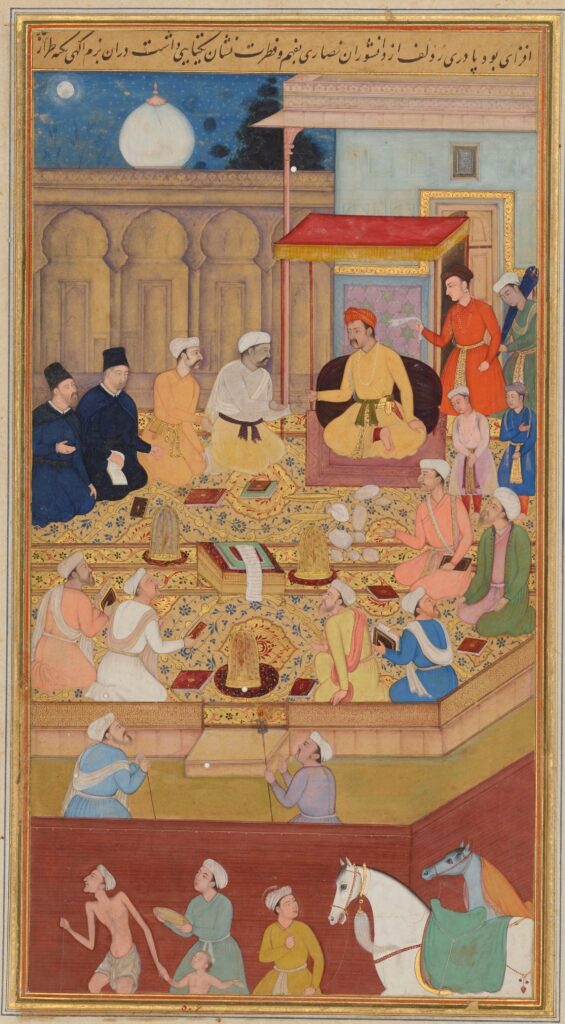
Jesuits at Akbar’s court
For an elite corps of disciples (irādat-gazinān), there was prescribed by Akbar a total submission to the imperial preceptor and certain principles and code of conduct, which his son Jahangir summed up as follows:
Let the disciples not blacken and spoil their time by engaging in hostility with any religious community and let them follow in their relations with members of all religious communities the path of Absolute Peace (Sulh-i Kul). Let them not kill any animal by their own hand, nor wear weapons except in battle or chase… Respect must be shown to the Sun and the Moon, which exhibit the Light of God, according to the degrees of each. God must be conceived as the true Creator and Cause in all times and circumstances, and one should so meditate on this that, whether in seclusion or in company, one’s thought should not be away from God for a single moment.
It may be mentioned that there is no sanction for the belief that Akbar wished to institute any new religion or that it was called Din-i llāhī.
The growing influence of pantheism, however, soon took matters beyond the rather modest and sectarian position assigned to the Emperor in the mahzar. Discussions had taken place in the presence of Akbar, among representatives of Sunni Muslim scholars, at a special building, the “ibadatkhana (house of prayer), at Fatehpur Sikri. These discussions and debates were now extended to involve Muslim divines, Sunni and Shi’a, şūfis and rational scholars (hakims), and, subsequently, Brahman scholars, other Hindu recluses, Jains, Parsis and Christians (Jesuits), whose first mission reached the court in1580.
The policy of equal treatment of all religions (as distinct from a simple policy of tolerance) that Akbar enforced, permitting full freedom of religious expression, conversion and construction of places of worship to all, was consistent with his views as they came to be formulated by the early 1580’s. It was, perhaps, a policy for which it was not easy to find a parallel in the contemporary world – a fact underlined with great pride by his son. It is, however, more likely that Akbar’s own views took direction, because a policy of tolerance was politically very useful and had, indeed, been adopted much before his philosophical views took the form they did in the last twenty- five years of his life. His minister Abu’l Fazl declared that sovereignty is itself in the nature of farr-i izadi, God’s light, and the sovereign, like God, was parent to all mankind; it was therefore his function to ensure that “out of differences of religion, there does not arise the dust of antipathy.” This declaration, it will be seen, draws not on any philosophical or religious tradition, but on a simple assertion of the Sovereign’s absolute power, and the obligation that such absoluteness imposed on him, to keep all his subjects contented.
It is, however, more likely that Akbar’s own views took direction, because a policy of tolerance was politically very useful and had, indeed, been adopted much before his philosophical views took the form they did in the last twenty- five years of his life.
Inter-Religious Investigation
Akbar’s proclamation of belief in pantheism and șulh-i kul, in its turn, had some significant ideological consequences, in that it suddenly threw open orthodox beliefs to criticism ôn the most delicate issues of ethics and theology. Internally, it created within Islam, a recognized niche for the Shi’ite trend in spite of considerable polemics existing between Sunnis and Shi’as. It provoked restatements of orthodox position, while it also generated a fresh interest in reason and science. Finally, a most interesting movement was fostered among Muslims towards a study of Brahmanical texts and of Vedānta, with a view to obtaining a knowledge of “truth” as perceived by Hindus. Akbar initiated a series of translations of Sanskrit works, among which the religious literature included the Atharva-veda, the Mahābhārata, and the Rāmāyana, while the Yogavasishtha was translated for Akbar’s eldest son Salim (the later Jahāngir). In the Ai’n-i Akbarī, Abūl Fazl was able to give a fairly cogent and accurate description of the various Hindu schools of philosophy, theology, beliefs and laws, based on a fresh scrutiny of the texts through translations made “after much difficulty”. Such scrutiny exhibited much common ground between Islam and Hinduism, since “though in some of the purposes and arguments there is room for dispute, it became established that the Hindus believe in the worship of God and in monotheism” (Abū’l Fazl). There is a greater appreciation of the logic of the Karma doctrine; and later, with Jahāngir, came the recognition that Vedānta “is the knowledge of taşawwuf (mysticism)”, presumably because it was pantheistic.
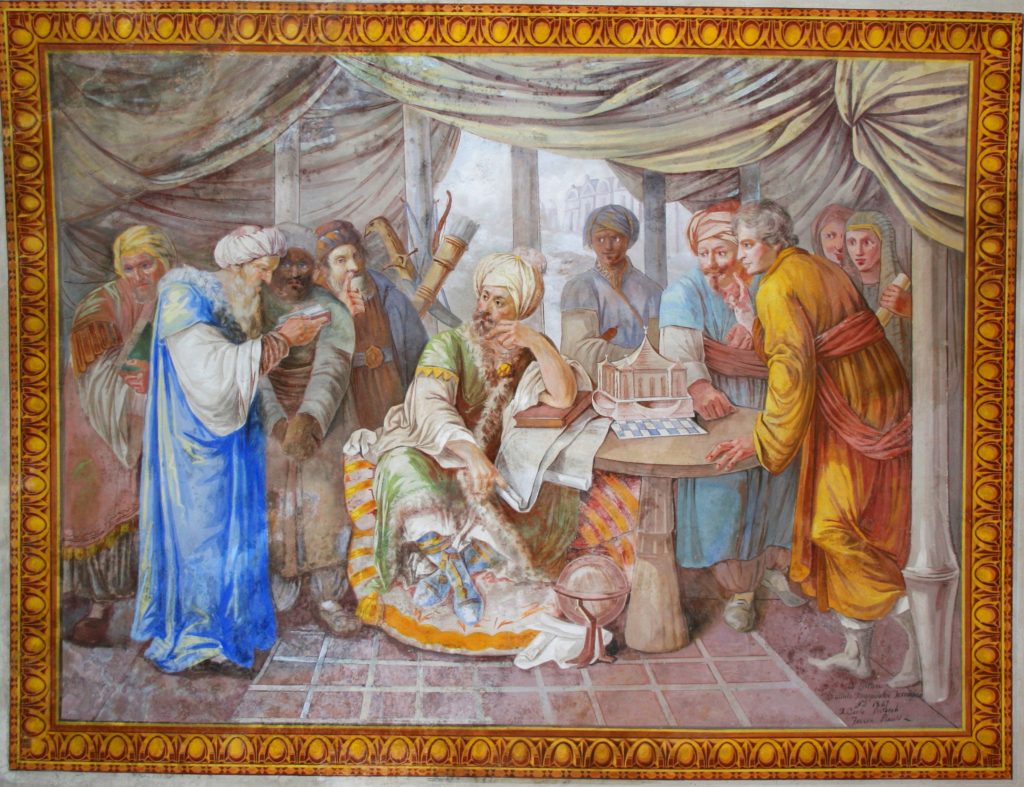
A painting depicting the scenes of the Ibādat Khāna. (Wikipedia Commons)
Islam’s recognition of Hinduism reached its culmination in Dara Shukoh (1615-59), the eldest son of Emperor Shähjahān. Därā began his intellectual career with an immersion in Muslim mysticism through attachment to the Qadiriya order of Mian Mir (d.1635) and Mulla Shah Badakhshi (d.1661); and his early writings were on Muslim mystics. But interest in monotheism and mystic practice led him to the composition of the Majma ‘u-l Bahrain (‘the mingling of two oceans’) in 1654-55. In this tract he explains the major terms and concepts used in Hindu spiritual discourse, and sees an identity between the Hindu and Muslim seekers of God, in all things except language. In 1657 came what was, from the philosophical point of view, the most important effort: a translation of fifty-two Upanishads, under the title Sirru’l Asrar, the Great Secret, a faithful rendering of very difficult texts.
Islam’s recognition of Hinduism reached its culmination in Dara Shukoh (1615-59), the eldest son of Emperor Shähjahān.
This was in some respects a momentous event, since it was this translation which, from its being rendered into Latin by Anquetil Duperron (1801-02), led ultimately to a world-wide recognition of the philosophical richness of these ancient texts. In 1655-56 at Dara Shukoh’s instance Habibullah made a fresh translation of Yogavasishtha.
Indicative of the spirit of the times is a work already referred to, the Dabistān (‘School), written in 1653 by an author who does not divulge his name or religion, but incidentally gives many facts about himself, which suggest he was the member of a Parsi sect, with the pen-name ‘Mobid’. He set out to write in Persian a work giving a truthful, unbiased account of all religions, and so deals in his work with the Parsis, Hindus, Buddhists (Tibetan), Jews, Christians and Muslims, along with different sects within each religious tradition. Most of the information was gathered by the author himself by his reading of the writings of the votaries of each sect or by his conversations with them. His linguistic equipment appears to have been considerable; and it is doubtful whether a work of this kind existed in any other language at this time. Clearly, even if the author was not a Muslim, but a leading light of a Parsi sect, his readership, given the language in which he wrote, consisted largely of Muslims. That the interest it evoked among them was widespread is shown by the large number of manuscripts of the work that have survived.
Islam: Major Currents after Akbar
The freedom of religious discussion accorded to all under Akbar assisted in the transformation of Shi’ism from a ‘heresy’ into a recognized variant of Islam in India. Qāzi Nūrullah Shustarī (1549-1610) was the first isnā- ‘asharī Shi’a theologian in India to have left important writings. Disdaining taqiyya (or permitted dissimulation), expressly on account of the freedom accorded under Akbar, he openly defended Shi’ite position against Sunni criticisms. He died in 1610 as a result of physical punishment inflicted on him at Jahāngir’s orders and is considered a Shi’a martyr. Though the details of the incident are obscure, it was apparently not a part of any general persecution of the Shi’as. Immigrants from Iran, who were mostly Shi’as, held high offices in the Mughal empire; and Shī’a observances were publicly held. Haidarabad in the Deccan in the seventeenth century and Lucknow and Faizabad in Awadh in the eighteenth, became important centres of Shi’ite learning.
Muslim or Sunni orthodoxy responded in various ways to challenges from the free airing of views hitherto thought to be unacceptably heterodox. How complex the responses could be is shown by the ideas of Shaikh Ahmad Sirhindi (1564-1624). His first surviving work, a rather slight tract, is devoted to a refutation of Shi’a beliefs (Risāla dar radd-i rawāfiz). His strong attachment to the Shari’a was displayed in his hostility to Akbar’s policies of tolerance and in his bitter opposition to Hindus and Hindu beliefs that he gives expression to in his letters soon after Akbar’s death. But he had in the meantime (1600) become a disciple of the Naqshbandi mystic Bãqi Billāh (d.1603); and from this point onwards he became increasingly concerned with Ibn al-‘Arabi’s theories of Unity of Existence (wahdat al-wujud) and the Perfect Man. His acceptance of the first idea was only partial. The seeker, he asserted, must transcend this notion in order to grasp separateness, the unity being for him now, only the unity of all that he sees, for in the final stage he looks only at God and none else (wahdat ash- shuhud). A rigorous conformity with the Sharī’a was to him as much a requisite for the mystic as for anyone else; and he condemned all innovations. Ibn al-‘Arabi’s theory of the Perfect Man was, on the other hand, incorporated in Sirhindi’s own concept of the qaiyum (‘the maintainer ‘). The possessor of gnosis (ãrif). by being the Perfect Man, is chosen as the qaiyüm, or God’s vizier or vicegerent, and thus attains a function assigned previously to prophets. This function is identified with yet another- that of the renovator (mujaddid) of Islam in its second millennium (alf-i șān). It was clear that to him and his followers both the offices of qaiyüm and mujaddid were united in Shaikh Ahmad himself.
In Mughal India Shaikh Ahmad’s seems to have been the last major statement of a claim to be the Chosen Man within the framework of Islamic theology. Predictably, it invited criticism, notably from ‘Abdu’l Haqq Muhaddiş; and Emperor Jahāngir had Sirhindi briefly imprisoned (1619).
There was, by the side of Shaikh Ahmad’s mystical revivalism, a restatement of the orthodox position in terms of what might be called the Islam of Ghazāli’s conception, a combination of Law (Sharı’a) and Mysticism (Tariqa). The restatement was, by definition unoriginal, though much learning and care often went into it. ‘Abdu’l Haqq Muhaddis (1551 1642), already mentioned, was a prolific writer on Muslim law and a recognized authority on hadīş, or sayings of the Prophet. Yet he fully accepted the sufic tradition, being the author of a volume of biographies of Indian mysties; and he inherited from his father a belief in wahdat al-wujüd. He could also sympathetically refer to the radical monotheist Kabir, while recognizing him to be neither Muslim nor Hindu.
Emperor Aurangzeb (reigned, 1659-1707), despite his patronage of the descendants of Shaikh Ahmad Sirhindi, could not accept the latter’s extreme spiritual claims, and generally supported traditional and legal Islam. This was particularly shown by his commissioning of the massive work Fatāwā-i ‘Alamgiri, prepared in Arabic by Shaikh Nizām with the assistance of many scholars and designed to be a comprehensive compendium of jurists’ opinions on diverse matters, systematically arranged.
The Mughal Empire in its decline brought forth the important Muslim thinker and jurist, Shäh Walilullah (1702- 1762). He was exceptional in reflecting on the oppression of peasants and craftsmen as factors behind the decline of the Empire; an oppression he ascribed to growth of love of luxury among the ruling classes. He sometimes linked the enforcement of the various elements of the Shari’a to particular social needs, though these were rather naively formulated. Thus usury is prohibited, because if it is practiced, people would tend to abandon agriculture and crafts altogether in pursuit of usurious gain. On other matters, such as concerning Shi’as, he took an orthodox Sunni position, and translated Sirhindis polemical anti-Shi’a tract into Arabic. He was fairly harsh on non-Muslims who were to be the hewers of wood and drawers of water under an ideal Sharī’a regime. Shäh Waliullah largely accepted the sufic heritage of Islam. Claiming to be a spiritual guide (murshid) himself, he propounded an ‘inspired’ (not reasoned) reconciliation of wahdat al-wuyjüd with Sirhindī’s theory of wahdat ash-shuhūd. Hereafter the element of pantheism in Indian Islamic thought seems to have increasingly receded into the background.
Emperor Aurangzeb (reigned, 1659-1707), despite his patronage of the descendants of Shaikh Ahmad Sirhindi, could not accept the latter’s extreme spiritual claims, and generally supported traditional and legal Islam. This was particularly shown by his commissioning of the massive work Fatāwā-i ‘Alamgiri, prepared in Arabic by Shaikh Nizām with the assistance of many scholars and designed to be a comprehensive compendium of jurists’ opinions on diverse matters, systematically arranged.
Christianity
Syrian Christian and Jewish communities had long lived on the Kerala coast, the Red Sea trade keeping alive their contacts with easternm Christendom and Judaism. With the arrival of the Portuguese, Catholic Christianity also arrived: Francis Xavier (1506-52) was the great pioneer of Catholic missionary activity. Another Jesuit, the Italian Robert de Nobili (1577- 1656), tried the innovation of presenting Christianity in Indian garb, incorporating the caste system by having separate churches for the upper and the untouchable castes. Much use was made by the Jesuits of the printing press to produce literature on Christianity in Indian languages. Goa became an archdiocese in 1557. The decline of Portuguese power, however, affected Catholic activity, and in 1653 a number of Syrian Christian communities in Kerala, which had been previously pressed or persuaded into accepting Papal authority, shifted to their older allegiance to Antioch. In 1759 Portugal itself suppressed the Jesuit order (‘Society of Jesus’). But Catholicism long remained the only version of Christianity that Indians could more easily become familiar with. The Dabistān, in its chapter on Christianity, provides a fairly accurate statement of Catholic beliefs, but the author seems entirely unaware of the Protestant Reformation.
The direct effect of Christianity on the mainstreams of Indian religious thought, whether Hindu or Islamic, was as yet limited; the impact became significant only in the first half of the nineteenth century.
The first Lutheran missionaries under Danish patronage, arrived in 1706 at Tranquebar (Tamilnadu), and one of them, Ziegenbalg, translated the four Gospels into Tamil in 1714. The direct effect of Christianity on the mainstreams of Indian religious thought, whether Hindu or Islamic, was as yet limited; the impact became significant only in the first half of the nineteenth century.
ARCHIVE
My Future Visit to America, 1883
— Anandibai Joshi
. . . Our subject to-day is, “My future visit to America, and public inquiries regarding it.” I am asked hundreds of questions about my going to America. I take this opportunity to answer some of them. . .

Anandibai Joshi
Why do I go to America? I go to America because I wish to study medicine. I now address the ladies present here, who will be the better judges of the importance of female medical assistance in India. I never consider this subject without being surprised that none of those societies so laudably established in India for the promotion of sciences and female education have ever thought of sending one of their female members into the most civilized parts of the world to procure thorough medical knowledge, in order to open here a College for the instruction of women in medicine. There is probably no country that would not disclose all her wants and try to stand on her own feet. The want of female doctors in India is keenly felt in every quarter. Ladies both European and Native are naturally averse to expose themselves in cases of emergency to treatment by doctors of the other sex. There are some female doctors in India from Europe and America, who, being foreigners and different in manners, customs and language, have not been of such use to our women as they might. As it is very natural that Hindu ladies who love their country and people should not feel at home with the natives of other countries, we Indian women absolutely derive no benefit from these foreign ladies. They indeed have the appearance of supplying our need, but the appearance is delusive. In my humble opinion there is a growing need for Hindu lady doctors in India, and I volunteer to qualify myself for one.
There is one College at Madras, and midwifery classes are opened in all the Presidencies; but the education imparted is defective and not sufficient, as the instructors who teach the classes are conservative, and to some extent jealous. I do not find fault with them. That is the characteristic of the male sex.
Are there no means to study in India? No. I do not mean to say there are no means, but the difficulties are many and great. There is one College at Madras, and midwifery classes are opened in all the Presidencies; but the education imparted is defective and not sufficient, as the instructors who teach the classes are conservative, and to some extent jealous. I do not find fault with them. That is the characteristic of the male sex. We must put up with this inconvenience until we have a class of educated ladies to relieve these men.
I am neither a Christian nor a Brahmo. To continue to live as a Hindu and to go to school in any part of India is very difficult. A convert who wears an English dress is not so much stared at. Native Christian ladies are free from the opposition or public scandal which Hindu ladies like myself have to meet within and without the zenana. If I go alone by train or in the street some people come near to stare and ask impertinent questions to annoy me. Example is better than precept. Some few years ago, when I was in Bombay, I used to go to school. When people saw me going with my books in my hands, they had the goodness to put their heads out of the window just to have a look at me. Some stopped their carriages for the purpose. Others walking in the streets stood laughing and crying out so that I could hear:—
“What is this? Who is this lady who is going to school with boots and stockings on?”
“Does not this show that the Kali Yuga has stamped its character on the minds of the people?”
Ladies and gentlemen, you can easily imagine what effect questions like these would have on your minds if you had been in my place!
Once it so happened that I was obliged to stay in school for some time, and go twice a day for my meals to the house of a relation. Passers-by, whenever they saw me going, gathered round me. Some of them made fun, and were convulsed with laughter. Others, sitting respectably in their verandahs, made ridiculous remarks, and did not feel ashamed to throw pebbles at me. The shopkeepers and venders spit at the sight of me, and made gestures too indecent to describe. I leave it to you to imagine what was my condition at such a time, and how I could gladly have burst through the crowd to make my home nearer!
If I go to take a walk on the Strand, Englishmen are not so bold as to look at me. Even the soldiers are never troublesome; but the Babus lay bare their levity by making fun of everything. “Who are you?” “What caste do you belong to?” “Whence do you come,” “Where do you go?” are, in my opinion, questions that should not be asked by strangers.
Yet the boldness of my Bengali brethren cannot be exceeded, and it is still more serious to contemplate than the instances I have given from Bombay. Surely it deserves pity! If I go to take a walk on the Strand, Englishmen are not so bold as to look at me. Even the soldiers are never troublesome; but the Babus lay bare their levity by making fun of everything. “Who are you?” “What caste do you belong to?” “Whence do you come,” “Where do you go?” are, in my opinion, questions that should not be asked by strangers. There are some educated native Christians here in Serampore who are suspicious; they are still wondering whether I am married or a widow; a woman of bad character or ex-communicated! Dear audience, does it become my native and Christian brethren to be so uncharitable? Certainly not. I place these unpleasant things before you, that those whom they concern most may rectify them, and those who have never thought of the difficulties may see that I am not going to America through any whim or caprice.
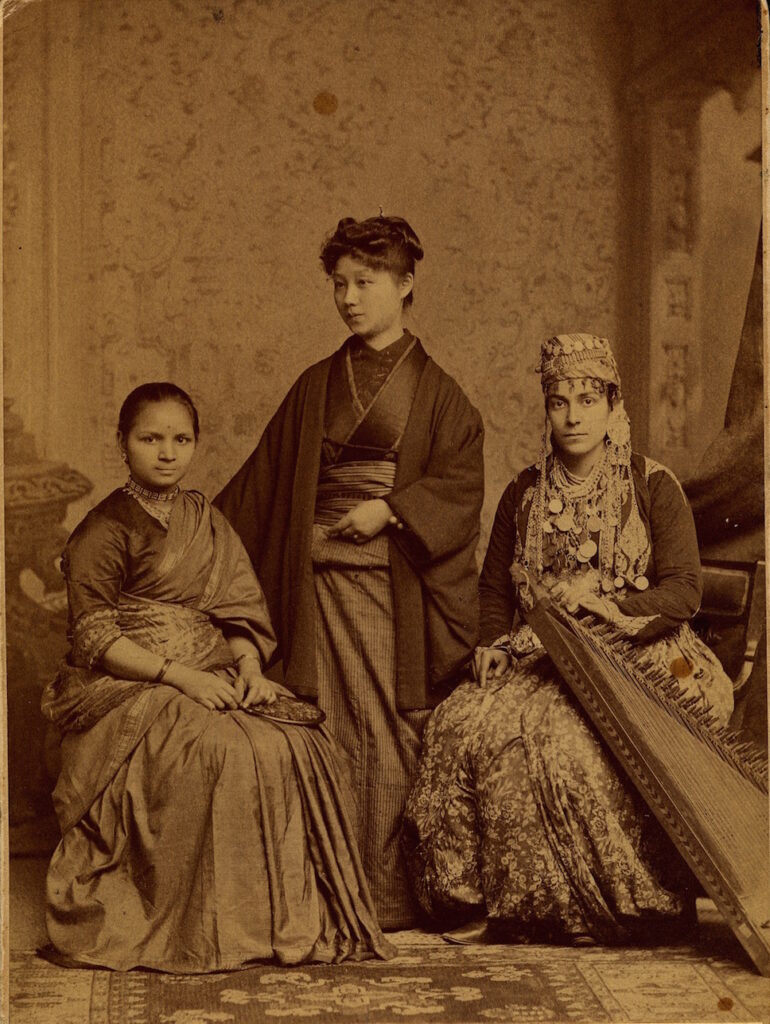
Anandibai Joshee graduated from Woman’s Medical College of Pennsylvania (WMCP) in 1886. Seen here with Kei Okami (center) and Sabat Islambooly (right). All three completed their medical studies and each of them was among the first women from their respective countries to obtain a degree in Western medicine.
Why do I go alone? It was at first the intention of my husband and myself to go together, but we were forced to abandon this thought. We have not sufficient funds; but that is not the only reason. There are others still more important and convincing. My husband has his aged parents and younger brothers and sisters to support. You will see that his departure would throw those dependent upon him into the arena of life, penniless and alone. How cruel and inhuman it would be for him to take care of one soul and reduce so many to starvation! Therefore I go alone.
Shall I not be excommunicated when I return to India? Do you think I should be filled with consternation at this threat? I do not fear it in the least. Why should I be cast out, when I have determined to live there exactly as I do here? I propose to myself to make no change in my customs and manners, food or dress. I will go as a Hindu, and come back here to live here as a Hindu. I will not increase my wants, but be as plain and simple as my forefathers, and as I am now. If my countrymen wish to excommunicate me, why do they not do it now? They are at liberty to do so. I have come to Bengal and to a place where there is not a single Maharashtrian. Nobody here knows whether I behave according to my customs and manners, or not. Let us therefore cease to consider what may never happen, and what, when it may happen, will defy human speculation.
Shall I not be excommunicated when I return to India? Do you think I should be filled with consternation at this threat? I do not fear it in the least. Why should I be cast out, when I have determined to live there exactly as I do here? I propose to myself to make no change in my customs and manners, food or dress. I will go as a Hindu, and come back here to live here as a Hindu.
What will I do if misfortune befall me? Some persons fall into the error of exaggerated declamation, by producing in their talk examples of national calamities and scenes of extensive misery which are found in books rather than in the world, and which, as they are horrid, are ordained to be rare. A man or a woman who wishes to act does not look at that dark side which others easily foresee. On necessary and inevitable evils which crush him or her to dust, all dispute is vain. When they happen they must be endured, but it is evident they are oftener dreaded than experienced. Whether perpetual happiness can be obtained in any way, this world will never give us an opportunity to decide. But this we may say, we do not always find visible happiness in proportion to visible means. It is not a thing which may be divided among a certain number of men. It depends upon feeling. If death be only miserable, why should some rejoice at it, while others lament? On the other hand, death and misery come alike to good and bad, virtuous and vicious, rich and poor, travelers and housekeepers; all are confounded in the misery of famine and not greatly distinguished in the fury of faction. No man is able to prevent any catastrophe. Misery and death are always near, and should be expected. When the result of any hazardous work is good, we praise the enterprise which undertook it; when it is evil, we blame the imprudence. The world is always ready to call enterprise imprudence when fortune changes.
Some say that those who stay at home are happy, but where does their happiness lie? Happiness is not a readymade thing to be enjoyed because one desires it. Some minds are so fond of variety that pleasure if permanent would be insupportable, and they solicit happiness by courting distress. To go to foreign countries is not bad, but in some respects better than to stay in one place. [The knowledge of history as well as other places is not to be neglected. The present state of things is the consequence of the former, and it is natural to enquire what were the sources of the good that we enjoy or the evils we suffer. To neglect the study of sciences is not prudent; it is not just if we are entrusted with the care of others. Ignorance when voluntary is criminal, and one may perfectly be charged with evils who refused to learn how he might prevent it. When the eyes and imagination are struck with any uncommon work, the next transition of an active mind is to the means by which it was performed. Here begins the true use of seeing other countries. We enlarge our comprehension by new ideas and perhaps recover some arts lost by us, or learn what is imperfectly known in our country. So I hope my going to America will not be disadvantageous.]
[I have seriously considered our manners and future prospects and find that we have mistaken our interests.] Everyone must do what he thinks right. Every man has owed much to others. His effort ought to be to repay what he has received. [This world is like a vast sea, mankind like a vessel sailing on its tempestuous bosom. Our prudence is its sails; the sciences serve us for oars; good or bad fortunes are the favorable or contrary winds and judgement is the rudder; without this last the vessel is tossed by every billow and will find ship-wreck in every breeze.] Let us follow the advice of Goldsmith who says: “Learn to pursue virtue of a man who is blind, who never takes a step without first examining the ground with his staff.” I take my Almighty Father for my staff, who will examine the path before He leads me further. I can find no better staff than He.
I ask my Christian friends, “Do you think you would have been saved from your sins, if Jesus Christ, according to your notions, had not sacrificed his life for you all?” Did he shrink at the extreme penalty that he bore while doing good? No, I am sure you will never admit that he shrank! Neither did our ancient kings Shibi and Mayurdhwaj. To desist from duty because we fear failure or suffering is not just. We must try. Never mind whether we are victors or victims. Manu has divided people into three classes.
And last you ask me, why I should do what is not done by any of my sex? [To this I cannot but say that we are bound by the rights of society to the labours of individuals. Everyone has his duty and he must perform it in the best way he can; otherwise his fear and backwardness are supposed to be a desertion of duty. It is very difficult to decide the duties of individuals. It is enough that the good of the whole is the same with the good of an individual. If anything seems best for mankind, it must evidently be best for an individual and that duty is to try one’s best, according to his sentiments to do good to the society.] According to Manu, the desertion of duty is an unpardonable sin. So I am surprised to hear that I should not do this, because it has not been done by others. [I cannot help asking them in return “who should stand the first if all will say so?”] Our ancestors whose names have become immortal had no such notions in their heads. I ask my Christian friends, “Do you think you would have been saved from your sins, if Jesus Christ, according to your notions, had not sacrificed his life for you all?” Did he shrink at the extreme penalty that he bore while doing good? No, I am sure you will never admit that he shrank! Neither did our ancient kings Shibi and Mayurdhwaj. To desist from duty because we fear failure or suffering is not just. We must try. Never mind whether we are victors or victims. Manu has divided people into three classes. [Those who do not begin for fear of failure, are reckoned among the meanest; those who begin but give it up through obstacles belong to the middle class; and those who begin but [do] not give it up till they attain success, through repeated difficulties, are the best. Let us not therefore be guilty of the very crime we absolutely hate. The more the difficulties, the greater must be the attempt. Let it be our boast never to desist from anything begun. Sufferance should be our badge.]
The Hindu Sea Voyage Movement in Bengal, 1894
— Standing Committee on the Hindu Sea-Voyage Question
. . . Hindoo young men, in appreciable numbers, proceed to England to receive education in the universities, to qualify for the Bar, to compete for the Indian Civil Service, for the Medical Service, and in various other ways to equip themselves for the practical work of life. The number is on the increase, of gentlemen, who, if all restrictions were removed, would like to proceed to Europe for purposes of travel, and all the pleasures and profits it brings. There is a growing desire also in some quarters to make excursions to the West for commercial purposes. It cannot be a matter of indifference to the Hindoo community if the gentlemen who come back from Europe after perfecting their education and enlarging their experience are to be received back into society or excluded from it. It cannot be a matter of indifference also whether adventurous gentlemen should have free scope given to them in the matter of travel, or they should have their ambition curbed by social restrictions. The welfare of a country is the welfare of its individuals, and no subject can be of greater national importance than the discussion of the limits which custom may have prescribed to the liberty of movement of the men who compose the nation.
On economic grounds alone the question of sea-voyages is of great practical importance. People may feel themselves driven by sheer necessity to try their fortune in remote countries, to seek new careers, learn the arts of foreign nations, and come back home with added qualification and augmented resources. If these poor, adventurous souls should be denied the opportunities they sought, it is not they alone that would be sufferers, but the country as well. Social restrictions, however, are likely to prove an effectual barrier to most of them, and the legitimacy of those restrictions therefore deserves serious consideration. The possibility of natives of India marching out in quest of occupation to distant lands may now appear to be too remote, and as a dream. But there are reasons to believe that if the restrictions were repealed or relaxed, opportunities of adventure would often be utilized.
Hindoo society is governed by rules which have their basis in the Hindoo religion. That religion is enshrined in the shastras, of which the recognised, authoritative interpreters are the Pandits. The Pandits give their vyavasthas or ordinances founded upon the texts. These are accepted by the leaders of the different castes which make up society, and they thus come to regulate usage. On the subject of sea-voyage, therefore, the first thing necessary was to obtain the opinions of the Pandits. That step has already been taken. It was not of course to be expected that the opinion of every single Pandit in Bengal should be obtained, but many of the leading Pandits have been consulted. . . . The next step that was taken was to refer the subject to some of the leading members of Hindoo society, all of the higher castes, and their opinions have also been recorded. Attention may be specially called to the opinion of so distinguished an apostle of Hinduism as Bankim Chandra Chatterjee. Lastly, a large body of public opinion from various sources, which had been elicited by the discussion, has been set forth in its proper place. It includes the opinions as well of eminent Englishmen as of newspapers, Hindoo and English. These opinions have a value which must not be overlooked. Pandits interpret the shastras; social leaders judge practicability; but an intelligent public have also a right to be heard, for, unfettered by considerations of authority and custom, they are able to utter the voice of abstract reason. Mere reasonableness is not an excuse for an innovation, but it will hardly be denied that a practice which is manifestly contrary to reason cannot long remain unmodified, and that so long as it does exist it will work mischief. The opinions, therefore, of intelligent and educated men who are even outsiders to our society have an importance that should not be underrated. . . .
For a full appreciation of the issues involved in the sea-voyage question it is necessary to bear in mind a few well-known facts which may be thus stated:
- For a long time past the practice of eating things condemned by Hindoo rules or custom has been pretty common in Hindoo society, but the gentlemen who have indulged in such practices have not been put out of caste. Their number is growing. They include not merely schoolboys or wild young men, not merely a few insignificant people who might be regarded as the waifs and strays of society, but also and mainly, elderly, respectable, influential gentlemen, some of whom have been recognised as social leaders. In their own private residences or those of their friends, European or Native, in garden houses, in hotels kept by Europeans or Mohammedans, on steamers, in railway refreshment rooms, numbers of Hindoo gentlemen dine in the European style, and the orthodox members of society find it convenient to connive at these practices. Demand creates supply. Hence it is we find that restaurants where European dishes are offered, are multiplying. They are set upon largely frequented streets, and near offices and theatres. Year after year, in every town in which the Indian National Congress is held, it is found necessary by the organizers to make special arrangements for those delegates and visitors who are to live in the European style. In a word, the rules as regards orthodox living are every day trampled underfoot, and the violations are in no way punished.
- There was a time when it was considered an un-Hindoo practice to drink pipe-water. Not only is pipe-water drunk today by Hindus of unquestioned orthodoxy, but aerated waters, European wines and spirits, and medicines prepared by Europeans, are habitually consumed by large numbers of them. Bread, biscuits and confectionery of European or Mahomedan manufacture are also largely indulged in.
- Hindu society has not been able consistently to keep out of its pale all those who have made voyages to Europe. Some of them received recognition in society, at any rate among their friends and relations; and after their death, their sons and other relations have had no difficulty in being accepted as members of society, though no prayaschitta [penance] had ever been performed by them.
- Some of those that have made voyages to Europe have, on their return to this country, lived, permanently or for a time, with their relations. Many of their friends and relations have also dined with them on many occasions. Orthodox society has never ceased to recognise these friends and relations.
- Either for purposes of business or on pleasure trips, several Hindoos have made voyages to Rangoon, to Madras, to Ceylon. Nobody dreams of excommunicating them.
- Esteemed Hindoo gentlemen have on some occasions taken part, as host or guest, in entertainments, almost of a public character, conducted in the European style. The names of those who dined on the occasions have sometimes been reported in the newspapers, but orthodox society has never cared to take any notice of their errors.
- Hindoo Society has exhibited nothing like consistency, observed no definite principle, in dealing with those of its members who have made voyages to Europe. The same men that recognise them on one occasion do not recognise them on another. They dine with them today and decline to dine with them tomorrow. If they are to be excommunicated, those who have dined with them, or otherwise mixed with them in formal social intercourse on ceremonial occasions, should be excommunicated also. But the utmost that the ultra-orthodox members of the community seek to do is to omit to recognise only the travelled men, while they permit themselves to mix freely with men who have been tainted by association with the chief offenders.
What is the inference to be drawn from these facts? Obviously this, that it would not be fair or consistent to exclude from society men who had made only a voyage by sea without transgressing Hindoo rules of living. Surely it cannot be contended that a mere crossing of the sea is a grosser offence than living in a non-Hindu style, or even as gross as that. When open, or, at any rate, well-known violations of Hindoo rules of eating and drinking are connived at and excused, neither reason nor orthodoxy demands the exclusion of men who living as Hindoos had merely travelled to the West. . . That a voyage by sea as such, does not militate against Hinduism seems to be tacitly admitted by Hindoo society by the manner in which it has been treating Swami Vivekananda’s visit to America. The Swami, so far from being regarded as an apostate by reason of his visit, is being looked up to as a prince of Hindoos and the pride of Hinduism. It is inconceivable, therefore, that the sea-voyage movement should be opposed on grounds either of religion or logic. If there could be any objection to it, it would be its conservative rather than its revolutionary character. . .
Letter regarding the Movement, 1894
— Bankim Chandra Chatterjee
. . . The questions which you wish me to answer are such as are best answered by professors of the Dharma Sastras. I do not profess the Dharma Sastras, nor am I prepared to undertake the office of expounding them. But I have no objection to offer a few observations regarding the present agitation about sea-voyages by Hindus.
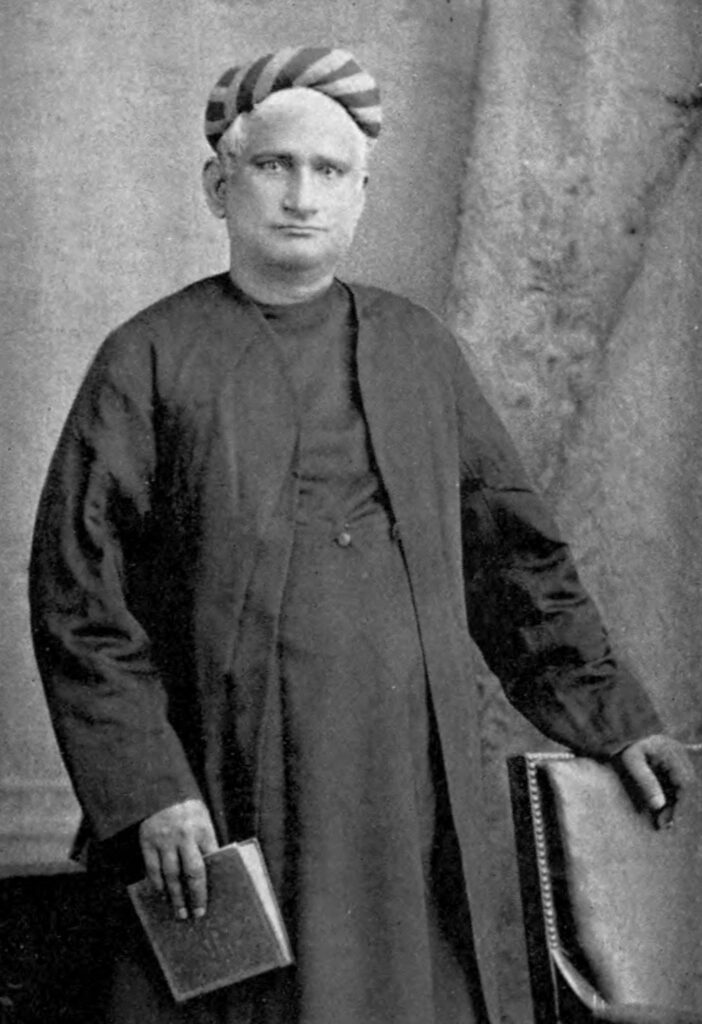
Bankim Chattapadhyay
In the first place, I do not believe that it is either possible or desirable to promote social reforms by invoking the authority of the Sastras. I had to object on the same ground to the late lamented Ishwar Chandra Vidyasagar’s proposals to suppress polygamy with the aid of the Sastras; and I have seen no ground since then to change my opinion. This opinion I hold on two grounds. The first is, that Bengali society is governed not by the Sastras but by custom. It is true, that very often custom follows the Sastras; but as often again custom conflicts with the Sastras. When there is such a conflict custom carries the day.
You seek to collect the behests of the Sastras, regarding sea-voyages, and to induce society to follow them;—are you prepared to induce society to be guided by the Sastras on all other matters as well? One of the precepts of the Dharma Sastras is, that it is the duty of the Shudras to perform menial offices for the Brahmins and other superior castes;—do the Shudras of Bengal follow the precept?
The second reason for my opinion is that if society were everywhere governed by the Sastras, it is doubtful whether the result will be social welfare. You seek to collect the behests of the Sastras, regarding sea-voyages, and to induce society to follow them;—are you prepared to induce society to be guided by the Sastras on all other matters as well? One of the precepts of the Dharma Sastras is, that it is the duty of the Shudras to perform menial offices for the Brahmins and other superior castes;—do the Shudras of Bengal follow the precept? The Sastras are not a guide here. Are any of you prepared to enforce this precept? Do you think that any endeavours to enforce it will succeed? Will a Sudra Judge of the High Court leave the bench, or will the prosperous Shudra zamindar leave the zamindar’s seat, to respectfully tend the feet of the Brahmin manufacturer of eatables? By no means. Bengali society obeys a portion of the Dharma Sastras according to its necessities. The rest it has cast off because of its necessities. The same feeling of necessity may induce it to cast off what still remains. What good then there is in seeking to ascertain the commands of the Dharma Sastras?
My own conviction is that it is impossible to carry out social reformation regarding any particular practice merely on the strength of the Sastras without religious and moral regeneration along the whole line. This I have tried to explain at length in my work on Krishna Charitra. I have already stated that society here is governed by custom, not by the Sastras. Reforms in custom can be achieved only when there is an advance in religion and morals along the whole line. The present agitation is the outcome of the advance that has already taken place. As society advances gradually in religion and morals, the objections against sea-voyages will disappear, or if any opposition should still continue to exist, it would be powerless. But so long as the full measure of advance is not attained, so long it will be impossible to make sea-voyages acceptable to society.
But it has also to be observed that none of us are aware of the exact measure of opposition which exists in Bengali society towards sea-voyages. I see that whoever commands the necessary means and is otherwise favorably circumstanced, does proceed to Europe when willing to do so. I have not come across a single instance in which the journey to Europe was abandoned out of respect to the authority of the Sastras. But I am also bound to admit that most of those who return from Europe remain outside the pale of Hindu society. It is a question whether the fault lies with them, or with Hindu society. On their return to this country they voluntarily keep away from Bengali society by adopting European habits and customs. They separate themselves from us by adopting foreign costumes, foreign habits of living, and foreign usages. Those who on their return from Europe did not adopt this course have in many instances been re-admitted into Hindu society. If gentlemen returning from Europe did generally resume habits and usages conformable to Hindu society, it is impossible to say that they would be as a body left outside its precincts.
I have not come across a single instance in which the journey to Europe was abandoned out of respect to the authority of the Sastras. But I am also bound to admit that most of those who return from Europe remain outside the pale of Hindu society. It is a question whether the fault lies with them, or with Hindu society.
Lastly, I have to point out that before deciding the question as to whether sea-voyages are in conformity to the Dharma Sastras of the Hindus, it is necessary to decide whether it is not in conformity to Dharma (religion) itself. Must we reject that which is conformable to religion but opposed to the Dharma Sastras, merely because it is opposed to the Dharma Sastras? Many will say that alone which is conformable to the Hindu Dharma Sastras is religion; and that which is not conformable to them is irreligion. I am not prepared to admit this. None of the older sacred books of Hindus say so. Krishna in the Mahabharata says— “Dharma is so called because it holds all. Know that for certain to be Dharma, which contributes to the general welfare.” If the Mahabharata is not guilty of a falsehood, if he whom the Hindus worship as the Divine Incarnation is not guilty of falsehood, then that which is for the general welfare is religious. Now, are sea-voyages for the general welfare or not? If they are, why should they be opposed because they do not happen to be encouraged by the Smritis? . . . Sea-voyages are conformable to religion because they tend to the general good. Therefore, whatever the Dharma Sastras may say, sea-voyages are conformable to the Hindu religion.
These excerpts have been carried courtesy the permission of Rahul Sagar and Juggernaut. You can buy To Raise a Fallen People, here.
ARCHIVE
New Leaders and Their Different Ideologies
After the failure of the non-cooperation movement, the Indian people had lost hope. Communal conflict between Hindus and Muslims wiped out the little resolve that still remained. But once a sense of awakening has come upon a nation, it cannot remain asleep for long. In just a few days, the public is back on its feet and ready for battle. Today, India is full of life and vigour again; it is awake. We may not see clear signs of a great mass movement, but the ground is certainly being prepared for it. Many new leaders with a modern sensibility are emerging. Young leaders are at the forefront this time, and youth movements are proliferating. Only young leaders are commanding the attention of patriotic-minded Indians. Even the tallest veteran leaders are being left behind.
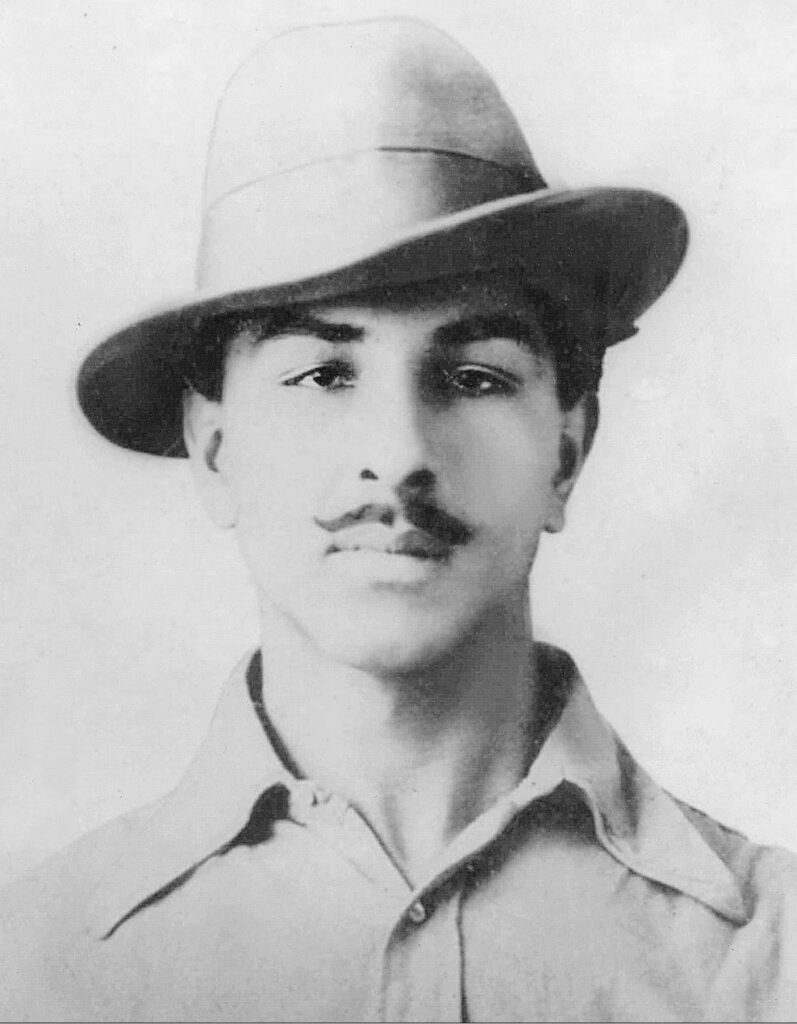
Bhagat Singh
Many new leaders with a modern sensibility are emerging. Young leaders are at the forefront this time, and youth movements are proliferating. Only young leaders are commanding the attention of patriotic-minded Indians.
The leaders who have gained prominence this time are the venerable Subhash Chandra Bose of Bengal and the eminent Pandit Jawaharlal Nehru. These are the two leaders who appear to be rising above all others in India and involving themselves in youth movements in particular. They are both uncompromising champions of Indian independence; both intelligent and genuine patriots. And yet, their ideologies are as different as night and day. One is believed to be a devotee and proponent of India’s ancient culture and the other a committed follower of western civilization. If one is regarded as tender-hearted and sensitive, the other is spoken of as a quintessential revolutionary. Our attempt in this essay will be to present their respective ideologies before the public, so that people understand the difference between the two and make up their own minds.
But before we examine the ideas of these two leaders, it is important to mention another who is a champion of independence just as they are, and is also a prominent figure in certain youth movements. Sadhu Vaswani may not be as well known as the leading lights of the Congress, he may not occupy a special place in the country’s political arena, yet his influence is apparent among the youth, who will shape the country’s future. The organization Sadhu Vaswani founded — Bharat Yuva Sangh — has a particular hold on young Indians. Vaswani’s ideology can be summed up in a single phrase: back to the Vedas. This call was first given by the Arya Samaj. It is based on the belief that the Almighty has poured all the knowledge of the world into the Vedas. No progress is possible beyond them. Therefore, the world has not and cannot achieve anything greater than the wonders our very own India had achieved in the ancient past! So that is the entire faith of people like Vaswani. Which why he says:
“Up until now, our politics has either considered Mazzini and Voltaire as its ideals, or it has sought inspiration from Lenin and Tolstoy. This, when they should know that they have far greater ideals in our ancient rishis…”
Vaswani is convinced that once upon a time, our country had reached the final summit of development and today there is no reason for us to move forward at all; we only need to go back to the past.
Vaswani is a poet. Everything about his ideology is poetic. He is also a great practitioner of religious dharma. He wants to establish ‘Shakti-dharma’. He says, ‘At this time we need shakti — power — more than ever. He does not use the word ‘shakti’ only for India. He sees the word as the path and means to a kind of Devi, a special godhead. Like a very emotional poet he tells us:
‘For in solitude have I communicated with her, our admired Bharat Mata and my aching head has heard voices saying — “The day of freedom is not far off.” Sometimes indeed a strange feeling visits me and I say to myself: Holy, holy is Hindustan. For still is she under the protection of her mighty Rishis and their beauty is around us, but we behold it not.’
It must be the poet’s lament that makes him declare, over and over like a man deranged or distracted: ‘Our mother is the greatest. She is the mightiest. No one alive can vanquish her!’ In this fashion, driven purely by emotion, he ends up saying things like this: ‘Our national movement must become a purifying mass movement, if it is to fulfill its destiny without falling into class war one of the dangers of Bolshevism.’
He believes that all one needs to do is to say — ‘Go among the poor, go to the villages, give them free medicines’ — and our mission is accomplished. He’s a romantic poet. His poetry can offer no special purpose, it can only excite the heart a little. In fact, he has no vision to offer, except great noise about our ancient civilisation. He gives nothing to young minds. His only aim is to fill every heart with plain emotion. He has obvious influence among the youth, and it is growing. His ideas are regressive and patchy, as we’ve seen above. Such ideas have no direct connection with politics, and yet they have a significant effect. Mainly because it is the youth who are the future, and it is among them that such ideas are being propagated.
The leaders who have gained prominence this time are the venerable Subhash Chandra Bose of Bengal and the eminent Pandit Jawaharlal Nehru. These are the two leaders who appear to be rising above all others in India and involving themselves in youth movements in particular. They are both uncompromising champions of Indian independence; both intelligent and genuine patriots. And yet, their ideologies are as different as night and day.
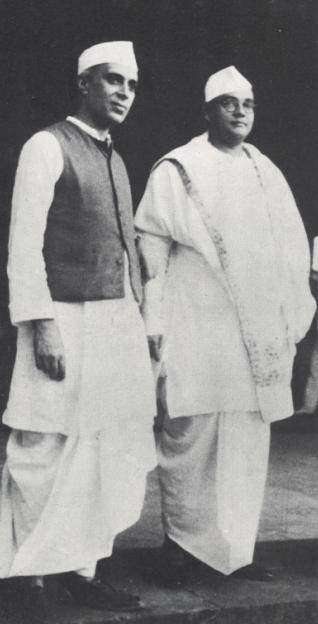
Jawaharlal Nehru with Subhas Chandra Bose
Let us now return to Subhash Chandra Bose and Jawaharlal Nehru. During the last three months, they have both chaired many conferences and put their thoughts and ideas before people. The government considers Subhash Babu a member of the group that is committed to overthrowing it, for which reason it had charged and imprisoned him under the Bengal Act. Upon his release, he was chosen as the leader of the Extremist group [of the Congress]. He espouses Purna Swaraj [complete independence], and argued for this in his presidential address at the Maharashtra session [of the Congress].
Pandit Jawaharlal Nehru is the son of the Swaraj Party leader Motilal Nehru. He is a barrister, and a very learned man. He has travelled to Russia and other countries. He is also a leader of the Extremist group, and it was due to his efforts, and those of his fellow leaders, that the resolution for Purna Swaraj was passed and adopted at the Madras session. Before this, he had spoken emphatically in favour of Purna Swaraj at the Amritsar session.
And yet, the two leaders are poles apart in their thinking. Reading the transcripts of their speeches at the Amritsar and Maharashtra sessions, this difference was apparent to us. But the difference became clear as daylight after a speech delivered in Bombay. Pandit Nehru was chairing the conference and Subhash Bose made a speech. He is a very emotional Bengali. He began his address with the statement that India has a special message for the world. It has a lesson in spirituality for humanity. And then he launched into his speech like a man in the grip of disorienting emotion — ‘Behold the Taj Mahal on a moonlit night and think of the vision of that heart that imagined it. Recall that a Bengali novelist has written that “our flowing tears hardened into stone within us”. Bose also declares that we should return to the Vedas. In his Poona [Congress session] address, he had expounded on ‘nationalism’ and said that internationalists criticize nationalism as narrow, chauvinistic ideology, but that this is a mistake. Indian nationalist thought, according to him, is nothing of the kind. It is not chauvinistic. It is not born of self-interest, and it is not oppressive, because at its root is the philosophy of Satyam Shivam Sundaram — Truth is bountiful and beautiful.
The same old romanticism. Pure emotionalism. And [like Vaswani], Bose too has great faith in his ancient past. He sees only greatness in this ancient era. In his thinking, there’s nothing new in the system of panchayati raj, or the rule of the people, which he says is very old in India. He goes so far as to say that Communism isn’t new to India either. Anyway, that day in Bombay, he went on long and hard about India’s special message for the world.
Pandit Jawaharlal Nehru, like many others, holds an entirely different view: ‘Every country thinks it has a special message for the world. England has arrogated to itself the right to teach the world culture. I don’t see anything special that belongs to my country alone. But Subhash Babu has great belief in such things!’ Nehru also says, ‘Every youth must rebel. Not only in the political sphere, but in social, economic and religious spheres also. I have not much use for any man who comes and tells me that such and such thing is said in the Koran. Everything unreasonable must be discarded, even if they find authority for it in the Vedas and the Koran.’
One man thinks our old systems are very superior; the other man believes we should rebel against these systems. Yet the latter is called emotional, sensitive, and the former a transformative revolutionary!
These are the thoughts of a true revolutionary, while Subhash Chandra’s are the thoughts of someone who wants to replace one regime with another. One man thinks our old systems are very superior; the other man believes we should rebel against these systems. Yet the latter is called emotional, sensitive, and the former a transformative revolutionary! At one point Pandit Nehru says:
“To those who still fondly cherish old ideas and are starving to bring back the conditions which prevailed in Arabia 1300 years ago or in the vedic age in India, I say that it is inconceivable that you can bring back the hoary past. The world of reality will not retrace its steps, the world of imagination may remain stationary.”
This is why it feels necessary to revolt.
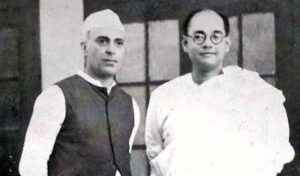
Jawaharlal Nehru and Subhash Chandra Bose
Subhash Babu supports Purna Swaraj, complete independence, because the British are people of the West and we are of the East. Pandit Ji’s position is that we need to establish our own rule so that we can change the entire social structure. This is why we must have complete and absolute independence.
Subhash Babu is in sympathy with labour, the working class, and wants to improve their condition. Pandit ji wants to bring in revolution and change the existing system altogether. Subhash Chandra is emotional and romantic — he is giving the young food for their hearts, and only their hearts. The other man is an epochal change — maker who is fuelling not just the heart but also the mind:
“They should aim at Swaraj for the masses based on Socialism. That was a revolutionary change which they could not bring about without revolutionary methods… Mere reform or gradual repairing of the existing machinery could not achieve the real, proper Swaraj for the general masses.”
Subhash Babu feels the need to focus on national politics only as long as it is necessary to safeguard and promote India’s position in world politics. But Pandit ji has freed himself of the narrow confines of plain nationalism and emerged into an open field.
Subhash Babu feels the need to focus on national politics only as long as it is necessary to safeguard and promote India’s position in world politics. But Pandit ji has freed himself of the narrow confines of plain nationalism and emerged into an open field.
Now the ideas of the [two] leaders are before us. Which way should we incline? One Punjabi newspaper has heaped praise upon Subhash Chandra and said of Pandit ji and others that such rebels destroy themselves beating their heads against stone. We must of course remember that Punjab has always been a rather emotional province. People’s passions here rise very quickly and just as quickly subside, like foam.
Subhash Chandra doesn’t appear to be providing any intellectual nourishment, only food for the heart. The need of the hour now is for the youth of Punjab to understand and strengthen revolutionary ideas. At this time, Punjab needs food for the mind, does not mean we should become his blind followers. But as far as ideas are concerned, the young people of Punjab should align themselves with him, so that they can know the true meaning of revolution, realize the need for a revolution in India, understand the significance of revolution in the world at large, and so on Through serious thought and analysis, the youth should bring clarity and conviction to their ideas, so that even in times of very little hope, times of disillusionment and defeat, they should not lose direction, stand tall and strong against a hostile world and not give up. This is how the public will achieve the goal of revolution.
— Bhagat Singh
This is a translation of Bhagat Singh’s ‘Naye Netaaon ke Alag Alag Vichar’ in the July 1928 issue of the journal Kirti. This translated version has been carried courtesy the permission of Purushottam Agrawal.
You can buy Who is Bharat Mata? On History, Culture and the Idea of India: Writings by and On Jawaharlal Nehru here.
ARCHIVE
The Diary of Mahadev Desai
March 10, 1932
I had not the faintest idea that such a day as this would dawn for me. But I did once dream in Nasik prison that I was all of a sudden taken to Bapu in Yeravda prison and that I fell at his feet, crying all the while and unable to check my tears.
Roche came to me in the morning and said, “You are being transferred from here; you get ready in one hour.” I asked him, “Where will they take me?” He replied, “You will be happy and thankful when you know it but I must not say a word.” I asked to meet Dr. Chandulal Desai but my request was turned down. We left Nasik at nine. The policemen who escorted me were the same as had a few days ago accompanied Vitthalbhai here. One of them turned out to be an old acquaintance of the days when Bapu saw Lord Reading. He remembered the date correctly — June 17, 1921. He was then a bearer to Sir Charles Innes. He had subsequently served elsewhere and was now in the police.
When Akbar Ali embraced me with tearful eyes and told me from his closed cell about his prayerful wish that I should be kept with Gandhiji, I said, “You may pray for me, but can I be so lucky as that?” He replied, “True, but I can only hope and pray.” What stories had I heard about Akbar Ali! But he showered his affection on me, and his prayers bore fruit. Pyarelal used to tell everybody at Nasik that they had fixed this up with Martin. This was also true though I regarded it as a mere joke.
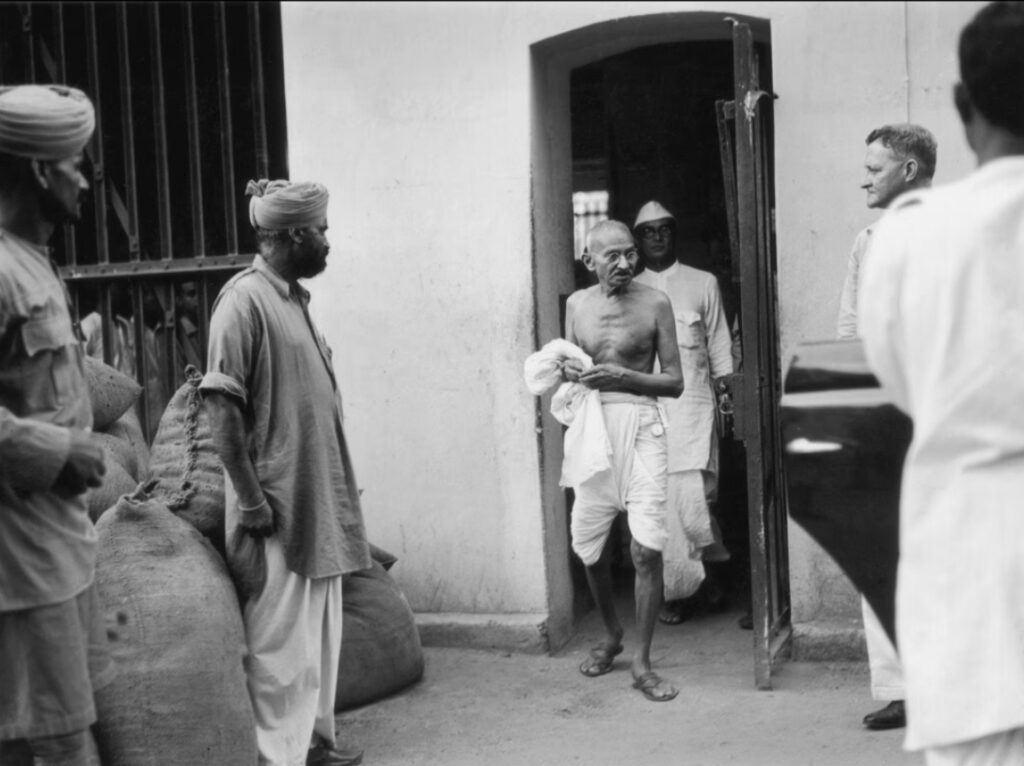
Gandhi in jail
I was received rather coldly at Yeravda prison and I feared they just wanted to get rid of me at Nasik, without keeping me in Bapu’s company here. Then came Kateli, smiling, and asked me to go with him. He was informed at four in the morning that I was to be kept with Gandhiji. Bapu too was surprised when I placed my head at his feet. He patted me on the back, the head and the cheeks more fondly than ever before. I felt deeply grateful but was overwhelmed by a sense of my unworthiness. Later I learnt from Bapu and the Sardar that Shri Purushottamdas also had a hand in bringing me to Yeravda. Last time Dahyabhai did say that — had done the needful.
Bapu too was surprised when I placed my head at his feet. He patted me on the back, the head and the cheeks more fondly than ever before. I felt deeply grateful but was overwhelmed by a sense of my unworthiness.
After some rambling talk, Bapu said, “You have come at the right moment, for Vallabhbhai is at his wit’s end. Did he tell you about it?” Vallabhbhai suggested that I should eat something before we started our discussions. He brought me food — bread, butter, curds and boiled sweet potatoes. He and Bapu had already finished their meals. When I finished, Bapu gave me his letter to Sir Samuel Hoare and asked me what I thought of it.
I said, “I find the reasoning sound. I have often felt about the repression that one need not be surprised if some day it leads Bapu thus to voice his indignation. Why does Vallabhbhai object? Is it because as President of Congress, he finds himself unable to endorse this step of yours?”
Bapu said, “No, he is not worried on that account. He doubts if he can give his consent as a co-worker. But I have never imagined Vallabhbhai looking at things from a religious viewpoint. It is only to be expected that he should look at this from the political angle. My relations with Vallabhbhai are not on a religious basis, as they are with you. Vallabhbhai is afraid that I shall lay myself open to misinterpretation. The Government will say: ‘Gandhi has always been a man of this type. He has gone mad; Let him alone with his madness.’ And Vallabhbhai also thinks the people will be shocked, and then again there is the grave danger of such fasts being imitated in the wrong spirit. But that does not matter. What if I am taken for a mad man and die? That would be the end of my mahatmaship, if it is false and undeserved. Friends like Remain Rolland will understand my standpoint. But even if they don’t, I should be concerned only with my duty as a man of religion.”
I said, “The world can understand fast as a protest against repression but not perhaps on the question of Harijan representation. The British will try to mislead the world into believing that most if not all Harijans favour separate electorates. I should also suggest you make it clearer how the separate electorates are intended to strike a blow at the body politic. I am pretty sure, however, that even honest Britons will fail to see how.”
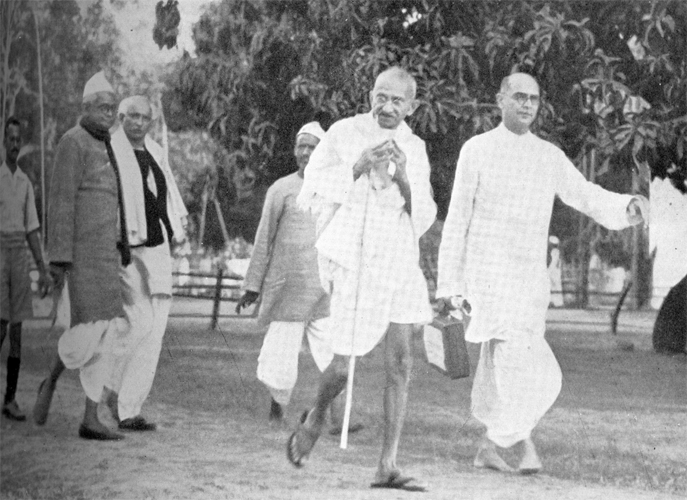
Gandhi with Mahadev Desai
Bapu said, “If we tried to make this clearer, we would have to describe the Muslims’ share in this sordid business. And that would increase Hindu-Muslim tension. This would be very much like what happened in connection with the earlier twenty-one days’ fast when Mahomed Ali got a few sentences in my statement scored out.”
I said, “Some will ask if this really was a sin more heinous than that committed by the Hindus so that you felt yourself compelled to undertake a fast.”
“Some will ask if this really was a sin more heinous than that committed by the Hindus so that you felt yourself compelled to undertake a fast.”
Bapu said, “We have been trying to make Hindu society repent of its sin. But the separate electorates are meant to perpetuate the sin or to make it impossible for the Hindus to repent. They will end in nothing but a civil war between the caste Hindus and Harijans, and between Hindus and Muslims.”
Vallabhbhai said, “I am unconvinced of the rightness of your move, but now you are free to do what you think is right.”
Bapu corrected the letter and went to bed. But I did not sleep till after midnight.
We got up at a quarter to four for the morning prayers. We had a wash and as we gathered together, Bapu gave the programme: “Vallabhbhai recites the shlokas (stanzas). He has little knowledge of Sanskrit and his pronunciation is bad. So I thought this was the only way it could be improved. You will find that he has made considerable progress. I sing the hymn, but not from memory. So we read one hymn after another from the Ashram hymnal. We thought we would start with the Marathi section today. But now that you are here, you will lead us in singing the hymn and in “Ramadhun”. I requested Bapu to lead us in Ramadhun. This discussion we had had at night. My first hymn was Prabhu mere etc., ‘O God, do not mind my heavy load of sin.’ What else could I have sung?
March 30, 1932
This morning we happened to talk about a certain Muslim leader. Vallabhbhai said, “He too took a narrow communal view in time of crisis and asked for a separate relief fund for Muslims and a separate appeal for it.” Bapu said, “He is not at fault on that score. What is he to do if we create such an environment for him? What amenities do we offer Muslims? They are mostly treated like untouchables. If I wished to send Amtul Salam to Devlali, could I ask — to put her up? The fact is that we should not go to the Bhatia sanatorium or for that matter any other place which excludes Amtul or any one else. Indeed it is up to the Hindus to take a step forward. As it is, the bitterness is increasing. It can be mitigated only if the Hindus wake up and break down the barriers they have erected. Perhaps the barriers were needed at a certain time, but now there is no earthly use for them.” Vallabhbhai said, “But the manners and customs of Muslims are different. They take meat while we are vegetarians. How are we to live with them in the same place?” Bapu replied, “No, sir. Hindus as a body are nowhere vegetarians except in Gujarat. Almost every Hindu takes meat in the Punjab, Uttar Pradesh and Sindh. . . . All at present are on their trial. Let us wait and see, with faith that all will be well in the end.”
What is he to do if we create such an environment for him? What amenities do we offer Muslims? They are mostly treated like untouchables.
The Civil Surgeon examined Bapu, and placing the stethoscope on his chest said, “I would be proud to possess a heart like that.” So saying he passed on to other prisoners. Bapu did not tell him about the pain in his fingers. He examined my leg but had no treatment to suggest. It seemed as if he wanted to finish an unpleasant task somehow or other. No other Civil Surgeon went away like this without wanting to have a word with Bapu. This one is capable of amazing self-restraint.
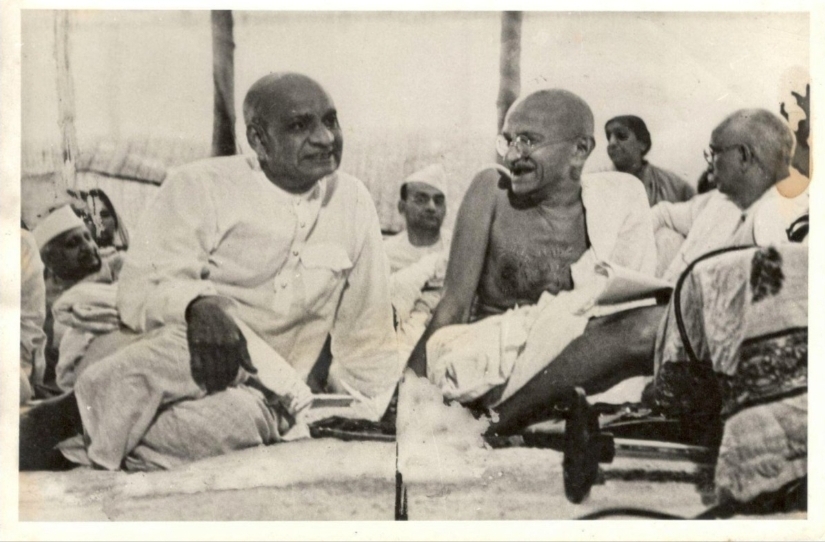
Gandhi and Patel
Sir John Anderson has come with testimonials from all. I showed to Bapu Laski’s remarks about him. Bapu said, “Perhaps that is true. If so he will capture Bengali hearts, win over Subhas Bose and Sengupta and disregard Congress. The same fate is perhaps in store for the Punjab. I do not think there will be peace in all parts of India at the same time. I imagine they will pacify one province after another.”
Bapu compelled me to sleep in the open from today and asked the Major for a cot for me.
The Major said, “Thirty or forty women prisoners all want to write to you. What shall I do about it? Would it not do if they just sent you their signatures ?” Bapu replied, “If you wish, I will ask them to be satisfied with writing only a couple of lines each. Why deprive them of this satisfaction? They are all so gentle.”
April 1, 1932
… We happened to talk about Ambedkar. Bapu said, “Till I went to England, I did not know that he was a Harijan. I thought he was some Brahman who took deep interest in Harijans and therefore talked intemperately.” Vallabhbhai said he knew he was a Harijan, as he had made his acquaintance when the Harijan leader toured Gujarat with Thakkar. Then we turned to Thakkar Bapa and the Servants of India Society’s attitude to Harijans.
“Till I went to England, I did not know that he was a Harijan. I thought he was some Brahman who took deep interest in Harijans and therefore talked intemperately.”
Bapu said, “Their attitude is responsible for the shape that question has assumed nowadays. I noticed this when I lived in the Poona home of the Society in 1915 after the death of Gokhale. I asked Devadhar for a brief note on their activities, so that I would see what I could do. This note advised that we should deliver speeches before Harijan meetings, and create in them a consciousness of the injustice done to them by Hindu society. I said to Devadhar, ‘Here you give me a stone when I asked you for bread. We cannot serve Harijans in this fashion. It is not service, but patronage pure and simple. Who are we to uplift Harijans? We can only atone for our sin against them or discharge the debt we owe to them, and this we can do only by adopting them as equal members of society, and not by haranguing them.’ At this Sastri was taken aback and said, ‘ We did not expect that you would speak in such a magisterial tone.’ And Hari Narayan Apte was very angry. I said to him, ‘I am afraid you will make Harijans rise in rebellion against society.’ Apte replied, ‘Yes, let there be a rebellion. That is just what I want.’ In this way there was a lot of discussion, so that the next day I said to Sastri, Devadhar, Apte and others that I had no idea I would cause them pain. This apology left a good impression on their minds. And afterwards we pulled on well together.” Vallabhbhai said, “You can work in harmony with everybody. It does not cost you any effort. Vaniks (merchants) do not mind humbling themselves.”
Who are we to uplift Harijans? We can only atone for our sin against them or discharge the debt we owe to them, and this we can do only by adopting them as equal members of society, and not by haranguing them.
August 17, 1932
The communal decision was published today. Bapu went about his work till the evening as if nothing had happened. He asked me to prepare a hajra cake and ate it with relish. Almond butter was made with the help of the machine. As we were taking the usual evening walk, he read Horniman’s article and liked it. In the course of conversation in the morning he said: ‘The decision only confirms the minorities’ pact. Everything has gone according to the plan in Benthall’s letter.’
I said the new constitution was worse than the Montagu-Chelmsford reforms. “Certainly,” replied Bapu. “Those reforms were based on the Lucknow agreement between Congress and the Muslim League. But this constitution seeks to create such divisions in the country that it can never again stand up on its own legs.” Just before the evening prayer he said to me, “Well, you and the Sardar think over the situation and tell me whatever you feel like saying. The letter to Samuel Hoare details the steps I should take in order to deal with the present situation. I have therefore to serve the British Government with a notice.” I was taken aback and said nothing. The Sardar also had a similar feeling. I sang Surdas’s hymn and began to read the Ashram post.
The letters which had to be written were written at once, and then Bapu began to write the letter to MacDonald.
August 18, 1932
After finishing it in the morning Bapu said, “You stop spinning for a while and go through this letter so that it may be sent at once.” The Sardar and I read it. Then he said, ‘There is no reference in the letter to other parts of the decision. May not this be misinterpreted to mean that they are approved by you?” “No,” replied Bapu. “My views are well-known. Still if you wish, I will insert one paragraph, although I would then have to enter into argument. In this letter I propose to leave out all argument, this having been included in the letter to Samuel Hoare.” I suggested that Bapu should only say his soul rebelled against the decision as a whole, but part of it was so vicious that he would lay down his life in the attempt to get it annulled. “No,” said Bapu. “No such comparison may fairly be instituted. If it were, they would say that I wanted to get the decision annulled in its entirety and had seized upon a certain part of it as a pretext. I do want the whole decision to go. But at night I thought for a moment over the question whether other points should be included and decided against their inclusion.”
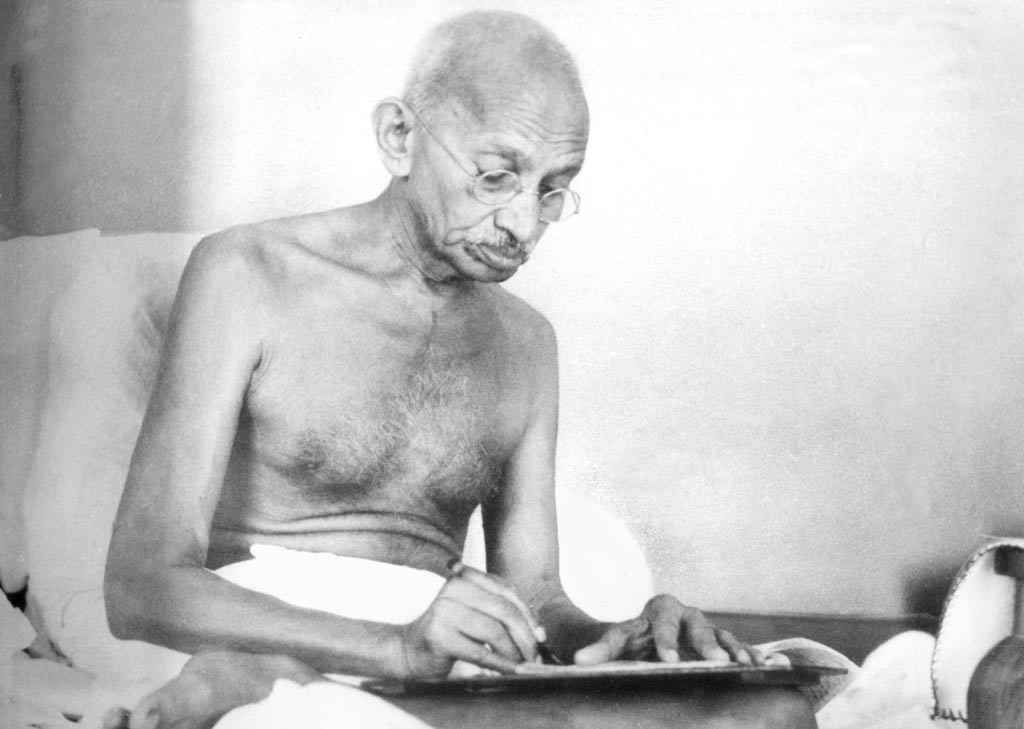
Gandhi writing a letter
The same subject was discussed in the evening. Bapu observed, “I cannot put in other things at all, for that would be tantamount to mixing politics with religion. The two questions are in fact distinct from each other.” He then continued, “I have rehearsed everything in my own mind. Everything you have suggested was considered by me before I reached the decision. Separate electorates for the Muslims and the rest are fraught with danger. They will combine with the British to suppress the Hindus. But I can think of methods by which the combination can be dealt with. When once the outsider who foments quarrels is gone, we can tackle our problems with success. But as regards the so-called untouchables I have no other remedy. How possibly am I to explain things to these poor fellows? To draw suffering on oneself when misfortune dogs one’s footsteps is no novelty. How did Sudhanva fall into the pan full of hot oil and how did Prahlad embrace a pillar of red-hot iron? There will be many Satyagraha movements even after the attainment of Swaraj. I have often had the idea that after the establishment of Swaraj I should go to Calcutta and try to stop animal sacrifice offered in the name of religion. The goats at Kalighat are worse off even than untouchables. They cannot attack men with their horns. They can never throw up an Ambedkar from their midst. My blood boils when I think of such violence. Why do they not offer tigers instead of goats?”
“Separate electorates for the Muslims and the rest are fraught with danger. They will combine with the British to suppress the Hindus. But I can think of methods by which the combination can be dealt with. When once the outsider who foments quarrels is gone, we can tackle our problems with success. But as regards the so-called untouchables I have no other remedy.”
In the morning we discussed the possible repercussions of Bapu’s step. I said, “It will be misinterpreted in a variety of ways. Here in India there will be senseless imitation of it while in America they will say Gandhi obtained his release by his fast.” “I know,” replied Bapu. “In America they will swallow anything, and there are British agents ready to help them to do so. Many will even say that I am now a bankrupt, that my spirituality is not paying dividends; therefore, I committed suicide like cunning insolvents. And in this country there will be blind imitation, and misinterpretation. The Government will perhaps release me and let me die outside prison, or perhaps they will let me die in jail, as in the case of MacSwiney. Our own men will be critical. Jawaharlal will not like it at all. He will say we have had enough of such religion. But that does not matter. When I am going to wield a most powerful weapon in my spiritual armoury, misinterpretation and the like may never act as a check.”
ARCHIVE
At Benares Hindu University (Benares, February, 1916)
MOHANDAS KARAMCHAND GANDHI
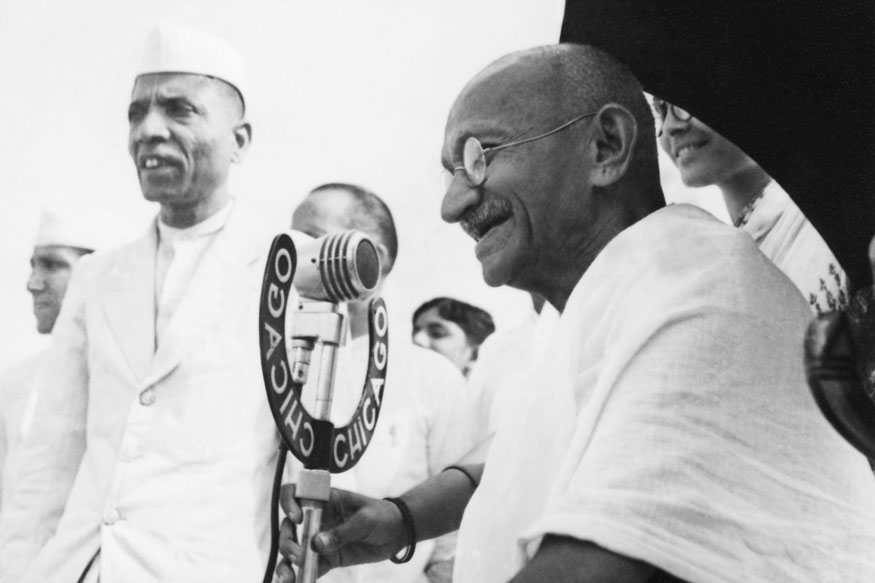
Mahatma Gandhi
I wish to tender my humble apology for the long delay that took place before I was able to reach this place. And you will readily accept the apology when I tell you that I am not responsible for the delay nor is any human agency responsible for it. The fact is that I am like an animal on show, and my keepers in their over kindness always manage to neglect a necessary chapter in this life, and, that is, pure accident. In this case, they did not provide for the series of accidents that happened to us—to me, keepers, and my carriers. Hence this delay.
Friends, under the influence of the matchless eloquence of Mrs Besant who has just sat down, pray, do not believe that our University has become a finished product, and that all the young men who are to come to the University, that has yet to rise and come into existence, have also come and returned from it finished citizens of a great empire. Do not go away with any such impression, and if you, the student world to which my remarks are supposed to be addressed this evening, consider for one moment that the spiritual life, for which this country is noted and for which this country has no rival, can be transmitted through the lip, pray, believe me, you are wrong. You will never be able merely through the lip, to give the message that India, I hope, will one day deliver to the world. I myself have been fed up with speeches and lectures. I accept the lectures that have been delivered here during the last two days from this category, because they are necessary. But I do venture to suggest to you that we have now reached almost the end of our resources in speech-making; it is not enough that our ears are feasted, that our eyes are feasted, but it is necessary that our hearts have got to be touched and that our hands and feet have got to be moved.
We have been told during the last two days how necessary it is, if we are to retain our hold upon the simplicity of Indian character, that our hands and feet should move in unison with our hearts. But this is only by way of preface. I wanted to say it is a matter of deep humiliation and shame for us that I am compelled this evening under the shadow of this great college, in this sacred city, to address my countrymen in a language that is foreign to me. I know that if I was appointed an examiner, to examine all those who have been attending during these two days this series of lectures, most of those who might be examined upon these lectures would fail. And why? Because they have not been touched.
I wanted to say it is a matter of deep humiliation and shame for us that I am compelled this evening under the shadow of this great college, in this sacred city, to address my countrymen in a language that is foreign to me. I know that if I was appointed an examiner, to examine all those who have been attending during these two days this series of lectures, most of those who might be examined upon these lectures would fail. And why? Because they have not been touched.
I was present at the sessions of the great Congress in the month of December. There was a much vaster audience, and will you believe me when I tell you that the only speeches that touched the huge audience in Bombay were the speeches that were delivered in Hindustani? In Bombay, mind you, not in Benaras where everybody speaks Hindi. But between the vernaculars of the Bombay Presidency on the one hand and Hindi on the other, no such great dividing line exists as there does between English and the sister language of India; and the Congress audience was better able to follow the speakers in Hindi. I am hoping that this University will see to it that the youths who come to it will receive their instruction through the medium of their vernaculars. Our languages are the reflection of ourselves, and if you tell me that our languages are too poor to express the best thought, then say that the sooner we are wiped out of existence the better for us. Is there a man who dreams that English can ever become the national language of India? Why this handicap on the nation? Just consider for one moment what an equal race our lads have to run with every English lad.
I had the privilege of a close conversation with some Poona professors. They assured me that every Indian youth, because he reached his knowledge through the English language, lost at least six precious years of life. Multiply that by the numbers of students turned out by our schools and colleges, and find out for yourselves how many thousand years have been lost to the nation. The charge against us is that we have no initiative. How can we have any, if we are to devote the precious years of our life to the mastery of a foreign tongue? We fail in this attempt also. Was it possible for any speaker yesterday and today to impress his audience as was possible for Mr Higginbotham? It was not the fault of the previous speakers that they could not engage the audience. They had more than substance enough for us in their addresses. But their addresses could not go home to us. I have heard it said that after all it is English educated India which is leading and which is doing all the things for the nation. It would be monstrous if it were otherwise. The only education we receive is English education. Surely we must show something for it. But suppose that we had been receiving during the past fifty years’ education through our vernaculars, what should we have today? We should have today a free India, we should have our educated men, not as if they were foreigners in their own land but speaking to the heart of the nation; they would be working amongst the poorest of the poor, and whatever they would have gained during these fifty years would be a heritage for the nation. Today even our wives are not the sharers in our best thought. Look at Professor Bose and Professor Ray and their brilliant researches. Is it not a shame that their researches are not the common property of the masses?
I have heard it said that after all it is English educated India which is leading and which is doing all the things for the nation. It would be monstrous if it were otherwise. The only education we receive is English education. Surely we must show something for it. But suppose that we had been receiving during the past fifty years’ education through our vernaculars, what should we have today? We should have today a free India, we should have our educated men, not as if they were foreigners in their own land but speaking to the heart of the nation; they would be working amongst the poorest of the poor, and whatever they would have gained during these fifty years would be a heritage for the nation.
Let us now turn to another subject.
The Congress has passed a resolution about self-government, and I have no doubt that the All-India Congress Committee and the Muslim League will do their duty and come forward with some tangible suggestions. But I, for one, must frankly confess that I am not so much interested in what they will be able to produce as I am interested in anything that the student world is going to produce or the masses are going to produce. No paper contribution will ever give us self-government. No amount of speeches will ever make us fit for self-government. It is only our conduct that will make us fit for it. And how are we trying to govern ourselves?
I want to think audibly this evening. I do not want to make a speech and if you find me this evening speaking without reserve, pray, consider that you are only sharing the thoughts of a man who allows himself to think audibly, and if you think that I seem to transgress the limits that courtesy imposes upon me, pardon me for the liberty I may be taking. I visited the Vishwanath temple last evening, and as I was walking through those lanes, these were the thoughts that touched me. If a stranger dropped from above on to this great temple, and he had to consider what we as Hindus were, would he not be justified in condemning us? Is not this great temple a reflection of our own character? I speak feelingly, as a Hindu. Is it right that the lanes of our sacred temple should be as dirty as they are? The houses round about are built anyhow. The lanes are tortuous and narrow. If even our temples are not models of roominess and cleanliness, what can our self-government be? Shall our temples be abodes of holiness, cleanliness and peace as soon as the English have retired from India, either of their own pleasure or by compulsion, bag and baggage?
I entirely agree with the President of the Congress that before we think of self-government, we shall have to do the necessary plodding. In every city there are two divisions, the cantonment and the city proper. The city mostly is a stinking den. But we are a people unused to city life. But if we want city life, we cannot reproduce the easy-going hamlet life. It is not comforting to think that people walk about the streets of Indian Bombay under the perpetual fear of dwellers in the storeyed building spitting upon them. I do a great deal of railway travelling. I observe the difficulty of third-class passengers. But the railway administration is by no means to blame for all their hard lot.
We do not know the elementary laws of cleanliness. We spit anywhere on the carriage floor, irrespective of the thoughts that it is often used as sleeping space. We do not trouble ourselves as to how we use it; the result is indescribable filth in the compartment. The so-called better class passengers overawe their less fortunate brethren. Among them I have seen the student world also; sometimes they behave no better. They can speak English and they have worn Norfolk jackets and, therefore, claim the right to force their way in and command seating accommodation.
We do not know the elementary laws of cleanliness. We spit anywhere on the carriage floor, irrespective of the thoughts that it is often used as sleeping space. We do not trouble ourselves as to how we use it; the result is indescribable filth in the compartment. The so-called better class passengers overawe their less fortunate brethren.
I have turned the searchlight all over, and as you have given me the privilege of speaking to you, I am laying my heart bare. Surely we must set these things right in our progress towards self-government. I now introduce you to another scene. His Highness the Maharaja who presided yesterday over our deliberations spoke about the poverty of India. Other speakers laid great stress upon it. But what did we witness in the great pandal in which the foundation ceremony was performed by the Viceroy? Certainly a most gorgeous show, an exhibition of jewellery, which made a splendid feast for the eyes of the greatest jeweler who chose to come from Paris. I compare with the richly bedecked noble men the millions of the poor. And I feel like saying to these noble men, ‘There is no salvation for India unless you strip yourselves of this jewellery and hold it in trust for your countrymen in India.’ I am sure it is not the desire of the King-Emperor or Lord Hardinge that in order to show the truest loyalty to our King-Emperor, it is necessary for us to ransack our jewellery boxes and to appear bedecked from top to toe. I would undertake, at the peril of my life, to bring to you a message from King George himself that he accepts nothing of the kind.
Sir, whenever I hear of a great palace rising in any great city of India, be it in British India or be it in India which is ruled by our great chiefs, I become jealous at once, and say, ‘Oh, it is the money that has come from the agriculturists.’ Over seventy-five percent of the population are agriculturists and Mr Higginbotham told us last night in his own felicitous language, that they are the men who grow two blades of grass in the place of one. But there cannot be much spirit of self-government about us, if we take away or allow others to take away from them almost the whole of the results of their labour. Our salvation can only come through the farmer. Neither the lawyers, nor the doctors, nor the rich landlords are going to secure it.
Now, last but not the least, it is my bounden duty to refer to what agitated our minds during these two or three days. All of us have had many anxious moments while the Viceroy was going through the streets of Benares. There were detectives stationed in many places. We were horrified. We asked ourselves, ‘Why this distrust?’ Is it not better that even Lord Hardinge should die than live a living death? But a representative of a mighty sovereign may not. He might find it necessary to impose these detectives on us? We may foam, we may fret, we may resent, but let us not forget that India of today in her impatience has produced an army of anarchists. I myself am an anarchist, but of another type. But there is a class of anarchists amongst us, and if I was able to reach this class, I would say to them that their anarchism has no room in India, if India is to conquer the conqueror. It is a sign of fear. If we trust and fear God, we shall have to fear no one, not the maharajas, not the viceroys, not the detectives, not even King George.
I myself am an anarchist, but of another type. But there is a class of anarchists amongst us, and if I was able to reach this class, I would say to them that their anarchism has no room in India, if India is to conquer the conqueror. It is a sign of fear. If we trust and fear God, we shall have to fear no one, not the maharajas, not the viceroys, not the detectives, not even King George.
I honour the anarchist for his love of the country. I honour him for his bravery in being willing to die for his country; but I ask him— is killing honourable? Is the dagger of an assassin a fit precursor of an honourable death? I deny it. There is no warrant for such methods in any scriptures. If I found it necessary for the salvation of India that the English should retire, that they should be driven out, I would not hesitate to declare that they would have to go, and I hope I would be prepared to die in defense of that belief. That would, in my opinion, be an honourable death. The bombthrower creates secret plots, is afraid to come out into the open, and when caught pays the penalty of misdirected zeal.
I have been told, ‘Had we not done this, had some people not thrown bombs, we should never have gained what we have got with reference to the partition movement.’ (Mrs Besant: ‘Please stop it.’) This was what I said in Bengal when Mr Lyon presided at the meeting. I think what I am saying is necessary. If I am told to stop I shall obey. (Turning to the Chairman) I await your orders. If you consider that by my speaking as I am, I am not serving the country and the empire I shall certainly stop. (Cries of ‘Go on.’) (The Chairman: ‘Please, explain your object.’) I am simply… (another interruption). My friends, please do not resent this interruption. If Mrs Besant this evening suggests that I should stop, she does so because she loves India so well, and she considers that I am erring in thinking audibly before you young men. But even so, I simply say this, that I want to purge India of this atmosphere of suspicion on either side, if we are to reach our goal; we should have an empire which is to be based upon mutual love and mutual trust. Is it not better that we talk under the shadow of this college than that we should be talking irresponsibly in our homes? I consider that it is much better that we talk these things openly. I have done so with excellent results before now. I know that there is nothing that the students do not know. I am, therefore, turning the searchlight towards ourselves. I hold the name of my country so dear to me that I exchange these thoughts with you, and submit to you that there is no room for anarchism in India. Let us frankly and openly say whatever we want to say our rulers, and face the consequences if what we have to say does not please them. But let us not abuse.
I was talking the other day to a member of the much-abused Civil Service. I have not very much in common with the members of that Service, but I could not help admiring the manner in which he was speaking to me. He said: ‘Mr Gandhi, do you for one moment suppose that all we, Civil Servants, are a bad lot, that we want to oppress the people whom we have come to govern?’ ‘No,’ I said. ‘Then if you get an opportunity put in a word for the much-abused Civil Service.’ And I am here to put in that word. Yes, many members of the Indian Civil Service are most decidedly overbearing; they are tyrannical, at times thoughtless. Many other adjectives may be used. I grant all these things and I grant also that after having lived in India for a certain number of years some of them become somewhat degraded. But what does that signify? They were gentlemen before they came here, and if they have lost some of the moral fibre, it is a reflection upon ourselves.
Just think out for yourselves, if a man who was good yesterday has become bad after having come in contact with me, is he responsible that he has deteriorated or am I? The atmosphere of sycophancy and falsity that surrounds them on their coming to India demoralizes them, as it would many of us. It is well to take the blame sometimes. If we are to receive self-government, we shall have to take it. We shall never be granted self-government. Look at the history of the British Empire and the British nation; freedom loving as it is, it will not be a party to give freedom to a people who will not take it themselves. Learn your lesson if you wish to from the Boer War. Those who were enemies of that empire only a few years ago have now become friends…
If we are to receive self-government, we shall have to take it. We shall never be granted self-government. Look at the history of the British Empire and the British nation; freedom loving as it is, it will not be a party to give freedom to a people who will not take it themselves. Learn your lesson if you wish to from the Boer War. Those who were enemies of that empire only a few years ago have now become friends…
(At this point there was an interruption and a movement on the platform to leave. The speech, therefore, ended here abruptly).
Election Speech (December, 1926)
KAMALADEVI CHATTOPADHYAY
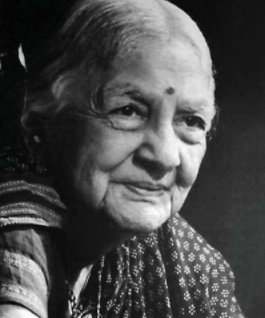
Kamaladevi Chattopadhyay
If you peep into the dim unknown history of India, the history of which is written not on palm leaves or papers, but is alive in the hearts of everyone of us, you will find that the position of women was indeed an enviable one. Never in the history of any country, at any time, has woman been so honoured as she has been in this country. Though apparently she seems to have lost her voice, she has always been the vital element in the evolution of the country and the nation. When I was travelling abroad, I was often asked how the suffragist movement in India was progressing. I could only tell them that there was no suffragist movement in India. In fact, there was no need for such a movement. The last few years have proved this. As soon as the new reforms came in the franchise was granted, and closely following upon its heels came the removal of the ban on sex-disqualification. The time has now come when women should come forward and share the responsibilities equally with men. All over the world women are now taking a keen and an active part in all departments of life.
The time has now come when women should come forward and share the responsibilities equally with men. All over the world women are now taking a keen and an active part in all departments of life.
I stand now as an Independent. I stand for no party or community. I stand as a representative of women. I am not a Swarajist candidate and I am not a member of the Swarajya Party. I do not believe in the policy of obstruction and walk-out. What the Swarajya programme for this year is, I do not know. Whether it is going to accept office or not, does not concern me. That temptation does not come in my way.
People have been questioning me what my political precedents are. I have been interested in politics for several years now. When the great Non-Co-operation Movement was started, my husband and I were pursuing studies in England. The great message came to us over the waters. Our hearts throbbed to the cries of the great nation. Gandhi’s message of love thrilled us, and we felt that we should not be led away by the glamor of foreign degrees. A golden opportunity had been offered to us to do our bit for our country. By the time we had completed our tour and landed in India, Mahatamaji had been imprisoned for some time. When we landed in India we were met by Mrs. [Sarojini] Naidu. The first question we asked her was: What was the condition of the country? She said there was no condition at all. Death had already set in. Our burning spirits were as defeated with this reply. We enlisted ourselves as Congress members and and tried to do our bit, but a good many difficulties arose in our way.
We soon found much of our precious time getting scattered. We then decided to do the same work through the arts and achieve the same end. So at the Belgaum Congress, we consulted Mahatmaji. He gladly assented to our plans and with his blessings we started upon our work. We have been trying to wake up the political consciousness of the country through poetry, through music and through drama. It was just a month ago that we met Mahatma Gandhi in Bombay and he said: “Though I am pressed with heavy work, I have found time to watch with pleasure your progress. Though I cannot be with you in person, let me admire you from a distance. When you have a little leisure come to my Ashram and show my boys the beauties of your art.” Even on the day I was leaving for Mangalore we received two wires asking us to go to him. It was indeed a great temptation I had to resist. All these three years, though I have not been active in the political field, all the time I have been in close touch with politics.
If women in other countries have proved competent enough to handle these problems I do not think an Indian woman will prove an exception. For years you have been sending men to the councils. Some of them have done something for this district. Others have done nothing. So even if a woman fails to fulfill your expectations you have not much to regret.
As to what work I shall do in the council, though no doubt I shall try to tackle problems that are intimately connected with women and children, I feel confident that with time and study I shall be in a position to handle general questions as well. During the course of my tour I have been observing and studying the local grievances. I have been trying to get first-hand information as to the Forest and Land Act. Some of the main problems agitating the public mind just now are the abolition of the old Rent Recovery Act without the introduction of any new compensating one and the Revenue Settlement Act. I have enough of leisure at my disposal to devote it to this work. I appeal to you to give me a chance. If women in other countries have proved competent enough to handle these problems I do not think an Indian woman will prove an exception. For years you have been sending men to the councils. Some of them have done something for this district. Others have done nothing. So even if a woman fails to fulfill your expectations you have not much to regret. Some of you may have some conscientious objections in supporting my candidature either on the ground of sex or otherwise. I appeal to them in that case, at least, to remain neutral as far as possible.
For, remember, when you work against me, you insult all womankind, you work against your own mothers, your sisters, your daughters.
When you lend me your support, it is not merely a personal favour you do to me, but you pay your homage to womankind. If the first Indian woman who has come forward in spite of all difficulties and obstacles is not helped, it will greatly discourage the women who in the future might stand for elections. So the privilege granted to women will be hardly of any service.
When you lend me your support, it is not merely a personal favour you do to me, but you pay your homage to womankind. If the first Indian woman who has come forward in spite of all difficulties and obstacles is not helped, it will greatly discourage the women who in the future might stand for elections. So the privilege granted to women will be hardly of any service. I am not concerned very much with the result. I shall do my best. I wish to prove to the world that a woman can fight and fight well in spite of everything. Woman in India has always stood for strength and not weakness. She is the Divine Shakti. Whether it is a mere sentiment or a living flame, will be proved by the elections.
Speech at Mahad (Mahad, December 1927)
BHIMRAO RAMJI AMBEDKAR
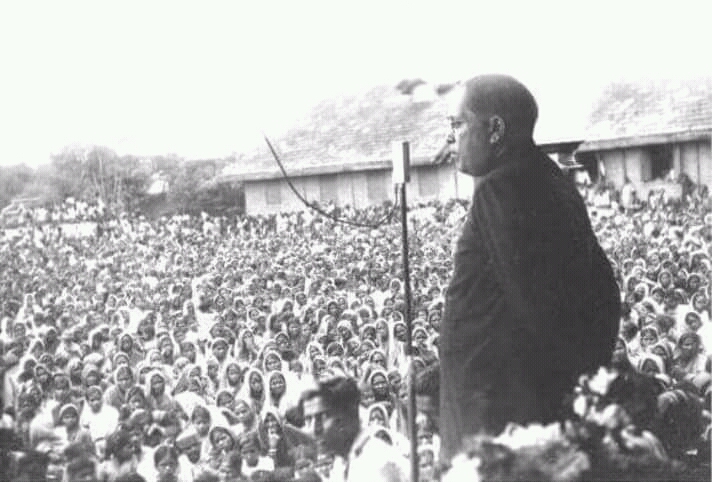
B.R. Ambedkar
Gentlemen, you have gathered here today in response to the invitation of the Satyagraha Committee. As the Chairman of that Committee, I gratefully welcome you all.
Many of you will remember that on the 19th of last March all of us came to the Chavadar Lake here. The caste Hindus of Mahad had laid no prohibition on us; but they showed they had objections to our going there by the attack they made. The fight brought results that one might have expected. The aggressive caste Hindus were sentenced to four months’ rigorous imprisonment, and are now in jail. If we had not been hindered on 19th March, it would have been proved that the caste Hindus acknowledge our right to draw water from the lake, and we should have had no need to begin our present undertaking.
Unfortunately we were thus hindered, and we have been obliged to call this meeting today. This lake at Mahad is public property. The caste Hindus of Mahad are so reasonable that they not only draw water from the lake themselves but freely permit people of any religion to draw water from it, and accordingly people of other religions such as the Islamic do make use of this permission. Nor do the caste Hindus prevent members of species considered lower than the human, such as birds and beasts, from drinking at the lake. Moreover, they freely permit beasts kept by untouchables to drink at the lake.
Caste Hindus are the very founts of compassion. They practise no hinsa and harass no one. They are not of the class of miserly and selfish folk who would grudge even a crow some grains of the food they are eating. The proliferation of sanyasis and mendicants is a living testimony to their charitable temperament. They regard altruism as religious merit and injury to another as a sin.
Even further, they have imbibed the principle that injury done by another must not be repaid but patiently endured, and so, they not only treat the harmless cow with kindness, but spare harmful creatures such as snakes. That one Atman or Spiritual Self dwells in all creatures has become a settled principle of their conduct. Such are the caste Hindus who forbid some human beings of their own religion to draw water from the Same Chavadar Lake! One cannot help asking the question, why do they forbid us alone?
Such are the caste Hindus who forbid some human beings of their own religion to draw water from the Same Chavadar Lake! One cannot help asking the question, why do they forbid us alone?
It is essential that all should understand thoroughly the answer to this question. Unless you do, I feel, you will not grasp completely the importance of today’s meeting. The Hindus are divided, according to sacred tradition, into four castes; but according to custom, into five: Brahmins, Kshatriyas, Vaishyas, Shudras and Atishudras. The caste system is the first of the governing rules of the Hindu religion. The second is that the castes are of unequal rank. They are ordered in a descending series of each meaner than the one before.
Not only are their ranks permanently fixed by the rule, but each is assigned boundaries it must not transgress, so that each one may at once be recognized as belonging to its particular rank. There is a general belief that the prohibitions in the Hindu religion against intermarriage, interdining, inter drinking and social intercourse are bounds set to degrees of association with one another. But this is an incomplete idea. These prohibitions are indeed limits to degrees of association; but they have been set to show people of unequal rank what the rank of each is. That is, these bounds are symbols of inequality.
Just as the crown on a man’s head shows he is a king, and the bow in his hand shows him to be a Kshatriya, the class to which none of the prohibitions applies is considered the highest of all and the one to which they all apply is reckoned the lowest in rank. The strenuous efforts made to maintain the prohibitions are for the reason that, if they are relaxed, the inequality settled by religion will break down and equality will take its place.
The caste Hindus of Mahad prevent the untouchables from drinking the water of the Chavadar Lake not because they suppose that the touch of the untouchables will pollute the water or that it will evaporate and vanish. Their reason for preventing the untouchables from drinking it is that they do not wish to acknowledge by such a permission that castes declared inferior by sacred tradition are in fact their equals.
Gentlemen! you will understand from this the significance of the struggle we have begun. Do not let yourselves suppose that the Satyagraha Committee has invited you to Mahad merely to drink the water of the Chavadar Lake of Mahad.
It is not as if drinking the water of the Chavadar Lake will make us immortal. We have survived well enough all these days without drinking it. We are not going to the Chavadar Lake merely to drink its water. We are going to the Lake to assert that we too are human beings like others. It must be clear that this meeting has been called to set up the norm of equality.
It is not as if drinking the water of the Chavadar Lake will make us immortal. We have survived well enough all these days without drinking it. We are not going to the Chavadar Lake merely to drink its water. We are going to the Lake to assert that we too are human beings like others. It must be clear that this meeting has been called to set up the norm of equality.
I am certain that no one who thinks of this meeting in this light will doubt that it is unprecedented. I feel that no parallel to it can be found in the history of India. If we seek for another meeting in the past to equal this, we shall have to go to the history of France on the continent of Europe. A hundred and thirty-eight years ago, on 24 January 1789, King Louis XVI had convened, by royal command, an assembly of deputies to represent the people of the kingdom. His French National Assembly has been much vilified by historians. The Assembly sent the King and the Queen of France to the guillotine; persecuted and massacred the aristocrats; and drove their survivors into exile. It confiscated the estates of the rich and plunged Europe into war for fifteen years. Such are the accusations leveled against the Assembly by the historians. In my view, the criticism is misplaced; further, the historians of this school have not understood the gist of the achievement of the French National Assembly. That achievement served the welfare not only of France but of the entire European continent. If European nations enjoy peace and prosperity today, it is for one reason: the revolutionary French National Assembly convened in 1789 set new principles for the organization of society before the disorganized and decadent French nation of its time, and the same principles have been accepted and followed by Europe.
To appreciate the importance of the French National Assembly and the greatness of its principles, we must keep in mind the suite of French society at the time. You are all aware that our Hindu society is based on the system of castes. A rather similar system of classes existed in the France of 1789: the difference was that it was a society of three castes. Like the Hindu society, the French had a class of Brahmins and another of Kshatriyas. But instead of three different castes of Vaishya, Shudra, and Atishudra, there was one class that comprehended these. This is a minor difference. The important thing is that the caste or class system was similar. The similarity to be noted is not only in the differentiation between classes: the inequality of our caste system was also to be found in the French social system. The nature of the inequality in the French society was different: it was economic in nature. It was, however, equally intense. The thing to bear in mind is there is a great similarity between the French National Assembly that met on 5 May 1789 at Versailles and our meeting today. The similarity is not only in the circumstances in which the two meetings took place but also in their ideals.
That Assembly of the French people was convened to reorganize French society. Our meeting today too has been convened to reorganize Hindu society. Hence, before discussing on what principles our society should be reorganized, we should all pay heed to the principles on which the French Assembly relied and the policy it adopted. The scope of the French Assembly was far wider than that of our present meeting. It had to carry out the threefold organization of the French political, social and religious systems. We must confine ourselves to how social and religious reorganization can be brought about. Since we are not, for the present, concerned with political reorganization, let us see what the French Assembly did in the matter of the religious and social reorganization of their nation. The policy adopted by the French National Assembly in this area can be seen plainly by anyone from three important proclamations issued by that Assembly. The first was issued on 17 June 1789. This was a proclamation about the class systems in France. As said before, French society was divided into three classes. The proclamation abolished the three classes and blended them into one. Further, it abolished the seats reserved separately for the three classes (or estates) in the political assembly. The second proclamation was about the priests. By ancient custom, to appoint or remove these priests was outside the power of the nation, that being the monopoly of a foreign religious potentate, the Pope. Anyone appointed by the Pope was a priest, whether or not he was fit to be one in the eyes of those to whom he was to preach. The proclamation abolished the autonomy of the religious orders and assigned to the French nation the authority to decide who might follow this vocation, who was fit for it and who was not, whether he was to be paid for preaching or not, and so on. The third proclamation was not about the political, economic or religious systems. It was of a general nature and laid down the principles on which all social arrangements ought to rest. From that point of view, the third proclamation is the most important of the three; it might be called the king of these proclamations. It is renowned the world over as the declaration of human birthrights. It is not only unprecedented in the history of France; more than that, it is unique in the history of civilized nations. For every European nation has followed the French Assembly in giving it a place in its own constitution. So one may say that it brought about a revolution not only in France but the whole world. This proclamation has seventeen clauses, of which the following are important:
Any person is free to act according to his birthright. Any limit placed upon this freedom must be only to the extent necessary to permit other persons to enjoy their birthrights. Such limits must be laid down by law: they cannot be set on the grounds of the religion or on any other basis than the law of the land.
1) All human beings are equal by birth; and they shall remain equal till death. They may be distinguished in status only in the public interest. Otherwise, their equal status must be maintained.
2) The ultimate object of politics is to maintain these human birthrights.
3) The entire nation is the mother-source of sovereignty. The rights of any individual, group or special class, unless they are given by the nation, cannot be acknowledged as valid on any other ground, be it political or religious.
4) Any person is free to act according to his birthright. Any limit placed upon this freedom must be only to the extent necessary to permit other persons to enjoy their birthrights. Such limits must be laid down by law: they cannot be set on the grounds of the religion or on any other basis than the law of the land.
5) The law will forbid only such actions as are injurious to society. All must be free to do what has not been forbidden by law. Nor can anyone be compelled to do what the law has not laid down as a duty.
6) The law is not in the nature of bounds set by any particular class. The right to decide what the law shall be rests with the people or their representatives. Whether such a law is protective or punitive, it must be the same for all. Since justice requires that all social arrangements be based on the equality of all, all individuals are equally eligible for any kind of honour, power and profession. Any distinction in such matters must be owing to differences of individual merit; it must not be based on birth.
I feel our meeting today should keep the image of this French National Assembly before the mind. The road it marked out for the development of the French nation, the road that all progressed nations have followed, ought to be the road adopted for the development of Hindu society by this meeting. We need to pull away the nails which hold the framework of caste-bound Hindu society together, such as those of the prohibition of intermarriage down to the prohibition of social intercourse so that Hindu society becomes all of one caste. Otherwise untouchability cannot be removed nor can equality be established.
To raise men, aspiration is needed as much as outward efforts. Indeed it is to be doubted whether efforts are possible without aspiration. Hence, if a great effort is to be made, a great aspiration must be nursed. In adopting an aspiration one need not be abashed or deterred by doubts about one’s power to satisfy it. One should be ashamed only of mean aspirations; not of failure that may result because one’s aspiration is high. If untouchability alone is removed, we may change from Atishudras to Shurdas; but can we say that this radically removes untouchability? If such puny reforms as the removal of restrictions on social intercourse etc. were enough for the eradication of untouchability I would not have suggested that the caste system itself must go.
Some of you may feel that since we are untouchables, it is enough if we are set free from the prohibitions of interdrinking and social intercourse. That we need not concern ourselves with the caste system; how does it matter if it remains? In my opinion, this is a total error. If we leave the caste system alone and adopt only the removal of untouchability as our policy, people will say that we have chosen a low aim. To raise men, aspiration is needed as much as outward efforts. Indeed it is to be doubted whether efforts are possible without aspiration. Hence, if a great effort is to be made, a great aspiration must be nursed. In adopting an aspiration one need not be abashed or deterred by doubts about one’s power to satisfy it. One should be ashamed only of mean aspirations; not of failure that may result because one’s aspiration is high. If untouchability alone is removed, we may change from Atishudras to Shurdas; but can we say that this radically removes untouchability? If such puny reforms as the removal of restrictions on social intercourse etc. were enough for the eradication of untouchability I would not have suggested that the caste system itself must go. Gentlemen! You all know that if a snake is to be killed it is not enough to strike at its tail – its head must be crushed. If any harm is to be removed, one must seek out its root and strike at it. An attack must be based on the knowledge of the enemy’s vital weakness. Duryodhana was killed because Bheema struck at his thigh with his mace. If the mace had hit Durydhana’s head he would not have died; for his thigh was his vulnerable spot. One finds many instances of a physician’s efforts to remove a malady proving fruitless because he has not perceived fully what will get rid of the disease; similar instances of failure to root out a social disease when it is not fully diagnosed are rarely recorded in history; and so one does not often become aware of them. But let me acquaint you with one such instance that I have come across in my reading. In the ancient European nation of Rome, the patricians were considered upper class, and the plebians, lower class. All power was in the hands of, the patricians, and they used it to ill-treat the plebians. To free themselves from this harassment, the plebians, on the strength of their unity, insisted that laws should be written down for the facilitation of justice and for the information of all. Their patrician opponents agreed to this; and a charter of twelve laws was written down. But this did not rid the oppressed plebians of their woes. For the officers who enforced the laws were all of the patrician class; moreover, the chief officer, called the tribune, was also a patrician. Hence, though the laws were uniform, there was partiality in their enforcement. The plebians then demanded that instead of the administration being in the hands of one tribune there should be two tribunes, of whom one should be elected by the plebians and the other by the patricians. The patricians yielded to this too, and the plebians rejoiced, supposing they would now be free of their miseries. But their rejoicing was short-lived. The Roman people had a tradition that nothing was to be done without the favourable verdict of the oracle at Delphi. Accordingly, even the election of a duly elected tribune – if the oracle did not approve of him – had to be treated as annulled, and another had to be elected, of whom the oracle approved. The priest who put the question to the oracle was required, by sacred religious custom, to be one born of parents married in the mode the Romans called conferatio and this mode of marriage prevailed only among the patricians; so that the priest of Delphi was always a patrician.
The wily priest always saw to it that if the plebians elected a man really devoted to their cause, the oracle went against him. Only if the man elected by the plebians to the position of tribune was amenable to the patricians, would the oracle favour him and give him the opportunity of actually assuming office. What did the plebians gain by their right to elect a tribune? The answer must be, nothing in reality. Their efforts proved meaningless because they did not trace the malady to its source. If they had, they would, at the same time that they demanded a tribune of their election, have also settled the question of who should be the priest at Delphi. The disease could not be eradicated by demanding a tribune; it needed control of the priestly office; which the plebians failed to perceive. We too, while we seek a way to remove untouchability, must inquire closely into what will eradicate the disease; otherwise we too may miss our aim. Do not be foolish enough to believe that removal of the restrictions on social intercourse or interdrinking will remove untouchability.
Remember that if the prohibitions on social intercourse and interdrinking go, the roots of untouchability are not removed. Release from these two restrictions will, at the most, remove untouchability as it appears outside the home; but it will leave untouchability in the home untouched. If we want to remove untouchability in the home as well as outside, we must break down the prohibition against intermarriage. Nothing else will serve. From another point of view, we see that breaking down the bar against intermarriage is the way to establish real equality. Anyone must confess that when the root division is dissolved, incidental points of separateness will disappear by themselves. The interdictions on interdining, interdrinking and social intercourse have all sprung from the one interdiction against intermarriage. Remove the last and no special efforts are needed to move the rest. They will disappear of their own accord. In my view the removal of untouchability consists in breaking down the ban on intermarriage and doing so will establish real equality. If we wish to cut out untouchability, we must recognize that the root of untouchability is in the ban on intermarriage. Even if our attack today is on the ban against interdrinking, we must press it home against the ban on intermarriage; otherwise untouchability cannot be removed by the roots. Who can accomplish this task? It is no secret that the Brahmin class cannot do it.
If we wish to cut out untouchability, we must recognize that the root of untouchability is in the ban on intermarriage. Even if our attack today is on the ban against interdrinking, we must press it home against the ban on intermarriage; otherwise untouchability cannot be removed by the roots. Who can accomplish this task? It is no secret that the Brahmin class cannot do it.
While the caste system lasts, the Brahmin caste has its supremacy. No one, of his own will, surrenders power which is in his hands. The Brahmins have exercised their sovereignty over all other castes for centuries. It is not likely that they will be willing to give it up and treat the rest as equals. The Brahmins do not have the patriotism of the Samurais of Japan. It is useless to hope that they will sacrifice their privileges as the Samurai class did, for the sake of national unity based on a new equality. Nor does it appear likely that the task will be carried out by other caste Hindus. These others, such as the class comprising the Marathas and other similar castes, are a class between the privileged and those without any rights.
A privileged class, at the cost of a little self-sacrifice, can show some generosity. A class without any privileges has ideals and aspirations; for, at least as a matter of self-interest, it wishes to bring about a social reform. As a result it develops an attachment to principles rather than to self-interest. The class of caste Hindus, other than Brahmins, lies in between: it cannot practise the generosity possible to the class above and it does not develop the attachment to principles that develops in the class below. This is why this class is seen to be concerned not so much about attaining equality with the Brahmins as about maintaining its status above the untouchables.
For the purposes of the social reform required, the class of caste Hindus other than Brahmins is feeble. If we are to await its help, we should fall into the difficulties that the farmer faced, who depended on his neighbour’s help for his harvesting, as in the story of the mother lark and her chicks found in many textbooks.
The task of removing untouchability and establishing equality that we have undertaken, we must carry out ourselves. Others will not do it. Our life will gain its true meaning if we consider that we are born to carry out this task and set to work in earnest. Let us receive this merit which is awaiting us.
The task of removing untouchability and establishing equality that we have undertaken, we must carry out ourselves. Others will not do it. Our life will gain its true meaning if we consider that we are born to carry out this task and set to work in earnest. Let us receive this merit which is awaiting us.
This is a struggle in order to raise ourselves; hence we are bound to undertake it, so as to remove the obstacles to our progress. We all know how at every turn, untouchability muddies and soils our whole existence. We know that at one time our people were recruited in large numbers into the troops. It was a kind of occupation socially assigned to us and few of us needed to be anxious about earning our bread. Other classes of our level have found their way into the troops, the police, the courts and the offices, to earn their bread. But in the same areas of employment you will no longer find the untouchables.
It is not that the law debars us from these jobs. Everything is permissible as far the law is concerned. But the Government finds itself powerless because other Hindus consider us untouchables and look down upon us, and it acquiesces in our being kept out of Government jobs. Nor can we take up any decent trade. It is true, partly, that we lack money to start business, but the real difficulty is that people regard us as untouchables and no one will accept goods from our hands.
To sum up, untouchability is not a simple matter; it is the mother of all our poverty and lowliness and it has brought us to the abject state we are in today. If we want to raise ourselves out of it, we must undertake this task. We cannot be saved in any other way. It is a task not for our benefit alone; it is also for the benefit of the nation.
Untouchability is not a simple matter; it is the mother of all our poverty and lowliness and it has brought us to the abject state we are in today. If we want to raise ourselves out of it, we must undertake this task. We cannot be saved in any other way. It is a task not for our benefit alone; it is also for the benefit of the nation.
Hindu society must sink unless the untouchability that has become a part of the four-castes system is eradicated. Among the resources that any society needs in the struggle for life, a great resource is the moral order of that society. And everyone must admit that a society in which the existing moral order upholds things that disrupt the society and condemns those that would unite the members of the society, must find itself defeated in any struggle for life with other societies. A society which has the opposite moral order, one in which things that unite are considered laudable and things that divide are condemned, is sure to succeed in any such struggle.
This principle must be applied to Hindu society. Is it any wonder that it meets defeat at every turn when it upholds a social order that fragments its members, though it is plain to anyone who sees it that the four-castes system is such a divisive force and that a single caste for all, would unite society? If we wish to escape these disastrous conditions, we must break down the framework of the four-castes system and replace it by a single caste system.
Even this will not be enough. The inequality inherent in the four-castes system must be rooted out. Many people mock at the principles of equality. Naturally, no man is another’s equal. One has an impressive physique; another is slow-witted. The mockers think that, in view of these inequalities that men are born with, the egalitarians are absurd in telling us to regard them as equals. One is forced to say that these mockers have not understood fully the principle of equality.
If the principle of equality means that privilege should depend, not on birth, wealth, or anything else, but solely on the merits of each man, then how can it be demanded that a man without merit, and who is dirty and vicious, should be treated on a level with a man who has merit and is clean and virtuous? Such is a counter-question sometimes posed. It is essential to define equality as giving equal privileges to men of equal merit.
But before people have had an opportunity to develop their inherent qualities and to merit privileges, it is just to treat them all equally. In sociology, the social order is itself the most important factor in the full development of qualities that any person may possess at birth. If slaves are constantly treated unequally, they will develop no qualities other than those appropriate to slaves, and they will never become fit for any higher status. If the clean man always repulses the unclean man and refuses to have anything to do with him, the unclean man will never develop the aspiration to become clean. If the criminal or immoral castes are given no refuge by the virtuous castes, the criminal castes will never learn virtue.
The examples given above show that, although an equal treatment may not create good qualities in one who does not have them at all, even such qualities where they exist need equal treatment for their development; also, developed good qualities are wasted and frustrated without equal treatment.
On the one hand, the inequality in Hindu society stuns the progress of individuals and in consequence stunts society. On the other hand, the same inequality prevents society from bringing into use powers stored in individuals. In both ways, this inequality is weakening Hindu society, which is in disarray because of the four-castes system.
Hence, if Hindu society is to be strengthened, we must uproot the four-castes system and untouchability, and set the society on the foundations of the two principles of one caste only and of equality. The way to abolish untouchability is not any other than the way to invigorate Hindu society. Therefore I say that our work is beyond doubt as much for the benefit of the nation as it is in our own interest.
If Hindu society is to be strengthened, we must uproot the four-castes system and untouchability, and set the society on the foundations of the two principles of one caste only and of equality. The way to abolish untouchability is not any other than the way to invigorate Hindu society. Therefore I say that our work is beyond doubt as much for the benefit of the nation as it is in our own interest.
Our work has been begun to bring about a real social revolution. Let no one deceive himself by supposing that it is a diversion to quieten minds entranced with sweet words. The work is sustained by strong feeling, which is the power that drives the movement. No one can now arrest it. I pray to God that the social revolution which begins here today may fulfill itself by peaceful means.
None can doubt that the responsibility of letting the revolution take place peacefully rests more heavily on our opponents than on us. Whether this social revolution will work peacefully or violently will depend wholly on the conduct of the caste Hindus. People who blame the French National Assembly of 1789 for atrocities forget one point. That is, if the rulers of France had not been treacherous to the Assembly, if the upper classes had not resisted it, had not committed the crime of trying to suppress it with foreign help, it would have had no need to use violence in the work of the revolution and the whole social transformation would have been accomplished peacefully.
We say to our opponents too: please do not oppose us. Put away the orthodox scriptures. Follow justice. And we assure you that we shall carry out our programme peacefully.
Purna Swaraj (Lahore, December 1929)
JAWAHARLAL NEHRU
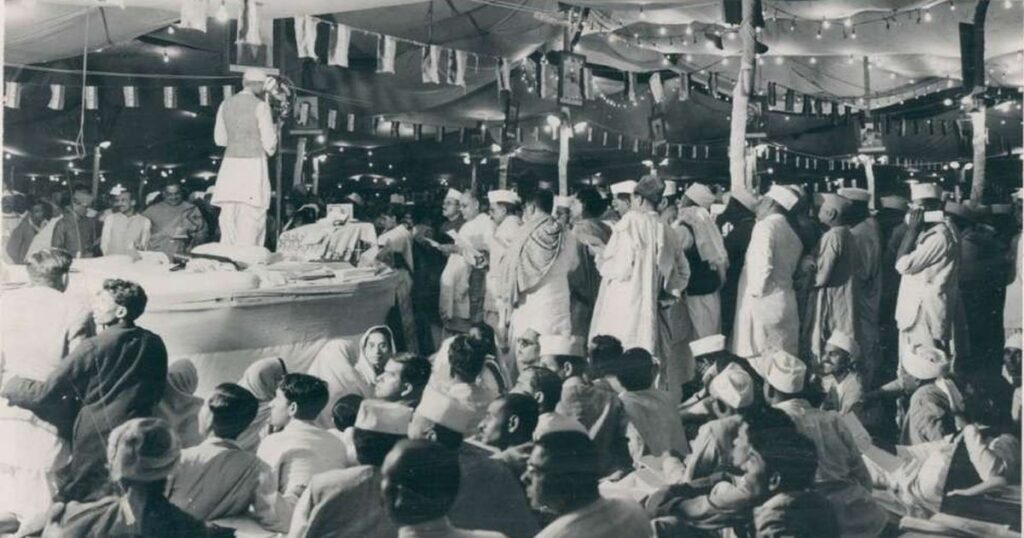
Pledge for Purna Swaraj, Jawaharlal Nehru
Comrades— for four and forty years this National Congress has laboured for the freedom of India. During this period it has somewhat slowly, but surely, awakened national consciousness from its long stupor and built up the national movement. If, today we are gathered here at a crisis of our destiny, conscious of our strength as well as of our weakness, and looking with hope and apprehension to the future, it is well that we give first thought to those who have gone before us and who spent out their lives with little hope of reward, so that those that followed them may have the joy of achievement. Many of the giants of old are not with us and we of a later day, standing on an eminence of their creation, may often decry their efforts. That is the way of the world. But none of you can forget them or the great work they did in laying the foundations of a free India. And none of us can ever forget that glorious band of men and women who, without tacking the consequences, have laid down their young lives or spent their bright youth in suffering and torment in utter protest against a foreign domination.
Many of their names even are not known to us. They laboured and suffered in silence without any expectation of public applause, and by their heart’s blood they nursed the tender plant of India’s freedom. While many of us temporized and compromised, they stood up and proclaimed a people’s right to freedom and declared to the world that India, even in her degradation, had the spark of life in her, because she refused to submit to tyranny and serfdom. Brick by brick has our national movement been built up, and often on the prostrate bodies of her martyred sons has India advanced. The giants of old may not be with us, but the courage of old is with us still and India can yet produce martyrs like Jatin Das and Wizaya. This is the glorious heritage that we have inherited and you wish to put me in charge of it. I know well that I occupy this honoured place by chance more than by your deliberate design. Your desire was to choose another — one who towers above all others in this present day world of ours — and there could have been no wiser choice. But fate and he conspired together and thrust me against your will and mine into this terrible seat of responsibility. Should I express my gratitude to you for having placed me in this dilemma? But I am grateful indeed for your confidence in one who strangely lacks it himself.
Brick by brick has our national movement been built up, and often on the prostrate bodies of her martyred sons has India advanced. The giants of old may not be with us, but the courage of old is with us still and India can yet produce martyrs like Jatin Das and Wizaya. This is the glorious heritage that we have inherited and you wish to put me in charge of it.
You will discuss many vital national problems that face us today and your decisions may change the course of Indian history. But you are not the only people that are faced with problems. The whole world today is one vast question-mark and every country and every people is in the melting pot. The age of faith, with the comfort and stability it brings, is past and there is questioning about everything, however permanent or sacred it might have appeared to our forefathers. Everywhere, there is doubt and restlessness and the foundations of the state and society are in process of transformation. Old established ideas of liberty, justice, property, and even the family are being attacked and the outcome hangs in the balance. We appear to be in a dissolving period of history when the world is in labour and out of her travail will give birth to a new order.
The future lies with America and Asia. Owing to false and incomplete history many of us have been led to think that Europe has always dominated over the rest of the world, and Asia has always let the legions of the West thunder past and plunged in thought again. We have forgotten that for millennia the legions of Asia overran Europe and modern Europe itself largely consists of the descendants of these invaders from Asia. We have forgotten that it was India that finally broke the military power of Alexander.
No one can say what the future will bring, but we may assert with some confidence that Asia and even India, will play a determining part in future world policy. The brief day of European domination is already approaching its end. Europe has ceased to be the centre of activity and interest. The future lies with America and Asia. Owing to false and incomplete history many of us have been led to think that Europe has always dominated over the rest of the world, and Asia has always let the legions of the West thunder past and plunged in thought again. We have forgotten that for millennia the legions of Asia overran Europe and modern Europe itself largely consists of the descendants of these invaders from Asia. We have forgotten that it was India that finally broke the military power of Alexander.
Thought has undoubtedly been the glory of Asia and specially of India, but in the field of action the record of Asia has been equally great. But none of us desires that the legions of Asia or Europe should overrun the continents again. We have all had enough of them.
India today is a part of a world movement. Not only China, Turkey, Persia, and Egypt but also Russia and the countries of the West are taking part in this movement, and India cannot isolate herself from it. We have our own problems — difficult and intricate — and we cannot run away from them and take shelter in the wider problems that affect the world. But if we ignore the world, we do so at our peril. Civilization today, such as it is, is not the creation or monopoly of one people or nation. It is a composite fabric to which all countries have contributed and then have adapted to suit their particular needs. And if India has a message to give to the world as I hope she has, she has also to receive and learn much from the messages of other peoples.
Few things in history are more amazing than the wonderful stability of the social structure in India, which withstood the impact of numerous alien influences and thousands of years of change and conflict. It withstood them because it always sought to absorb them and tolerate them. Its aim was not to exterminate, but to establish an equilibrium between different cultures. Aryans and non-Aryans settled down together recognizing each other’s right to their culture, and outsiders who came, like the Parsis, found a welcome and a place in the social order. With the coming of the Muslims, the equilibrium was disturbed, but India sought to restore it, and largely succeeded. Unhappily for us before we could adjust our differences, the political structure broke down, the British came and we fell.
When everything is changing it is well to remember the long course of Indian history. Few things in history are more amazing than the wonderful stability of the social structure in India, which withstood the impact of numerous alien influences and thousands of years of change and conflict. It withstood them because it always sought to absorb them and tolerate them. Its aim was not to exterminate, but to establish an equilibrium between different cultures. Aryans and non-Aryans settled down together recognizing each other’s right to their culture, and outsiders who came, like the Parsis, found a welcome and a place in the social order. With the coming of the Muslims, the equilibrium was disturbed, but India sought to restore it, and largely succeeded. Unhappily for us before we could adjust our differences, the political structure broke down, the British came and we fell.
Great as was the success of India in evolving a stable society, she failed and in a vital particular, and because she failed in this, she fell and remains fallen. No solution was found for the problem of equality. India deliberately ignored this and built up her social structure on inequality, and we have the tragic consequences of this policy in the millions of our people who till yesterday were suppressed and had little opportunity for growth.
And yet when Europe fought her wars of religion and Christians massacred each other in the name of their saviour, India was tolerant, although alas, there is little of this toleration today. Having attained some measure of religious liberty, Europe sought after political liberty, and political and legal equality. Having attained these also, she finds that they mean very little without economic liberty and equality. And so today politics have ceased to have much meaning and the most vital question is that of social and economic equality.
India also will have to find a solution to this problem and until she does so, her political and social structure cannot have stability. That solution need not necessarily follow the example of any other country. It must, if it has to endure, be based on the genius of her people and be an outcome of her thought and culture. And when it is found, the unhappy differences between various communities, which trouble us today and keep back our freedom, will automatically disappear.
What shall we gain for ourselves or for our community, if all of us are slaves in a slave country? And what can we lose if once we remove the shackles from India and can breathe the air of freedom again? Do we want outsiders who are not of us and who have kept us in bondage, to be the protectors of our little rights and privileges, when they deny us the very right to freedom? No majority can crush a determined minority and no minority can be protected by a little addition to its seats in a legislature. Let us remember that in the world today, almost everywhere a very small minority holds wealth and power and dominates over the great majority.
Indeed, the real differences have already largely gone, but fear of each other and distrust and suspicion remain and sow seeds of discord. The problem is how to remove fear and suspicion and, being intangible, they are hard to get at. An earnest attempt was made to do so last year by the All Parties’ Committee and much progress was made towards the goal. But we must admit with sorrow that success has not wholly crowned its efforts. Many of our Muslim and Sikh friends have strenuously opposed the solutions suggested and passions have been roused over mathematical figures and percentages. Logic and cold reasons are poor weapons to fight fear and distrust. Only faith and generosity can overcome them. I can only hope that the leaders of various communities will have this faith and generosity in ample measure. What shall we gain for ourselves or for our community, if all of us are slaves in a slave country? And what can we lose if once we remove the shackles from India and can breathe the air of freedom again? Do we want outsiders who are not of us and who have kept us in bondage, to be the protectors of our little rights and privileges, when they deny us the very right to freedom? No majority can crush a determined minority and no minority can be protected by a little addition to its seats in a legislature. Let us remember that in the world today, almost everywhere a very small minority holds wealth and power and dominates over the great majority.
I have no love for bigotry and dogmatism in religion and I am glad that they are weakening. Nor do I love communalism in any shape or form. I find it difficult to appreciate why political or economic rights should depend on the membership of a religious group or community. I can fully understand the right to freedom in a religion and the right to one’s culture, and in India specially, which has always acknowledged and granted these rights, it should be no difficult matter to ensure their continuance We have only to find out some way whereby we may root out the fear and distrust that darken our horizon today. The politics of a subject race are largely based on fear and hatred, and we have been too long under subjection to get rid of them easily.
The politics of a subject race are largely based on fear and hatred, and we have been too long under subjection to get rid of them easily.
I was born a Hindu but I do not know how far I am justified in calling myself one or in speaking on behalf of Hindus. But birth still counts in this country and by right of birth I shall venture to submit to the leaders of the Hindus that it should be their privilege to take the lead in generosity. Generosity is not only good morals, but is often good politics and sound expediency. And it is inconceivable to me that in a free India, the Hindus can ever be powerless. So far as I am concerned, I would gladly ask our Muslim and Sikh friends to take what they will without protest and argument from me. I know that the time is coming soon when these labels and appellations will have little meaning and when our struggle will be on an economic basis. Meanwhile, it matters little what our mutual arrangements are, provided only that we do not build up barriers which will come in the way of our future progress.
The time has indeed already come when the All Parties’ Report has to be put aside and we march forward unfettered to our goal. You will remember that the resolution of the last Congress fixed a year of grace for the adoption of the All-Parties scheme. That year is nearly over and the natural issue of that decision is for this Congress to declare in favour of independence and devise sanctions to achieve it.
Recently, there has been a seeming offer of peace. The Viceroy has stated on behalf of the British Government that the leaders of Indian opinion will be invited to confer with the government on the subject of India’s future Constitution. The Viceroy meant well and his language was the language of peace. But even a Viceroy’s goodwill and courteous phrases are poor substitutes for the hard facts that confront us. We have sufficient experience of the devious ways of British diplomacy to beware of it. The offer which the British Government made was vague and there was no commitment or promise of performance. Only by the greatest stretch of imagination could it be interpreted as a possible response to the Calcutta resolution. Many leaders of various political parties met together soon after and considered it. They gave it the most favourable interpretation, for they desired peace and were willing to go half-way to meet it. But in courteous language they made it clear what the vital conditions for its acceptance were.
Many of us who believed in independence and were convinced that the offer was only a device to lead us astray and create division in our ranks, suffered bitter anguish and were torn with doubt. Were we justified in precipitating a terrible national struggle with all its inevitable consequences of suffering for many, when there was even an outside chance of honourable peace? With much searching of heart we signed that manifesto and I know not today if we did right or wrong. Later came the explanations and amplifications in the British Parliament and elsewhere and all doubt, if doubt there was, was removed as to the true significance of the offer. Even so your Working Committee chose to keep open the door of negotiation and left it to this Congress to take the final decision.
During the last few days there has been another discussion of this subject in the British House of Commons and the Secretary of State for India has endeavoured to point out that successive governments have tried to prove, not only by words but by deeds also, the sincerity of their faith in regard to India. We must recognize Mr Wedgwood Benn’s desire to do something for India and his anxiety to secure the goodwill of the Indian people. But his speech and other speeches made in Parliament carry us no further. ‘Dominion Status in action’, to which he has drawn attention has been a snare for us and has certainly not reduced the exploitation of India.
The burdens on the Indian masses are even greater today, because of this ‘Dominion Status in action’ and the so-called constitutional reforms of ten years ago. High Commissioners in London and representatives of the League of Nations, and the purchase of stores, and Indian Governors and high officials are no parts of our demand. We want to put an end to the exploitation of India’s poor and to get the reality of power and not merely the livery of office. Mr Wedgwood Benn has given us a record of the achievements of the past decade. He could have added to it by referring to Martial Law in the Punjab and the Jallianwala Bagh shooting and the repression and exploitation that have gone on continually during this period of ‘Dominion Status in action.’ He has given us some insight into what more of Dominion Status may mean for us. It will mean the shadow of authority to a handful of Indians and more repression and exploitation of the masses.
What will this Congress do? The conditions for cooperation remain unfulfilled. Can we cooperate so long as there is no guarantee that real freedom will come to us? Can we cooperate when our comrades lie in prison and repression continues? Can we cooperate until we are assured that real peace is sought after and not merely a tactical advantage over us? Peace cannot come at the point of the bayonet, and if we are to continue to be dominated over by an alien people, let us at least be no consenting parties to it.
What will this Congress do? The conditions for cooperation remain unfulfilled. Can we cooperate so long as there is no guarantee that real freedom will come to us? Can we cooperate when our comrades lie in prison and repression continues? Can we cooperate until we are assured that real peace is sought after and not merely a tactical advantage over us? Peace cannot come at the point of the bayonet, and if we are to continue to be dominated over by an alien people, let us at least be no consenting parties to it.
If the Calcutta resolution holds, we have but one goal today, that of independence. Independence is not a happy word in the world today; for it means exclusiveness and isolation. Civilization has had enough of narrow nationalism and gropes towards a wider cooperation and inter-dependence. And if we use the word ‘independence’, we do so in no sense hostile to the larger ideal. Independence for us means complete freedom from British domination and British imperialism. Having attained our freedom, I have no doubt that India will welcome all attempts at world-cooperation and federation, and will even agree to give up part of her own independence to a larger group of which she is an equal member.
Independence is not a happy word in the world today; for it means exclusiveness and isolation. Civilization has had enough of narrow nationalism and gropes towards a wider cooperation and inter-dependence. And if we use the word ‘independence’, we do so in no sense hostile to the larger ideal. Independence for us means complete freedom from British domination and British imperialism. Having attained our freedom, I have no doubt that India will welcome all attempts at world-cooperation and federation, and will even agree to give up part of her own independence to a larger group of which she is an equal member.
The British Empire today is not such a group and cannot be so long as it dominates over millions of people and holds large areas of the world’s surface despite the will of their inhabitants. It cannot be a true commonwealth so long as imperialism is its basis and the exploitation of other races its chief means of sustenance. The British Empire today is indeed gradually undergoing a process of political dissolution. It is in a state of unstable equilibrium. The Union of South Africa is not a happy member of the family, nor is the Irish Free State, a willing one. Egypt drifts away. India could never be an equal member of the Commonwealth unless imperialism and all it implies is discarded. So long as this is not done, India’s position in the empire must be one of subservience and her exploitation will continue.
There is talk of world-peace and pacts have been signed by the nations of the world. But despite pacts, armaments grow and beautiful language is the only homage that is paid to the goddess of peace. Peace can only come when the causes of war are removed. So long as there is the domination of one country over another, or the exploitation of one class by another, there will always be attempts to subvert the existing order and no stable equilibrium can endure. Out of imperialism and capitalism peace can never come. And it is because the British Empire stands for these and bases itself on the exploitation of the masses that we can find no willing place in it. No gain that may come to us is worth anything unless it helps in removing the grievous burdens on our masses. The weight of a great empire is heavy to carry and long our people have endured it. Their backs are bent down and their spirit has almost broken. How will they share in the Commonwealth partnership if the burden of exploitation continues? Many of the problems we have to face are the problems of vested interests mostly created or encouraged by the British Government. The interests of the Rulers of Indian States, of British officials and British capital and Indian capital and of the owners of big zamindaris are ever thrust before us, and they clamour for protection. The unhappy millions who really need protection are almost voiceless and have few advocates.
We have had much controversy about independence and Dominion Status and we have quarrelled about words. But the real thing is the conquest of power by whatever name it may be called. I do not think that any form of Dominion Status applicable to India will give us real power. A test of this power would be the entire withdrawal of the alien army of occupation and economic control. Let us, therefore, concentrate on these and the rest will follow easily.
We stand therefore today, for the fullest freedom of India. This Congress has not acknowledged and will not acknowledge the right of the British Parliament to dictate to us in any way. To it we make no appeal. But we do appeal to the Parliament and the conscience of the world, and to them we shall declare, I hope, that India submits no longer to any foreign domination. Today or tomorrow, we may not be strong enough to assert our will. We are very conscious of our weakness, and there is no boasting in us or pride of strength. But let no one, least of all England, mistake or underrate the meaning or strength of our resolve. Solemnly, with full knowledge of consequences, I hope, we shall take it and there will be no turning back. A great nation cannot be thwarted for long when once its mind is clear and resolved. If today we fail and tomorrow brings no success, the day after will follow and bring achievement.
We stand therefore today, for the fullest freedom of India. This Congress has not acknowledged and will not acknowledge the right of the British Parliament to dictate to us in any way. To it we make no appeal. But we do appeal to the Parliament and the conscience of the world, and to them we shall declare, I hope, that India submits no longer to any foreign domination. Today or tomorrow, we may not be strong enough to assert our will. We are very conscious of our weakness, and there is no boasting in us or pride of strength. But let no one, least of all England, mistake or underrate the meaning or strength of our resolve. Solemnly, with full knowledge of consequences, I hope, we shall take it and there will be no turning back. A great nation cannot be thwarted for long when once its mind is clear and resolved. If today we fail and tomorrow brings no success, the day after will follow and bring achievement.
We are weary of strife and hunger for peace and opportunity to work constructively for our country. Do we enjoy the breaking up of our homes and the sight of our brave young men going to prison or facing the halter? Does the worker like going on strike to lose even his miserable pittance and starve? He does so by sheer compulsion when there is no other way for him. And we who take this perilous path of national strife do so because there is no other way to an honourable peace. But we long for peace, and the hand of fellowship will always be stretched out to all who may care to grasp it. But behind the hand will be a body which will not bend to injustice and a mind that will not surrender on any vital point.
With the struggle before us, the time for determining our future Constitution is not yet. For two years or more we have drawn up constitutions and finally the All-Parties’ Committee put a crown to these efforts by drawing up a scheme of its own which the Congress adopted for a year. The labour that went to the making of this scheme was not wasted and India has profited by it. But the year is past and we have to face new circumstances which require action rather than constitution-making. Yet we cannot ignore the problems that beset us and that will make or mar our struggle and our future constitution. We have to aim at social adjustment and equilibrium and to overcome the forces of disruption that have been the bane of India.
I must frankly confess that I am a socialist and a republican and am no believer in kings and princes, or in the order which produces the modern kings of industry, who have greater power over the lives and fortunes of men than even kings of old, and whose methods are as predatory as those of the old feudal aristocracy. I recognize, however, that it may not be possible for a body constituted as in this National Congress and in the present circumstances of the country to adopt a full socialistic programme. But we must realize that the philosophy of socialism has gradually permeated the entire structure of society the world over and almost the only points in dispute are the pace and methods of advance to its full realization. India will have to go that way too if she seeks to end her poverty and inequality, though she may evolve her own methods and may adapt the ideal to the genuine of her race.
We have three major problems, the minorities, the Indian states, and labour and peasantry. I have dealt already with the question of minorities. I shall only repeat that we must give the fullest assurance by our words and our deeds that their culture and traditions will be safe.
The Indian states cannot live apart from the rest of India and their rulers must, unless they accept their inevitable limitations, go the way of others who thought like them. And the only people who have a right to determine the future of the states must be the people of these states, including the rulers. This Congress which claims self-determination cannot deny it to the people of the states. Meanwhile, the Congress is perfectly willing to confer with such rulers as are prepared to do so and to devise means whereby the transition may not be too sudden. But in no event can the people of the states be ignored.
Our third major problem is the biggest of all. For India means the peasantry and labour and to the extent that we raise them and satisfy their wants will we succeed in our task. And the measure of the strength of our national movement will be the measure of their adherence to it. We can only gain them to our side by our espousing their cause which is really the country’s cause. The Congress has often expressed its goodwill towards them; but beyond that it has not gone. The Congress, it is said, must hold the balance fairly between capital and labour and zamindar and tenant.
But the balance has been and is terribly weighed on one side, and to maintain the status quo is to maintain injustice and exploitation. The only way to right it is to do away with the domination of any one class over another. The All-India Congress Committee accepted this ideal of social and economic change in a resolution it passed some months ago in Bombay. I hope the Congress will also set its seal on it and will further draw up a programme of such changes as can be immediately put in operation.
In this programme perhaps the Congress as a whole cannot go very far today. But it must keep the ultimate ideal in view and work for it. The question is not one merely of wages and charity doled out by an employer or landlord. Paternalism in industry or in the land is but a form of charity with all its sting and its utter incapacity to root out the evil. The new theory of trusteeship, which some advocate, is equally barren. For trusteeship means that the power for good or evil remains with the self-appointed trustee and he may exercise it as he will. The sole trusteeship that can be fair is the trusteeship of the nation and not of one individual or a group. Many Englishmen honestly consider themselves the trustees for India, and yet to what a condition they have reduced our country.
We must decide for whose benefit industry must be run and the land produce food. Today the abundance that the land produces is not for the peasant or the labourer who works on it; and industry’s chief function is supposed to be to produce millionaires. However golden the harvest and heavy the dividends, the mud-huts and hovels and nakedness of our people testify to the glory of the British Empire and of our present social system.
Our economic programme must therefore be based on a human outlook and must not sacrifice man to money. If an industry cannot be run without starving its workers, then the industry must be closed down. If the workers on the land have not enough to eat then the intermediaries who deprive them of their full share must go. The least that every worker in the field or factory is entitled to is a minimum wage which will enable him to live in moderate comfort, and human hours of labour which do not break his strength and spirit.
Our economic programme must therefore be based on a human outlook and must not sacrifice man to money. If an industry cannot be run without starving its workers, then the industry must be closed down. If the workers on the land have not enough to eat then the intermediaries who deprive them of their full share must go. The least that every worker in the field or factory is entitled to is a minimum wage which will enable him to live in moderate comfort, and human hours of labour which do not break his strength and spirit. The All-Parties’ Committee accepted the principle and included it in their recommendations. I hope the Congress will also do so and will in addition be prepared to accept its natural consequences. Further that, it will adopt the well known demands of labour for a better life, and will give every assistance to organize itself and prepare itself for the day when it can control industry on a cooperative basis.
But industrial labour is only a small part of India, although it is rapidly becoming a force that cannot be ignored. It is the peasantry that cry loudly and piteously for relief and our programme must deal with their present condition. Real relief can only come by a great change in the land-laws and the basis of the present system of land tenure. We have among us many big landowners and we welcome them. But they must realize that the ownership of large estates by individuals, which is the outcome of a state resembling the old feudalism of Europe, is a rapidly disappearing phenomenon all over the world. Even in countries which are the strongholds of capitalism, the large estates are being split up and given to the peasantry who work on them. In India also we have large areas where the system of peasant proprietorship prevails and we shall have to extend this all over the country. I hope that in doing so, we may have the cooperation of some, atleast of the big landowners.
It is not possible for this Congress at its annual session to draw up any detailed economic programme. It can only lay down some general principles and call upon the All India Congress Committee to fill in the details in cooperation with the representatives of the Trade Union Congress and other organizations which are vitally interested in this matter. Indeed, I hope that the cooperation between this Congress and the Trade Union Congress will grow and the two organizations will fight side by side in future struggles.
All these are pious hopes till we gain power, and the real problem therefore before us is the conquest of power. We shall not do so by subtle reasoning or argument or lawyers’ quibbles, but by the forging of sanction to enforce the nation’s will. To that end, this Congress must address itself.
The past year has been one of preparation for us and we have made every effort to reorganize and strengthen the Congress Organization. The results have been considerable and our organization is in a better state today than at any time since the reaction which followed the non-cooperation movement. But our weaknesses are many and are apparent enough. Mutual strife, even within Congress Committees, is unhappily too common and election squabbles drain all our strength and energy. How can we fight a great fight if we cannot get over this ancient weakness of ours and rise above our petty selves? I earnestly hope that with a strong programme of action before the country, our perspective will improve and we will not tolerate this barren and demoralizing strife.
What can this programme be? Our choice is limited, not by our own constitution, which we can change at our will but by facts and circumstances. Article one of our constitution lays down that our methods must be legitimate and peaceful. Legitimate I hope they will always be, for we must not sully the great cause for which we stand, by any deed that will bring dishonour to it and that we may ourselves regret later. Peaceful I should like them to be, for the methods of peace are more desirable and more enduring than those of violence. Violence too often brings reaction and demoralization in its train, and in our country especially it may lead to disruption. It is perfectly true that organized violence rules the world today and it may be that we could profit by its use. But we have not the material or the training for organized violence and individual or sporadic violence is a confession of despair. The great majority of us, I take it, judge the issue not on moral but on practical grounds, and if we reject the way of violence it is because it promises no substantial results.
Any great movement for liberation today must necessarily be a mass movement and mass movement must essentially be peaceful, except in times of organized revolt. Whether we have the non-cooperation of a decade ago or the modern industrial weapon of the general strike, the basis is peaceful organization and peaceful action. And if the principal movement is a peaceful one, contemporaneous attempts at sporadic violence can only distract attention and weaken it.
Any great movement for liberation today must necessarily be a mass movement and mass movement must essentially be peaceful, except in times of organized revolt. Whether we have the non-cooperation of a decade ago or the modern industrial weapon of the general strike, the basis is peaceful organization and peaceful action. And if the principal movement is a peaceful one, contemporaneous attempts at sporadic violence can only distract attention and weaken it. It is not possible to carry on at one and the same time the two movements, side by side. We have to choose and strictly to abide by our choice. What the choice of this Congress is likely to be I have no doubt. It can only choose a peaceful mass movement.
Should we repeat the programme and tactics of the non-cooperation movement? Not necessarily, but the basic idea must remain. Programmes and tactics must be made to fit in with circumstances and it is neither easy nor desirable for this Congress at this stage to determine them in detail. That should be the work of its executive, the All-India Congress Committee. But the principles have to be fixed.
The old programme was one of the three boycotts—Councils, law courts and schools—leading up to refusal of service in the army and non-payment of taxes. When the national struggle is at its height, I fail to see how it will be possible for any person engaged in it to continue in the courts or the schools. But still I think that it will be unwise to declare a boycott of the courts and schools at this stage.
The boycott of the Legislative Councils has led to much heated debate in the past and this Congress itself has been rent in twain over it. We need not revive that controversy, for the circumstances today are entirely different. I feel that the step the Congress took some years ago to permit Congressmen to enter the Councils was an inevitable step and I am not prepared to say that some good has not resulted from it. But we have exhausted that good and there is no middle course left today between boycott and noncooperation. All of us know the demoralization that these sham legislatures have brought in our ranks and how many of our good men, their committees and commissions lured away. Our workers are limited in number and we can have no mass movement unless they concentrate on it and turn their backs to the palatial Council Chambers of our Legislatures. And if we declare for independence, how can we enter the Councils, and carry on our humdrum and profitless activities there? No programme or policy can be laid down for ever, nor can this Congress bind the country or even itself to pursue one line of action indefinitely. But today I would respectfully urge the Congress that the only policy in regard to the Council is a complete boycott of them. The All-India Congress Committee recommended this course in July last and the time has come to give effect to it.
This boycott will only be a means to an end. It will release energy and divert attention to the real struggle which must take the shape of the nonpayment of taxes, where possible, with the cooperation of the labour movement, general strikes. But nonpayment of taxes must be well organized in specific areas, and for this purpose the Congress should authorize the All India Congress Committee to take the necessary action, wherever and whenever it considers desirable.
I have not so far referred to the constructive programme of the Congress. This should certainly continue but the experience of the last few years shows us that by itself it does not carry us swiftly enough. It prepares the ground for future action and ten years’ silent work is bearing fruit today. In particular we shall, I hope, continue our boycott of foreign cloth and the boycott of British goods.
Our programme must, therefore, be one of political and economic boycott. It is not possible for us, so long as we are actually independent, and even then completely, to boycott another country wholly or to sever all connection with it. But our endeavour must be to reduce all points of contact with the British Government and to rely on ourselves. We must also make it clear that India will not accept responsibility for all the debts that England has piled on her. The Gaya Congress repudiated liability to pay those debts and we must repeat this repudiation and stand by it. Such of India’s public debt as has been used for purposes beneficial to India we are prepared to admit and pay back. But we wholly deny all liability to pay back the vast sums which have been raised, so that India may be held in subjection and her burdens may be increased. In particular the poverty stricken people of India cannot agree to shoulder the burden of the wars fought by England to extend her domain and consolidate her position in India. Nor can they accept the many concessions lavishly bestowed without any proper compensation on foreign exploiters.
I have not referred so far to the Indians overseas and I do not propose to say much about them. This is not from any want of fellow-feeling with our brethren in East Africa or South Africa or Fiji or elsewhere, who are bravely struggling against great odds. But their fate will be decided in the plains of India and the struggle we are launching into is as much for them as for ourselves.
For this struggle, we want efficient machinery. Our Congress Constitution and organization have become too archaic and slow moving, and are illsuited to times of crisis. The times of great demonstrations are past. We want quiet and irresistible action now, and this can only be brought about by the strictest discipline in our ranks. Our resolutions must be passed in order to be acted upon. The Congress will gain in strength, however small its actual membership may become, if it acts in a disciplined way. Small, determined minorities have changed the fate of nations. Mobs and crowds can do little. Freedom itself involves restraint and discipline and each one of us will have to subordinate himself to the larger good.
The Congress represents no small minority in the country and though many may be too weak to join it or to work for it, they look to it with hope and longing to bring them deliverance. Ever since the Calcutta resolution, the country has waited with anxious expectation for this great day when this Congress meets. None of us can say what and when we can achieve. We cannot command success. But success often comes to those who dare and act; it seldom goes to the timid who are ever afraid of the consequences. We play for high stakes; and if we seek to achieve great things it can only be through great dangers. Whether we succeed soon or late, none but ourselves can stop us from high endeavour and from writing a noble page in our country’s long and splendid history.
Success often comes to those who dare and act; it seldom goes to the timid who are ever afraid of the consequences. We play for high stakes; and if we seek to achieve great things it can only be through great dangers. Whether we succeed soon or late, none but ourselves can stop us from high endeavour and from writing a noble page in our country’s long and splendid history.
We have conspiracy cases going on in various parts of the country. They are ever with us. But the time has gone for secret conspiracy. We have now an open conspiracy to free this country from foreign rule, and you comrades, and all our countrymen and countrywomen are invited to join it. But the rewards that are in store for you are suffering and prison and you will have done your little bit for India, the ancient, but ever young, and have helped a little in the liberation of humanity from its present bondage.
The death of God (Madras, December 1933)
MALAYAPURAM SINGARAVELU
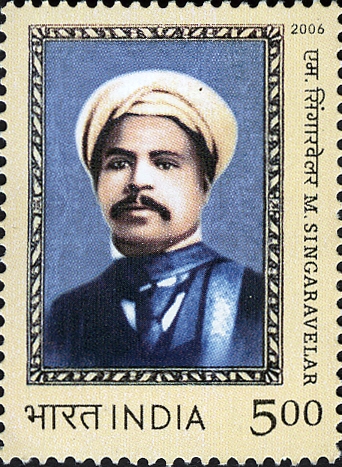
M. Singaravelu
I think this conference is the first of its kind in the whole of India. One can boldly assert that this conference will bring good to the country and people. Unfortunately some people, out of ignorance, have ridiculed this conference. As usual, theists indulge in slander. The bureaucrats try to indulge in repression under some pretext or other. But this is not a new occurrence. In the past all progressive movements have been persecuted and ridiculed.
Not content with ridiculing the progressive movement, this mad and ignorant world has always tried to stop the spread of scientific knowledge. Ingersol, the famous atheist of America was not taken note of during his lifetime and was even ridiculed. But now his birth anniversary is being celebrated in America. Bradlaugh, the British atheist, was put behind bars during his lifetime. Now what happens in Britain? Commemoration meetings in honour of Bradlaugh are being held in Britain. I am sure in due course still bigger conferences of this kind would be held in this country. It is quite likely that people may forget the names of the atheists but their ideas will remain forever in their minds.
Atheism is an ancient doctrine which originated and developed side by side with theism. When the concept of God was ushered in, alongside came the doctrine of ‘no-God’. Till the time man developed his faculty to speak, he was not aware of any God. Some of the primitive tribesmen have confessed their ignorance about God, and can aptly be called ‘primitive atheists’.
Atheism is an ancient doctrine which originated and developed side by side with theism. When the concept of God was ushered in, alongside came the doctrine of ‘no-God’. Till the time man developed his faculty to speak, he was not aware of any God. Some of the primitive tribesmen have confessed their ignorance about God, and can aptly be called ‘primitive atheists’.
In this connection it is really interesting to note the history of religion. Every religion had proclaimed that people belonging to the other religions were atheists. A non-Hindu is an atheist to a Hindu. To a Muslim any non- Muslim is an atheist. Likewise, many more people were termed as atheists. Hence, I would like to say one should really be proud to be an atheist as he is not only non-religious but also does not accept a belief in God.
As the word (God) was man’s own creation, he began to build houses (temples) for his God. Just as he respected his superiors and elders, he began to respect his God. What he did to entertain himself like music, dance, rituals, feasts, he offered to his God. Thus, God advanced as man advanced.
Some shrewd men of those days found an easy way to life and this paved the way for replacing the word with an idol. To make man live perpetually in fear of God, these men did everything possible and thus priesthood came into existence. These priests lived and thrived on the fear and ignorance of men. Thus around the single word ‘God’ the entire edifice of religious and philosophical system of rituals and prayers were built. In the course of history, many beliefs have become obsolete and I am sure that this belief, namely, theism too would become obsolete in due course.
The first and most dangerous affect of theism is that it saps the initiative of man. Ignorance take deep roots in him. People are prevented from acquiring scientific knowledge. Theism is not only a negative evil; it is positively harmful to the people.
The first and most dangerous affect of theism is that it saps the initiative of man. Ignorance take deep roots in him. People are prevented from acquiring scientific knowledge. Theism is not only a negative evil; it is positively harmful to the people. Whatever may be the future of God, we can never forget and forgive his past. It is only atheism that instills confidence in man. It is only atheism which proclaims that social and economic inequalities are only manmade. Hence, it goads man to seek out ways of removing obstacles in the way of progress. It is only atheism that proclaims to man: ‘Man, be a man. You alone can convert this earth into a paradise.’
Comrades, crucial battles are ahead of us. We cannot rest on our laurels now. Though it is put on defence, theism has not been completely routed. Power, money, propaganda, still side with theism. Further, a majority of people, out of ignorance still remain with theism and we have to redeem them. Theism alongwith power and money may over and again attempt to bar the growth and development of human initiative. A concrete example is the development of Hitlerism and fascism. Religious beliefs and other ageold obscurantist ideas are thrust down the throats of people. This is a dangerous trend. Take again some of the views expressed by Gandhiji. He is openly advocating theism. Further, he is crying to make some readjustment in the caste system, to reform it. In our view these are against the principles of atheism. The so-called removal of untouchability is a mere device to strengthen religious beliefs among the people. The untouchables numbering about six crores are economically poor and downtrodden. What they need is neither God or religion. They need a meal a day and an opportunity to earn a decent living.
Comrades, crucial battles are ahead of us. We cannot rest on our laurels now. Though it is put on defence, theism has not been completely routed. Power, money, propaganda, still side with theism. Further, a majority of people, out of ignorance still remain with theism and we have to redeem them. Theism alongwith power and money may over and again attempt to bar the growth and development of human initiative.
However, there is another danger ahead. The Hindu Mahasabha, the Sanatanis, Muslim communalists, etc., are still striving hard to capture the legislative assembly so that theism can be enthroned. These are the worst reactionaries in this unfortunate land. Beware comrades, not to lose this opportunity for contesting and capturing every seat in every village and panchayat, in every taluk and district board. Fearlessly expose the sham of casteism and oppression. Dethrone ignorance and theism. Please, enthrone atheism and socialism in its place.
The great Calcutta killings (Calcutta, September 1946)
SYAMA PRASAD MOOKERJEE
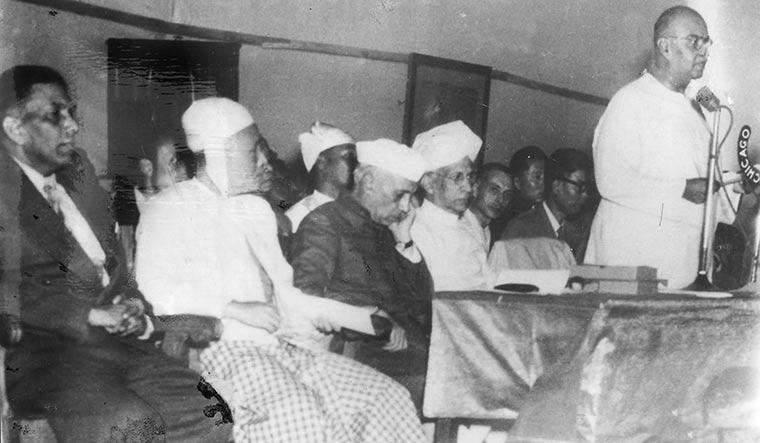
Syama Prasad Mookerjee
Sir, since yesterday we have been discussing the motions of no-confidence under circumstances, which perhaps have no parallel in the deliberations of any Legislature in any part of the civilized world. What happened in Calcutta is without a parallel in modern history. St Bartholomew’s Day of which history records some grim events of murder and butchery pales into insignificance compared to the brutalities that were committed in the streets, lanes and bye-lanes of this first city of British India. We have been discussing, Sir, as to the genesis of these disturbances. Time will not permit me to go through the detailed history and course of events during the last few years.
But let me say this that what has happened is not the result of a sudden explosion, but it is the culmination of an administration, inefficient, corrupt and communal, which has disfigured the life of this great Province. But so far as the immediate cause is concerned, rightly reference has been made by members belonging to the Muslim League and also to the Opposition that we have to look to the resolution that was passed at Bombay at the all-India session of the Council of the Muslim League. Now what happened there? It is said, on behalf of the Muslim League that the Cabinet Mission proved faithless to Muslim interests and thereby created a situation which had no parallel in the history of Anglo-Muslim relationship in this country. What did actually the Cabinet Mission do? The Muslim League, the spoilt and pampered child of the British imperialists for the last thirty years, was disowned for the first time by the British Labour Government…(loud noise from the government benches)…I know it that members when they hear the bitter truth, can hardly repress their feelings. Sir, the fact remains that the old policy of the British Government of no advancement without a Congress-Muslim League agreement was for the first time given up in I946…(loud cries from the government benches)…I have only stated the fact and I do not make any comment on it and still my friends become impatient immediately. Now, the fact remains that the Muslim League was bypassed and the Interim Government has been formed at the Centre. Supposing Mr Jinnah had been asked to form the Interim Government without the Congress, would my friends belonging to the Muslim League have then blamed the government for having betrayed the interests of the Hindu community?
But let me say this that what has happened is not the result of a sudden explosion, but it is the culmination of an administration, inefficient, corrupt and communal, which has disfigured the life of this great Province. But so far as the immediate cause is concerned, rightly reference has been made by members belonging to the Muslim League and also to the Opposition that we have to look to the resolution that was passed at Bombay at the all-India session of the Council of the Muslim League.
Sir, what happened after the Bombay resolution? I have before me a summary of the speeches delivered by distinguished spokesmen on behalf of the Muslim League in every part of India and although it was said that the Direct Action Day itself was not the day for commencing direct action, it was at the same time pointed out that the war had begun, the days of peace and compromise were over and now the jehad … (A member from the Government Benches: Against whom?) War against everyone who did not accept Pakistan. That has been made abundantly clear.
I would ask my friends not to misunderstand me. I am trying to put in brief their point of view as I would ask them also to appreciate our point of view. We are like poles asunder. You say you will plunge the country Pakistan by any means whatsoever. These two points of view are irreconcilable and what I am now telling the House is this that the members speaking on behalf of the Muslim League did not mince matters. Muslim leaders want Civil War. Only a pattern of civil war, according to Mr Jinnah, was witnessed in this very city of Calcutta, but whether civil war will ultimately help Muslims to get Pakistan or not is a matter that remains yet to be seen. It is said that British Imperialists are against the Muslim League. Why talk rot in this way? Who gave you separate electorate and communal award? Who is helping the Sind ministry to remain in power? Is not the Governor a British Governor? Are not the three European members of the Sind Assembly British members of that House? Are they not trying their level best somehow to keep the Muslim League in power and not allow the Congress to go to office although among the Indian members they are in a majority?
Now, Sir, I shall leave this aside. I shall not refer to the detailed speeches which have been delivered by the Muslim League leaders barring one or two illustrative remarks. When Mr Jinnah was confronted at a preconference in Bombay on the 31st July and was asked whether direct action involved violence or non-violence, his cryptic reply was ‘I am not going to discuss ethics’. (The Hon’ble Mr Muhammad Ali: Good.) But Khwajah Nazimuddin was not so good. He came out very bluntly in Bengal and he said that Muslims did not believe in non-violence at all, Muslims knew what direct action meant and there were one hundred and one ways in which this was made clear by responsible League leaders. One said in the Punjab that the zero hour had struck and that the war had begun. All this was followed by a series of articles and statements which appeared in the columns of newspapers— the Morning News, the Star of India, and the Azad. If you read those documents, particularly I would ask my friend Mr Ispahani if he reads those documents, I do not know whether he had learnt Bengali yet, if not, for his benefit a translation can be made of the Bengali article in Azad, he will be able to find out that there was nothing but open and direct incitement to violence. Hatred of Hindus and jehad on the Hindu were declared in highly charged language. That was the background. I am not going to quote the papers, for I have not the time. You have read them and the general Muslim public have acted according to the instructions.
Now, so far as the later events are concerned, what happened on the 16th of August. What were the preparations made? Mr Ispahani says that they were taken unaware. In the Morning News on the 16th there appeared an announcement on behalf of the ‘Pakistan’ Ambulance Corps and there full instructions were given as to how the Ambulance Corps was to act—mind you, Sir, this was done before the troubles started. This ‘Pakistan Ambulance Corps’ was to be utilized in different parts of the city; they were to go out in batches, cars and officers ‘would be available’ and from the 17th morning announcement was to be made every hour as regards the patients who were to be found in the different hospitals of Calcutta. This was announced before any trouble started in Calcutta and Mr Ispahani says there was no preparation. Of course it was sheer bad luck that you allowed this notice, among many kinds of preparations, to be published in the newspapers.
Now, Sir, what happened on the 16th? I shall not refer to the detailed speeches of other members. But I shall certainly hold responsible the Chief Minister of this province who lost his mental balance by saying in Bombay that he was going to declare Bengal to be an independent state. A minister who cannot control his British underling — the Commissioner of Police — is going to make Bengal an independent state! A minister who comes forward and says ‘I am helpless, I could not save the people of the city because the Commissioner of Police would not listen to me’ will declare Bengal an independent state! Now, that was Mr Suhrawardy. He said he was going to carry on a no-rent campaign in this province. He was going to disobey law and order. His speech before the Legislative Council goes to show that he knew fully well that troubles were ahead. If you analyse his speech it will appear that he knew that troubles were brewing and he said he wanted to be as careful as possible.
Now, Sir, what happened on the 16th? I shall not refer to the detailed speeches of other members. But I shall certainly hold responsible the Chief Minister of this province who lost his mental balance by saying in Bombay that he was going to declare Bengal to be an independent state. A minister who cannot control his British underling — the Commissioner of Police — is going to make Bengal an independent state!
I am not raising the question in this debate as to how many Hindus were butchered or how many Muslims were butchered in Bhawanipore, Taltolla, or Watgunge. That is not the issue. The question in issue today is, did government succeed in protecting life and property; not to which community that life and property belonged? Why did government allow so many Muslim lives to be butchered if you look upon Mr Suhrawardy as the great Muslim champion? Why did he allow the entire administration of law and order to collapse in the city? I shall say, Sir, it was a diabolical plan. I say Sir, there was a well-organized plan to make a lightning attack on the city that would take Hindus by surprise, properties were going to be looted and lives were going to be lost. Then Mr Suhrawardy found that he was caught in his own trap when he and others were hit back in their own coin. He could not regain his lost ground and failed to do what his Muslim brethren asked him to do in agony and distress.
I am not raising the question in this debate as to how many Hindus were butchered or how many Muslims were butchered in Bhawanipore, Taltolla, or Watgunge. That is not the issue. The question in issue today is, did government succeed in protecting life and property; not to which community that life and property belonged?
On the 16th, our case is that provocation came from the other side, their case is that provocation came from the Hindu side. That also I am not going to discuss today. Let us leave that for the time being, but let us proceed to the next stage. Mr Suhrawardy said by 12 noon he realized the situation was very bad. Was he not still the Chief Minister of Bengal? What did he do at that time? Why was not the military called out at that time? I have got here a circular issued by the military for the information of its officers and employees in which clear information is given that the military was ready to come out on Friday noon but it was not asked to do so. The civil police failed to protect the life and property as it was expected to do and whenever the military was asked to come out, it came out and it did whatever it could do. But, alas, thousands had been killed meanwhile and crores of rupees looted!
On Friday Mr Suhrawardy knew that trouble had broken out— no matter whether the Hindus were the aggressors or the Muslims were, why did he allow the whole city to be placed at the mercy of goondas, dacoits and murderers? Why did he allow the meeting at all to be held at the maidan in the afternoon over which he presided? He stands charged with the deliberate offence of having played havoc with the life and property of the citizens of this great city, no matter whether they were Hindus or they were Muslims. On Friday night he gave a message to the Associated Press that the condition in the city had improved. Does he remember it? It seems that the Associated Press went to the next day’s newspapers. I would ask my friends to forget for the time being that they belong to the Muslim League. If Mr Suhrawardy says ‘no’, here, Sir, is the statement of Mr H.S. Suhrawardy, Chief Minister of Bengal— I suppose that is the gentleman sitting over there (laughter) interviewed by the Associated Press of India to the effect that the situation was improving. (Uproar) (A voice from the government benches: What paper?) Every newspaper. (Renewed uproar.) I would ask my friends that they must observe the rules of the game and fairplay even in a discussion like this. Why don’t you ask the Chief Minister to explain this?
Mr Speaker, you can certainly look into it. I am not afraid of the truth. Yes, Sir, (Sent the paper to Mr Speaker.) I can produce it to anyone who wants to see it. Now, Sir, Section l44 is supposed to have been promulgated on Friday but was never enforced.
Then on Saturday the curfew order was inaugurated, but neither Section 144 nor the curfew order was enforced. How is it that in spite of Section 144 and the curfew order people were moving about committing loot and plunder, and murder even? How is it that within a stone’s throw, Mr Ispahani has pointed out, from Lalbazar police station shops were looted, people were murdered and all sorts of offences were committed without the Police moving an inch?
Of course, you are responsible. If you have got the guts to say that you are not responsible, let us know that. Now, Sir, that was on the 16th and 17th August. Later on what happened? Mr Suhrawardy knows it very well that he was telling a double-faced lie. On the 23rd he issued a broadcast message, a message of peace for the people of Bengal and within half an hour of that he sent out a special message for the foreign press through foreign correspondents and the things which are mentioned in that document are entirely different from the broadcast message which he issued to the people of Bengal. Can he deny that? (A voice from the Government Benches: That is obvious). He has stated that the Hindus have started the riot. (The Hon’ble Mr H.S. Suhrawardy: Certainly.) He has said that it is the Hindus, who are to blame. He said it was the British Government which was to blame. Say ‘certainly’ (laughter) and lastly, he said that he cannot yet tell what will happen in future if the Interim Government continues in office. Now, Sir, if that is the remark which he wanted to make on that day what was the use of his appealing to the people of Bengal for peace and harmony and saying ‘I have kept an open mind and I would like Hindus and Muslims to work together’. Can history give us a better example of a double-faced minister?
Sir, there are two matters here which may be mentioned. Mr Suhrawardy said that he could not control the Commissioner of Police because he was not under his orders. I shall give you, Sir, one instance out of many which are available from which it will appear how Mr Suhrawardy interfered with the administration of the police offices in a manner which was unworthy of any Home Minister of any Province. In the Park Street police station about seven goondas were taken by a European Inspector on Sunday evening. Sir, that is the remark which Mr Suhrawardy has made namely, ‘I am sorry you are a goonda then.’ I do not know who they are. These persons were found with looted properties. If Mr Suhrawardy says that Muslim gentlemen took away looted properties I shall bow down my head to him, but if he says that I am a goonda then I too can say that he is the best goonda that is available not only in this Province but throughout the world.
(Uproar)
Sir, I shall withdraw it as soon as Mr Suhrawardy withdraws what he has said about me. (Cries of ‘withdraw, withdraw’ from the government benches). Let him withdraw first, what he first has said about me.
Now I withdraw too. Now, Sir, let me pass on. So far as the Park Street incident is concerned, the important point is that goondas or gentlemen whoever they were, seven Muslims who were found in possession of looted properties were brought into Park Street police-station by a European Inspector. Within ten minutes Mr H.S. Suhrawardy appears on the scene. He gets these persons released. It is on record. Let him deny that. (The Hon’ble Mr H.S. Suhrawardy: Yes). (Cries of ‘shame, shame’ from Congress benches.) Then he comes back (Mr H.S. Suhrawardy: Oh! no). This is the way, Sir, in which Mr Suhrawardy has behaved. This is one instance I am giving. (Cries of ‘you have cooked it’ from government benches). No, I have not cooked it. He himself has admitted it.
Then, Sir, the Muslim League party wanted 500 gallons of petrol from the Bengal Government. That was not granted, but petrol coupons were issued in the name of individual ministers — general coupons — 100 gallons being issued in the name of the Chief Minister. Evidence is available that these coupons were used by lorries moving in the streets of Calcutta on those fateful days. That is how arrangements were being made under the very nose of the Home Department over which Mr Suhrawardy was presiding. Can Mr Suhrawardy deny that he himself went to Howrah accompanied by some Muslim League leaders, met local officers in authority there, and had chastized and taken them to task because Muslims were not protected there? Can he deny that? Did Mr Suhrawardy give in any place or at any time the same sort of protection to the suffering Hindus. (The Hon’ble Mr H.S. Suhrawardy: Certainly). Now, Sir, it is quite clear that at least I have said some home truths which have made my friends opposite angry and impatient.
Sir, they, these ministers, have taken oath of allegiance to the British Crown and they are responsible for the life and property of all alike. My friend, Mr Muhammad Ali, admitted this very candidly when the adjournment motion was not allowed to be taken up in this House. Mr Suhrawardy is a great Muslim League leader and he owes his allegiance to the Muslim League. The Muslim League rightly or wrongly ordered that if something does not happen to its liking, it was going to resort to direct action. One cannot serve two masters. Sir, it has been proved beyond doubt that Mr Suhrawardy and his other Ministers are unable to administer the affairs of this Province impartially and efficiently. They have failed hopelessly and wretchedly and on that ground alone they are not fit to occupy offices for a single moment (Interruptions).
Sir, it is not in Calcutta alone that atrocities were committed in a large scale, but we find that troubles are spreading now in the whole of Bengal. The information which is coming from different parts of Bengal would make one shudder to think as to what will happen to this province. These gentlemen, the ministers over there, should not remain in charge of the affairs of this province even a day longer.
Sir, it is not in Calcutta alone that atrocities were committed in a large scale, but we find that troubles are spreading now in the whole of Bengal. The information which is coming from different parts of Bengal would make one shudder to think as to what will happen to this province. These gentlemen, the ministers over there, should not remain in charge of the affairs of this province even a day longer. (Interruptions) If they remain in office the future would be darker still. (Interruptions) The Council of Action of the All-India Muslim League has ordered that preparations have to be made for giving effect to the Direct Action Program. Already Muslim League leaders from the Punjab, North-West Frontier Province and also Sind have openly declared that they are ready with their scheme which can be put into operation at 24 hours’ notice. Am I to believe that the Muslim League in Bengal which is a stronghold of Mr Jinnah’s Muslim League is not similarly prepared to give effect to the order of the Muslim League when the occasion demands it? In other words, my charge is that the present Ministry is utilizing the government machinery for the purpose of launching upon a Direct Action scheme. (The Hon’ble Mr H.S. Suhrawardy: No). Mr Suhrawardy is playing a dual role and this dual role of Mr Suhrawardy and those who are supporting him has got to be exposed and brought to an end in the interest of peace and tranquility.
Why does not the Chief Minister get the reports of the Commissioner of Police through the Criminal Investigation Department as regards some meetings which took place in the city? Mr Suhrawardy has perhaps got the proceedings confidentially of the meetings which were held in the cities where League leaders were invited to attend for the purpose of preparing scheme for direct action. If he has got any report about what happened on the 16th, he will find that even when the Calcutta maidan meeting was being held, over which Mr Suhrawardy presided, disturbances had broken out in several places. Now what happened in that meeting? Was there then any CID officer present taking down notes? Where are those notes?
Sir, it was an astonishing fact that a gun shop within 2 minutes walk from the Government House had been looted. Not a single policeman turned up in the streets to control the situation in any part of the city. It will not help merely making the Commissioner of Police a scapegoat, it is suggested that the city had been ablaze in so many places that the Commissioner of Police did not know how to act. But surely Mr Suhrawardy knew how and when to act. (The Hon’ble Mr H.S. Suhrawardy: Yes, yes). Mr Suhrawardy says that he knew and we also know when he acted. If he had failed without making any effort, then he is charged with criminal negligence and if he failed in spite of efforts, he is certainly inefficient and worthless, and he should not be kept in that position any longer. There is no place for him in the ministry.
Sir, there is one point which I would like to say with regard to the Britishers in this House. My friends are remaining neutral. I cannot understand this attitude at all. In a situation such as this they must decide if the ministry was right or the ministry was wrong. If the ministry was right, support them and if the ministry was wrong, you should say so boldly and not remain neutral merely sitting on the fence which shows signs of abject impotence (Laughter).
If a single Britisher, man or woman or a child, had been strong enough they would have thrown this ministry out of office without hesitation, but because no Britisher was touched so they can take an impartial and neutral view! Are they so sure they will be left untouched next time? There is no question of partiality or impartiality here. The present administration has failed and it must come to an end. Anyone who remains neutral is an aider and abettor.
My friend, Mr Gladding, said that luckily none of his people were injured. It is true, Sir, but that is a statement which makes me extremely sorry. If a single Britisher, man or woman or a child, had been strong enough they would have thrown this ministry out of office without hesitation, but because no Britisher was touched so they can take an impartial and neutral view! Are they so sure they will be left untouched next time? There is no question of partiality or impartiality here. The present administration has failed and it must come to an end. Anyone who remains neutral is an aider and abettor.
I would ask my friends, what about the future. Pakistan will not be accepted under any circumstance. (Mr Fazlur Rahman: It will be accepted). Mr Suhrawardy said in Bombay after the 16th of August, ‘When a nation fights against another nation I cannot guarantee civilized conduct.’ If you are a nation fighting against us, another nation, if that is the attitude of my friends on the other side, then they cannot remain in office any longer. (Cries of ‘Hear, hear’ from the Opposition Benches). Mr Suhrawardy must realize that his office is meant for the good of the entire people of Bengal irrespective of caste, creed and religion, and not for his own so-called ‘nation’. I would say, Sir, that is an abject treachery to the great responsibility that rests on Mr Suhrawardy, as Premier (Interruptions).
Apparently I said many good things, otherwise my friends would not be so jubilant. The Chief Minister was dancing the other day on the polished floor of a Delhi Hotel and I have made my friends dance on the floor of this House. I will now say a few words in connection with the future. What about the future? My friends, the Muslims, say that they constitute 25 percent of India’s population, and that is so big a minority that they will never agree to live under 75 percent Hindu domination. Now if that is their honest and genuine point of view how can they expect that 45 percent of the Hindu population of this Province will ever agree to live under a Constitution where that particular nation represented by Muslims, constituting only of 55 percent, will alone dominate? (The Hon’ble Mr Shamsuddin Ahmed: That is how the trouble began). I will not today enter into controversies as regards the real population of Bengal. I claim it that if a proper census is taken even today the Hindus will not be in a minority but that question cannot be settled by argument from one side or the other. My Muslim friends who are well-organized under the banner of the Muslim League have got to realize that if Bengal is to be ruled peacefully it can be done only with the willing cooperation of the two communities. I am not talking of all India politics for the time being. (The Hon’ble Mr Shamsuddin Ahmed: Why not? What has happened to all India politics?) I would make this appeal to my friends that a choice has to be made by the Hindus and the Muslims together. There is no way out of it because what we witnessed in Calcutta was not an ordinary communal riot: its motive was political, but things may become even far more serious and drastic in the days, weeks and months to come. Now, if the Muslims of Bengal under the leadership of the Muslim League feel that they can exterminate the Hindus, that is a fantastic idea which can never be given effect to: three and a half crores can never exterminate three crores nor can three crores exterminate three and a half crores.
Sir, if it is said that civil war will break out throughout India, will that help anyone, will that help, in particular, 25 percent. Muslims throughout India as against 75 percent of Hindus and other non-Muslims. It is not a question of threat at all; it is a question of facing a stern reality. Either we have to fight or we have to come to some settlement. The settlement cannot be reached so long as you say that one community will dominate over the other, but it can only be reached by a plan which will enable the vast majority of Hindus and Muslims to live under circumstances which will give freedom and peace to the common man.
Now, Sir, if it is said that civil war will break out throughout India, will that help anyone, will that help, in particular, 25 percent. Muslims throughout India as against 75 percent of Hindus and other non-Muslims. It is not a question of threat at all; it is a question of facing a stern reality. Either we have to fight or we have to come to some settlement. The settlement cannot be reached so long as you say that one community will dominate over the other, but it can only be reached by a plan which will enable the vast majority of Hindus and Muslims to live under circumstances which will give freedom and peace to the common man. After all, forget not who suffered most during the Calcutta Killing. It as mainly the poorer people, both amongst the Hindus and the Muslims. Ninety percent of them were poor and innocent and if the leaders lose their heads and go creating a situation which they cannot ultimately control, the time will soon come when the common man will turn round and crush the leaders instead of being themselves crushed. It is therefore vitally necessary that this false and foolish idea of Pakistan or Islamic rule has to be banished for ever from your head. In Bengal we have got to live together. We say as a condition precedent this ministry must go. Only then can we create a state of affairs which will make it possible to build a future Bengal which will be for the good of all, irrespective of any caste, creed, or community.
Opening address to the Constituent Assembly of Pakistan (Karachi, August 1947)
MUHAMMAD ALI JINNAH
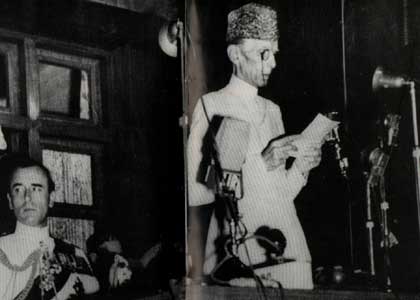
Jinnah speaking at the Constituent Assembly of Pakistan on 14 August 1947
Mr President, Ladies and Gentlemen!
I cordially thank you, with the utmost sincerity, for the honor you have conferred upon me — the greatest honour that is possible for this Sovereign Assembly to confer — by electing me as your first President. I also thank those leaders who have spoken in appreciation of my services and their personal references to me. I sincerely hope that with your support and your cooperation we shall make this Constituent Assembly an example to the world. The Constituent Assembly has got two main functions to perform. The first is the very onerous and responsible task of framing our future Constitution of Pakistan and the second is functioning as a full and complete sovereign body as the Federal Legislature of Pakistan. We have to do the best we can in adopting a provisional constitution for the Federal Legislature of Pakistan. You know really that not only we ourselves are wondering but, I think, the whole world is wondering at this unprecedented cyclonic revolution which has brought about the plan of creating and establishing two independent sovereign dominions in this subcontinent. As it is, it has been unprecedented; there is no parallel in the history of the world. This mighty subcontinent with all kinds of inhabitants has been brought under a plan which is titanic, unknown, unparalleled. And what is very important with regard to it is that we have achieved it peacefully and by means of an evolution of the greatest possible character.
Dealing with our first function in this Assembly, I cannot make any well considered pronouncement at this moment, but I shall say a few things as they occur to me. The first and the foremost thing that I would like to emphasize is this: Remember that you are now a sovereign legislative body and you have got all the powers. It, therefore, places on you the gravest responsibility as to how you should take your decisions. The first observation that I would like to make is this: You will no doubt agree with me that the first duty of a government is to maintain law and order, so that the life, property and religious beliefs of its subjects are fully protected by the state.
Remember that you are now a sovereign legislative body and you have got all the powers. It, therefore, places on you the gravest responsibility as to how you should take your decisions. The first observation that I would like to make is this: You will no doubt agree with me that the first duty of a government is to maintain law and order, so that the life, property and religious beliefs of its subjects are fully protected by the state.
The second thing that occurs to me is this: One of the biggest curses from which India is suffering — I do not say that other countries are free from it, but, I think, our condition is much worse — is bribery and corruption. That really is a poison. We must put that down with an iron hand and I hope that you will take adequate measures as soon as it is possible for this Assembly to do so.
Black-marketing is another curse. Well, I know that black-marketeers are frequently caught and punished. Judicial sentences are passed or sometimes fines only are imposed. Now you have to tackle this monster which today is a colossal crime against society, in our distressed conditions, when we constantly face shortage of food and other essential commodities of life. A citizen who does black-marketing commits, I think, a greater crime than the biggest and most grievous of crimes. These black-marketeers are really knowing, intelligent and ordinarily responsible people, and when they indulge in black-marketing, I think they ought to be very severely punished, because they undermine the entire system of control and regulation of foodstuffs and essential commodities, and cause wholesale starvation and want and even death.
The next thing that strikes me is this: Here again it is a legacy which has been passed on to us. Alongwith many other things, good and bad, has arrived this great evil—the evil of nepotism and jobbery. This evil must be crushed relentlessly. I want to make it quite clear that I shall never tolerate any kind of jobbery, nepotism or any influence directly or indirectly brought to bear upon me. Whenever I will find that such a practice is in vogue or is continuing anywhere, low or high, I shall certainly not countenance it.
Now, if we want to make this great State of Pakistan happy and prosperous we should wholly and solely concentrate on the well-being of the people, and especially of the masses and the poor. If you will work in cooperation, forgetting the past, burying the hatchet, you are bound to succeed. If you change your past and work together in a spirit that every one of you, no matter to what community he belongs, no matter what relations he had with you in the past, no matter what is his colour, caste or creed, is first, second and last a citizen of this state with equal rights, privileges and obligations, there will be no end to the progress you will make.
I know there are people who do not quite agree with the division of India and the partition of the Punjab and Bengal. Much has been said against it, but now that it has been accepted, it is the duty of every one of us to loyally abide by it and honourably act according to the agreement which is now final and binding on all. But you must remember, as I have said, that this mighty revolution that has taken place is unprecedented. One can quite understand the feeling that exists between the two communities wherever one community is in majority and the other is in minority. But the question is, whether it was possible or practicable to act otherwise than what has been done. A division had to take place. On both sides, in Hindustan and Pakistan, there are sections of people who may not agree with it, who may not like it, but in my judgment there was no other solution and I am sure future history will record its verdict in favour of it. And what is more, it will be proved by actual experience as we go on that it was the only solution of India’s constitutional problem. Any idea of a united India could never have worked and in my judgment it would have led us to terrific disaster. May be that view is correct; may be it is not; that remains to be seen. All the same, in this division it was impossible to avoid the question of minorities being in one dominion or the other. Now that was unavoidable. There is no other solution. Now what shall we do? Now, if we want to make this great State of Pakistan happy and prosperous we should wholly and solely concentrate on the well-being of the people, and especially of the masses and the poor. If you will work in cooperation, forgetting the past, burying the hatchet, you are bound to succeed. If you change your past and work together in a spirit that every one of you, no matter to what community he belongs, no matter what relations he had with you in the past, no matter what is his colour, caste or creed, is first, second and last a citizen of this state with equal rights, privileges and obligations, there will be no end to the progress you will make.
I cannot emphasize it too much. We should begin to work in that spirit and in course of time all these angularities of the majority and minority communities, the Hindu community and the Muslim community—because even as regards Muslims you have Pathans, Punjabis, Shias, Sunnis, and so on and among the Hindus you have Brahmins, Vaishnavas, Khatris, also Bengalees, Madrasis, and so on—will vanish. Indeed if you ask me this has been the biggest hindrance in the way of India to attain the freedom and independence and but for this we would have been free peoples long, long ago. No power can hold another nation, and specially a nation of 400 million souls in subjection; nobody could have conquered you, and even if it had happened, nobody could have continued its hold on you for any length of time but for this. Therefore, we must learn a lesson from this. You are free; you are free to go to your temples, you are free to go to your mosques or to any other place of worship in this State of Pakistan. You may belong to any religion or caste or creed—that has nothing to do with the business of the state. As you know, history shows that in England, conditions some time ago, were much worse than those prevailing in India today. The Roman Catholics and the Protestants persecuted each other. Even now there are some states in existence where there are discriminations made and bars imposed against a particular class. Thank God, we are not starting in those days. We are starting in the days when there is no discrimination, no distinction between one community and another, no discrimination between one caste or creed and another. We are starting with this fundamental principle that we are all citizens and equal citizens of one state. The people of England in course of time had to face the realities of the situation and had to discharge the responsibilities and burdens placed upon them by the government of their country and they went through that fire step by step. Today, you might say with justice that Roman Catholics and Protestants do not exist; what exists now is that every man is a citizen, an equal citizen of Great Britain and they are all members of the Nation.
Now, I think we should keep that in front of us as our ideal and you will find that in course of time Hindus would cease to be Hindus and Muslims would cease to be Muslims, not in the religious sense, because that is the personal faith of each individual, but in the political sense as citizens of the state. Well, gentlemen, I do not wish to take up any more of your time and thank you again for the honour you have done to me. I shall always be guided by the principles of justice and fairplay without any, as is put in the political language, prejudice or ill-will, in other words, partiality or favouritism. My guiding principle will be justice and complete impartiality, and I am sure that with your support and cooperation, I can look forward to Pakistan becoming one of the greatest nations of the world.
Now, I think we should keep that in front of us as our ideal and you will find that in course of time Hindus would cease to be Hindus and Muslims would cease to be Muslims, not in the religious sense, because that is the personal faith of each individual, but in the political sense as citizens of the state.
I have received a message from the United States of America addressed to me. It reads:
I have the honour to communicate to you, in Your Excellency’s capacity as President of the Constituent Assembly of Pakistan, the following message which I have just received from the Secretary of State of the United States:
On the occasion of the first meeting of the Constituent Assembly for Pakistan, I extend to you and to the members of the Assembly, the best wishes of the Government and the people of the United States for the successful conclusion of the great work you are about to undertake.
Jama Masjid Speech (Delhi, 1947)
MAULANA ABUL KALAM AZAD
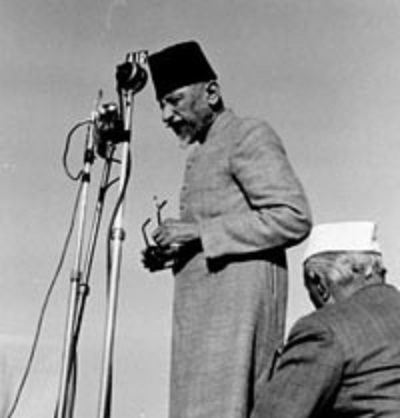
Maulana Abul Kalam Azad
My brethren,
You know what has brought me here today. This congregation at Shahjahan’s historic mosque is not an unfamiliar sight for me. Here, I have addressed you on several previous occasions. Since then we have seen many ups and downs. At that time, instead of weariness, your faces reflected serenity, and your hearts, instead of misgivings, exuded confidence. The uneasiness on your faces and the desolation in your hearts that I see today, reminds me of the events of the past few years.
Do you remember? I hailed you, you cut off my tongue; I picked my pen, you severed my hand; I wanted to move forward, you broke off my legs; I tried to run, and you injured my back. When the bitter political games of the last seven years were at their peak, I tried to wake you up at every danger signal. You not only ignored my call but revived all the past traditions of neglect and denial. As a result the same perils surround you today, whose onset had previously diverted you from the righteous path.
Today, mine is no more than an inert existence or a forlorn cry; I am an orphan in my own motherland. This does not mean that I feel trapped in the original choice that had made for myself, nor do I feel that there is no room left for my ashiana (nest). What it means is that my cloak is weary of your impudent grabbing hands. My sensitivities are injured, my heart is heavy. Think for one moment. What course did you adopt? Where have you reached, and where do you stand now? Haven’t your senses become torpid? Aren’t you living in a constant state of fear? This fear is your own creation, a fruit of your own deeds.
Today, mine is no more than an inert existence or a forlorn cry; I am an orphan in my own motherland. This does not mean that I feel trapped in the original choice that had made for myself, nor do I feel that there is no room left for my ashiana (nest). What it means is that my cloak is weary of your impudent grabbing hands. My sensitivities are injured, my heart is heavy.
It was not long ago when I warned you that the two-nation theory was death-knell to a meaningful, dignified life; forsake it. I told you that the pillars upon which you were leaning would inevitably crumble. To all this you turned a deaf ear. You did not realize that, my brothers! I have always attempted to keep politics apart from personalities, thus avoiding those thorny valleys. That is why some of my messages are often couched in allusions. The Partition of India was a fundamental mistake. The manner in which religious differences were incited, inevitably, led to the devastation that we have seen with our own eyes. Unfortunately, we are still seeing it at some places.
There is no use recounting the events of the past seven years, nor will it serve any good. Yet, it must be stated that the debacle of Indian Muslims is the result of the colossal blunders committed by the Muslim League’s misguided leadership. These consequences however, were no surprise to me; I had anticipated them from the very start.
Now that Indian politics has taken a new direction, there is no place in it for the Muslim League. Now the question is whether or not we are capable of constructive thinking. For this, I have invited the Muslim leaders of India to Delhi, during the second week of November.
The gloom cast upon your lives is momentary; I assure you we can be beaten by none save our own selves! I have always said, and I repeat it again today; eschew your indecisiveness, your mistrust, and stop your misdeeds. This unique triple-edged weapon is more lethal than the two-edged iron sword which inflicts fatal wounds, which I have heard of.
The gloom cast upon your lives is momentary; I assure you we can be beaten by none save our own selves! I have always said, and I repeat it again today; eschew your indecisiveness, your mistrust, and stop your misdeeds. This unique triple-edged weapon is more lethal than the two-edged iron sword which inflicts fatal wounds, which I have heard of.
Just think about the life of escapism that you have opted for, in the sacred name of Hejrat. Get into the habit of exercising your own brains, and strengthening your own hearts. If you do so, only then will you realize how immature your decisions were.
Where are you going and why? Raise your eyes. The minarets of Jama Masjid want to ask you a question. Where have you lost the glorious pages from your chronicles? Wasn’t it only yesterday that on the banks of the Jamuna, your caravans performed wazu? Today, you are afraid of living here. Remember, Delhi has been nurtured with your blood. Brothers, create a basic change in yourselves. Today, your fear is misplaced as your jubilation was yesterday.
The words coward and frenzy cannot be spoken in the same breath as the word Muslim. A true Muslim can be swayed neither by avarice nor apprehension. Don’t get scared because a few faces have disappeared. The only reason they had herded you in a single fold was to facilitate their own flight. Today, if they have jerked their hand free from yours, what does it matter? Make sure that they have not run away with your hearts. If your hearts are still in the right place, make them the abode of God. Some thirteen hundred years ago, through an Arab ummi, God proclaimed, “Those who place their faith in God and are firm in their belief, no fear for them nor any sorrow.” Winds blow in and blow out: tempests may gather but all this is short-lived. The period of trial is about to end. Change yourselves as if you had never been in such an abject condition.
I am not used to altercation. Faced with your general indifference, however, I will repeat that the third force has departed, and along with it, its trappings of vanity. Whatever had to happen has happened. If your hearts have still not changed and your minds still have reservations, it is a different matter. But, if you want a change, then take your cue from history, and cast yourself in the new mould. Having completed a revolutionary phase, there still remains a few blank pages in the history of India. You can make ourselves worthy of filling those pages, provided you are willing.
Brothers, keep up with the changes. Don’t say, “We are not ready for the change.” Get ready. Stars may have plummeted down but the sun is still shining. Borrow a few of its rays and sprinkle them in the dark caverns of your lives.
Brothers, keep up with the changes. Don’t say, “We are not ready for the change.” Get ready. Stars may have plummeted down but the sun is still shining. Borrow a few of its rays and sprinkle them in the dark caverns of your lives.
I do not ask you to seek certificates from the new echelons of power. I do not want you to lead a life of sycophancy as you did during the foreign rule. I want you to remind you that these bright etchings which you see all around you, are relics of processions of your forefathers. Do not forget them. Do not forsake them. Live like their worthy inheritors, and, rest assured, that if you do not wish to flee from this scene, nobody can make you flee. Come, today let us pledge that this country is ours, we belong to it and any fundamental decisions about its destiny will remain incomplete without our consent.
Today, you fear the earth’s tremors; once you were virtually the earthquake itself. Today, you fear the darkness; once your existence was the epicenter of radiance. Clouds have poured dirty waters and you have hitched up your trousers. Those were none but your forefathers who not only plunged headlong into the seas, but trampled the mountains, laughed at the bolts of lightning, turned away the tornadoes, challenged the tempests and made them alter their course. It is a sure sign of a dying faith that those who had once grabbed the collars of emperors, are today clutching their own throats. They have become oblivious of the existence of God as if they had never believed in Him.
Brothers, I do not have a new prescription for you. I have the same old prescription that was revealed to the greatest benefactor of mankind, the prescription of the Holy Quran: “Do not fear and do not grieve. If you possess true faith, you will gain the upper hand.”
Brothers, I do not have a new prescription for you. I have the same old prescription that was revealed to the greatest benefactor of mankind, the prescription of the Holy Quran: “Do not fear and do not grieve. If you possess true faith, you will gain the upper hand.”
The congregation is now at an end. What I had to say, I have said, briefly. Let me say once again, keep a grip on your senses. Learn to create your own surroundings, your own world. This is not a commodity that I can buy for you from the market-place. This can be bought only from the market-place of the heart, provided you can pay for it with the currency of good deeds.
May God’s grace be on you!
ARCHIVE
Dalit ‘Viranganas’ and Reinvention of 1857
The past three decades particularly have seen a flourishing of popular dalit literature, pamphlets and booklets, which have emerged as a critical resource for deeper insights into dalit politics and identity. Dalits themselves are disentangling received knowledge from the apparatus of control. This literature brings fresh hope, as it is believed that now dalits are in charge of their own images and narratives, witness to and participants in their own experience. They are rescuing dalit culture from degeneration and stereotypes, and bringing in a new dalit aesthetic. They are not the “Other”, and are themselves articulating critical questions of choice and difference.
Most of this literature is mass produced in thousands, usually in the form of thin pamphlets. It is sold in large quantities through small ad hoc stalls put up at various public rallies, conglomerations and melas of dalits, on pavements, and through dalit presses and publishers, reaching through such commercial networks into a large number of dalit households. Most of the authors are not known much or well established. There is a technical lack of sophistication in the production of these pamphlets, and they are usually thin, reproduced with many editions, priced very cheaply at approximately between Rs 2 and Rs 50, printed on cheap paper, through private dalit presses. They are written in simple colloquial Hindi, and encompass various literary genres.
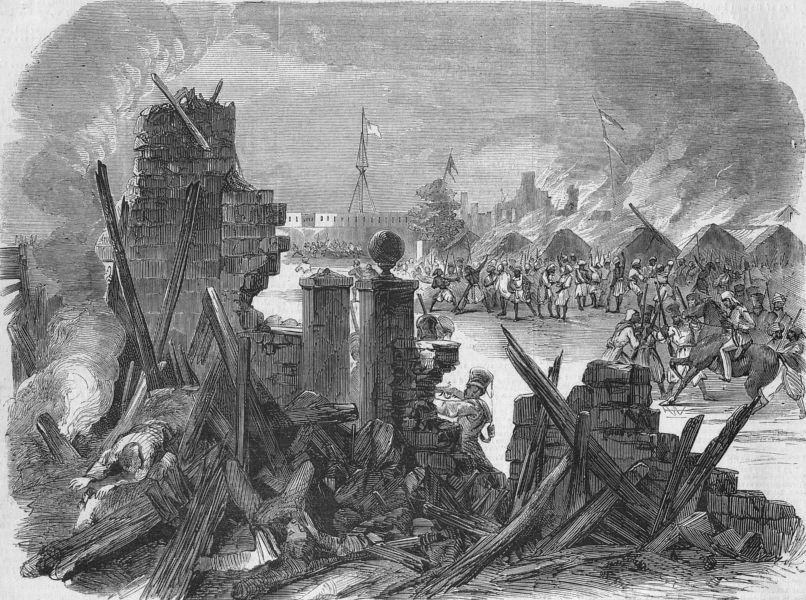
“The Sepoy revolt at Meerut,” wood-engraving from the Illustrated London News, 1857
While covering a huge range, from works by and on Ambedkar, status of dalits and atrocities on them, reservations, conversions, dalit literary writings, theatre and songs, what interests me here are the representations of nationalist struggle in this literature. It has been argued that dalits have had an ambivalent relationship with both Indian nationalism and colonialism, often contradictory with the views of dominant Hindu communities. Some dalit intellectuals argue that the British liberated the dalit masses from the oppressions of Hindu society, and that British rule was good for the dalits. In Uttar Pradesh, many of the activists within the dalit movement had articulated similar ideas as early as the 1920s. For example, the Adi-Hindu movement in the 1920s and 1930s and its leaders were against the Congress and the national movement, and were pro-British. However, in post-independent India, given the imperative political assertions by the dalits, there has been a need felt to assert the nationalist credentials of the dalits and the positive role they played in the freedom struggle. Thus dalit histories have come out with copious volumes on their contribution and role in the independence movement, digging out hitherto ignored accounts. The social constructions of the role played by dalits in the struggle for India’s freedom have thus been changed by the dalits themselves in tandem with changing social and political conditions in specific historical moments within dalit communities. What is significant, however, is that weather dalits argue for an anti-nationalist or a pro-nationalist stance in the colonial period, their agendas and articulations are substantially different, departing from and challenging conventional nationalists and mainstream historians of the period. Dalit perspectives on their own histories offer a dramatically different account from the received wisdoms taught in most Indian universities.
Thus dalit histories have come out with copious volumes on their contribution and role in the independence movement, digging out hitherto ignored accounts. The social constructions of the role played by dalits in the struggle for India’s freedom have thus been changed by the dalits themselves in tandem with changing social and political conditions in specific historical moments within dalit communities. What is significant, however, is that weather dalits argue for an anti-nationalist or a pro-nationalist stance in the colonial period, their agendas and articulations are substantially different, departing from and challenging conventional nationalists and mainstream historians of the period. Dalit perspectives on their own histories offer a dramatically different account from the received wisdoms taught in most Indian universities.
Promoting alternative accounts of role of dalits in the freedom struggle, this literature portrays itself as the real and comprehensive truth. It catalogues their enormous sacrifices and enumerates the many occasions on which dalits rose in defence of the nation. These stories are endlessly repeated in pamphlets after pamphlets, though they have not found their way in canonised/ mainstream history. What is being proposed by dalit writers here is the concreteness and the almost palpable truth of this history. This popular dalit literature can be seen to represent alternative and dissident voices, coexisting with and simultaneously challenging hegemonic ideologies. It is a counterpoint to hegemony. It also reflects Bakhtin’s notions of dialogics and heteroglossia, and Stuart Hall’s concept of “oppositional” decoding, challenging “dominant-hegemonic” and “negotiated” reading positions.
1857 Revolt, Conventional Histories and Dalit Retellings
The revolt of 1857 figures in a major way in the narratives of popular dalit histories, where a completely alternative account of the revolt emerges, converging histories, myths, realities and retelling of the pasts. The outbreak of 1857 has been regarded as a memorable episode in Indian history. It was in a sense one of the first formidable revolt that had broken out against foreign domination. To prove the nationalist credentials of dalits, their popular histories have thus completely transformed 1857.
Before going into these narratives let us briefly examine conventional and standardised histories of the revolt. Various strands of historiography largely seem to converge, particularly on the question of the caste character of the revolt. According to nationalist historians like S B Chaudhuri, Tara Chand and R C Mazumdar, the social composition of 1857 consisted of the ruling class and the traditional elite of the society, who were the “natural leaders” of the revolt. The elitist character of the revolt is highlighted by referring to it as a general movement of the Muslims and the Hindus-princes, landholders, soldiers, scholars and theologians. Marxist scholars seem to fall within the same paradigm where they basically see the revolt as a last attempt of the elite medieval order to halt the process of its dissolution and recover its lost status. Thomas R Metcalf too emphasises that it was not merely a mutiny nor a war of independence. For him 1857 was “a traditionalist movement in which those who had the most to lose in the new sought the restoration of the old pre-British order”. In his significant work, Eric Stokes, while highlighting the local background of the upsurge, also argues that it was the fear of the loss of an upper caste status due to the use of fat-greased cartridges that precipitated the uprising. He shows how ashraf Muslims, brahmins and rajputs had secured a near monopoly over entry into the Bengal army and they were afraid of a loss to their status. Many other contemporary accounts too emphasise the hurt and the fears of pollution felt up upper caste Hindus as an important reason for the revolt. How do dalit histories of 1857 sit in with these accounts? The purity/pollution ties of the upper castes and classes, linked with the crossing of seas or biting of the flesh of the cow or the pig, do not fit in with dalits. There have been other scholars who have emphasised the lower caste base of the revolt as well. Thus, for example, Rudrangshu Mukherjee emphasises the mutual dependence between peasantry and talukdars, which provided the basis for common and united action at this tumultuous juncture. He thus links the seemingly disjointed and contradictory realms of the elite and the common masses. Gautam Bhadra also highlights the common leaders of the revolt. However, even these scholars, in spite of their best intentions, do not explicitly focus on dalits and even less so on women. As Bhadra says, “In all these representations what has been missed out is the ordinary rebel, his role and his perception of alien rule and contemporary crisis” (emphasis in original).
How do dalit histories of 1857 sit in with these accounts? The purity/pollution ties of the upper castes and classes, linked with the crossing of seas or biting of the flesh of the cow or the pig, do not fit in with dalits. There have been other scholars who have emphasised the lower caste base of the revolt as well. Thus, for example, Rudrangshu Mukherjee emphasises the mutual dependence between peasantry and talukdars, which provided the basis for common and united action at this tumultuous juncture. He thus links the seemingly disjointed and contradictory realms of the elite and the common masses. Gautam Bhadra also highlights the common leaders of the revolt. However, even these scholars, in spite of their best intentions, do not explicitly focus on dalits and even less so on women.
With the rise of the dalit movement and literature in north India, the history of 1857 however has been completely inversed, with many histories of it being rewritten, particularly since the 1960s. Contemporary dalit perceptions and compositions of 1857 are very different from scholarly historical studies on the subject, or even constructed “popular” perceptions, and represent the historical consciousness of the revolt in the public memory of the dalits. The pamphlets and books on dalit histories of 1857 – which may also be described as unofficial dalit histories of colonial India – combine myths, memories and histories, depicting dalit versions of the revolt. Dalit writers are attempting here to look upon the mutiny as part of their struggle for freedom. The revolt has taken on the character of a dalit resistance, where alternative dalit heroes are represented as the real symbols of 1857 in dalit popular nationalist consciousness. The rebel dalit heroes – some constructed, some exaggerated, some “discovered” – have become heroes fighting for a free India. In these accounts, the armies of soldiers against British consist largely of dalits. New dalit histories argue that the dalits had nothing much to lose in pre-British times, as their condition had been miserable even then. So it was actually dalits who fought for independence in 1857, while the upper caste Hindus and Indian rulers only fought to restore their rule. The focus of this literature is no longer on the sepoys or the greased cartridges, but on dalits groaning under foreign oppression. As the famous dalit poet Bihari Lal Harit says regarding 1857:
nai, dhobi, kurmi, kachchi/bharbhuje bhaat kumhaar lare.
Lare khak rub mochi dhanak/sab daliton ke parivar lare.
(Barbers, washermen, kurmis, gardeners, grain-parchers, bards and potters fought.
Cobblers rolling in dust and cotton-carders fought. All dalit families fought.)
Dalit narratives of 1857 deploy an impassioned language, and are written usually by dalit men who are not trained historians. These writers are inspired by altogether different sentiments, and their writings reveal the inner dynamics of dalit politics as well. They are writing history with a mission by claiming a past and using it for the furtherance of their future. One of their purposes in writing inspirational histories of this kind is to stimulate dalit nationalism, dalit patriotic sentiment, and their pride. They are rewriting history to provide dignity to the dalits. Present day feelings are ascribed to dalit heroes of 1857, and they are seen as teaching a moral lesson that the dalits of today need to emulate the heroic deed of their past heroes, and fight for their rights today as well. In the dalit literature, 1857 has become the Caesar of India, which is more powerful when dead than alive. It has got inscribed as a heroic popular uprising fought by the lowly, a symbol of challenge to the British power by the dalits. It entailed united dalit activism and sacrifice of enormous numbers. Its history is constantly being reshaped in the present socio-cultural and political context. It has an inspirational quality, an effective conviction, which signifies a present political importance.
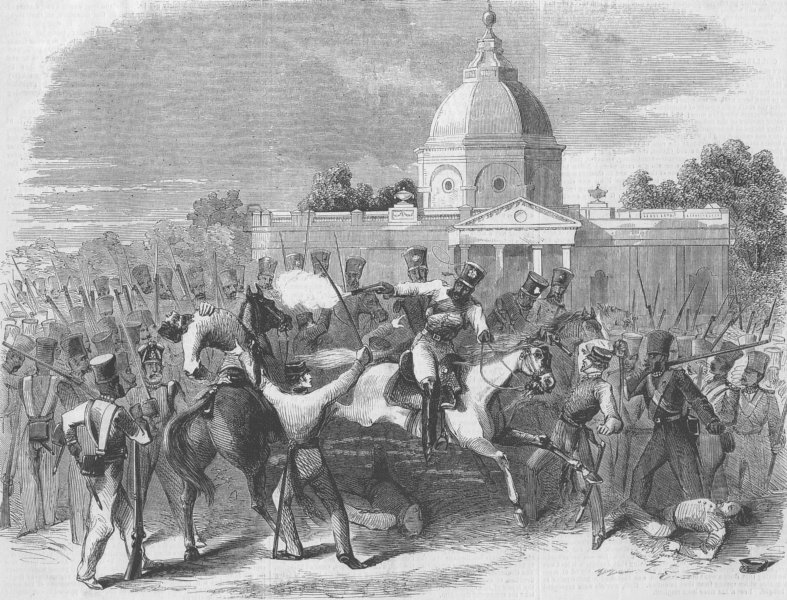
Wood-engraving depicting the massacre of officers by insurgent cavalry at Delhi
1857 has also become a marker for the dalits to prove their nationalist credentials, and claim their own space in the freedom struggle and the history of a nation in the making. By this, dalits also seek to win acceptance from the wider society by creating and legitimising a space for themselves within the nationalist narratives. However, these histories are not just reinventions of the past or inspirational histories. They also reveal a deep impassioned plea to recognise the unsung heroes of the revolt, who were often illiterate and left no written records. Folksongs, oral narratives and myths also thus become the basis of these accounts. As says one:
yatra-tatra sarvatra milegi, unki gaatha ki charcha.
kintu upekshit veervaron ka – kabhi nahin chapta parcha.
(Here, there and everywhere, you will find discussions on their deeds, but the scorned [dalit] heroes are never written about in papers.)
However, this literature has not found its way in mainstream, conventional and canonised historical narratives of 1857, be it school textbooks, restructured curricula or scholarly works. The reasons for this may be camouflaged in a language about “quality”, authenticity and written historical records. Dalit literature on 1857 may be seen as “inferior”, sensational, mimetic and unintellectual, though moving and passionate. The cannon fodder of 1857 history has thus kept dalit versions of 1857 away from the loci of authority – university departments, literary associations and syllabi. Dalit literature on 1857 occupies a different publicpolitical domain and presents an alternate form of knowledge. The language and vocabulary deployed in dalit literature on 1857 stresses the need for dalitisation of history and to examine the dalit leaders of the revolt. Dalits claim that reinventing 1857 from a dalit perspective is imperative in order to represent reality. While appropriating the past, dalit writers are simultaneously questioning the blurred presentations and partial/prejudiced histories of historians, arguing that dalit heroes of the revolt have been completely erased by them. They argue that most historians implicitly hold their high caste biases when writing histories of 1857.
Dalit ‘Viranganas’ of 1857
A chief feature of these popular dalit histories of 1857 is the way dalit women get represented in them. Here myths about dalit viranganas (heroic women) are being reinvented as a potent symbol for identity formation and as a critical part of a movement to define political and social positioning of dalits. Narratives of dalit viranganas abound, with a long list of them littering the Indian past. These women are ascribed particularly heroic roles. In fact, dalit female icons, engaged in radical armed struggles, far outnumber dalit men in 1857. These writings invoke political and public dalit memories, where women like Jhalkari Bai of the kori caste, Uda Devi, a pasi, Mahabiri Devi, a bhangi and Asha Devi, a gurjari, all stated to be involved in the 1857 revolt, have become the symbols of bravery of particular dalit castes and ultimately of all dalits.
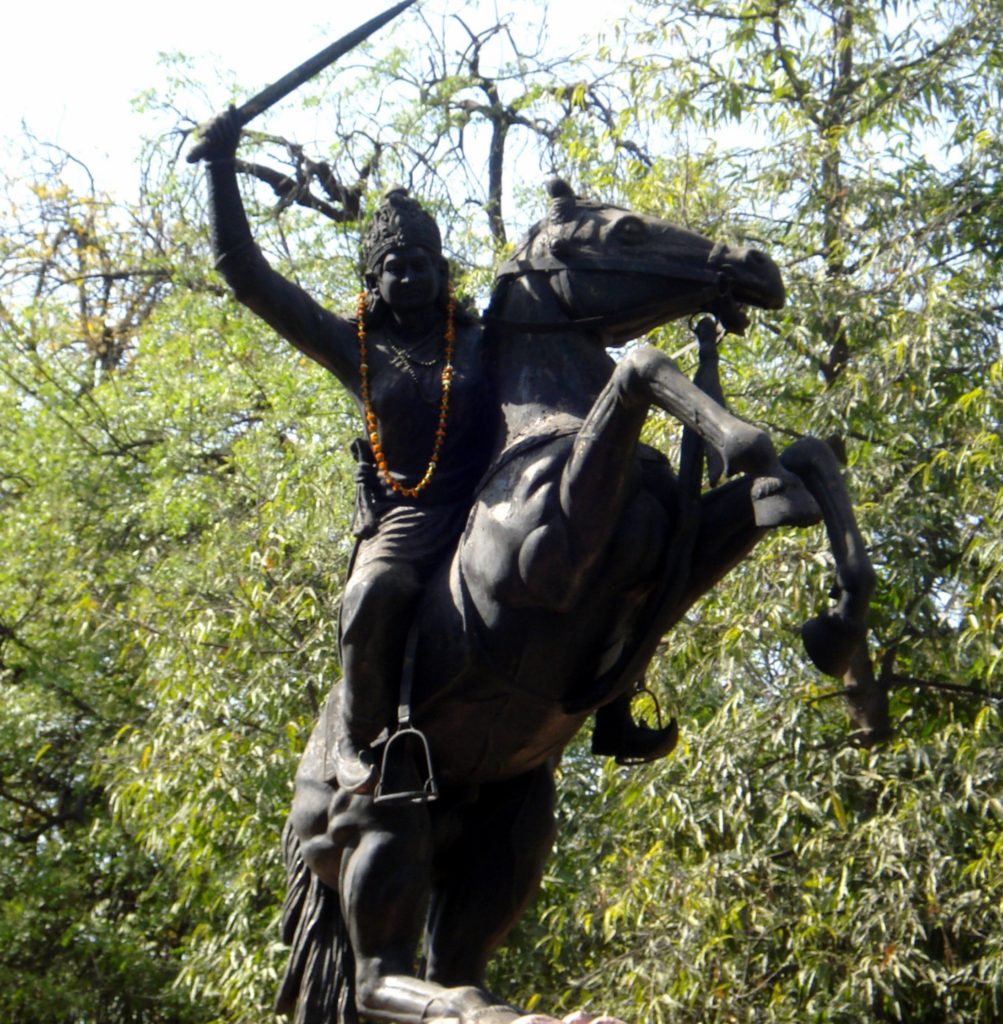
Jhalkari Bai statue at Gwalior
Representing the dalit woman in certain modes in 1857 also indicates ways in which pasts are remembered and retailed, and the relationships of such pasts to people’s sense of belonging. As has been remarked, representation can pose afresh the relationship between memory, myth and history, oral and written, transmitted and inscribed, stereotypicality and lived history. Reading the histories of dalit women viranganas of 1857 through the lens of representation adds important dimensions to our understandings of it, while also revealing tensions between the pedagogical and the performative, the rhetoric and the reality. Foucault has argued that all representations are by their very nature insidious instruments of surveillance, oppression and control – both tools and effects of power. However, if we argue that representations of dalit women are constructed only to support dominant modes of ideology, and that their aim is ultimately coercive, then how can we use this space also for confrontation? Does representation have the scope of carving out more contingent, varied and flexible modes of resistances? Within the field of representation, counter-images can emerge, challenging hegemonic images.
Representing the dalit woman in certain modes in 1857 also indicates ways in which pasts are remembered and retailed, and the relationships of such pasts to people’s sense of belonging. As has been remarked, representation can pose afresh the relationship between memory, myth and history, oral and written, transmitted and inscribed, stereotypicality and lived history. Reading the histories of dalit women viranganas of 1857 through the lens of representation adds important dimensions to our understandings of it, while also revealing tensions between the pedagogical and the performative, the rhetoric and the reality.
In India, there have been a significant number of studies concerned with the representations of high caste, middle class women, particularly of the colonial period. My own earlier work had focused on this. While significant in their own right, there is an implicit implication in these works that since dalit women fall within the category of “women”, their representation need not be singled out for a separate study. Thus, portrayal of dalit women of the colonial period as a major area of feminist scholarly examination has remained negligible and on the fringes. Dalit literature on 1857 provides us a significant moment to examine alternative representations of dalit women. It can be an important source of insight into gender politics from a dalit perspective and a site of struggle over meanings. While highlighting the centrality of these dalit women viranganas in the symbolic constitution of dalit identity, this literature simultaneously reveals a world turned upside down, challenging textual, academic and historical narratives of 1857. It further shows how resistance to dominant discourses about dalit women has been coded and lived by various groups of dalits within dalit communities at different historical moments. Dalit women viranganas emerge here as not only visible, but as conspicuous and central characters, and objects of attention and adulation.
Thus for example, to take the case of Jhalkari Bai, there has been a proliferation of a vast number of popular Hindi tracts, written by various authors, and cultural invocations on her, including comics, poems, plays, novels, biographies, ‘nautankis’, and even magazines and organisations in her name. To name just a few, there is the comic Jhalkari Bai; poems variously titled Virangana Jhalkari Bai Kavya, Jhansi ki Sherni: Virangana Jhalkari Bai ka Jeevan Charitra and Virangana Jhalkari Bai Mahakavya; plays and nautankis called Virangana Jhalkari Bai and Achhut Virangana Nautanki; novels and biographies like Virangana Jhalkari Bai and Achhut Virangana; and a magazine called Jhalkari Sandesh, published from Agra. Various dalit magazines have published articles on her. Similarly, on Uda Devi, there are poems, plays, stories and magazines penned and narrated on various occasions.
The various narratives go something like this. Jhalkari Bai is depicted as an ‘amar shaheed’ (immortal martyr) of 1857, belonging to the kori caste. Jhalkari Bai hailed from Jhansi. Her husband Puran Kori was an ordinary soldier in the kingdom of raja Gangadhar Rao. Jhalkari Bai is depicted as an ideal woman, occasionally helping her husband in his traditional occupation of cloth weaving, and also sometimes accompanying him to the royal palace. She is stated to be brave since her childhood and further got training from her husband in archery, wrestling, horseriding and shooting. Her face and body structure is said to resemble Lakshmibai exactly. Slowly Jhalkari Bai and Lakshmibai become friends. Jhalkari was entrusted with the charge of leading the women’s wing of the army, known as the “Durga Dal”. When the 1857 revolt began, the rulers were mostly interested in just saving their thrones and it was not a freedom struggle for them. It was dalits who made it a freedom struggle. When the British besieged the fort of Jhansi, Jhalkari Bai fought fiercely. She urged Rani Lakshmibai to escape from the palace and instead she herself took on the guise of the Rani and led the movement from Dantiya gate and Bhandari gate to Unnao gate. Her husband died while fighting with the British and when Jhalkari Bai heard this, she became a “wounded tigress”. She killed many British, and managed to hoodwink them for a long time, before they discovered her true identity. According to some versions, suddenly many bullets hit her, and she died. Some state that she was set free, lived till 1890 and became a legend of her time.
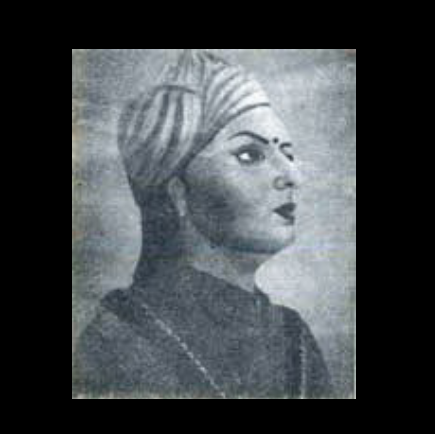
Uda Devi
Uda Devi is said to have been born in the village Ujriaon of Lucknow. She was also known as Jagrani and was married to Makka Pasi. She became an associate of Begum Hazrat Mahal, and Uda formed a women’s army, with herself as the commander. Her husband became a martyr in the battle at Chinhat. Uda decided to take revenge. When the British attacked Sikandar Bagh in Lucknow under Campbell, he was faced with an army of dalit women:
koi unko habsin kehta, koi kehta neech achchut.
abla koi unhein batlaye, koi kahe unhe majboot.
(Some called them black African women, some untouchable. Some called them weak, others strong.)
It is significant here that even W Gordon-Alexander’s account of the storming of Sikandar Bagh by British troops states:
In addition…there were…even a few amazon negresses, amongst the slain. These amazons having no religious prejudices against the use of greased cartridges, whether of pigs’ or other animal fat, although doubtless professed Muhammadans, were armed with rifles, while the Hindu and Muhammadan East Indian rebels were all armed with musket; they fought like wild cats, and it was not till after they were killed that their sex was even suspected.
Uda Devi was one of them, who is said to have climbed over a ‘pipal’ tree and shot dead, according to some accounts 32 and some 36, British soldiers. One soldier spotted someone in the tree and shot the person dead, and only then it was discovered that she was a woman. Realising her brave feat, even British officers like Campbell bowed their heads over her dead body in respect.
Asha Devi Gurjari is portrayed as a leader to a large number of young girls and women and it is stated that on May 8, 1857, she along with a large number of other women like Valmiki Mahaviri Devi, Rahimi Gurjari, Bhagwani Devi, Bhagwati Devi, Habiba Gurjari, Indrakaur, Kushal Devi, Naamkaur, Raajkaur, Ranviri Valmiki, Seheja Valmiki and Shobha Devi attacked the British army and died while fighting.
Certain features stand out in these various narratives. Many of them claim to be centred around neglected dalit women warriors specifically, whose marginalisation cannot be tolerated by dalits any longer. In all of them, these dalit women are depicted as brave from their very childhood, and the 1857 revolt becomes the turning point which sparks them to accomplish great deeds in the face of high odds. However, the voices of dalit viranganas themselves are usually faint discursive threads, as their stories of adventure and bravery are narrated through a variety of sources – oral, official accounts and dalit male authors. It is these authors who provide narrative coherence, filling in the gaps, and slipping into the present tense to add dramatic flourish and detail to the stories. The past and the present blur and mingle to provide a cohesive narrative of dalit oppression and the bravery of these women against all odds. Many of these dalit viranganas become the symbols of pride for one particular dalit caste. Thus Uda Devi is revered by the pasis particularly, and has emerged as a symbol of Pasi honour, dignity, pride, mobilisation and rights. On the other hand, Jhalkari Bai has been appropriated, eulogised and celebrated by all dalit groups, irrespective of divisions between them, and has become a symbol of unity of all dalits.
Many of them claim to be centred around neglected dalit women warriors specifically, whose marginalisation cannot be tolerated by dalits any longer. In all of them, these dalit women are depicted as brave from their very childhood, and the 1857 revolt becomes the turning point which sparks them to accomplish great deeds in the face of high odds. However, the voices of dalit viranganas themselves are usually faint discursive threads, as their stories of adventure and bravery are narrated through a variety of sources – oral, official accounts and dalit male authors. It is these authors who provide narrative coherence, filling in the gaps, and slipping into the present tense to add dramatic flourish and detail to the stories. The past and the present blur and mingle to provide a cohesive narrative of dalit oppression and the bravery of these women against all odds. Many of these dalit viranganas become the symbols of pride for one particular dalit caste.
Most of these dalit viranganas have Devi or Bai suffixed to their names. They are also projected as highly moral, very “noble”, super brave and super nationalist dalit women. They are emblems of shakti. The written and visual images of these viranganas in the texts itself and on the cover of these pamphlets spectacularise them as usually clad in “masculine” attires, with their bodies all covered up. They are shown to be expert in horse-riding, swimming, bow-arrow and sword fighting. Through such portrayals, dalits hope to garner greater respect, opportunity and dignity to these viranganas, and through them to all dalits. Simultaneously this feeds into conceptions of masculinity. It also covertly challenges notions of dalit female sexuality, and can be seen as a reaction to images of sexually immoral dalit women. By shunning outward expressions of sexuality, dalit women can also hope to build a space where they can wield more control over their bodies and gain dignity and respect within the dominant culture.
Poems and songs occupy a central place in these narratives, which eulogise the viranganas. It is interesting that many of these narrative poems (‘khand kavyas’) have cleverly appropriated the famous poem written by Subhadrakumari Chauhan on Jhansi ki Rani Lakshmibai. Not only are the lines and the words given new meanings and completely reinterpreted, they are also easy to remember. Thus goes one on Jhalkari Bai:
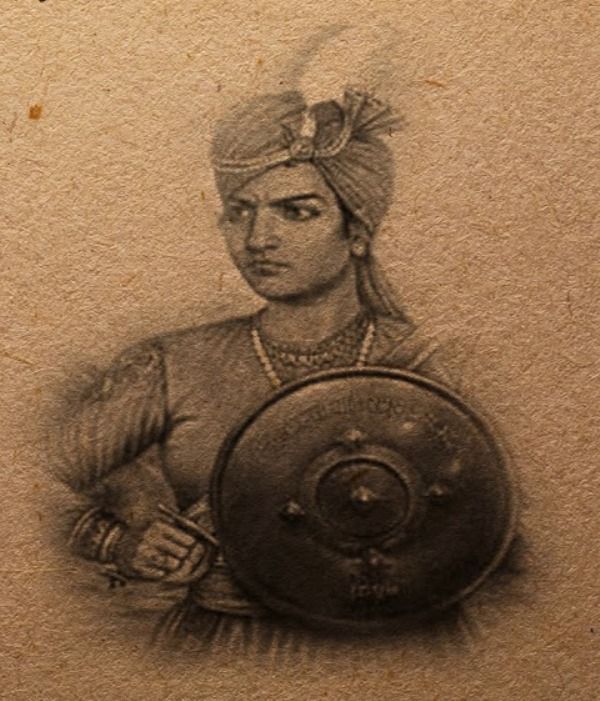
Jhalkari Bai
khub lari jhalkari tu tau, teri ek jawani thi.
dur firangi ko karne mein, veeron mein mardani thi.
har bolon ke much se sun hum teri yeh kahani thi.
rani ki tu saathin banker, jhansi fatah karani thi….
datiya fatak raund firangi, agge barh jhalkari thi.
kali roop bhayankar garjan, mano karak damini thi.
kou firangi aankh uthain, dhar se shish uteri thi.
har bolon ke much se sun ham, roop chandika pani thi.
(Jhalkari you really fought, your youthfulness was unique.
You were a man among the brave in ousting the British.
We heard your story from the mouth of warriors.
You pledged for Jhansi to be victorious by being a friend of the queen.
Jhalkari, you rode from the Datiya gate, trampling the British.
You were like the Kali, and your strike was like lightning.
As soon as a British raised his head, you struck immediately.
We heard your deeds from the warriors, reciting tales of your bravery.)
These songs and poems are often recited in dalit melas and rallies, using dance and musical instruments. Plays too are enacted around them.
The main narrative plots have become more elaborate with time and many stories have been added on, connected to larger purposes of dalit identity. Thus in the Jhalkari Bai story, one episode repeatedly narrated is of Jhalkari being blamed for killing a cow, which had actually been hidden by a brahmin, but the truth is revealed. This story may be linked to challenging dominant colonial and Hindu narratives which have regarded dalits, along with Muslims, as killers of the “holy” cow. Another feature of these writings is that as they have grown, they have become more “sure” in their narrative. Thus for example, the earlier narratives on Jhalkari Bai claim her to be an accomplice of Lakshmibai, who took on her garb to save the rani’s life. We can discern here a tentativeness or uncertainty regarding the role of Rani Lakshmibai in the revolt, where Jhalkari Bai is shown to be an accomplice or at most an equal of Lakshmibai. This has slowly given way to a more sure, authoritative and “mature” dalit history in which Lakshmibai, instead of a model nationalist ruler, appears as a weakling, as reluctant to fight the British, and in fact, is shown as a British supporter and agent. It is stated that Jhalkari Bai was even worried that Lakshmibai might surrender herself to the British as she was very scared of war. Challenging myths and histories surrounding Lakshmibai, it is argued that in reality Lakshmibai not only managed to escape to the forests of Nepal with the help of the ruler of Pratapgarh, she died only in 1915 at the age of 80. It is Jhalkari Bai who is the real martyr and virangana. It is her name that ought to be written in golden letters. She was a dalit woman, with no kingdom, no palace, no expensive jewellery, and no silken clothes. She was neither a queen nor the daughter of a feudal lord, nor the wife of a ‘jagirdar’. She fought selflessly, only for the love of her country, and thus her sacrifice far surpasses anyone else’s.
As a historian, when I started working on these dalit viranganas of 1857, what concerned me was the absence of “hard core”, “written” historical evidence on them in the archives. At one level, I am tempted to argue that anything that mesmerises one is worth cherishing and the magic is ruined by questioning its “authenticity”. Carlo Ginzburg effectively shows how an early manifesto on history “from below” appeared in the form of an “imaginary biography”, where the intention was to salvage through a symbolic character, a multitude of lives crushed by poverty and oppression. The mixture of imaginary biography and historical documents makes it possible even for these dalit histories to leap at a single bound over a threefold obstacle: the lack of evidence, the lack of importance of the subject according to commonly accepted criteria and the absence of stylistic models. A multitude of lives that have been cancelled, destined to count for nothing, find their symbolic redemption in the depiction of immortal characters. But this is not enough. Dalits themselves are keen to prove the historical credibility of their viranganas, and constantly site sources from literary accounts, British narratives, archaeology and oral histories. They claim their works to be “scientific”, “truthful”, “detailed”. As says one:
aithihasik sandarbhon bhitar, ankit sari hai ghatna.
nahin kalpana se kalpit hai – amar humari yeh rachna.
(The whole incident is noted inside historical sources. This immortal story of ours is not a figment of imagination.)
Scattered, often thin, evidence is sited and quoted by dalits repeatedly. Thus on Jhalkari Bai, a constantly quoted source is Vrindavan Lal Varma’s Jhansi ki Rani Lakshmibai. It was published in 1946 after intense personal research and historical reflection, and it mentioned the dusky-complexioned newly wed Jhalkari Dulaiya of the kori caste, who bore a striking resemblance to the Rani. Vishnu Rao Godse, who is said to have been present in the fort when the Rani had fought against General Rose, too had made a reference to Jhalkari in his Marathi book Majha Pravas (My Travels). Similarly on Uda Devi, Amritlal Nagar’s Gadar ke Phool and William Forbes-Mitchell’s Reminiscences of the Great Mutiny are often cited.
And today these stories stand as given, visible truths, with stamps issued in their name, many statues constructed, public rallies and meeting organised, celebrations and festivities conducted, and even colleges and medical institutions formed in their name. Thus, for example, a huge public rally and a mela is organised in Lucknow every year near the statue of Uda Devi at Sikandar Bagh on November 16, the stated day of her martyrdom. With constant evocation, these names have become inscribed in popular dalit memories. Different political parties have repeatedly used these viranganas and made them an integral part of their electoral campaigns and mobilisation strategies, the most successful being the Bahujan Samaj Party, who have used them to build the image of Mayawati particularly.
Are these representations of dalit viranganas historical fictions or fictive histories or something more? How real, exact and truthful in any case are “official”, canonised histories of 1857? Scholars have questioned the possibility of any one authentic history. Histories of dalit viranganas, who are simultaneously dalit and women, stand as persuasive accounts, as histories from below, reaching towards their own “reality”. They take recourse to recorded historical events and intermesh it with subaltern renderings of lost histories, deracinated by mainstream historiography. They are counter-histories of 1857.
Reading Dalit Histories of Viranganas
These popular histories of dalit viranganas are open to simultaneously persuasive, multiple and contradictory readings. There are, of course, limitations of this literature as a historical source. Their representation of dalit women too needs to be questioned. Very few dalit women themselves have penned these popular pamphlets. It is dalit men who are largely engaged in controlling the way images of dalit women are depicted.
While these dalit viranganas are portrayed as “superwomen”, full of bravery, and doing “impossible” acts, these glorifications and celebratory accounts do not extend to all dalit women in general. They offer a filtered vision, viewed through the eyes of the creators of these images. Victimhood is replaced by a new archetype of heroism. Jhalkari Bai is shown as even killing a tiger single-handedly. Although empowering, these images are not necessarily more representative of dalit women. Further, many of these viranganas are physically attractive in their appearance, “classic” beauties, falling into the stereotype of female beauty. Simultaneously, there is an assertion of a super moral dalit female subject perhaps also allowing dalit men to police the behaviour of dalit women in general. Some of these tracts appear didactic in their endorsement of certain patriarchal values. They are often replete with images of the loyal wife and an ideal mother.
Although empowering, these images are not necessarily more representative of dalit women. Further, many of these viranganas are physically attractive in their appearance, “classic” beauties, falling into the stereotype of female beauty. Simultaneously, there is an assertion of a super moral dalit female subject perhaps also allowing dalit men to police the behaviour of dalit women in general. Some of these tracts appear didactic in their endorsement of certain patriarchal values. They are often replete with images of the loyal wife and an ideal mother.
It may thus be argued from a dalit feminist perspective that the emergence of popular dalit male literature has not altered much the images of dalit women. Though vastly different in their scope, area and portrayals, these presentations codify dalit women in certain ways, and fail to offer a more meaningful portrayal of them. The representations often remain simplistic, rarely revealing the complexity, and dimensionality that make up dalit women’s life. They offer incomplete projections to which not many dalit women can fully relate to. Save for who controls the representations, has anything much changed for the dalit woman? As has been contended by bell hooks, this may apply a mere transference, without radical transformation. A true liberatory potential may only be realised when dalit women themselves can create and represent their own histories and images through a collage of identities and sing their own songs.
To stop here however would be offering only one side of the picture. These women figures can also provide counter-hegemonic and oppositional perspectives about dalit women and about the 1857 revolt. The representation of dalit viranganas on a high moral and heroic ground can also be seen as an appropriation of respectability and “credibility”, imparting dalit participation in past histories new meanings. These dalit viranganas represent dalits in the service of freedom and Indian nationalism. Here the subalterns are very much speaking, to inverse Spivak’s proposition, and they are speaking through these dalit women viranganas. They are representing their own voices. As has been pointed out, “While Spivak is excellent on the ‘itinerary of silencing’ endured by the subaltern, particularly historically, there is little attention to the process by which the subaltern’s ‘coming to voice’ might be achieved.” At places the achievements of these dalit viranganas are juxtaposed to the pathetic conditions of dalit women in general, blaming society at large and men as well, stating that in spite of having a brave past and being protectors of dalit dignity, dalit women have been denied education, have been made slaves, have been oppressed by men.
These women figures can also provide counter-hegemonic and oppositional perspectives about dalit women and about the 1857 revolt. The representation of dalit viranganas on a high moral and heroic ground can also be seen as an appropriation of respectability and “credibility”, imparting dalit participation in past histories new meanings. These dalit viranganas represent dalits in the service of freedom and Indian nationalism. Here the subalterns are very much speaking, to inverse Spivak’s proposition, and they are speaking through these dalit women viranganas. They are representing their own voices.
Dalit women too are now trying to use these images in multiple ways to their maximum advantage. Besides ways in which these symbols have helped build up Mayawati, many have used these figures to question representations of dalit women in general, as well as their oppression and exploitation in real life. Thus Meena Pasi stated, “Uda Devi and Jhalkari Bai have shown to me that I too can resist all kinds of injustices. I do not have to take things lying down. These figures inspire me to question why I am getting less wages from the landlord, why I am beaten up by my husband when I do equal, if not more, work. I can look up to Uda Devi and say that nothing is impossible if one has the will to resist and fight”. These representations of dalit women viranganas may thus also be seen as “positive engendering”. They question and disrupt usual dominant stereotypes of dalit women, either negatively as ‘kutnis’ (evil) and vamps, or as passive victims, powerless and subordinated. The centrality of the dalit viranganas in the 1857 revolt in popular dalit literature provokes reflection on the enabling potential for women’s real lives of ubiquitous icons of dalit feminine power. These images also form a part of feminist studies, as instead of focusing on just dalit women’s “victimisation”, they point to their power and strategies of resistance, even though penned largely by men. Here dalit women are actors and agents in their own right. They are transformed from victims into victors within the context of a narrative. Jhalkari Bai, Uda Devi, Mahabiri Devi, and along with them many other dalit women, emerge as physically commanding and armed, infused with power, strength, bravery, activism and sacrifice, locked in violent conflict with the British.
It may also be argued that what we are dealing with here is no ordinary, academic history. While creating a history of pride, through these celebratory accounts dalit writers are accruing for themselves a psychic space and harnessing the resources needed to hold their own. It is also a history that wishes to, in its own limited way, challenge and subvert conventional modes of thinking, both about 1857 and about dalit women. While it may not be inherently radical or transformative, it provides progressive and different readings. Dalit women here are signifiers of 1857 and through that of dalit identity. These are not just stories of brave dalit women but of all dalits, of their legacy, of their bravery, of their pride, of their sacrifice in service of the nation.
Charu Gupta’s essay has been carried with the permission of its author. It has been presented without its abstract, citations, footnotes and bibliography for purposes of easier reading. You can read the paper in its entirety here.
The Paper has also been published in Bates, Crispin. (2014). ed. Mutiny at the Margins: New Perspectives on the Indian Uprising of 1857 as ‘Condemnation and Commemoration: (En)Gendering Dalit Narratives of 1857’.
ARCHIVE
Origin of the Kodavas
Our knowledge of the pre-history of Kodagu and the Kodavas is very scanty. There are no written documents or inscriptions from which we could deduce a credible story regarding the origin of the Kodavas. Even the history of Kodagu till the 17th century is very scanty and we find no mention of the Kodavas in the pages of the history of this period.
But many attempts have been made by various historians, anthropologists and others to unravel the mystery regarding the origin of the Kodavas. Especially after the advent of British rule in Kodagu many westerners and others have bestowed their attention on this subject. Having no written evidences or historic documents or stone inscriptions to probe their origin, efforts were made to unfathom the secret with the help of other material evidences that were available.
Pre-historic dolmens or burial cairns were found in Kodagu as in other parts of South India. Though these cairns throw some light on the life of those pre-historic-people, we cannot form an opinion as to who they were. Whether the remains that are found were of the Kodavas or that of the original inhabitants of this tract of land viz., Yeravas, Holeyas, Kudiyas, etc., is not clear.
The first discovery of the dolmens in large numbers was made by Lt. Mackenzie in 1868 on a bane near Virajpet. Capt. Rob Cole the then police superintendent of Kodagu followed it up and his excavations yielded interesting results. All the cairns found are either level with the ground or their tops crop up just a little out of it. When laid bare they present a stone chamber? of 7x4x5 feet composed of four upright granite slabs 7 or 8 inches thick and a cup stone with projects over the upright. The flooring is likewise of stone. The narrow front slab has an aperture of an irregular curve nearly two feet in diameter broken out from the top and generally facing east. Sometimes a compartment may be two-chambered. These cairns are either solitary or in groups, in some cases forming regular rows.
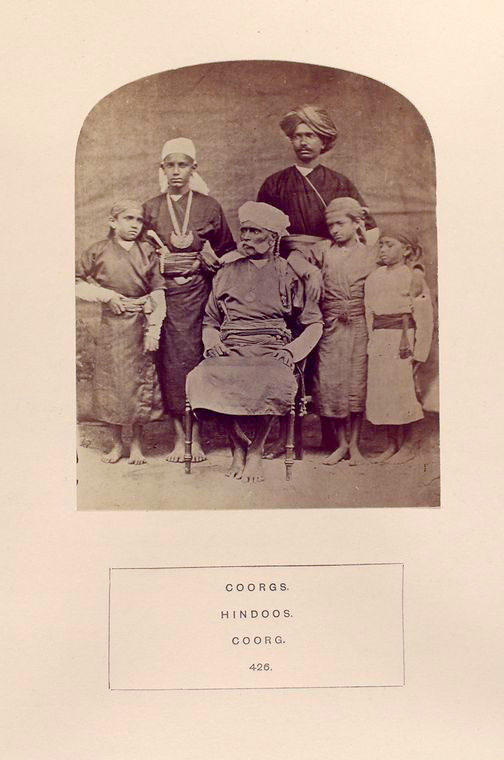
The relics found in them are peculiarly shaped pottery buried in the earth that nearly filled the chambers. These vessels contain earth, sand, bones, iron spearheads and beads. The pottery consists of chatties, and urns of burnt clay and is of a lead or black colour. They are smooth and shining and can hardly be said to be glazed. Bones, ashes and bits of charcoal are usually found at the bottom of the urns grains like paddy. ragi have also been found inside the chambers. Beads of red cornelian of cylindrical shape are occasionally met within the smaller pottery. The iron implements, spears and arrowheads are hardly distinguishable. These cairns apparently were resting places of the earthly remains, of a generation that existed anterior to the historical records of the present local races. The Kodavas call the dolmens as “pandukulis” or dwellings of the pandus. However, these pre-historic relics do not shed any light on the origin of the Kodavas.
Since the dawn of history the Kodavas are said to be the dominant community in Kodagu. The name of the land itself denotes that only after the advent of the Kodavas, the land took its name as Kodagu. Historians and other research scholars opine that the Kudiyas, Yerawas, and Kembatti Holeyas were perhaps living in Kodagu as the original inhabitants when the Kodavas came on the scene.
Since the dawn of history the Kodavas are said to be the dominant community in Kodagu. The name of the land itself denotes that only after the advent of the Kodavas, the land took its name as Kodagu. Historians and other research scholars opine that the Kudiyas, Yerawas, and Kembatti Holeyas were perhaps living in Kodagu as the original inhabitants when the Kodavas came on the scene.
The migration of Kodavas to Kodagu was set down by some of the European historians to the third century A.D. At that time according to them the servile or plebian class in Kodagu must have been composed of the Yeravas, Kurubas, Male-kudi yas and Holeyas. The Kodavas having conquered them formed themselves into an aristocracy.
The Kodagu inscriptions, copper plates and writings on palm leaves unearthed so far hardly throw any light on the Kodavas. However the first mention about the Kodavas was found in the Palpare inscription found in Nallur village in South Kodagu which is published in the Imperial Gazetteer of India 1908, vol XI. page 20, in which it is said.
“In 1174 Ballala II of Mysore sent his general Bettarasa to fight against the Chengalva king in Kodagu and in the fight that ensued at Palpare, Bettarasa was victorious and built a township at Palpare as his capital. But after some time Pemma Veerappa joined by Badigondeya Nandideva, Udayaditya of Kurchi and the Kodavas of all the nads marched against Palpare and attacked Bettarasa, who seems to have got the worst of it at first but was victorious.”
This inscription though does not shed any light on the Kodavas, gives an idea that the Kodavas were the dominant race in Kodagu during the 12th century. Though we are nowhere near the solution regarding the origin of the Kodavas we shall have a quick glimpse of the various efforts made by several books, people and researchers in quest of the object.
The first mention about the Kodavas was found in the Palpare inscription found in Nallur village in South Kodagu which is published in the Imperial Gazetteer of India 1908
The Cauvery Purana the oldest literature pertaining to the family deity of the Kodavas viz., Cauvery and the origin of river Cauvery after her, narrates that the Kodavas are the descendents of king Chandraverma of the Kadamba dynasty who ruled over Kodagu from the fourth century to the middle of the sixth century. Kadamba rule over Kodagu is recent and comprises subsequent history whereas Cauvery Purana dates back to a much earlier time. The Cauvery Purana mentions that when their family deity Cauvery transformed herself into the holy river, the Kodavas, of the land were present in good number and she blessed and assured them of her protective grace. This shows that the Kodavas were there before the birth of river Cauvery. This being purely a Puranic story we cannot base our findings on that and as Capt. Rob Cole rightly avers, the mythical nature of Cauvery Purana lacks credibility and it does not help us in any way in finding the origin of the Kodavas.
Col. Wilks in his book “History” expostulates the theory of the Kadambas and says that the Kodavas “descended from the conquering army of the Kadamba kings.” He further says that the first colonist were made out to have migrated from the Kadamba kingdom-Banavasi. Lewis Rice supports this view and says that it is consistent with what is known as the Kadamba history as corroborated by the modern annals of Kodagu: He expresses that the tales of Chandrashekhara, and Chitrashekhara as expounded by professor Wilson lend support to the same view.
Kadambas ruled over Karnataka from the third century A.D. to the middle of the sixth century. But we hear about Kodavas and Kodagu from a much earlier date even from the time of the Ramayana and Mahabharata that is, from the fourth or fifth century before Christ.
But we must note one important factor. The kings and chieftains who ruled over Kodagu were always aliens. A powerful chieftain or a king from outside comes with his army and invades a country, over-comes the opposition if any and establishes his suzerainty. With the invader some people of his ilk and a contingent of his soldiers may settle in the conquered land. But the majority of the people of the subdued land remains as they are. Thus the saga of conquests and establishment of kingdoms does not much change the ethnic and social structure of society.
The kings and chieftains who ruled over Kodagu were always aliens. A powerful chieftain or a king from outside comes with his army and invades a country, over-comes the opposition if any and establishes his suzerainty. With the invader some people of his ilk and a contingent of his soldiers may settle in the conquered land. But the majority of the people of the subdued land remains as they are. Thus the saga of conquests and establishment of kingdoms does not much change the ethnic and social structure of society.
The Kodava community had nothing to do with the Kadamba rulers or the subsequent ones. Whoever ruled Kodagu, the Kodava community maintained their separate identity, culture and customs as could be vouched from the recent happenings during Lingayat and British rule over Kodagu. Let alone the ethnic polarisation, the Kodavas were not influenced by the customs, mode of life, religious beliefs, dress etc.. of the rulers though there may be minor adaptations in the style of dress etc. Hence the Kadamba theory does not stand any charice of acceptance.
Some research scholars take back the advent of the Kodavas to the Mohenjodaro period. Attempts were made in the past to establish the existence of the Kodavas during the Vedic period. There is an assumption By Rev. Heras that there occurs the name of the Kodavas and some of the seals and references belonging to the pre-vedic (?) Mohenjodaro and Harappa culture refer to the Kodavas. But these are theories that are still in the realm of speculation.
Lt. P. Connor in his book “Memoirs of Kodagu survey (1817) says that the Kodavas themselves do not know anything about their origin. There is no trace of any helpful material to find out their origin of anything even to deduce a reasonable and convincing assumption. Though there are no historical data or evidences to establish their origin, there is no doubt that the Ködavas are one of the oldest races. Their land being a forest-ridden area with no outside contact and moreover, there being nothing attractive to arrest the covetous eyes of conquerors and even if anyone attempted the forbidding hilly terrain inclement weather and the heavy monsoon completely thwarted and made outside conquest well nigh impossible. As such it remained for years cut off from the external world and the face preserved its purity, its customs, traditions and culture unsullied.
Sri Erskine Perry who also failed to establish the origin of the Ködavas points out that “the Kodavas have no resemblance to any of the races of south India and that it clearly indicates that they must have come from outside“. He also describes that the kodavas are by far the finest race he had seen in India in point of independent bearing good looks and all the outward signs of well-being”.
Sri Erskine Perry who also failed to establish the origin of the Ködavas points out that “the Kodavas have no resemblance to any of the races of south India and that it clearly indicates that they must have come from outside”. He also describes that the kodavas are by far the finest race he had seen in India in point of independent bearing good looks and all the outward signs of well-being”.
Mr. L. A. Krishna Iyer in his book, “The Coorg Tribes and Castes writes that “their (Kodavas) mode of life, pride of race, impart in their whole being an air of manly independence and dignified self-assertion, well sustained by their peculiar and picturesque costumes”. Giving the maximum and minimum and the average státure and cephalic and nasal indices he concludes that “they bear no comparison with the other races of South India”. He says that “the Kodavas have a finer nose, a larger head with a distinct tendency towards brachyce phalism. Their average cephalic index is 80.6 and the nasal Index 65.2”. Giving all these details Mr. Krishna Iyer also fails to unravel the origin of the Kodavas.
Mr. Abdul Gaffar Khan who wrote a book entitled “Kodavaru Arabiyaru” (Kodavas are Arabs) assumes that the Kodavast must have migrated from Arabia. Though he does not substantiate his assumption with any reliable data he simply bases his findings on the similarity of the mode of dresses between them, This does not justify as sufficient evidence to establish the origin of a race. As a matter of fact dress patterns change from time to time and place to place according to weather and other conditions. Hence the mode of dresses can hardly be the basis to ascertain the origin of any community. We know that the Kashmiris and some tribes who live in the Himalayan region do wear dresses closely resembling the dress pattern of the Kodavas and by no stretch of imagination could one conclude that they belong to the ethnic group of the Kodavas.
Some of the educated Kodavas claim that they are the descendants of the Pandavas of Mahabharata and cite in support some of the social customs like the younger brother marrying the widow of the elder brother etc. One need not say that these are decidedly very flimsy and unreliable grounds to determine the identity of a community.
Some of the educated Kodavas claim that they are the descendants of the Pandavas of Mahabharata and cite in support some of the social customs like the younger brother marrying the widow of the elder brother etc.
Some modern research workers have classified the Kodavas with the Todas of Nilgiris, the Caucasians of the country around mount Caucasus in Russia. Some others have classified them with the Kapalas, one of the original inhabitants of Kodagu. Mr. Herbutt Rishely opines that “the Scythians (an Asian nomadic people of Asia) who were residing in the Balkans region during the fifth or the sixth century were forced by their neighbors, the Yuvachi community to migrate to the East and settle in Punjab. They built a new kingdom in Punjab. The people with bigger heads, taller physique and longer limbs who are found in the region comprising Western Punjab to South Deccan were said to be the descendants of these Scythians. At that time cattle-raring being the principal occupation, they migrated with their herds of cattle in search of grazing plains and that is how, we find their progeny viz.. the people with larger heads, longer limbs and taller physique scattered along the western ghats and especially in Kodagu.”
Some recent research workers are definite about the Kodavas coming from the Dravidian stock. Though almost all the recognised anthropologists are unanimous in denouncing this assumption yet the protagonists of Dravidian theory argue that the Kodavas and the Todas of Nilgiris belong to the same ethnic group of the Dravidian family. They say that their traits are biologically useful and related to mental capacity and intellectual endowment. They further say that the mountainous habitat, climate, food, contact with Western races are responsible for what the Kodavas are today and these factors have differentiated them from the people of the plains. They argue that the jungles of Kodagu satisfied their highly developed propensities of hunting and outward life and they were noted for their predatory excursions into the country of their wealthier and less war-like neighbours. It is their conclusion that these traits are still with them and even at the present time they revel in their fighting and sporting qualities, which have ample scope in their socio and religious ceremonies and customs.
There are others who are of definite opinion that the Kodava language is nothing but a mixture of the Southern languages of the Dravidian group and on that basis they are definite that the Kodavas belong to the Dravidian heritage. They further say that if the Kodavas had come from the North or elsewhere they should atleast have had their own language, but in reality Kodava language is only a dialect a mixture of Dravidian languages. They quote Richtor to substantiate that the “Kodava language has a close relationship with the other Dravidian languages, but being neither cultivated beyond its colloquial use, nor possessing any original literature, it hardly deserves the distinction of being elevated into a special Dravidian language”.
These arguments of the Dravidian enthusiasts come in the realm of speculation and hardly can be reckoned as reliable data. The martial tradition of the Kodavas, the rugged nature of their home-land and the inevitable battles they had to wage against the wild animals and out-ward enemies, the inhospitable conditions of the forest area account for their highly developed martial traits but in no way or at any time they were the predators who invaded their docile neighbouring countries for loot or lucre. Their history is replete with events of high propriety, orderly behaviour and ideal neighborliness.
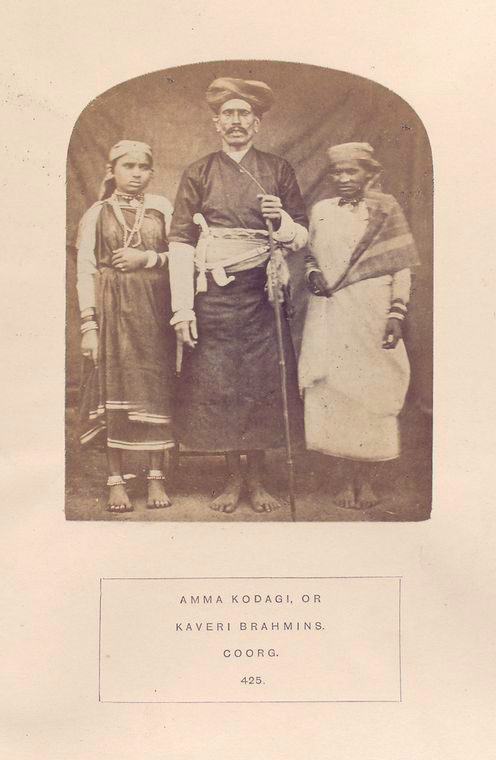
Regarding the issue concerning their language it is pertinent to ask the Dravidian enthusiasts as to why the Kodavas-a microscopic little community-instead of speaking one of the languages of the Southern group should speak a different language? The fact that Kodava language consists of many words and traits of the neighbouring languages does not disprove that it is an original language. Some of the recent linguists, who have done sufficient research on this language and published the grammar and compiled a vocabulary for the language say that it has many traits which we don’t find in the other Dravidian languages. They also are definite that Kodava language is of great antiquity and even older than Malayalam. As this issue is discussed at length, elsewhere in the book, it is sufficient to say here that languages which are always changing and which absorb words freely from contemporary other languages are not reliable data to determine the origin of any race or community. Once upon a time our ancestors were speaking Samskritha and it was the original language of our country but today it has yeilded place to other languages. But it does not mean that Samskritha was not the dominant and mother-tongue in our land.
The so-called authorities who easily tag the Kodava community to this or that ethnological group in South India must explain as to how a small community numbering within a lakh of people could develop and maintain a special mode of dress, a unique culture, a special way of life, a different language in spite of the heterogeneous influx and pressure of other major forces that dominated the South during the millennium. They must explain how this microscopic community could build up a tradition, which is markedly different from those of their neighbours.
The so-called authorities who easily tag the Kodava community to this or that ethnological group in South India must explain as to how a small community numbering within a lakh of people could develop and maintain a special mode of dress, a unique culture, a special way of life, a different language in spite of the heterogeneous influx and pressure of other major forces that dominated the South during the millennium.
The time of the settlement of the Kodavas in Kodagu is also a point of uncertainty. There are people who argue that the Kodavas lived during the Mohenjodaro and Harappa culture and must have migrated to the South at that time, The Indus Valley Civilization is said to have thrived for thousand years from 2500.B.C According to modern dating this is prior to the happenings of the epics Mahabharata and Ramayana. They say that there is the mention of “Kroda Desha” in Mahabharata and it refers to Kodagu only. This can only be an assumption and does not stand any scientific scrutiny. However there are certain credible assumptions to show that the Kodavas must have migrated to Kodagu much before the Christian era.
We know from history about the Greek invasion of India during the rule of Chandragupta Maurya. Alexander of Greece with an army of 40, 000 men, with the intension of conquering the world marched towards India. He crossed the Hindu-Kush and wanted to conquer Maghada (Southern part of Bihor). He had heard about this powerful kingdom and its wealth and grandeur. But the soldiers of Alexander refused to go further and he had to abandon his march appointing Selukus his general to rule over the conquered kingdoms. Selukus and his fellow soldiers settled down in a country called Bactria. After sometime when they saw that there were no powerful rulers they came down and conquered Punjab and ruled that part of the country for over a hundred years. One of their kings was Menander. Hel was a wise and good king. He was completely taken by the life and philosophy of the Indians and adopted Indian ways of life and called himself an Indian. His followers also adopted Indian ways of life and became Indians, and in the course of time they mingled with the local people giving rise to a new community with broader heads taller stature and sturdier limbs.
We know from history that when Alexander withdrew from India leaving Selukus, Chandragupta Maurya, the young and powerful king who wanted to be an empire builder like Alexander, himself, fought against Selukus, defeated him and married his daughter. Thus we see a fusion of races. How this new race came down to the South is corroborated by various historians.
“What is the earliest date in the historical period when the South came into contact with the North? The answer to this question is not very precise. Of course we have Ashoka’s inscriptions located in the various parts of Karnataka, but what about the pre-Ashokan period? Certain epigraphs of the 12th and 13th centuries in the Kannada language found in the Shimoga district refer to the rule of Nandas over Karnataka. We know that Ashoka conquered Kalinga but who among the Mauryan kings conquered the South is not known. Prof. Nilakanta Sastri suggests that the Mauryans came by their southern possessions as a matter of course by over-whelming the Nandas. The coming of Chandragupta Maurya to Sravanabelagola with his teacher Bhadrabhahu is well-known. The smaller hill at Sravanabelagola where the teacher and the pupil lived is referred to as Katavapura and Chandragupta lived here for twelve years after his guru’s death and the place is named after him as Chandragiri” (Karnataka through the Ages, page 99).
“Bindusara son of Chandragupta ruled in the South (298 272 B.C.) including certain portions of Mysore then known as Mahismamandala. This fact has been conceded by historians on the basis of Taranath the tibetan historian and Mamoolnar the Tamil poet. We have ample proof of the sway of Ashokan rule in the shape of pillars and rock edicts at Brahmagiri and other places of Chitradurga and other districts. The Brahmagiri excavations by the Archaeological Survey of Mysore in 1939 and the Archaeological Survey of India in 1947 respectively have amply unearthed objects belonging to the Mauryan period. Sir Mortimer Wheeler excavated some of the megalithic burials at Brahmagiri and dated them to the period of Ashoka. It is significant to note that the megalithic monuments are locally known as Mauryana” or “Morera mane” by the people thus associating them with the Mauryas”.
This conclusively proves that there was migration of the people of the North to the South as far back as the Mauryan period i.e,. round about 200 years before the Christian era. As explained above the inter-mixing of the Greeks, Indians, and the Pahalavas of Persia gave rise to a new community known as the Aryans. The word Arya in Samskritha means noble. This mingling gave rise to a new ethnic group of Aryans with bigger heads, taller stature, longer and sturdier limbs, grecian nose and special cephalic indices other than the local population,
The people being nomadic were moving from place to place with their cattle in search of grazing grounds gradually moved South. With the extension of the Mauryan Empire till Mysore (Mahishamandala) these sturdy people settled along the Western coast as far as Kodagu.
The people being nomadic were moving from place to place with their cattle in search of grazing grounds gradually moved South. With the extension of the Mauryan Empire till Mysore (Mahishamandala) these sturdy people settled along the Western coast as far as Kodagu.
Dr. J. H. Hutton states that, “it appears to be a much simpler and more satisfactory view to regard this stock of people as Aryans. We may suppose them to have migrated to the South and to have extended down to the West Coast as far as Kodagu forming the physical basis of several of the brachycephalic or mesatocephalic groups of Western India,”
From the above it can be safely inferred that the progenitors of the Kodava community have come from Aryan stock (Greek Indian mixture) and they migrated and settled along the Western Ghats and Kodagu at about 200 B.C. that is during the rule of the Mauryan dynasty. This brachycephalic stock which settled along the many parts of Western India could not maintain its identity as it was gradually absorbed by the local groups though we find people of longer heads, taller stature with Grecian noses here and there. But those groups who settled in Kodagu have maintained their specialities and separate entity to some extent as to be distinguished from the others. This was possible because of the mountainous and forest nature of Kodagu and the lack of communcation and outside contact with the nighbouring groups of the South. As outer contact increased this process of assimilation is being accelerated and it is but natural that in the present mode of life, and inter-mingling, the Kodava way of life, language, etc have been much influenced by the neighbours. Though this process is going on, the small community of the Kodavas have maintained their separate identity, culture, customs and other social traits with zealous care.
From the above it can be safely inferred that the progenitors of the Kodava community have come from Aryan stock (Greek Indian mixture) and they migrated and settled along the Western Ghats and Kodagu at about 200 B.C. that is during the rule of the Mauryan dynasty.
It is estimated that there are in India about three thousand different communities. Among them perhaps the Kodavas are one of the smallest numbering not even a lakh. This microscopic community with its great cultural tradition, with its high water mark of independence, integrity and valour has etched an indelible mark in the annals of Indian history.
This excerpt has been carried from B.D. Ganapathy’s Kodavas.
ARCHIVE
Jinnah to Nehru – 17 March 1938
New Delhi,
17 March 1938
Dear Pandit Jawaharlal,
I have received your letter of the 8th of March 1938. Your first letter of the 18th of January conveyed to me that you desire to know the points in dispute for the purpose of promoting Hindu-Muslim unity. When in reply I said the subject matter cannot be solved through correspondence and it was equally undesirable as discussing matters in the press you, in your reply of the 4th of February, formulated a catalogue of grievances with regard to my supposed criticism of the Congress and utterances which are hardly relevant to the question for our immediate consideration. You went on persisting on the same line and you are still of opinion that those matters, although not germane to the present subject, should be further discussed, which I do not propose to do as I have already explained to you in my previous letter.
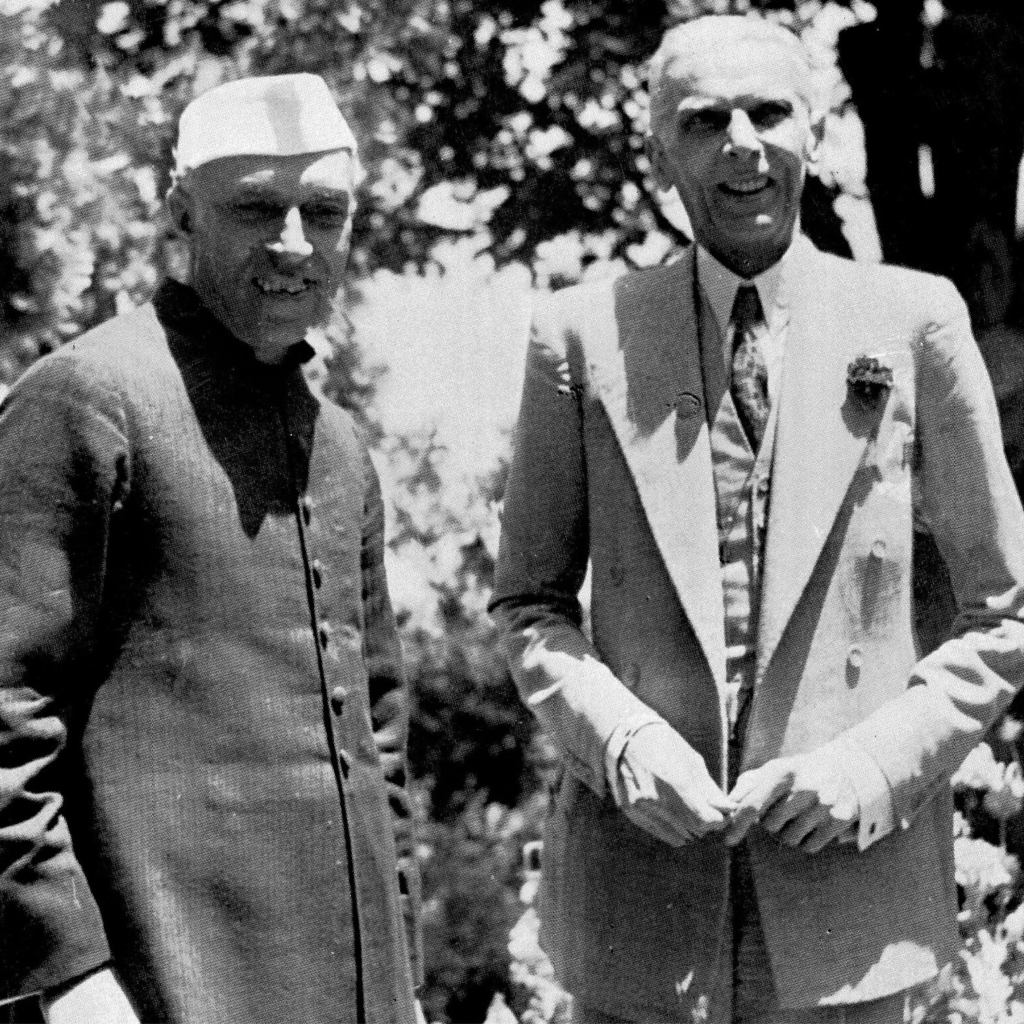
Jawaharlal Nehru and Muhammad Ali Jinnah
The question with which we started, as I understood, is of safeguarding the rights and the interests of the Mussalmans with regard to their religion, culture, language, personal laws and political rights in the national life, the government and the administration of the country. Various suggestions have been made which will satisfy the Mussalmans and create a sense of security and confidence in the majority community. I am surprised when you say in your letter under reply, ‘But what are these matters which are germane? It may be that I am dense or not sufficiently acquainted with the intricacies of the problem. If so, I deserve to be enlightened. If you will refer me to any recent statement made in the press or platform which will help me in understanding, I shall be grateful.’ Perhaps you have heard of the Fourteen Points.
Next, as you say, ‘Apart from this much has happened during these past few years which has altered the position.’ Yes, I agree with you, and various suggestions have appeared in the newspapers recently. For instance, if you will refer to the Statesman, dated the 12th of February 1938, there appears an article under the heading ‘Through “Muslim Eyes’ (copy enclosed for your convenience). Next, an article in the New Times, dated the 1st of March 1938, dealing with your pronouncement recently made, I believe at Haripura sessions of the Congress, where you are reported to have said: ‘I have examined this so-called communal question through the telescope, and if there is nothing what can you see.
This article in the New Times appeared on the 1st of March 1938, making numerous suggestions (copy enclosed for your convenience). Further you must have seen Mr Aney’s interview where he warned the Congress mentioning some of the points which the Muslim League would demand.
I consider it is the duty of every true nationalist, to whichever party or community he may belong to make it his business and examine the situation and bring about a pact between the Mussalmans and the Hindus and create a real united front and it should be as much your anxiety and duty as it is mine, irrespective of the question of the party or the community to which we belong.
Now, this is enough to show to you that various suggestions that have been made, or are likely to be made, or are expected to be made, will have to be analysed and ultimately I consider it is the duty of every true nationalist, to whichever party or community he may belong to make it his business and examine the situation and bring about a pact between the Mussalmans and the Hindus and create a real united front and it should be as much your anxiety and duty as it is mine, irrespective of the question of the party or the community to which we belong. But if you desire that I should collect all these suggestions and submit to you as a petitioner for you and your colleagues to consider, I am afraid I can’t do it nor can I do it for the purpose of carrying on further correspondence with regard to those various points with you. But if you still insist upon that, as you seem to do so when you say in your letter, ‘My mind demands clarity before it can function effectively or think in terms of any action. Vagueness or an avoidance of real issues could not lead to satisfactory results. It does seem strange to me that in spite of my repeated requests I am not told what issues have to be discussed.’ This is hardly a correct description or a fair representation, but in that case I would request you to ask the Congress officially to communicate with me to that effect, and I shall place the matter before the Council of the All-India Muslim League; as you yourself say that you are ‘not the Congress President and thus have not the same representative capacity but if I can be of any help on this matter my services are at the disposal of the Congress and I shall gladly meet you and discuss these matters with you’. As to meeting you and discussing matters with you, I need hardly say that I shall be pleased to do so.
Yours sincerely,
M.A. Jinnah
[Enclosure I to the above letter]
Through Muslim Eyes
By Ain-el-Mulk
Pandit Jawaharlal Nehru’s Bombay statement of January 2 on the Hindu-Moslem question has produced hopeful reactions and the stage has been set for a talk between the leaders of what, for the sake of convenience, may be described as Hindu India and Moslem India. Whether the Jinnah-Jawaharlal talks will produce in 1938 better results than the Jinnah-Prasad talks did in 1935 is yet to be seen. Too much optimism would not, however, be justified. The Pandit, by way of annotating his Bombay statement while addressing the UP delegates for Haripura at Lucknow, at the end of January, emphatically asserted that in no case would Congress ‘give up its principles’. That was not a hopeful statement because any acceptable formula or pact that may be evolved by the leaders of the Congress and the League would, one may guess, involve the acquiescence of the Congress in separate electorates (at least for a certain period), coalition ministries, recognition of the League as the one authoritative and representative organization of Indian Moslems, authoritative and representative organization of Indian Moslems, modification of its attitude on the question of Hindi and its script, scrapping of Bande Mataram altogether, and possibly a redesigning of the tricolour flag or at least agreeing to give the flag of the League an equal importance. It is possible that with a little statesmanship on both sides agreement can be reached on all these points without any infringement of the principles of either, but the greatest obstacle to a satisfactory solution would still remain, in the shape of the communalists of the Mahasabha, and the irreconcilables of Bengal, all of whom are not of the Mahasabha alone.”
The right of the Congress to speak in the name of Hindus has been openly challenged and even the Jinnah-Prasad formula which did not satisfy the Moslems – and nothing on the lines of which is now likely to satisfy them – has been vehemently denounced by the Bengal Provincial Conference held at Vishnupur which recently passed an extremely communal resolution, and that the latest utterances of the Congress President-elect on the communal situation generally and the Jinnah-Prasad formula in particular show some restraint. The only thing for Moslems to do in the circumstances is to wait and hope for the best, without relaxing their efforts to add daily to the strength of the League, for it will not do to forget that it is the growing power and representative character of the Muslim League which has compelled Congress leaders to recognize the necessity for an understanding with the Moslem community.
The Statesman, New Delhi Edition, 12 February 1938.
[Enclosure II to the above letter]
The Communal Question
In its last session at Haripura, the Indian National Congress passed a resolution for assuring minorities of their religious and cultural rights. The resolution was moved by Pandit Jawaharlal Nehru and was carried. The speech which Pandit Jawaharlal Nehru made on this occasion was as bad as any speech could be. If the resolution has to be judged in the light of that speech, then it comes to this that the resolution has been passed not in any spirit of seriousness, but merely as a meaningless assurance to satisfy the foolish minorities who are clamouring ‘for the satisfaction of the communal problem’. Mr Jawaharlal Nehru proceeded on the basis that there was really no communal question. We should like to reproduce the trenchant manner in which he put forward the proposition. He said: ‘I have examined the so-called communal question through the telescope and, if there is nothing, what can you see.’ It appears to us that it is the height of dishonesty to move a resolution with these premises.
We should like to tell Pandit Jawaharlal Nehru that he has completely misunderstood the position of the Muslim minority and it is a matter of intense pain that the President of an All-India organization, which claims to represent the entire population of India, should be so completely ignorant of the demands of the Muslim minority.
If there is no minority question, why proceed to pass a resolution? Why not state that there is no minority question? This is not the first time that Pandit Jawaharlal Nehru has expressed his complete inability to understand or see the communal question. When replying to a statement of Mr Jinnah, he reiterated his conviction that in spite of his best endeavour to understand what Mr Jinnah wanted, he could not get at what he wanted. He seems to think that with the Communal Award, which the Congress has opposed, the seats in the Legislature have become assured and now nothing remains to be done. He repeats the offensive statement that the Communal Award is merely a problem created by the middle or upper classes for the sake of few seats in the Legislature or appointments in Government service or for Ministerial positions. We should like to tell Pandit Jawaharlal Nehru that he has completely misunderstood the position of the Muslim minority and it is a matter of intense pain that the President of an All-India organization, which claims to represent the entire population of India, should be so completely ignorant of the demands of the Muslim minority. We shall set forth below some of the demands so that Pandit Jawaharlal Nehru may not have any occasion hereafter to say that he does not know what more the Muslims want. The Muslim demands are:
1. That the Congress shall henceforth withdraw all opposition to the Communal Award and should cease to prate about it as if it were a negation of nationalism. It may be a negation of nationalism but if the Congress has announced in its statement that it is not opposing the Communal Award, the Muslims want that the Congress should at least stop all agitation for the recession of the Communal Award.
2. The Communal Award merely settles the question of the representation of the Muslims and of other minorities in the Legislatures of the country. The further question of the representation of the minorities in the services of the country remains. Muslims demand that they are as much entitled to be represented in the services of their motherland as the Hindus and since the Muslims have come to realize by their bitter experience that it is impossible for any protection to be extended to Muslim rights in the matter of their representation in the services, it is necessary that the share of the Muslims in the services should be definitely fixed in the constitution and by statutory enactment so that it may not be open to any Hindu head of any department to ride roughshod over Muslim claims in the name of ‘Efficiency’. Pandit Jawaharlal Nehru knows that in the name of efficiency and merit, the rights of Indians to man the services of their country was denied by the bureaucracy. Today when Congress is in power in seven Provinces, the Muslims have a right to demand the Congress leaders that they shall unequivocally express themselves in this regard.
3 Muslims demand that the protection of their Personal Law and their culture shall be guaranteed by the statute. And as an acid test of the sincerity of Pandit Jawaharlal Nehru and the Congress in this regard, Muslims demand that the Congress should take in hand the agitation in connection with the Shahidganj Mosque and should use its moral Pressure to ensure that the Shahidganj Mosque is restored to its original position and that the Sikhs desist from profane uses and thereby injuring the religious susceptibilities of the Muslims.
4. Muslims demand that their right to call Azan and perform religious ceremonies shall not be fettered in any way. We should like to tell Pandit Jawaharlal Nehru that in a village, in the Kasur Tehsil, of the Lahore District, known as Raja Jang, the Muslim inhabitants of that place are not allowed by the Sikhs to call out their Azans loudly. With such neighbours it is necessary to have a statutory guarantee that the religious rights of the Muslims shall not be in any way interfered with and on the advent of Congress rule to demand of the Congress that it shall use its powerful organization for the prevention of such an event. In this connection we should like to tell Pandit Jawaharlal Nehru that the Muslims claim cow slaughter as one of their religious rights and demand that so long as the Sikhs are permitted to carry on Jhatka and to live on Jhatka, the Muslims have every right to insist on their undoubted right to slaughter cows. Pandit Jawaharlal Nehru is not a very great believer in religious injunctions. He claims to be living on the economic plane and we should like Pandit Jawaharlal Nehru to know that for a Muslim the question of cow slaughter is a measure of economic necessity and that therefore it [is] not open to any Hindu to statutorily prohibit the slaughter of cows.
5. Muslims demand that their majorities in the Provinces in which they are at present shall not be affected by any territorial redistributions or adjustments. The Muslims are at present in majority in the provinces of Bengal, Punjab, Sind, North West Frontier Province and Baluchistan. Let the Congress hold out the guarantee and express its readiness to the incorporation of this guarantee in the Statute that the present distribution of the Muslim population in the various provinces shall not be interfered with through the medium of any territorial distribution or re-adjustment.
6. The question of the national anthem is another matter. Pandit Jawaharlal Nehru cannot be unaware that Muslims all over have refused to accept the Bande Mataram or any expurgated addition of that anti-Muslim song as a binding national anthem. If Pandit Jawaharlal Nehru cannot succeed in inducing the Hindu majority to drop the use of this song, then let him not talk so tall, and let him realize that the great Hindu mass does not take him seriously except as a strong force to injure the cause of Muslim solidarity.
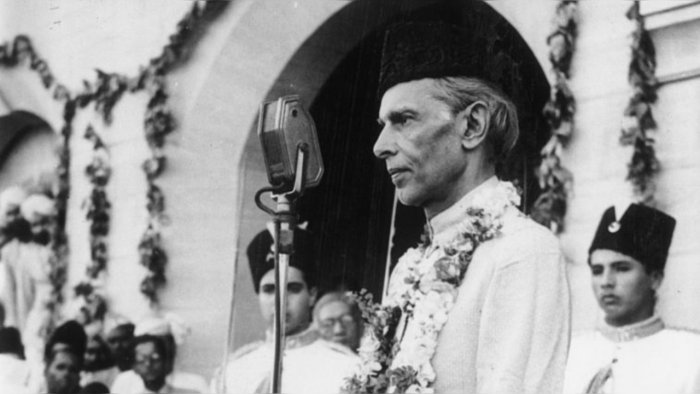
Muhammad Ali Jinnah
7. The question of language and script is another demand of the Muslims. The Muslims insist on Urdu being practically their national language; they want statutory guarantees that the use of [the] Urdu tongue shall not in any wiser manner be curtailed or damaged.
8. The question of the representation of the Muslims in the local bodies is another unsolved question. Muslims demand that the principle underlying the Communal Award, namely, separate electorates and representation according to population strength should apply uniformly in all the various local and other elected bodies from top to bottom.
We can go on multiplying this list but for the present we should like to know the reply of the Congress and Pandit Jawaharlal Nehru to the demands that we have set forth above. We should like Pandit Jawaharlal Nehru fully to understand that the Muslims are more anxious than the Hindus to see complete independence in the real sense of that term established in India. They do not believe in any Muslim Raj for India and will fight a Hindu Raj tooth and nail. They stand for the complete freedom of the country and of all classes inhabiting this country, but they shall oppose the establishment of any majority raj of a kind that will make a clean sweep of the cultural, religious and political guarantees of the various minorities as set forth above. Pandit Jawaharlal Nehru is under the comforting impression that the question set forth above are trivial questions but he should reconsider his position in the light of the emphasis and importance which the minorities which are affected by the programme of the Congress place on these matters. After all it is the minorities which are to judge and not the majorities. It appears to us that with the attitude of mind which Pandit Jawaharlal Nehru betrayed in his speech and which the seconder of that resolution equally exhibited in his speech, namely, that the question of minorities and majorities was an artificial one and created to suit vested interests, it is obvious that nothing can come out of the talks that Pandit Jawaharlal Nehru recently initiated between himself and Mr Jinnah. If the Congress is in the belief that this reiteration of its inane pledge to the minorities will satisfy them and that they will be taken in by mere words, the Congress is badly mistaken.
New Times, Lahore, 1 March 1938
Nehru to Jinnah – 6 April 1938
Calcutta,
6 April 1938
Dear Mr Jinnah,
Your last letter of the 17th March reached me in the Kumaun hills where I had gone for a brief holiday. From there I have come to Calcutta. I propose to return to Allahabad today and I shall probably be there for the greater part of April. If it is convenient for you to come there we could meet. Or if it suits you better to go to Lucknow I shall try to go there.
I am glad that you have indicated in your last letter a number of points which you have in mind. The enclosures you have sent mention these and I take it that they represent your viewpoint. I was somewhat surprised to see this list as I had no idea that you wanted to discuss many of these matters with us. Some of these are wholly covered by previous decisions of the Congress, some others are hardly capable of discussion.
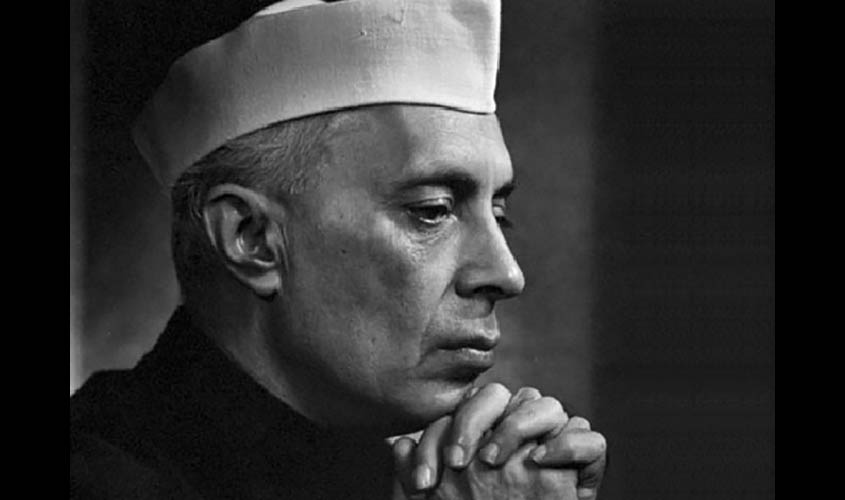
Jawaharlal Nehru
As far as I can make out from your letter and the enclosures you have sent, you wish to discuss the following matters:
1. The Fourteen Points formulated by the Muslim League in 1929.
2. The Congress should withdraw all opposition to the Communal Award and should not describe it as a negation of nationalism.
3. The share of the Muslims in the state services should be definitely fixed in the Constitution by statutory enactment.
4. Muslim Personal Law and culture should be guaranteed by Statute.
5. The Congress should take in hand the agitation in connection with the Shahidganj Mosque and should use its moral pressure to enable the Muslims to gain possession of the mosque.
6. The Muslim’s right to call Azan and perform religious ceremonies should not be fettered in any way.
7. Muslims should have freedom to perform cow-slaughter.
8. Muslim majorities in the Provinces, where such majorities exist at present, must not be affected by any territorial redistribution or adjustments.
9. The Bande Mataram song should be given up.
10. Muslims want Urdu to be the national language of India and they desire to have statutory guarantees that the use of Urdu shall not be curtailed or damaged.
11. Muslim representation in the local bodies should be governed by the principles underlying the Communal Award, that is separate electorates and population strength.
12. The tricolour flag should be changed or, alternatively, the flag of the Muslim League should be given equal importance.
13. Recognition of the Muslim League as the one authoritative and representative organization of Indian Muslims.
14. Coalition ministries.
It is further stated that the formula evolved by you and Babu Rajendra Prasad in 1935 does not satisfy the Muslims now and nothing on those lines will satisfy them. It is added that the list given above is not a complete list and that it can be augmented by the addition of further ‘demands’. Not knowing these possible and unlimited additions I can say nothing about them. But I should like to deal with the various matters specifically mentioned and to indicate what the Congress attitude has been in regard to them.
But before considering them, the political and economic background of the free India we are working for has to be kept in mind, for ultimately that is the controlling factor. Some of these matters do not arise in considering an independent India or take a particular shape or have little importance. We can discuss them in terms of Indian independence or in terms of the British dominance of India continuing. The Congress naturally thinks in terms of independence, though it adjusts itself occasionally to the pressure of transitional and temporary phases. It is thus not interested in amendments to the present constitution, but aims at its removal and its substitution by a constitution framed by the people through a Constituent Assembly.
But before considering them, the political and economic background of the free India we are working for has to be kept in mind, for ultimately that is the controlling factor. Some of these matters do not arise in considering an independent India or take a particular shape or have little importance. We can discuss them in terms of Indian independence or in terms of the British dominance of India continuing. The Congress naturally thinks in terms of independence, though it adjusts itself occasionally to the pressure of transitional and temporary phases. It is thus not interested in amendments to the present constitution, but aims at its removal and its substitution by a constitution framed by the people through a Constituent Assembly.
Another matter has assumed an urgent and vital significance and this is the exceedingly critical international situation and the possibility of war. This must concern India greatly and affect her struggle for freedom. This must therefore be considered the governing factor of the situation and almost everything else becomes of secondary importance, for all our efforts and petty arguments will be of little avail if the very foundation is upset. The Congress has clearly and repeatedly laid down its policy in the event of such a crisis and stated that it will be no party to imperialist war. The Congress will very gladly and willingly cooperate with the Muslim League and all other organizations and individuals in the furtherance of this policy.
I have carefully looked through the various matters to which you have drawn attention in your letter and its enclosures and I find that there is nothing in them which refers to or touches the economic demands of the masses or affects the all-important questions of poverty and unemployment. For all of us in India these are the vital issues and unless some solution is found for them, we function in vain. The question of state services, howsoever important and worthy of consideration it might be, affects a very small number of people. The peasantry, industrial workers, artisans and petty shop-keepers form the vast majority of the population and they are not improved in any way by any of the demands listed above. Their interests should be paramount.
Many of the ‘demands’ involve changes of the constitution which we are not in a position to bring about. Even if some such changes are desirable in themselves, it is not our policy to press for minor constitutional changes. We want to do away completely with the present constitution and replace it by another for a free India.
In the same way, the desire for statutory guarantees involves constitutional changes which we cannot give effect to. All we can do is to state that in a future constitution for a free India we want certain guarantees to be incorporated. We have done this in regard to religious, cultural, linguistic and other rights of minorities in the Karachi resolution on fundamental rights. We would like these fundamental rights to be made a part of the constitution.
I now deal with the various matters listed above.
1. The Fourteen Points, I had thought, were somewhat out of date. Many of their provisions have been given effect to by the Communal Award and in other ways, some others are entirely acceptable to the Congress; yet others require constitutional changes which, as I have mentioned above, are beyond our present competence. Apart from the matters covered by the Communal Award and those involving a change in the constitution, one or two matters remain which give rise to differences of opinion and which are still likely to lead to considerable argument.
2. The Congress has clearly stated its attitude towards the Communal Award, and it comes to this that it seeks alterations only on the basis of mutual consent of the parties concerned. I do not understand how anyone can take objection to this attitude and policy. If we are asked to describe the Award as not being anti-national, that would be patently false. Even apart from what it gives to various groups, its whole basis and structure are anti-national and come in the way of the development of national unity. As you know it gives an overwhelming and wholly underserving weightage to the European elements in certain parts of India. If we think in terms of an independent India, we cannot possibly fit in this Award with it. It is true that under stress of circumstances we have sometimes to accept as a temporary measure something that is on the face of it anti-national. It is also true that in the matters governed by the Communal Award we can only find a satisfactory and abiding solution by the consent and goodwill of the parties concerned. That is the Congress policy.
3. The fixing of the Muslims’ share in the state services by statutory enactment necessarily involves the fixing of the shares of other groups and communities similarly. This would mean a rigid and compartmental state structure which will impede progress and development. At the same time it is generally admitted that state appointments should be fairly and adequately distributed and no community should have cause to complain. It is far better to do this by convention and agreement. The Congress is fully alive to this issue and desires to meet the wishes of various groups in the fullest measure so as to give to all minority communities, as stated in No. 11 of the Fourteen Points, ‘an adequate share in all the services of the state and in local self-governing bodies having due regard to the requirements of efficiency’. The state today is becoming more and more technical and demands expert knowledge in its various departments. It is right that, if a community is backward in this technical and expert knowledge, special efforts should be made to give it this education to bring it up a to higher level.
I understand that at the Unity Conference held at Allahabad in 1933 or thereabouts, a mutually satisfactory solution of this question of state services was arrived at.
4. As regards protection of culture, the Congress has declared its willingness to embody this in the fundamental laws of the constitution. It has also declared that it does not wish to interfere in any way with the personal law of any community.
5. I am considerably surprised at the suggestions that the Congress should take in hand the agitation in connection with the Shahidganj Mosque. That is a matter to be decided either legally or by mutual agreement. The Congress prefers in all such matters the way of mutual agreement and its services can always be utilized for this purpose where there is no opening for them and a desire to this effect on the part of the parties concerned. I am glad that the Premier of the Punjab has suggested that this is the only satisfactory way to a solution of the problem.
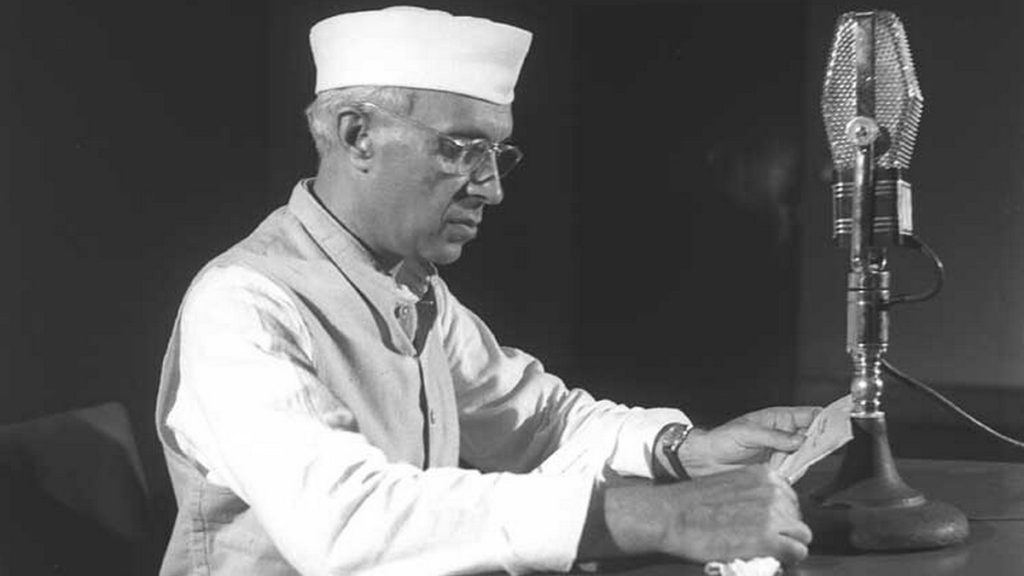
Jawaharlal Nehru
6. The right to perform religious ceremonies should certainly be guaranteed to all communities. The Congress resolution about this is quite clear. I know nothing about the particular incident relating to a Punjab village which has been referred to. No doubt many instances can be gathered together from various parts of India where petty interferences take place with Hindu, Muslim or Sikh ceremonies. These have to be tactfully dealt with wherever they arise. But the principle is quite clear and should be agreed to.
7. As regards cow-slaughter there has been a great deal of entirely false and unfounded propaganda against the Congress suggesting that the Congress was going to stop it forcibly by legislation. The Congress does not wish to undertake any legislative action in this matter to restrict the established rights of the Muslims.
8. The question of territorial distribution has not arisen in any way. If and when it arises it must be dealt with on the basis of mutual agreement of the parties concerned.
9. Regarding the Bande Mataram song the Working Committee issued a long statement in October last to which I would invite your attention. First of all, it has to be remembered that no formal national anthem has been adopted by the Congress at any time. It is true, however, that the Bande Mataram song has been intimately associated with Indian nationalism for more than thirty years and numerous associations of sentiment and sacrifice have gathered round it. Popular songs are not made to order, nor can they be successfully imposed. They grow out of public sentiment. During all these thirty or more years the Bande Mataram song was never considered as having any religious significance and was treated as a national song in praise of India. Nor, to my knowledge, was any objection taken to it except on political grounds by the Government. When, however, some objections were raised, the Working Committee carefully considered the matter and ultimately decided to recommend that certain stanzas, which contained certain allegorical references, might not be used on national platforms or occasions. The two stanzas that have been recommended by the Working Committee for use as a national song have not a word or a phrase which can offend anybody from any point of view and I am surprised that anyone can object to them. They may appeal to some more than to others. Some may prefer another national song. But to compel large numbers of people to give up what they have long valued and grown attached to is to cause needless hurt to them and injure the national movement itself. It would be improper for a national organization to do this.
10. About Urdu and Hindi I have previously written to you and have also sent you my pamphlet on ‘The Question of Language’. The Congress has declared in favour of guarantees for languages and culture. I want to encourage all the great provincial languages of India and at the same time to make Hindustani, as written both in the Nagri and Urdu scripts, the national language. Both scripts should be officially recognized and the choice should be left to the people concerned. In fact this policy is being pursued by the Congress Ministries.
About Urdu and Hindi I have previously written to you and have also sent you my pamphlet on ‘The Question of Language’. The Congress has declared in favour of guarantees for languages and culture. I want to encourage all the great provincial languages of India and at the same time to make Hindustani, as written both in the Nagri and Urdu scripts, the national language. Both scripts should be officially recognized and the choice should be left to the people concerned.
11. The Congress has long been of opinion that joint electorates are preferable to separate electorates from the point of view of national unity and harmonious co-operation between the different communities. But joint electorates, in order to have real value, must not be imposed on unwilling groups. Hence the Congress is quite clear that their introduction should depend on their acceptance by the people concerned. This is the policy that is being pursued by the Congress Ministries in regard to Local bodies. Recently in a Bill dealing with local bodies introduced in the Bombay Assembly, separate electorates were maintained but an option was given to the people concerned to adopt a joint electorate, if they so chose. This principle seems to be in exact accordance with No. 5 of the Fourteen Points, which lays down that ‘representation of communal groups shall continue to be by means of separate electorate as at present, provided that it shall be open to any community, at any time, to abandon its separate electorate in favour of joint electorate’. It surprises me that the Muslim League group in the Bombay Assembly should have opposed the Bill with its optional clause although this carried out the very policy of the Muslim League.
May I also point out that in the resolution passed by the Muslim League in 1929, at the time it adopted the Fourteen Points, it was stated that ‘the Mussalmans will not consent to join electorates unless Sind is actually constituted into a separate province and reforms in fact are introduced in the NWF Province and Baluchistan on the same footing as in other provinces’. Since then Sind has been separated and the NWF Province has been placed on a level with other provinces. So far as Baluchistan is concerned the Congress is committed to a levelling up of this area in the same way.
12. The national tricolour flag was adopted originally in 1929 by the Congress after full and careful consultation with eminent Muslim, Sikh and other leaders. Obviously a country and national movement must have a national flag representing the nation and all communities in it. No communal flag can represent the nation. If we did not possess a national flag now we would have to evolve one. The present national flag had its colours originally selected in order to represent the various communities, but we did not like to lay stress on this communal aspect of colours. Artistically I think the combination of orange, white and green resulted in a flag which is probably the most beautiful of all national flags. For these many years our flag has been used and it has spread to the remotest village and brought hope and courage and a sense of all India unity to our masses. It has been associated with great sacrifices on the part of our people, including Hindus, Muslims and Sikhs, and many have suffered lathi blows and imprisonment and even death in defending it from insult or injury. Thus a powerful sentiment has grown in its favour. On innumerable occasions Maulana Mohamed Ali, Maulana Shaukat Ali and many leaders of the Muslim League today have associated themselves with this flag and emphasized its virtues and significance as a symbol of Indian unity. It has spread outside the Congress ranks and been generally recognized as the flag of the nation. It is difficult to understand how anyone can reasonably object to it now.
Communal flags cannot obviously take its place for that can only mean a host of flags of various communities being used together and thus emphasizing our disunity and separateness. Communal flags might be used for religious functions but they have no place at any national functions or over any public building meant for various communities.
May I add that during the past few months, on several occasions, the national flag has been insulted by some members or volunteers of the Muslim League. This has pained us greatly but we have deliberately avoided anything in the nature of conflict in order not to add to communal bitterness. We have also issued strict orders, and they have been obeyed, that no interference should take place with the Muslim League flag, even though it might be inappropriately displayed.
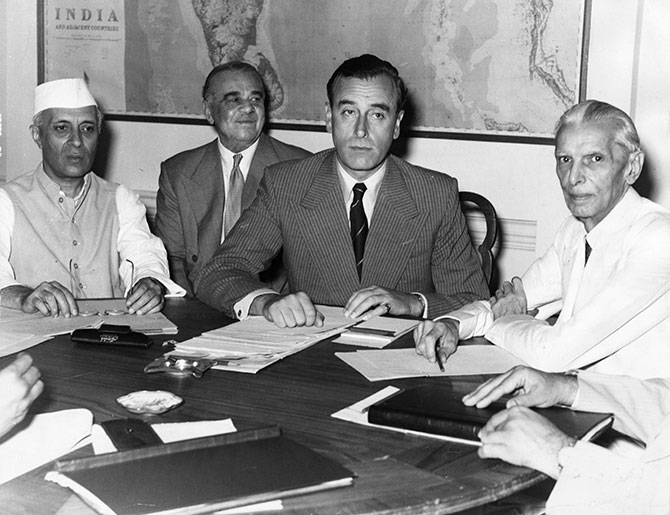
Jawaharlal Nehru and Muhammad Ali Jinnah in a meeting with Lord Mountbatten
13. I do not understand what is meant by our recognition of the Muslim League as the one and only organization of Indian Muslims. Obviously the Muslim League is an important communal organization and we deal with it as such. But we have to deal with all organizations and individuals that come within our ken. We do not determine the measure or importance or distinction they possess. There are a large number, about a hundred thousand, of Muslims on the Congress rolls, many of whom have been our close companions, in prisons and outside, for many years and we value their comradeship highly. There are many organizations which contain Muslims and non-Muslims alike, such as trade unions, peasant unions, kisan sabhas, debt committees, zamindar associations, chambers of commerce, employers’ association, etc., and we have contacts with them. There are special Muslim organizations such as the Jamiat-ul-Ulema, the Proja Party, the Ahrars and others, which claim attention. Inevitably the more important the organization, the more the attention paid to it, but this importance does not come from outside recognition but from inherent strength. And the other organizations, even though they might be younger and smaller, cannot be ignored.
14. I should like to know what is meant by coalition ministries. A ministry must have a definite political and economic programme and policy. Any other kind of ministry would be a disjointed and ineffective body, with no clear mind or direction. Given a common political and economic programme and policy, cooperation is easy. You know probably that some such cooperation was sought for and obtained by the Congress in the Frontier Province. In Bombay also repeated attempts were made on behalf of the Congress to obtain this cooperation on the basis of a common programme. The Congress has gone to the assemblies with a definite programme and in furtherance of clear policy. It will always gladly cooperate with other groups, whether it is a majority or a minority in an assembly, in furtherance of that programme and policy. On that basis I conceive of even coalition ministries being formed. Without that basis the Congress has no interest in a ministry or in an assembly.
I have dealt, I am afraid at exceeding length, with the various points raised in your letter and its enclosures. I am glad that I have had a glimpse into your mind through this correspondence as this enables me to understand a little better the problems that are before you and perhaps others. I agree entirely that it is the duty of every Indian to bring about [a] harmonious joint effort of all of us for the achievement of India’s freedom and the ending of the poverty of her people. For me, and I take it for most of us, the Congress has been a means to that end and not an end in itself. It has been a high privilege for us to work through the Congress because it has drawn to itself the love of millions of our countrymen, and through their sacrifice and united effort, taken us a long way to our goal. But much remains to be done and we have all to pull together to that end.
Personally the idea of pacts and the like does not appeal to me, though perhaps they might be necessary occasionally. What seems to me far more important is a more basic understanding of each other, bringing with it the desire and ability to cooperate together. That larger cooperation, if it is to include our millions must necessarily be in the interests of these millions. My mind therefore is continually occupied with the problems of these unhappy masses of this country and I view all other problems in this light. I should live to view the communal problem also in this perspective for otherwise it has no great significance for me.
Personally the idea of pacts and the like does not appeal to me, though perhaps they might be necessary occasionally. What seems to me far more important is a more basic understanding of each other, bringing with it the desire and ability to cooperate together. That larger cooperation, if it is to include our millions must necessarily be in the interests of these millions. My mind therefore is continually occupied with the problems of these unhappy masses of this country and I view all other problems in this light. I should live to view the communal problem also in this perspective for otherwise it has no great significance for me.
You seem to imagine that I wanted you to put forward suggestions as a petitioner, and then you propose that the Congress should officially communicate with you. Surely you have misunderstood me and done yourself and me an injustice. There is no question of petitioning either by you or by me, but a desire to understand each other and the problem that we have been discussing. I do not understand the significance of your wanting an official intimation from the Congress. I did not ask you for an official reply on behalf of the Muslim League. Organizations do not function in this way. It is not a question of prestige for the Congress or for any of us, for we are keener on reaching the goal we have set before us, than on small matters of prestige. The Congress is a great enough organization to ignore such petty matters, and if some of us have gained a measure of influence and popularity, we have done so in the shadow of the Congress.
You will remember that I took the initiative in writing to you and requesting you to enlighten me as to what your objections were to the Congress policy and what, according to you, were the points in dispute. I had read many of your speeches, as reported in the press, and I found to my regret that they were full of strong attacks on the Congress which, according to my way of thinking, were not justified. I wanted to remove any misunderstandings, where such existed, and to clear the air.
I have found, chiefly in the Urdu press, the most astounding falsehoods about the Congress. I refer to facts, not to opinions, and to facts within my knowledge. Two days ago, here in Calcutta, I saw a circular letter or notice issued by a secretary of the Muslim League. This contained a list of the so-called misdeeds of the UP Government. I read this with amazement for there was not an atom of truth in most of the charges. I suppose they were garnered from the Urdu press. Through the press and the platform such charges have been repeated on numerous occasions and communal passions have thus been roused and bitterness created. This has grieved me and I have sought by writing to you and to Nawab Ismail Khan to find a way of checking this deplorable deterioration of our public life, as well as a surer basis for cooperation. That problem still faces us and I hope we shall solve it.
I have mentioned earlier in this letter the critical international situation and the terrible sense of impending catastrophe that hangs over the world. My mind is obsessed with this and I want India to realize it and be ready for all consequences, good or ill, that may flow from it. In this period of world crisis all of us, to whatever party or group we might belong and whatever our differences might be, have the primary duty of holding together to protect our people from perils that might encompass them.
I have mentioned earlier in this letter the critical international situation and the terrible sense of impending catastrophe that hangs over the world. My mind is obsessed with this and I want India to realize it and be ready for all consequences, good or ill, that may flow from it. In this period of world crisis all of us, to whatever party or group we might belong and whatever our differences might be, have the primary duty of holding together to protect our people from perils that might encompass them.
Our differences and arguments seem trivial when the future of the world and of India hangs in the balance. It is in the hope that all of us will succeed in building up this larger unity in our country that I have written to you and others repeatedly and at length.
There is one small matter I should like to mention. The report of my speech at Haripura, as given in your letter and the newspaper article, is not correct.
We have been corresponding for some time and many vague rumours float about as to what we have been saying to each other. Anxious inquiries come to me and I have no doubt that similar inquiries are addressed to you also. I think that we might take the public into our confidence now for this is a public matter on which many are interested. I suggest, therefore, that our correspondence might be released to the press. I presume you will have no objection.
Yours sincerely,
Jawaharlal Nehru
Jinnah to Nehru – 12 April 1938
Bombay,
12 April 1938
Dear Pandit Jawaharlal,
I an in receipt of your letter of the 6th April 1938. I am extremely obliged to you for informing me that you propose to return to Allahabad and shall probably be there for the greater part of April and suggesting that, if it would be convenient for me to come there, we could meet, or, if it suits me better to go to Lucknow, you will try to go there. I am afraid that it is not possible for me owing to my other engagements, but I shall be in Bombay about the end of April and if it is convenient to you, I shall be very glad to meet you.
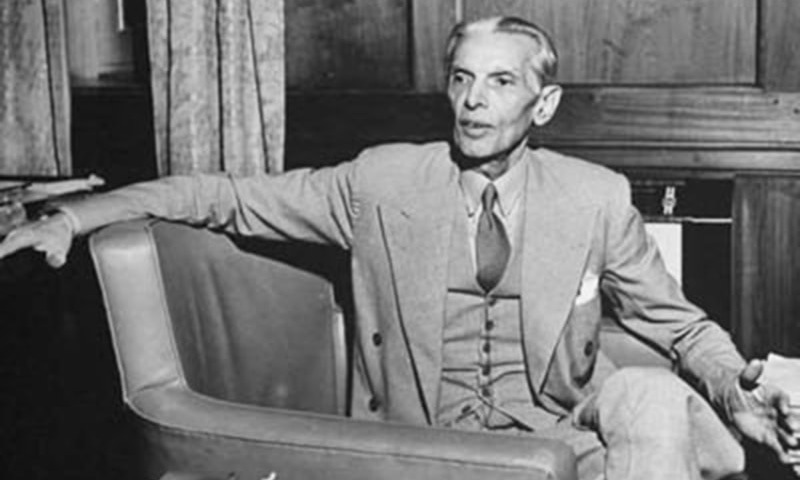
Muhammad Ali Jinnah
It seems to me that you cannot even accurately interpret my letter, as you very honestly say that your ‘mind is obsessed with the international situation and the terrible sense of impending catastrophe that hangs over the world’, so you are thinking in terms entirely divorced from realities which face us in India. I can only express my great regret at your turning and twisting what I wrote to you and putting entirely a wrong complexion upon the position I have placed before you at your request.
As to the rest of your letter, it has been to me a most painful reading. It seems to me that you cannot even accurately interpret my letter, as you very honestly say that your ‘mind is obsessed with the international situation and the terrible sense of impending catastrophe that hangs over the world’, so you are thinking in terms entirely divorced from realities which face us in India. I can only express my great regret at your turning and twisting what I wrote to you and putting entirely a wrong complexion upon the position I have placed before you at your request. You have formulated certain points in your letter which you father upon me to begin with as my proposals. I sent you extracts from the press which had recently appeared simply because I believed you when you repeatedly asserted and appealed to me that you would be grateful if I would refer you to any recent statements made in the press or platform which would help you in understanding matters. Those are some of the matters which are undoubtedly agitating Muslim India, but the question how to meet them and to what extent and by what means and methods, is the business, as I have said before, of every true nationalist to solve. Whether constitutional changes are necessary, whether we should do it by agreement or conventions and so forth, are matters, I thought, for discussion, but I am extremely sorry to find that you have in your letter already pronounced your judgment and given your decisions on a good many of them with a preamble which negatives any suggestion of discussion which may lead to a settlement, as you start by saying ‘I was somewhat surprised to see this list as I had no idea that you wanted to discuss many of these matters with us; some of these are wholly covered by previous decisions of the Congress, some others are hardly capable of discussion’, and then you proceed to your conclusions having formulated the points according to your own notions. Your tone and language again display the same arrogance and militant spirit as if the Congress is the sovereign power and, as an indication, you extend your patronage by saying that ‘obviously the Muslim League is an important communal organization and we deal with it as such, as we have to deal with all organizations and individuals that come within our ken. We do not determine the measure of importance or distinction they possess,’ and then you mention various other organizations. Here I may add that in my opinion, as I have publicly stated so often, that unless the Congress recognizes the Muslim League on a footing of complete equality and is prepared as such to negotiate for a Hindu-Muslim settlement, we shall have to wait and depend upon our inherent strength which will ‘determine the measure of importance or distinction it possesses’. Having regard to your mentality it is really difficult for me to make you understand the position any further. Of course, as I have said before, I do not propose to discuss the various matters, referred to by you, by means of and through correspondence, as, in my opinion, that is not the way to tackle this matter.
Your tone and language again display the same arrogance and militant spirit as if the Congress is the sovereign power and, as an indication, you extend your patronage by saying that ‘obviously the Muslim League is an important communal organization and we deal with it as such, as we have to deal with all organizations and individuals that come within our ken. We do not determine the measure of importance or distinction they possess,’ and then you mention various other organizations.
With regard to your reference to certain falsehoods that have appeared about the Congress in the Urdu press, which, you say, have astounded you, and with regard to the circular letter referred to about the misdeeds of the UP Government, I can express no opinion without investigation, but I can give you [a] number of falsehoods that have appeared in the Congress press and in statements of Congressmen with regard to the All-India Muslim League, some of the leaders and those who are connected with it. Similarly I can give instances of reports appearing in the Congress press and speeches of Congressmen which are daily deliberately misrepresenting and vilifying the Muslim composition of the Bengal, Sind, Punjab and Assam Governments with a view to break those governments, but that is not the subject matter of our correspondence and besides no useful purpose will be served in doing so.
With regard to your request that our correspondence should be released to the press, I have no objection provided the correspondence between me and Mr Gandhi is also published simultaneously, as we both have referred to him and his correspondence with me in ours. You will please therefore obtain the permission of Mr Gandhi to that effect or, if you wish, I will write to him, informing him that you desire to release the correspondence between us to the press and I am willing to agree to it provided he agrees that the correspondence between him and myself is also released.
With regard to your request that our correspondence should be released to the press, I have no objection provided the correspondence between me and Mr Gandhi is also published simultaneously, as we both have referred to him and his correspondence with me in ours. You will please therefore obtain the permission of Mr Gandhi to that effect or, if you wish, I will write to him, informing him that you desire to release the correspondence between us to the press and I am willing to agree to it provided he agrees that the correspondence between him and myself is also released.
Yours sincerely,
M.A. Jinnah
These letters have been republished from Nehru: The Debates that Defined India, courtesy the permission of Tripurdaman Singh and Adeel Hussain. You can buy the book here.
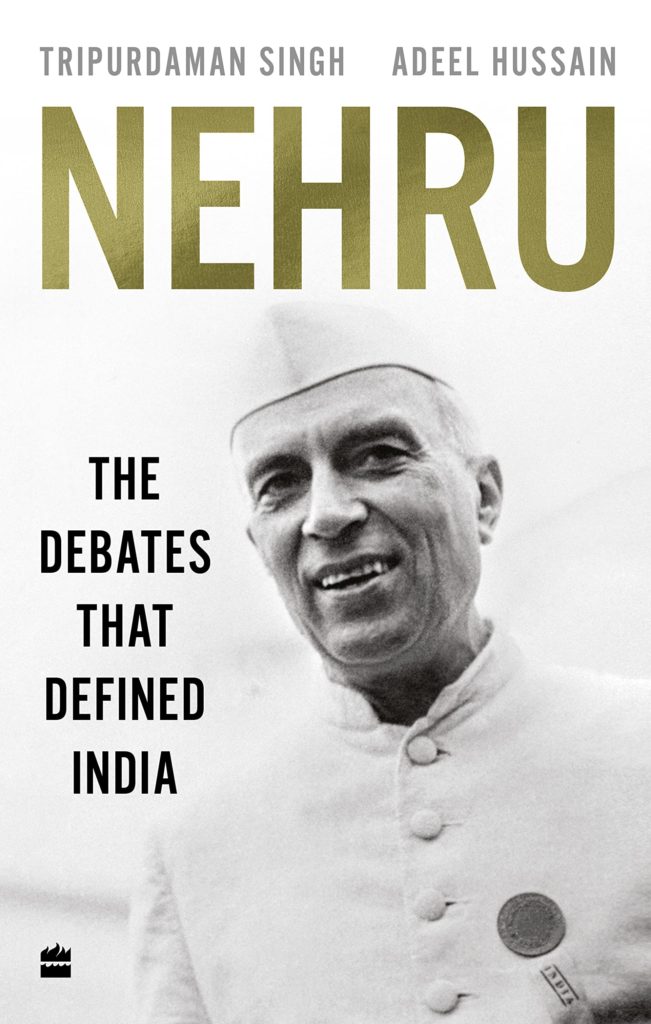
ARCHIVE
‘Akbar, a king like Alexander, attained his every wish.’ — Abu’l Fazl, The History of Akbar, vol. 6
There was a new confidence in Akbar when he returned to Fatehpur from Patna. In the first few months of 1575, he did two things that would not only cement the foundations of his own reign, but create a blueprint for rule that would endure centuries after Akbar’s demise.
First, after years of hedging by his nobility, Akbar finally pushed through his administrative reforms – every bit of land in the realm would belong to the crown, there would be no more fiefs; and every bit of farmed land would be remeasured – not with the customary rope, but with bamboo rods, for greater accuracy. As for the fief-holders, they were mansabdars now, with ranks and responsibilities, for which they would be paid a salary. Thus, a man might hold a rank between 10 and 5000, the number indicating how many cavalrymen he was obliged to provide the emperor when called upon to do so, and his salary calculated on how much it would cost to maintain so many men and horses – and, of course, the mansabdar himself.
Second, Akbar began to host weekly theological debates in his newly built Ibadat Khana, a ‘house of worship’ to which the emperor invited clerics, scholars and believers of various (for the moment, only Muslim) sects for night-long debates of increasing acrimony.
It is hard to say which of the two decisions was more controversial, though both were born of ideas whose time had come.
It was now, writes the modern historian Ali Anooshahr, in the sixteenth and seventeenth centuries, that the Ottoman, Safavid and Mughal empires all moved from ‘the war band… to a bureaucratic absolutist “state”‘. Presumably, this was at least partly because there was only so far an empire could run on shields full of hidden treasure shared between warlords. It also indicated, however, a new focus on the monarch of this evolving state as the source of its legitimacy and authority. This was, as many historians have argued, the logic and the genius of the mansabdari system. Warlords like the Uzbeks or the Mirzas drew sustenance from the strength of their own arms and that of their clans; a mansabdar owed his salary, his authority, and therefore his loyalty, to the shahinshah.
It was now, writes the modern historian Ali Anooshahr, in the sixteenth and seventeenth centuries, that the Ottoman, Safavid and Mughal empires all moved from ‘the war band… to a bureaucratic absolutist “state”‘. Presumably, this was at least partly because there was only so far an empire could run on shields full of hidden treasure shared between warlords. It also indicated, however, a new focus on the monarch of this evolving state as the source of its legitimacy and authority. This was, as many historians have argued, the logic and the genius of the mansabdari system. Warlords like the Uzbeks or the Mirzas drew sustenance from the strength of their own arms and that of their clans; a mansabdar owed his salary, his authority, and therefore his loyalty, to the shahinshah.
It would be a long while, of course, before these newly minted mansabdars – and particularly the higher-ranking noblemen, ‘amirs’, among them – came to accept Akbar’s new design. Resentments would fester, battles would erupt – the turmoil would be such that even Muhammad Hakim, Akbar’s half brother, safely retreated to Kabul these past many years, would sniff another opportunity in Hindustan.
If Akbar anticipated any of this in 1575, when he announced his reforms, he did not let it worry him unduly. In fact, having decided to bring his nobility to heel and their revenue into his own treasury, Akbar opened up a second front, too – he would also take on his clergy.
If the shahinshah was the symbolic core of the Mughal bureaucracy as it was now emerging, Akbar also occupied the literal centre of his Ibadat Khana. The building does not stand any longer, but the descriptions are clear. It was a large hall with four wings, each assigned to a particular group of men: amirs, philosophers, sayyids and Sufis. Akbar’s own seat was at the very centre of the hall, from where he watched them all, and ‘tested them company by company’ – until he formulated his own creed.
It was also at this time that the man whom you might call Akbar’s high priest re-entered his life. At his first shy meeting with the emperor, Abul Fazl had been invited to travel east with him. The young man had made his excuses. For all his claims about being invaded by love for the shahinshah, the reclusive scholar may have been quietly horrified at the idea of travelling so far away from home with a boisterous military camp. Abul Fazl had hurried back to his father’s house, while Akbar ‘gave rein to his river-drinking crocodile’ and sailed away to Patna.
Afterwards, Abul Fazl may have regretted not accepting the emperor’s invitation; or perhaps it was his family that was dismayed by such a wilfully missed opportunity. At any rate, he was back at court: armed with excuses (he couldn’t have travelled without his father’s permission); flattery (he’d had visions of Akbar’s victory); and yet another essay on yet another set of verses from the Quran (of which Badauni observes cattily, ‘people said it was written by his father’).
Walking through the grand mosque in Fatehpur, Abul Fazl saw the emperor arrive, in the distance. Not daring to approach, he bowed from where he stood. And…could it be? Akbar saw him, recognized him! Thrilled, Abul Fazl rushed forward.
The rest is history.
Walking through the grand mosque in Fatehpur, Abul Fazl saw the emperor arrive, in the distance. Not daring to approach, he bowed from where he stood. And…could it be? Akbar saw him, recognized him! Thrilled, Abul Fazl rushed forward. The rest is history.
***
More than once, in the Akbarnama, Abul Fazl portrays himself as a shy and lonely character dragged into the material world despite himself. When he arrived in Fatehpur for the second time, Abul Fazl says he had no friends. in the city, that ‘there was no kind person to console me’. Yet, he continues piteously, ‘[m]y youth would not allow me to ask for assistance’. What pulled him out of his shell was the all-powerful emperor, his near-divine muse. ‘What portion can a bewildered, headless and footless mote have in the beams of the world-lighting Sun? It can only be tossed about in the wind’, he wrote in his preface to the Akbarnama.
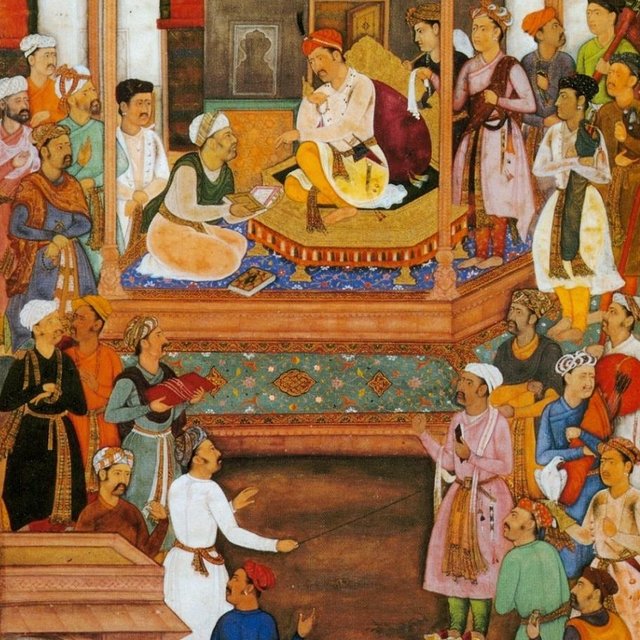
A miniature showing Abū’l Faẓl presenting the Akbarnāmā to Emperor Akbar (Wikimedia Commons)
Others saw Abul Fazl differently. The authors of the Maathir-ul-Umara, a who’s who of the Mughal nobility compiled in the eighteenth century, describe a gregarious, generous man. He kept a lavish table, for example, with 22 seers (about 20 kg) of food served every day; in the first and last military expedition of his life, he had 1000 dishes cooked for every meal, mostly to be distributed. Abul Fazl would never dismiss an employee, the Maathir-ul-Umara goes on, nor ever fine or otherwise punish anyone, no matter how poorly they performed. Every year, he would burn his books of account (to eliminate all debts, presumably) and give all his clothes to his staff. The reticent bookworm, if at all he ever existed, must have blossomed in the warmth of Akbar’s patronage.
But success does not guarantee popularity. Badauni’s pen is never so acidic as when he describes his ‘officious…openly faithless’, colleague, ‘continually studying the Emperor’s whims, a flatterer beyond all bounds’. It was by such ‘time-serving qualities’, writes Badauni, that Abul Fazl raced through the ranks, while – ‘poor I’! – Badauni ‘could not manage to advance myself’. Even Badauni suggests, however, that it wasn’t only the usual currying for favour and promotion that animated Abul Fazl. The young scholar came to court not so much to make his own fortune, but to destroy the ulema that had persecuted his family. ‘He is the man,’ writes Badauni, ‘that set the world in flames.”
But success does not guarantee popularity. Badauni’s pen is never so acidic as when he describes his ‘officious…openly faithless’, colleague, ‘continually studying the Emperor’s whims, a flatterer beyond all bounds’. It was by such ‘time-serving qualities’, writes Badauni, that Abul Fazl raced through the ranks, while – ‘poor I’! – Badauni ‘could not manage to advance myself’. Even Badauni suggests, however, that it wasn’t only the usual currying for favour and promotion that animated Abul Fazl. The young scholar came to court not so much to make his own fortune, but to destroy the ulema that had persecuted his family. ‘He is the man,’ writes Badauni, ‘that set the world in flames.”
Whether or not Abul Fazl really daydreamed of setting alight an old world order as he walked the streets of Fatehpur, clutching his essay and hoping to catch the emperor’s eye, there was a great speed, certainly, with which the court ulema lost favour after his appointment in Akbar’s service – the speed, one might say, of a vengeful blade.
***
The idea of Akbar’s rare, possibly unique vision of harmony between religious communities – sulh-i kul, or peace for all – is so deeply ingrained in the popular imagination that it has produced its own corollary, a fraught religious terrain ‘before and after Akbar’. Thus, for example, R.C. Majumdar has argued that, ‘With the sole exception of Akbar, who sought to conciliate the Hindus by removing some of the glaring evils to which they were subjected, almost all the other Mughul Emperors were notorious for their religious bigotry’.
The idea of such Akbarid exceptionalism is as logically and historically untenable, however, as the idea of any one nation out of all others having a manifest destiny. No man, let alone a society, can exist in absolute terms – least of all a man who lived as long and varied a life Akbar did. There was a ‘before Akbar’ to Akbar’s own self, in fact, as the emperor confessed quite cheerfully.
The idea of such Akbarid exceptionalism is as logically and historically untenable, however, as the idea of any one nation out of all others having a manifest destiny. No man, let alone a society, can exist in absolute terms – least of all a man who lived as long and varied a life Akbar did. There was a ‘before Akbar’ to Akbar’s own self, in fact, as the emperor confessed quite cheerfully.
One of the sections in Abul Fazl’s Ain-i-Akbari is a compendium of Akbar’s most quotable quotes titled, in translation, ‘The Happy Sayings of His Majesty’. If the title evokes an unfortunate vision of fixed smiles around North Korean dictators, the sayings themselves are often disarmingly frank. Thus, Akbar recalls the religious zeal of his youth with regret: ‘Formerly I persecuted men into conformity with my faith and deemed it Islam.’ With age and learning, he continues, ‘I was overwhelmed with shame’.
He was also overwhelmed, it seems, with a febrile yearning. In another of his Happy Sayings, Akbar sounds decidedly miserable: ‘Although I am the master of so vast a kingdom, and all the appliances of government are to my hand, yet since true greatness consists in doing the will of God, my mind is not at ease in this diversity of sects and creeds, and my heart is oppressed by this outward pomp of circumstance; with what satisfaction can I undertake the conquest of empire? How I wish for the coming of some pious man, who will resolve the distractions of my heart.’

A painting depicting the scenes of the Ibādat Khāna. (Wikipedia Commons)
A king’s duty was God’s will, after all; or, as Akbar put it, ‘Divine worship in monarchs consists in their justice and good administration’. But with multiplicity of gods in his realm, how was a ruler to know he wasn’t such a in thrall to the Devil by mistake?
Akbar returned from Bengal and became as obsessed with prayer as he had been with conquest. Badauni describes him sitting alone on a large flat stone of an old building’ near his palace, his head bent to his chest, absorbed in contemplation. Sometimes, he spent ‘whole nights in praising God… pronouncing Ya huwa and Ya hadi… full of reverence for Him, who is the true Giver”.
***
While Akbar sought after Truth, what of his subjects? It is hard to get a proper sense of religious feeling across the many diverse societies that comprised Akbar’s growing empire; what impact religion had, great or little, on people’s everyday lives. It is equally hard, however, to escape the sense that religion – whether as ritual or as a way of imagining a just world – was a quotidian and compelling force.
While Akbar sought after Truth, what of his subjects? It is hard to get a proper sense of religious feeling across the many diverse societies that comprised Akbar’s growing empire; what impact religion had, great or little, on people’s everyday lives. It is equally hard, however, to escape the sense that religion – whether as ritual or as a way of imagining a just world – was a quotidian and compelling force.
It was during the sixteenth century, for example, that Tulsidas wrote the Ramcharitmanas and Guru Arjan Dev compiled the Adi Granth -some indication of the sheer variety of ideas, religious and social, that were in ferment, even in competition, at the time. These two monumental texts both offered ideas and ideals of truth and justice that would not have agreed with each other in every point. Thus, for example, B.B. Majumdar describes how Tulsidas ‘states with evident regret that the Surdas now impart knowledge to the Brahmanas, take the sacred thread and accept reprehensible gifts… This was certainly a fling at the popularity of Ravidas the shoe-maker, Dharna the Jat, Sena the barber and other religious leaders belonging to non-Brahmana castes’, some of whom were prominent Bhakti saints. Sikhism, on the other hand, the tenets of which Guru Arjan Dev first compiled in the Adi Granth, was influenced by the Bhakti movement; indeed, the Adi Granth contains verses by several Bhakti saints. Evidently, this evolving faith ruffled some feathers, complaints about the Adi Granth seem to have reached Akbar, at which Guru Arjan Dev sent him the book. The emperor, having heard some excerpts, declared, ‘Excepting love and devotion to God I so far find neither praise nor blame of any one in this Granth. It is a volume worthy of reverence’.

Tulsidas composing his famous Avadhi Ramcharitmanas (Wikipedia Commons)
Poets, philosophers and saints might argue, emperors might adjudicate, but what of the everyday Hindustanis who practised what they preached? It might be almost impossible to imagine any of these lives were it not for the wonderful autobiography of a Jain trader and poet called Banarasidas. In a lucid, honest and often very funny account of his adventures (beautifully translated by Rohini Chowdhury), Banarasidas includes his struggles with ritual and faith. In his youth, writes Banarasi, he fell for a sanyasi’s get rich-quick scheme, and bought a mantra that he was to recite every day for a year, after which, every day, a gold coin would appear at his door for the rest of his life. For an entire year, every day,’ writes Banarasidas, ‘With firm and unwavering belief,/ In the solitude and secrecy of the privy / Banarasi, the blockhead, recited the mantra…’ A year later, he opened his front door. No immediate glitter caught his eye. Poor Banarasi ‘examined the ground carefully’- no doubt growing more annoyed with every desperate scrutiny of the soil and shadows. ‘He found no dinar anywhere.’
It was a blow, but it did not end Banarasi’s quest. The young man would go on to experiment with Saivism, then return to his own Jain faith, but never to find the spiritual satisfaction he sought. The performance of rituals no longer held any joy for him,’ writes the merchant of himself, ‘But he could not appreciate the spiritual aspects either. / Banarasi’s condition became similar to/That of a camel’s fart, which hangs between earth and air.’ Eventually, Banarasidas gave up on all forms of worship and ritual, veering full tilt into heresy instead, so much so that he would even eat the food left in offering to the gods.
So, it seems, a man could journey from superstition to scepticism as freely as Banarasidas travelled from Jaunpur to Agra for his trade. That is not to say, however, that religious belief imposed no constraints on how people were allowed to live.
So, it seems, a man could journey from superstition to scepticism as freely as Banarasidas travelled from Jaunpur to Agra for his trade. That is not to say, however, that religious belief imposed no constraints on how people were allowed to live.
Thus, Badauni tells the tragic tale of an inter-religious (and adulterous) love affair. Romance, it seems, was the otherwise sardonic Badauni’s Achilles heel – himself not above canoodling in a dargah, he couldn’t resist a good love story, whether between Ali Quli and that beautiful rake, Shahim Beg, or now, between Sayyid Musa and the beguiling Mohini.
Some five years before Akbar began his debates in the Ibadat Khana, at about the time that Akbar’s Rajput queen was pregnant with Salim, a young sayyid nobleman from Kalpi called Musa arrived in Agra to pay his respects to the increasingly powerful padishah. Musa was making his way through the city when he caught a glimpse of a beautiful face at a high window. It was Mohini he had seen; she was a goldsmith’s wife, and he was ensnared in ‘the lasso of her pure glance’.
Fortunately for his heart, less so for his future, Musa’s feelings were returned. The lovers knew they were treading dangerous ground and so, for two and a half years, they were ‘content with a glance now and then from afar’. But patience is not the strong suit of wildly beating hearts. One night, Musa took his life in his hands and broke into Mohini’s house, climbing up to her room ‘like a rope-dancer’ and finding his own home in her arms.
The next morning, Mohini left home with her lover, ‘despising fair fame and reputation’, writes Badauni with admiration,… as the moonlight with the moon’. Soon, however, as her relatives gathered in protest and Musa’s life came under threat, Mohini returned home. She told her family that she had been spirited away to an enchanted land. ‘The silly Hindus believed this beautiful deception,’ says Badauni, though evidently not without large grains of salt, for they kept Mohini ‘in a ring of iron serpents’ from now on, shut away ‘in an upper room’ under lock and key.
In the time-honoured manner of lovers separated from their beloveds, Musa went mad. Mohini, unable to bear the thought of her suitor’s grief, escaped once again and once again, the lovers were caught and parted. This time, the police was involved, and Musa was sent to jail where, from longing, he grew as ‘thin as a new moon’.
Again – a third time – the lovers tried. A man called Qazi Jamal, a Hindi poet possessed of a good horse and strong nerves, helped them. He carried Mohini away on his ‘charger, head-tossing like the… steed of Fate …wind-footed and prancing’, racing along the banks of the Yamuna with half of Agra watching.
Mohini’s relatives were chasing behind, and many of Agra’s citizens ‘who were spectators of the scene [were shouting] in front’- and yet, the young girl might have made her escape if the steed of fate had not caught its feet in the mud. Mohini threw herself off the horse and told the poet to escape – tell Musa I tried!
The news of this third failure broke the wretched Musa. He died. It would have to be, of course, that his bier passed by the goldsmith’s house. Standing at the very window, perhaps, from which she had once exchanged flirtatious glances with a stranger, Mohini watched the funeral procession. When Musa’s still form was just below, she threw herself down, breaking the chains that bound her in the process. They found her weeping at his grave.
What could the family do? They let her be, ‘forgave her delinquencies’. Mohini converted to Islam and died.
‘Forgive me!’ Badauni writes in conclusion. ‘The language of love carried the reins of my pen irresistibly out of… my control.’
What is one to make of this story, except, of course, that Musa and Mohini might have suffered no differently in the Agra of the twenty-first century? It was as they died in forbidden love that Akbar had his first son with his Hindu wife, but Badauni draws no contrast between the two facts. Perhaps there is no contrast to be drawn: an emperor’s bride was not of one faith or another, she was a queen. And yet, it is Badauni, too, who often cavils at the great influence that Akbar’s Hindu wives had on him – as, for example, in the case of the brahmin accused of blasphemy.
What is one to make of this story, except, of course, that Musa and Mohini might have suffered no differently in the Agra of the twenty-first century? It was as they died in forbidden love that Akbar had his first son with his Hindu wife, but Badauni draws no contrast between the two facts. Perhaps there is no contrast to be drawn: an emperor’s bride was not of one faith or another, she was a queen. And yet, it is Badauni, too, who often cavils at the great influence that Akbar’s Hindu wives had on him – as, for example, in the case of the brahmin accused of blasphemy.
Both Badauni and Abul Fazl are personally involved in the story, so it must have occurred after Akbar’s return from Bengal, when both men were in his employ. Here is what happened.
A qazi, or judge, in Mathura, who had been collecting building material for a mosque, accused a brahmin of taking some of it and using it to build a temple instead. In the argument that followed, the brahmin poured salt on the injury caused by his alleged theft by abusing the Prophet Muhammad – a sacrilege confirmed by Abul Fazl, who was sent to Mathura to investigate.
The case came before Shaikh Abdun Nabi.
Abdun Nabi had joined Makhdum-ul-Mulk in persecuting Abul Fazl’s family, and had risen to the highest judicial rank in the realm. He was Akbar’s sadr- his chief justice – who not only adjudicated legal matters but also distributed pensions and grants of land to holy men. Akbar was both fond and respectful of his sadr. Badauni describes the emperor rising ‘to adjust the Shaikh’s slippers when he took his leave’; and Akbar sent his eldest son, Salim, to Abdun Nabi’s school. The shaikh had great influence on the emperor, and great power, too, but he wasn’t very popular.
It may not be surprising if Abul Fazl, knowing how Abdun Nabi and men like him had conspired against his father, is less than admiring of the sadr.
Describing how Akbar gave Abdun Nabi his high post, Abul Fazl mutters the aside that the shaikh ‘decked out his shop with hypocrisy’. Badauni, too, has little good to say about the judge – partly because of how Abdun Nabi dealt with his powers over grants of land to religious men.
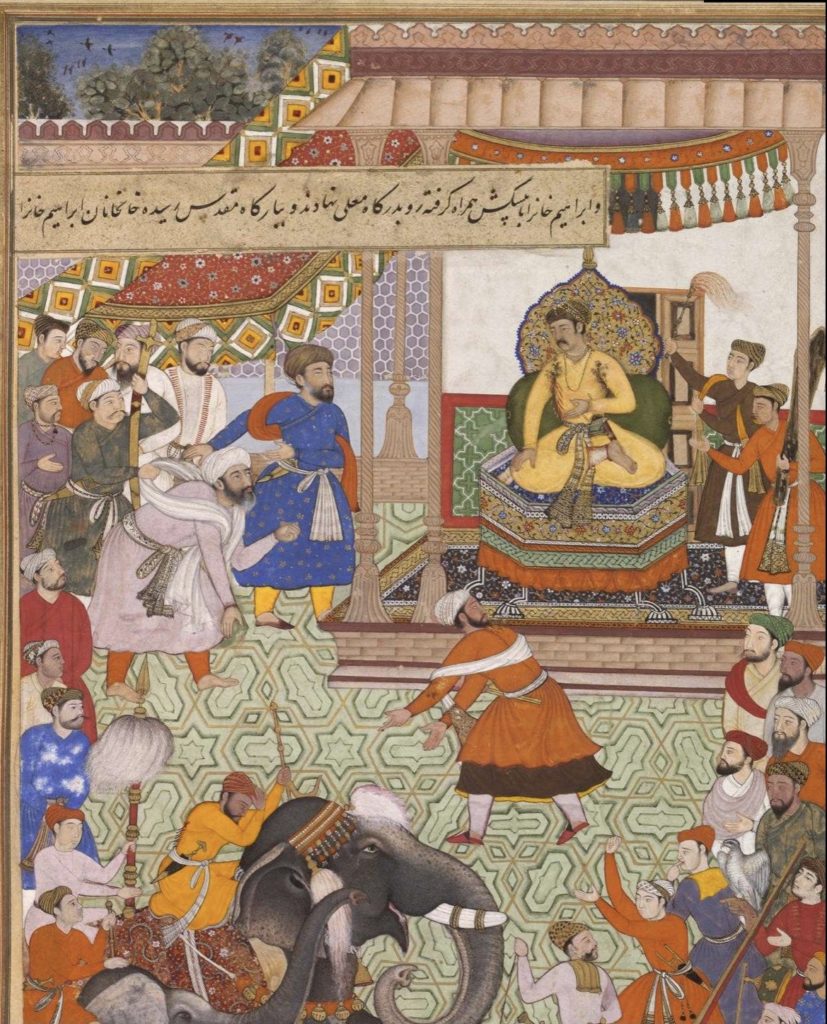
Central And Provincial Administrative Departments Under Akbar
It began well enough, writes Badauni, being dependent himself on such charitable madad-ma’ash grants and always appreciative of generosity – but things were soon ‘reversed’. As he would do with agricultural land, Akbar ordered a comprehensive reappraisal of all madad-ma’ash grants in his realm, putting the fate of countless men in Abdun Nabi’s hands. The shaikh did not take to this exponential increase in his powers with humility. Badauni describes him surrounded by petitioners, many of whom had already had to bribe his clerk, ‘or make presents to his chamberlains, doorkeepers, and sweepers’. Even then, it was difficult to get your voice heard, and imperative to beg. Some even died in the heat of the throng; while Abdun Nabi sat unconcerned on his ‘throne of pride’, sometimes washing his hands and feet, and making sure to splash the dirty water on the head and face and garments’ of the men around him – many of whom were powerful chiefs but, having come to plead a case, ‘bore all this, and condescended to fawn on him, and flatter and toady him to his heart’s content’.
Akbar didn’t seem to notice. No other emperor, writes Badauni, had ever given such ‘absolute power’ to his sadr. The blaspheming brahmin of Mathura would change all that.
The brahmin’s guilt was undisputed, it seems; it was his punishment that divided the court. Some favoured death; others suggested a less drastic penalty, such as public exposure and fine’; while a third party, ‘the ladies of the royal household’, pressed the emperor to release the man. From ‘regard to the Shaikh’, writes Badauni, ‘the King would not give his consent’. The case dragged on until Shaikh Abdun Nabi came to Akbar and asked for leave to execute the culprit. Akbar seems to have given him the same excuse he gave his queens. It was the sadr, he said, who was ‘responsible for carrying into execution the sentence of the law’- why had he come to Akbar?
Perhaps Abdun Nabi was so used to the emperor’s esteem that he mistook his indecision for deference. The brahmin was killed. And Akbar was furious.
As Badauni tells it, the ‘ladies within and the Hindus without’ stirred the pot of Akbar’s fury, until the emperor summoned a meeting of scholars, jurists and divines around the great tank at Fatehpur, the Anup Talao. Badauni was amongst them, and was eventually ordered to speak. ‘When ninety and nine opinions are in favour of a sentence of death,’ Akbar asked him, and a hundredth in favour of acquittal, do you think it right that the muftis should act upon the latter. What is your opinion?’
As Badauni tells it, the ‘ladies within and the Hindus without’ stirred the pot of Akbar’s fury, until the emperor summoned a meeting of scholars, jurists and divines around the great tank at Fatehpur, the Anup Talao. Badauni was amongst them, and was eventually ordered to speak. ‘When ninety and nine opinions are in favour of a sentence of death,’ Akbar asked him, and a hundredth in favour of acquittal, do you think it right that the muftis should act upon the latter. What is your opinion?’
Badauni replied that the law advised against punishment ‘where there was any doubt’. He added, however, that Abdun Nabi may have had compelling reasons to act as he did. Did he do it, perhaps, for the sake of expediency?
If Badauni was trying to strike a balance that would offend nobody, he did not please Akbar. The emperor’s ‘hair stood on end’, writes Badauni, ‘like that of a roused lion’. People around him whispered for Badauni to shut up. Then, Akbar himself looked at him and said, ‘You are not at all right’. Badauni bowed low and stepped back, silently vowing never to attend such meetings again.
Akbar’s fury did not have any immediate consequence on Abdun Nabi’s career. Perhaps the shaikh brushed it from his mind, telling himself that Akbar would soon find a conquest to distract him. But Akbar did not forget, and if he thought of marching into new territory, it was that of his clergy.
This excerpt has been carried courtesy the permission of Juggernaut. You can buy Akbar of Hindustan here.
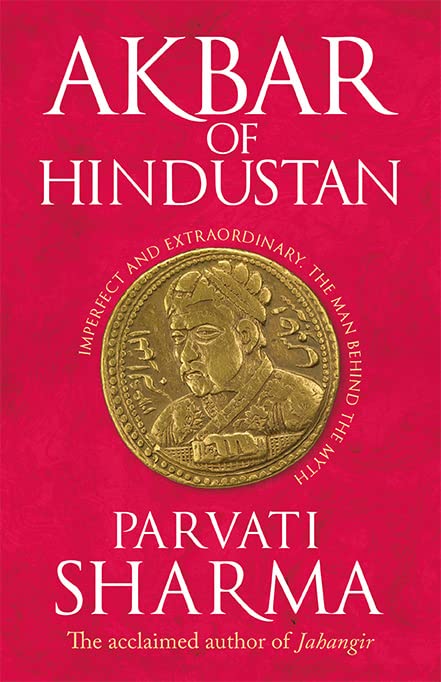
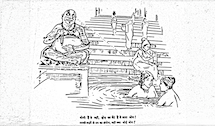
In the colonial period, the threat of the lecherous male gaze was used by the new patriarchy to restrict access to employment and public space for women, maintaining a patriarchal division of labour. Read how this process unfolded in our newest excerpt.
Saurav Kumar Rai
__
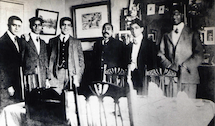
Was Lala Lajpat Rai's Hindu nationalism congruent with the principles of secularism? Explore our latest excerpt from Vanya Vaidehi Bhargav's fresh off-the-press book - Being Hindu, Being Indian: Lala Lajpat Rai's Ideas of Nation for more.
Vanya Vaidehi Bhargav
__
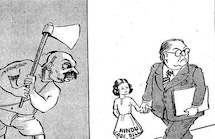
Popularly, we think that political cartoons question the powerful but what if this was not the case? What if political cartoons, replicated structures of the socially dominant? Read how in our new excerpt on political cartoons featuring Dr. Ambedkar.
Unnamati Syama Sundar
__

On Martyrs' day 2024, read the poet Sarojini Naidu's tribute to Gandhi given over All India Radio two days after his assassination.
Sarojini Naidu
__
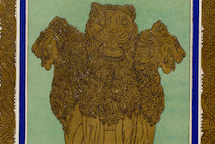
On Republic Day, the Indian History Collective presents you, twenty-two illustrations from the first illustrated manuscript (1954) of our Constitution.
Indian History Collective
__
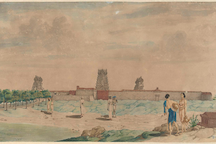
One of the key petitioners in the Ayodhya title dispute was Bhagwan Sri Ram Virajman. This petitioner was no mortal, but God Ram himself. How did Ram find his way from heaven to the Supreme Court of India to plead his case? Read further to find out.
Richard H Davis
__
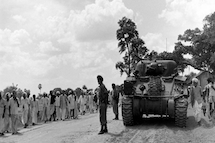
Labelled "one of the shortest, happiest wars ever seen", the integration of the princely state of Hyderabad in 1948 was anything but that. Read about the truth behind the creation of an Indian Union, the fault lines left behind, and what they signify
Afsar Mohammad
__
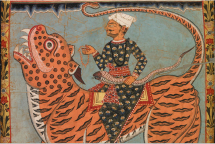
How did Bengal get a large Muslim population? Was it conversion by ruling elites was there something deeper at play? Read Dr. Eaton's classic essay to find out.
Richard Eaton
__
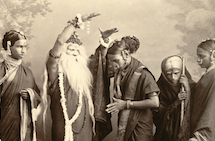
An excerpt from Shailaija Paik's new book 'Vulgarity of Caste' that documents the pivotal role Tamasha (the popular art form) has played in reinforcing and producing caste dynamics in Marathi society.
Shailaja Paik
__
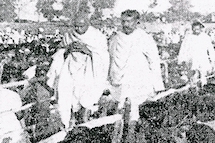
In 1942, two sub-districts in Bengal declared independence and set up a parallel government. The second part of our story brings you archival papers in the form of letters, newspaper reports, and judicial records documenting this remarkable movement.
Indian History Collective
__
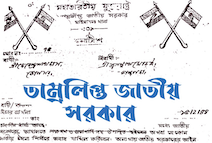
In 1942, five years before India was independent, two sub-divisions in Bengal not only declared their independence— they also instituted a parallel government. The first in a new series.
Indian History Collective
__
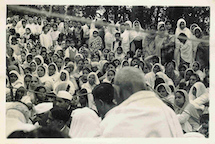
In his own words, read Mohandas Karamchand Gandhi's views on the proselytising efforts taken on by the organisations such as Arya Samaj, Tabhligi Jamaat, and the Church Missionary Society of England.
Mohandas Karamchand Gandhi
__
TIMELINE
-
2500 BC - Present 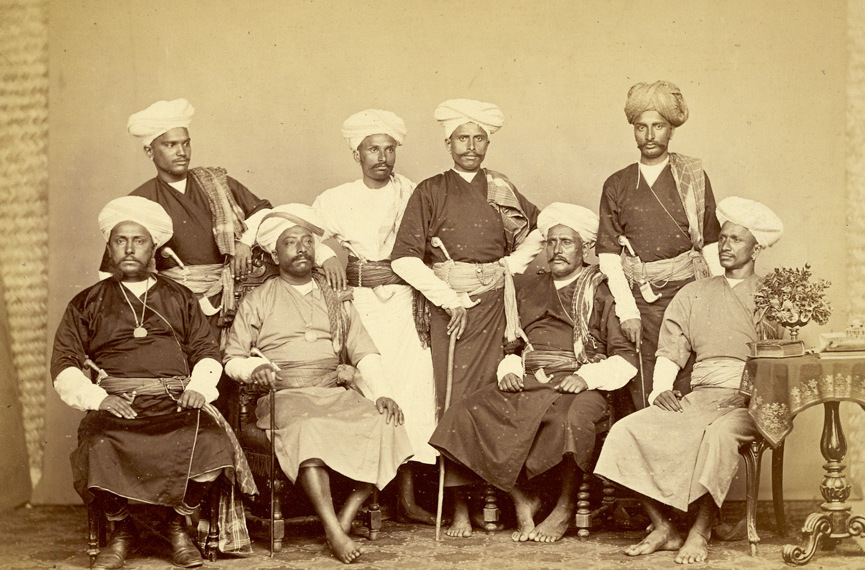
2500 BC - Present Tribal History: Looking for the Origins of the Kodavas -
2200 BC to 600 AD 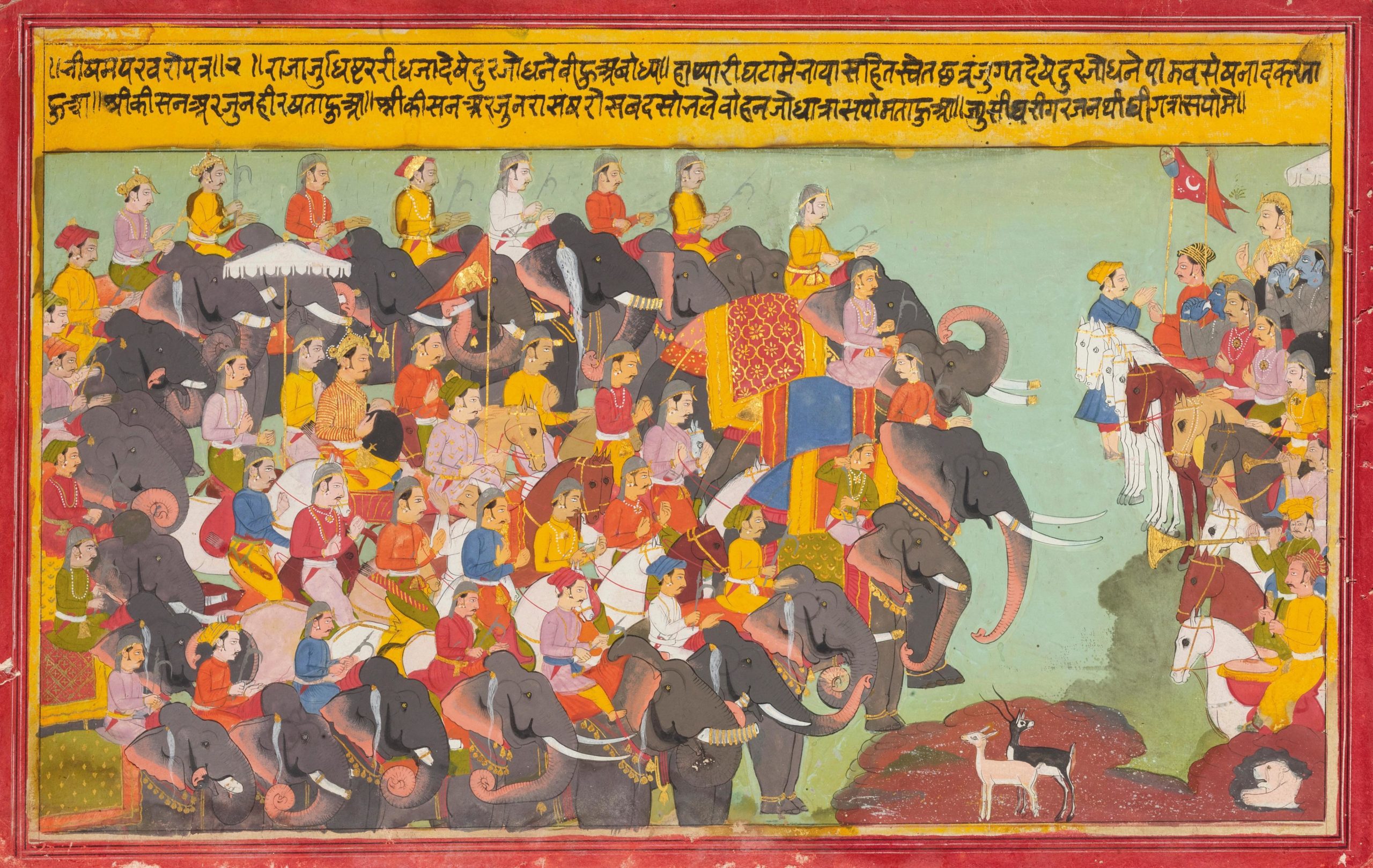
2200 BC to 600 AD War, Political Violence and Rebellion in Ancient India -
400 BC to 1001 AD 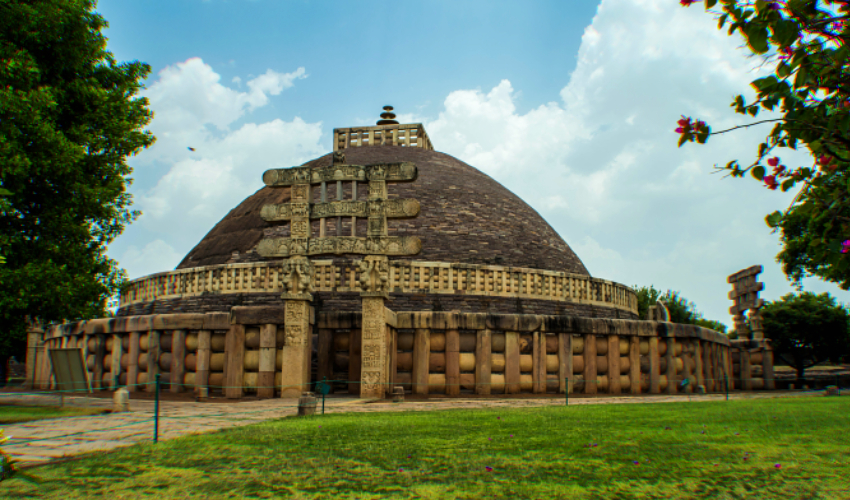
400 BC to 1001 AD The Dissent of the ‘Nastika’ in Early India -
600CE-1200CE 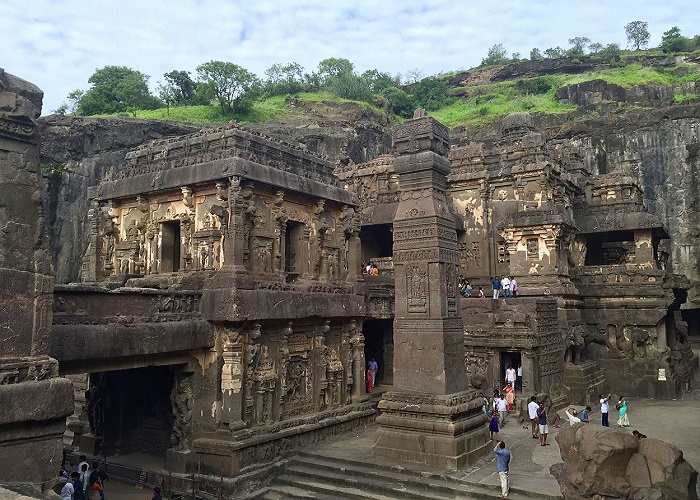
600CE-1200CE The Other Side of the Vindhyas: An Alternative History of Power -
c. 700 - 1400 AD 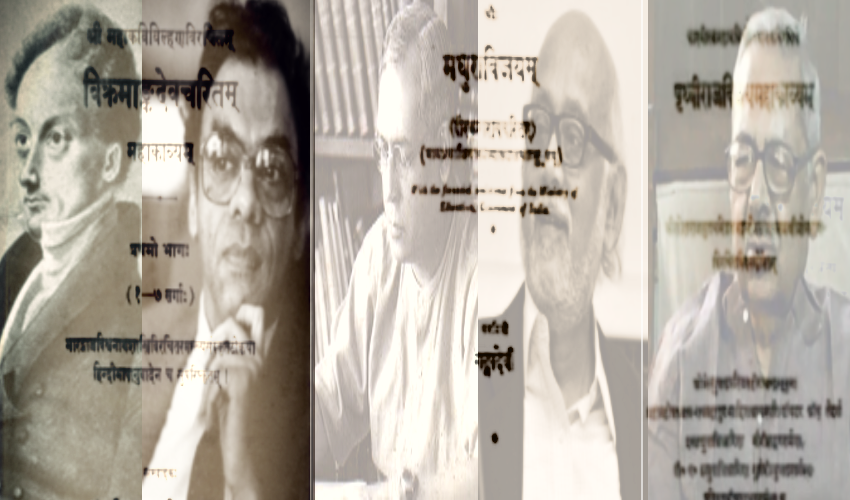
c. 700 - 1400 AD A Historian Recommends: Representing the ‘Other’ in Indian History -
c. 800 - 900 CE 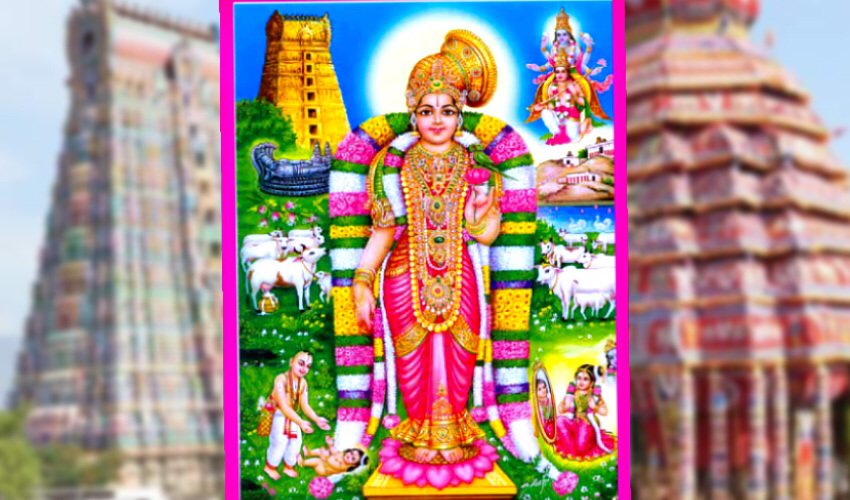
c. 800 - 900 CE ‘Drape me in his scent’: Female Sexuality and Devotion in Andal, the Goddess -
1192 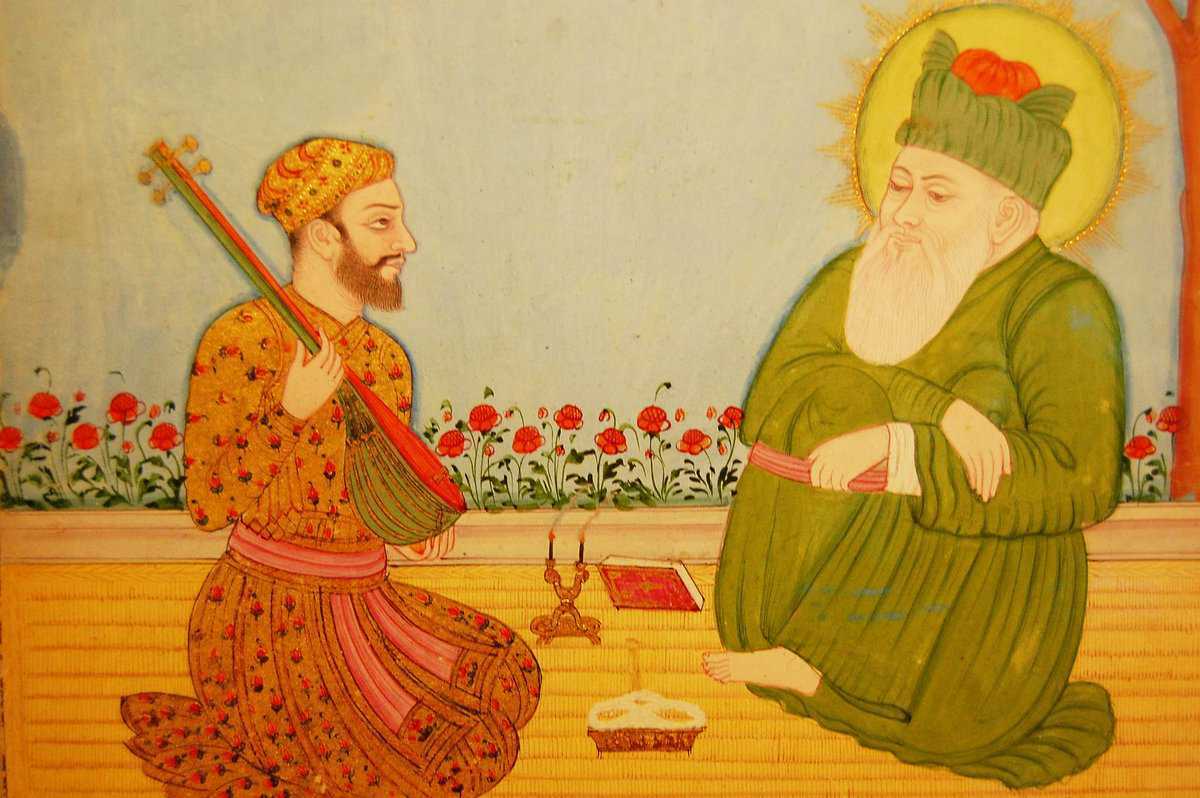
1192 Sufi Silsilahs: The Mystic Orders in India -
1200 - 1850 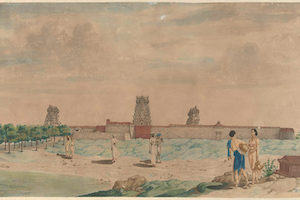
1200 - 1850 Temples, deities, and the law. -
c. 1500 - 1600 AD 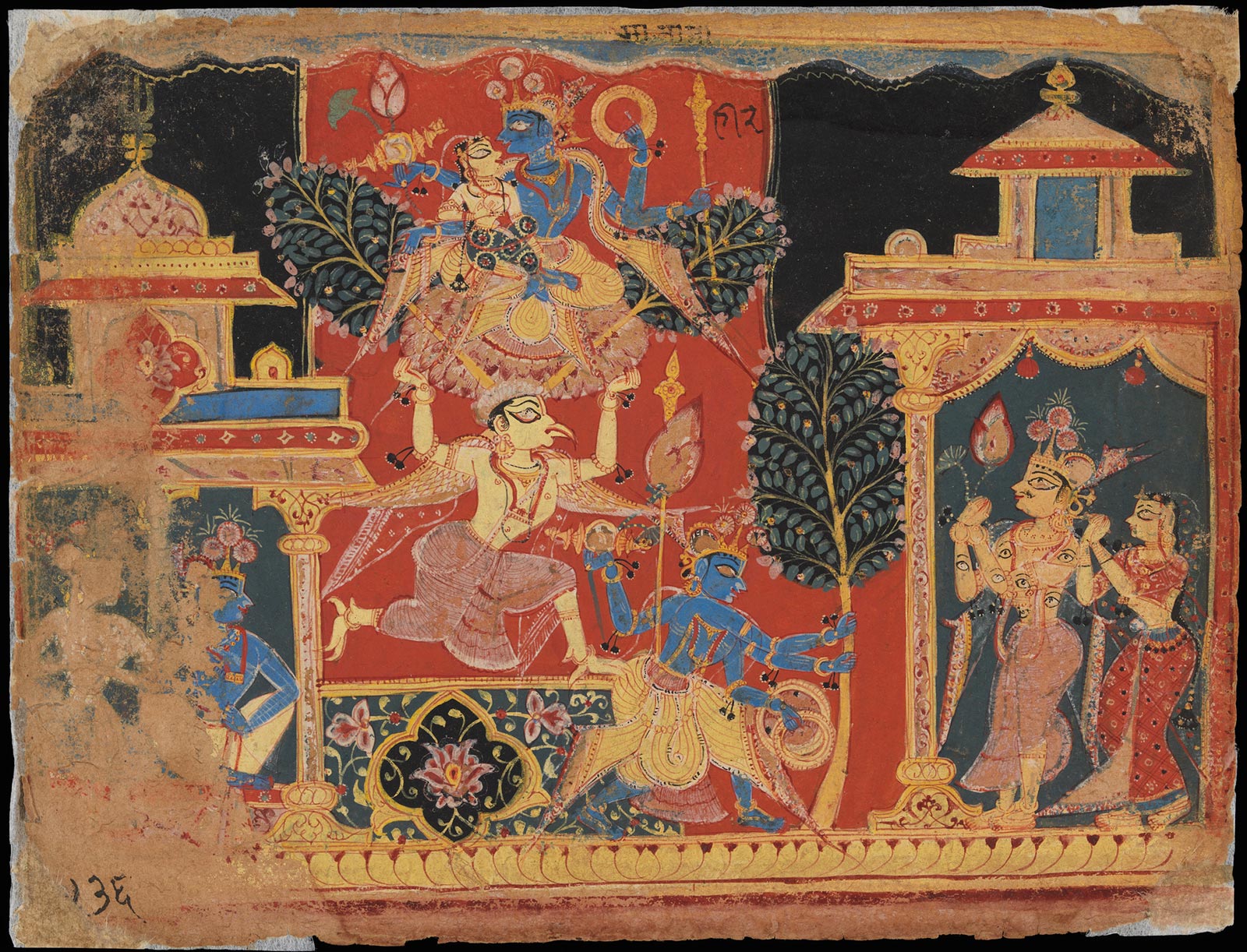
c. 1500 - 1600 AD A Historian Recommends: Religion in Mughal India -
1200-2020 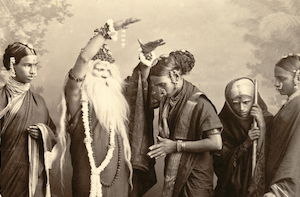
1200-2020 Policing Untouchables and Producing Tamasha in Maharashtra -
1530-1858 
1530-1858 Rajputs, Mughals and the Handguns of Hindustan -
1575 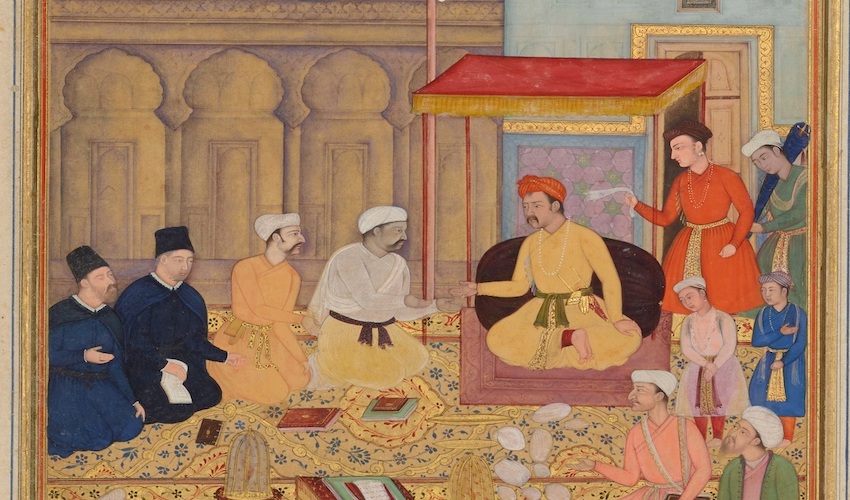
1575 Abdul Qadir Badauni & Abul Fazl: Two Mughal Intellectuals in King Akbar‘s Court -
1579 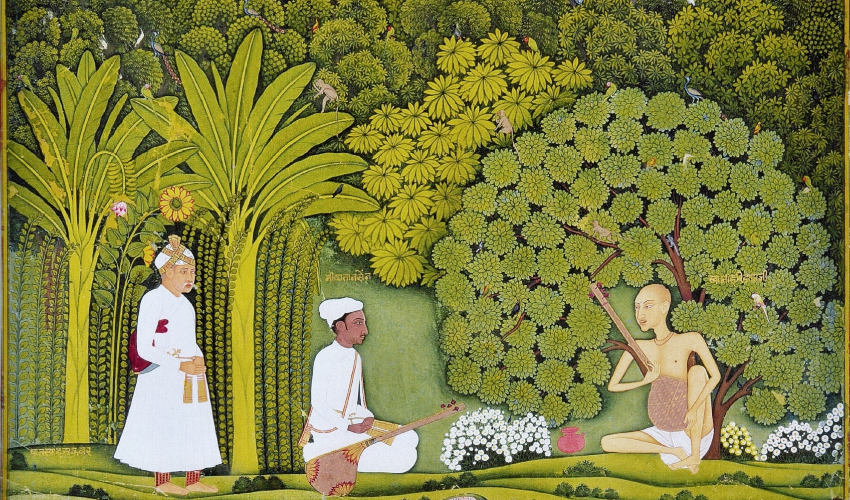
1579 Padshah-i Islam -
1550-1800 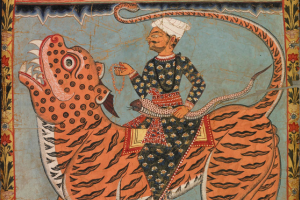
1550-1800 Who are the Bengal Muslims? : Conversion and Islamisation in Bengal -
c. 1600 CE-1900 CE 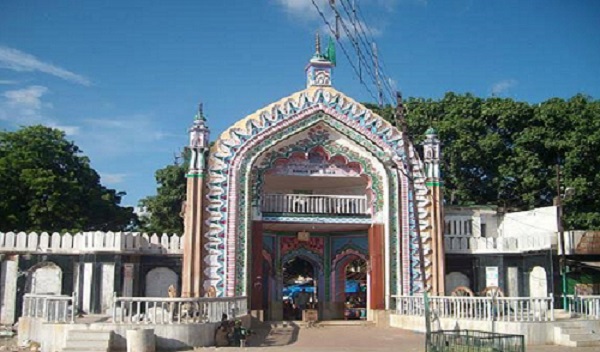
c. 1600 CE-1900 CE The Birth of a Community: UP’s Ghazi Miyan and Narratives of ‘Conquest’ -
1553 - 1900 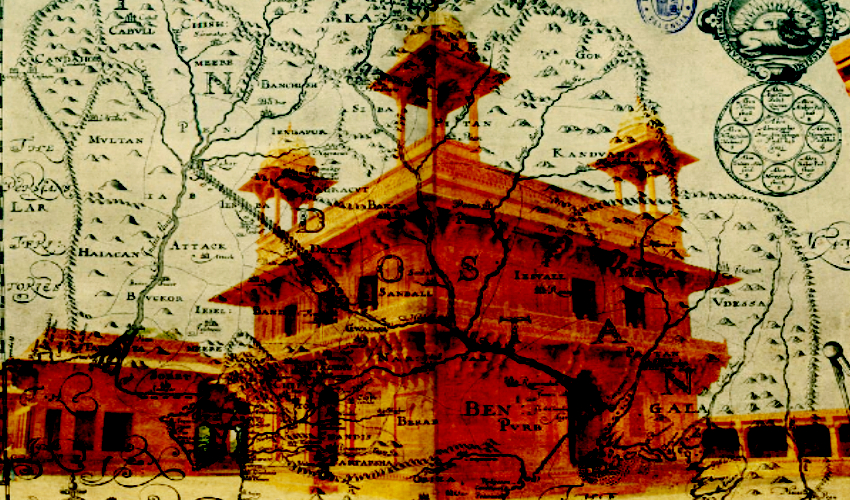
1553 - 1900 What Happened to ‘Hindustan’? -
1630-1680 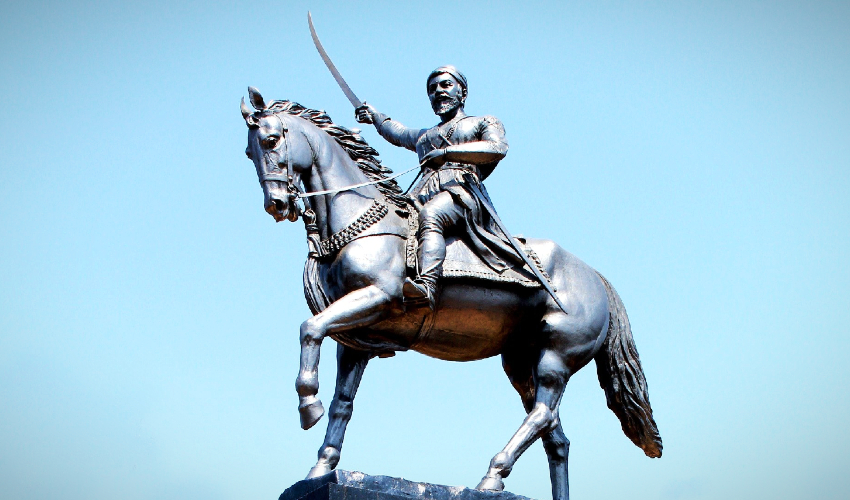
1630-1680 Shivaji: Hindutva Icon or Secular Nationalist? -
1630 -1680 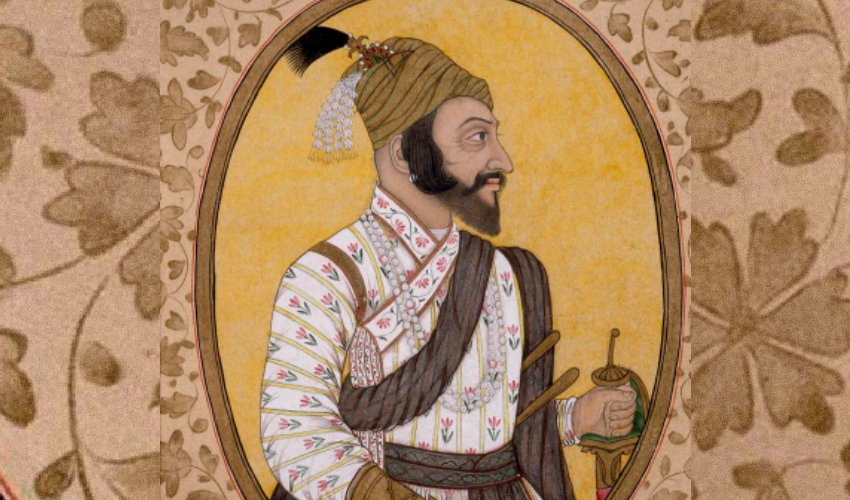
1630 -1680 Shivaji: His Legacy & His Times -
c. 1724 – 1857 A.D. 
c. 1724 – 1857 A.D. Bahu Begum and the Gendered Struggle for Power -
1818 - Present 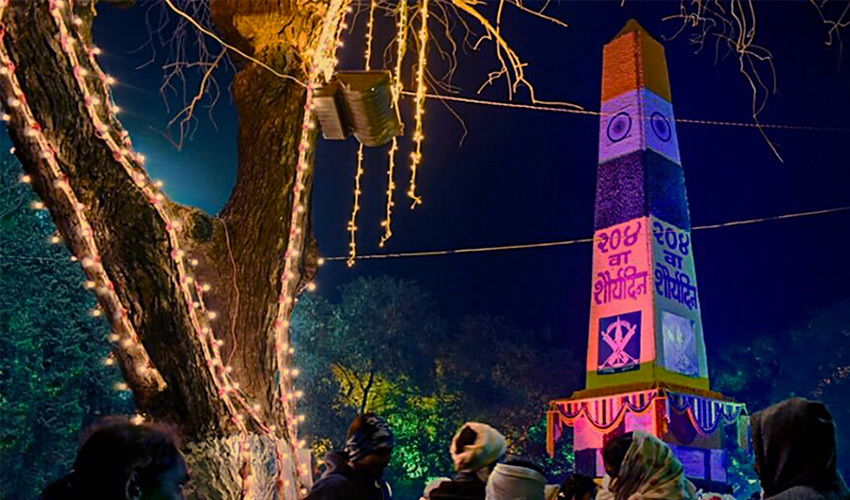
1818 - Present The Contesting Memories of Bhima-Koregaon -
1831 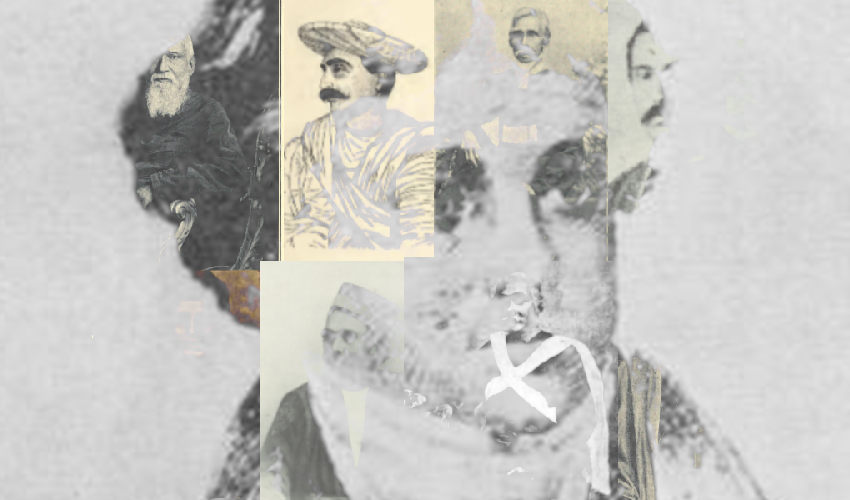
1831 The Derozians’ India -
1855 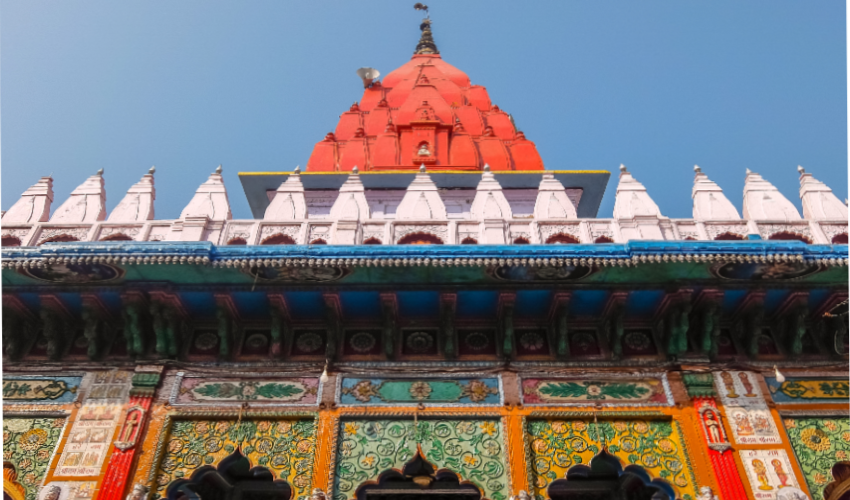
1855 Ayodhya 1855 -
1856 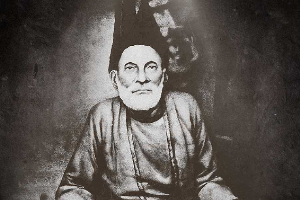
1856 “Worshipping the dead is not an auspicious thing” — Ghalib -
1857 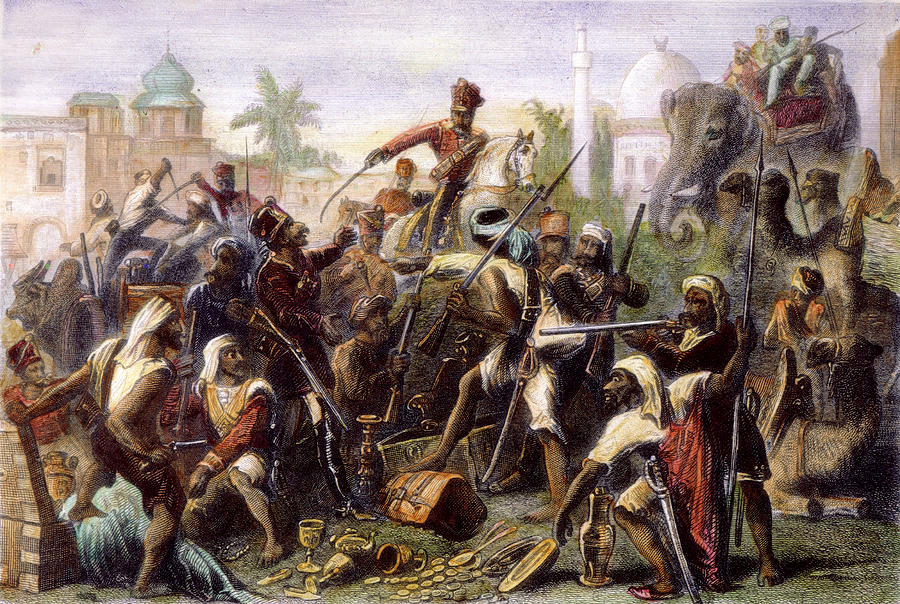
1857 A Subaltern speaks: Dalit women’s counter-history of 1857 -
1858 - 1976 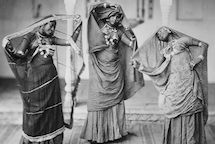
1858 - 1976 Lifestyle as Resistance: The Curious Case of the Courtesans of Lucknow -
1883 - 1894 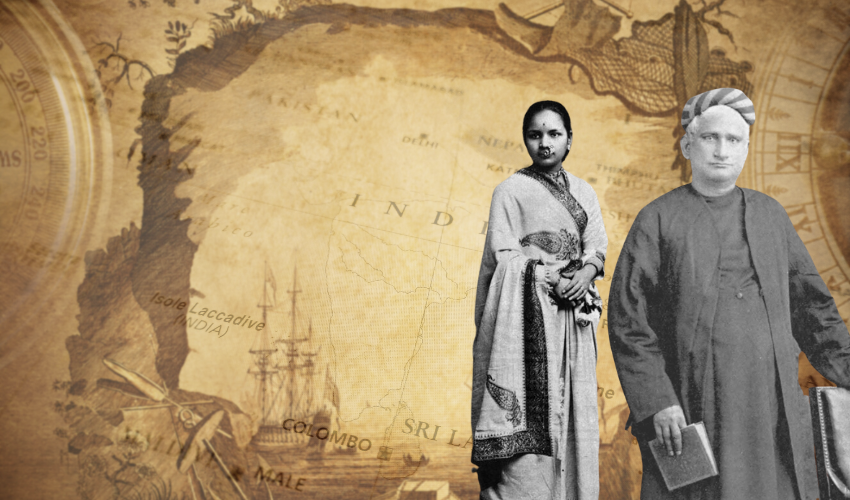
1883 - 1894 The Sea Voyage Question: A Nineteenth century Debate -
1887 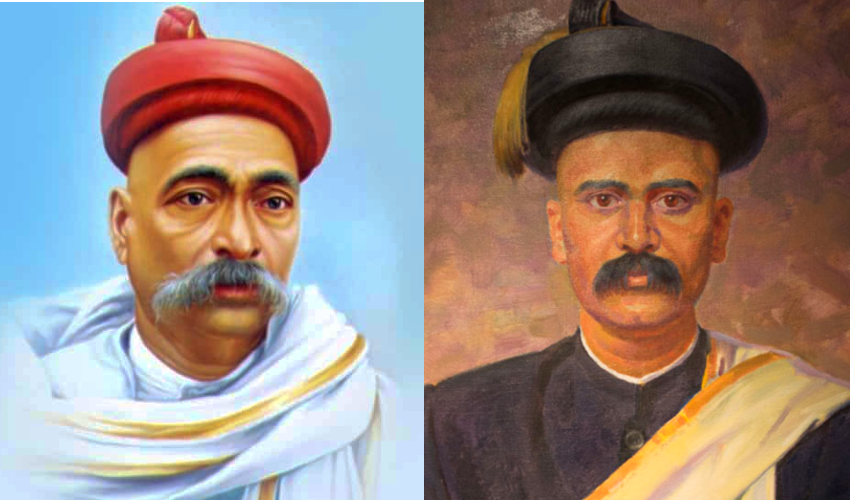
1887 The Great Debaters: Tilak Vs. Agarkar -
1893-1946 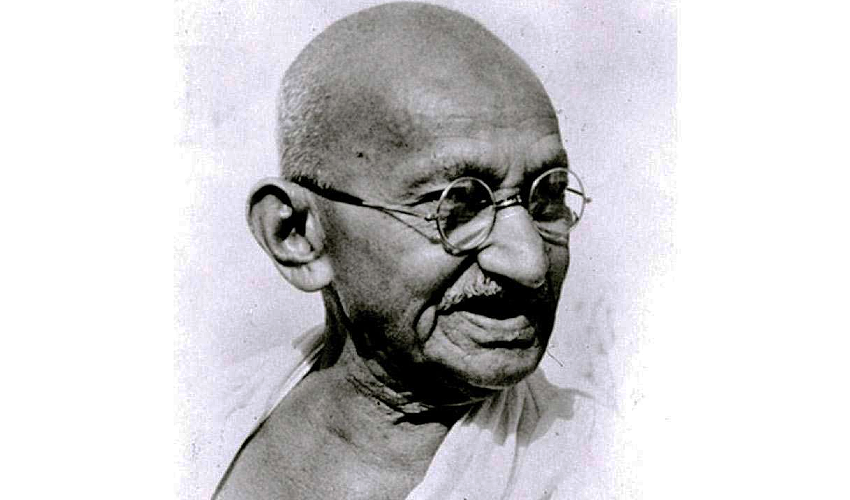
1893-1946 A Historian Recommends: Gandhi Vs. Caste -
1897 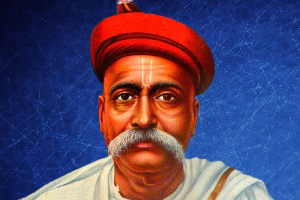
1897 Queen Empress vs. Bal Gangadhar Tilak: An Autopsy -
1913 - 1916 Modern Review 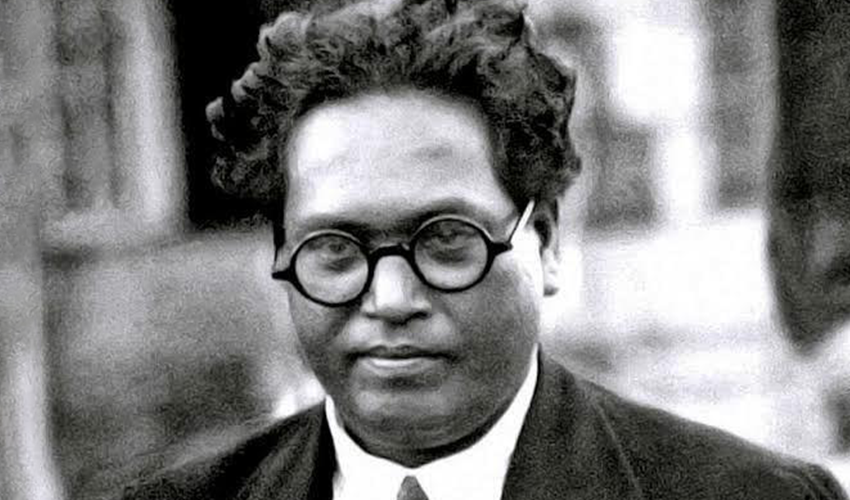
1913 - 1916 A Young Ambedkar in New York -
1916 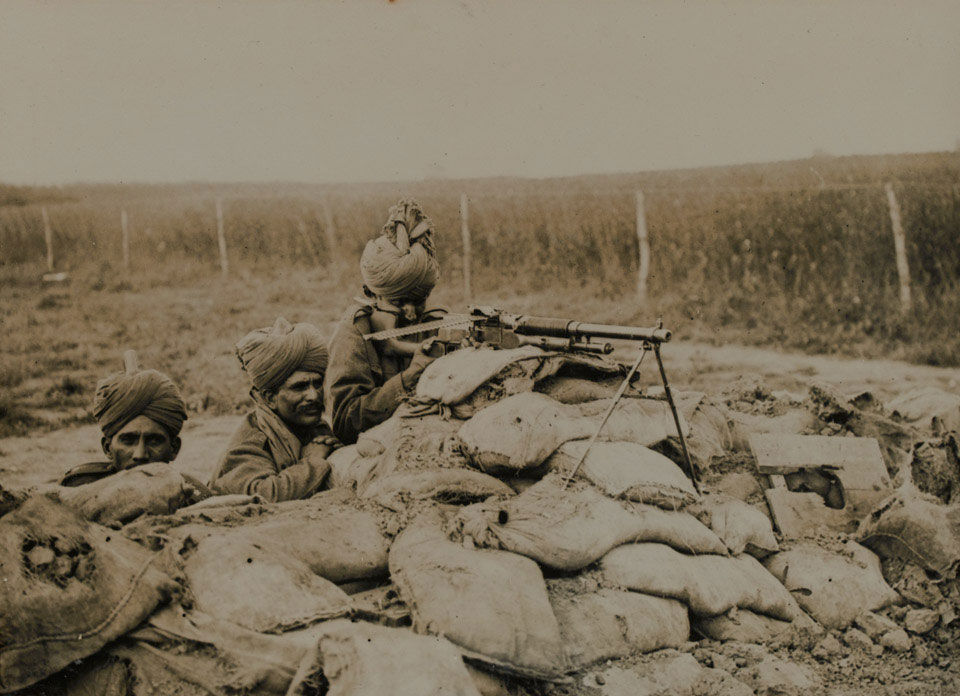
1916 A Rare Account of World War I by an Indian Soldier -
1917 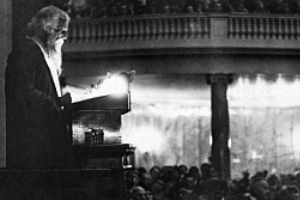
1917 On Nationalism, by Tagore -
1918 - 1919 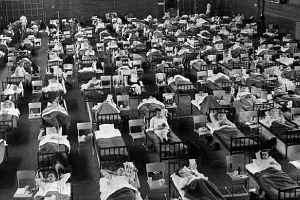
1918 - 1919 What Happened to the Virus That Caused the World’s Deadliest Pandemic? -
1920 - 1947 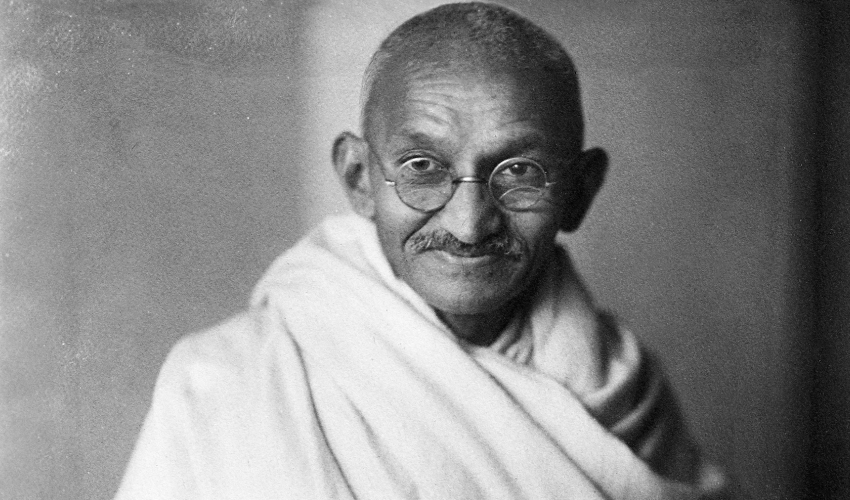
1920 - 1947 How One Should Celebrate Diwali, According to Gandhi -
1921 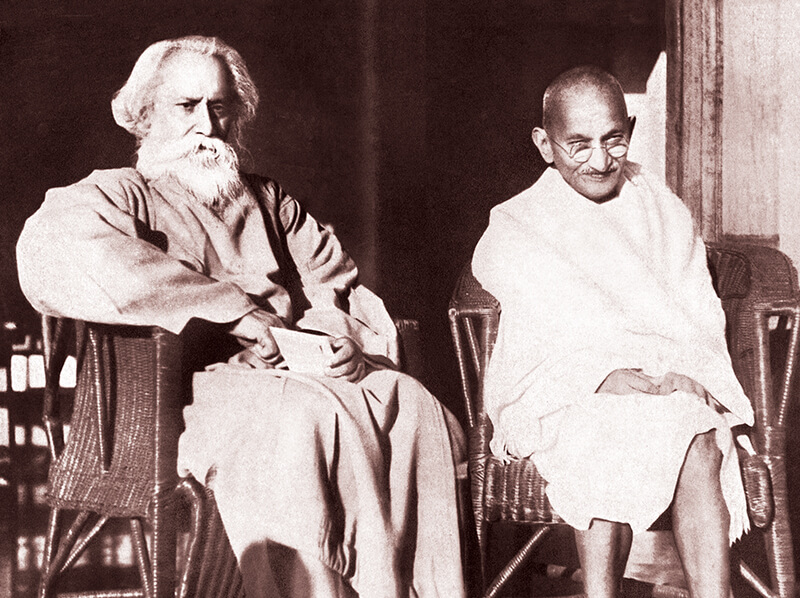
1921 Great Debates: Tagore Vs. Gandhi (1921) -
1921 - 2015 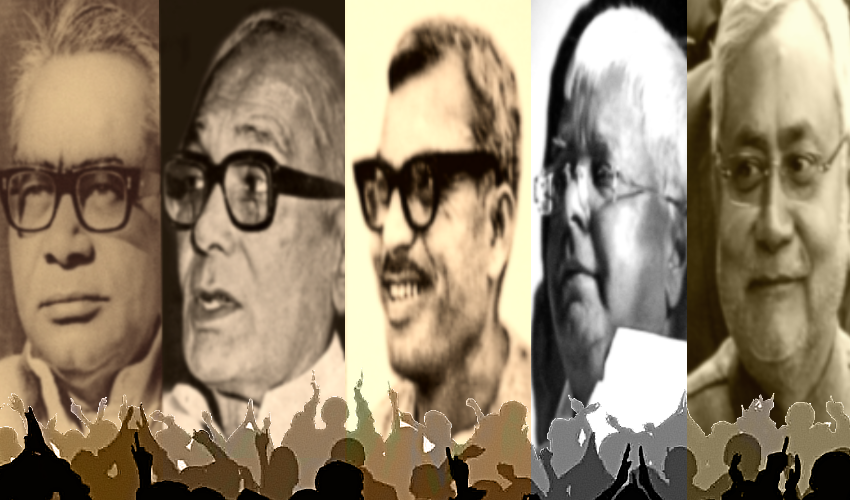
1921 - 2015 A History of Caste Politics and Elections in Bihar -
1915-1921 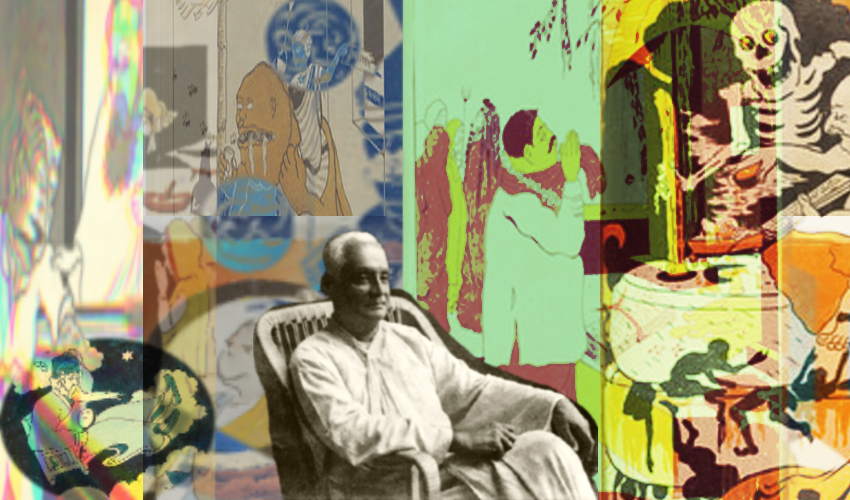
1915-1921 The Satirical Genius of Gaganendranath Tagore -
1924-1937 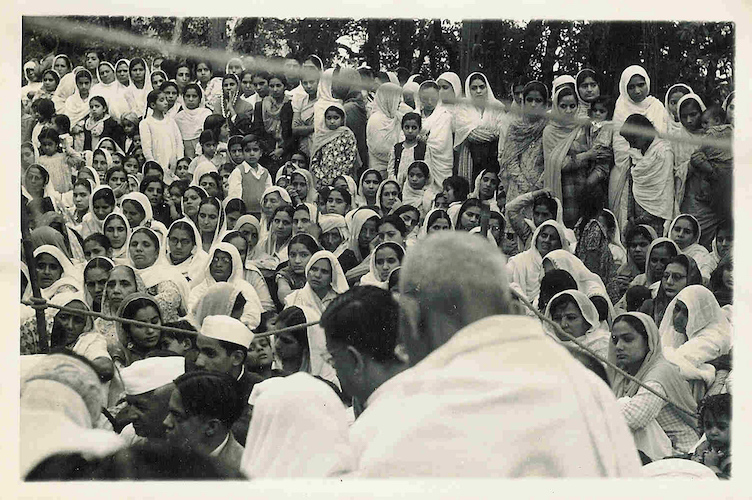
1924-1937 What were Gandhi’s Views on Religious Conversion? -
1900-1950 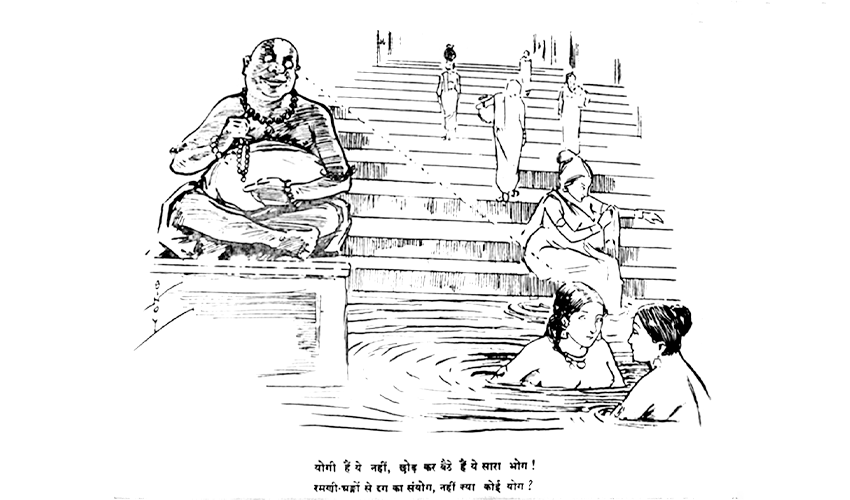
1900-1950 Gazing at the Woman’s Body: Historicising Lust and Lechery in a Patriarchal Society -
1925, 1926 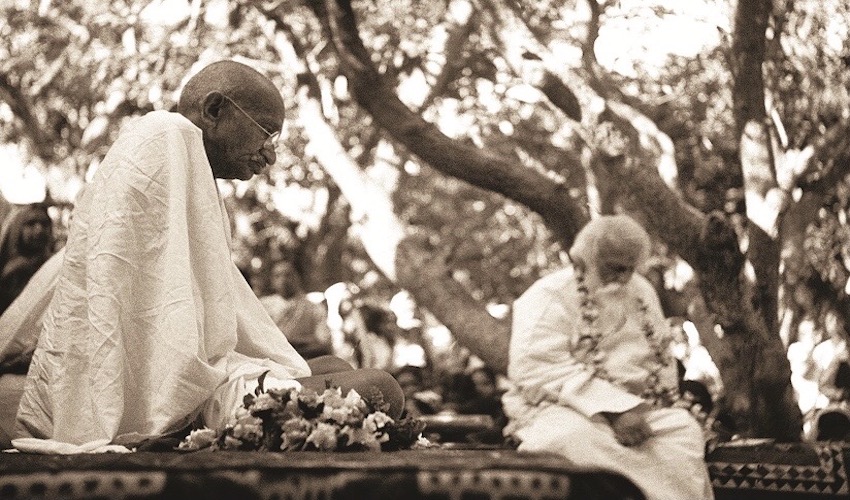
1925, 1926 Great Debates: Tagore vs Gandhi (1925-1926) -
1928 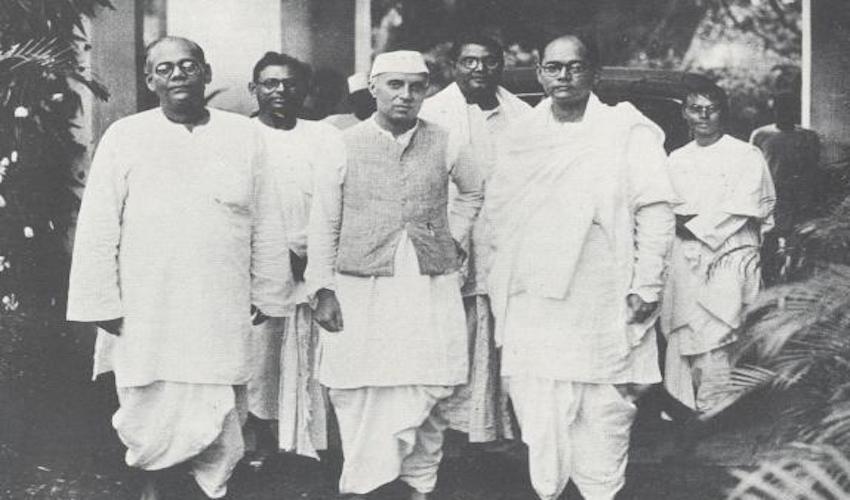
1928 Bhagat Singh’s dilemma: Nehru or Bose? -
1930 Modern Review 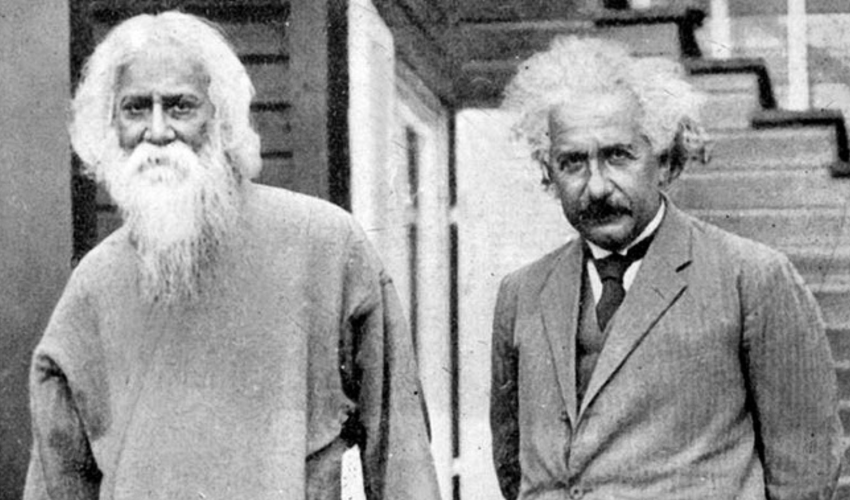
1930 The Modern Review Special: On the Nature of Reality -
1932 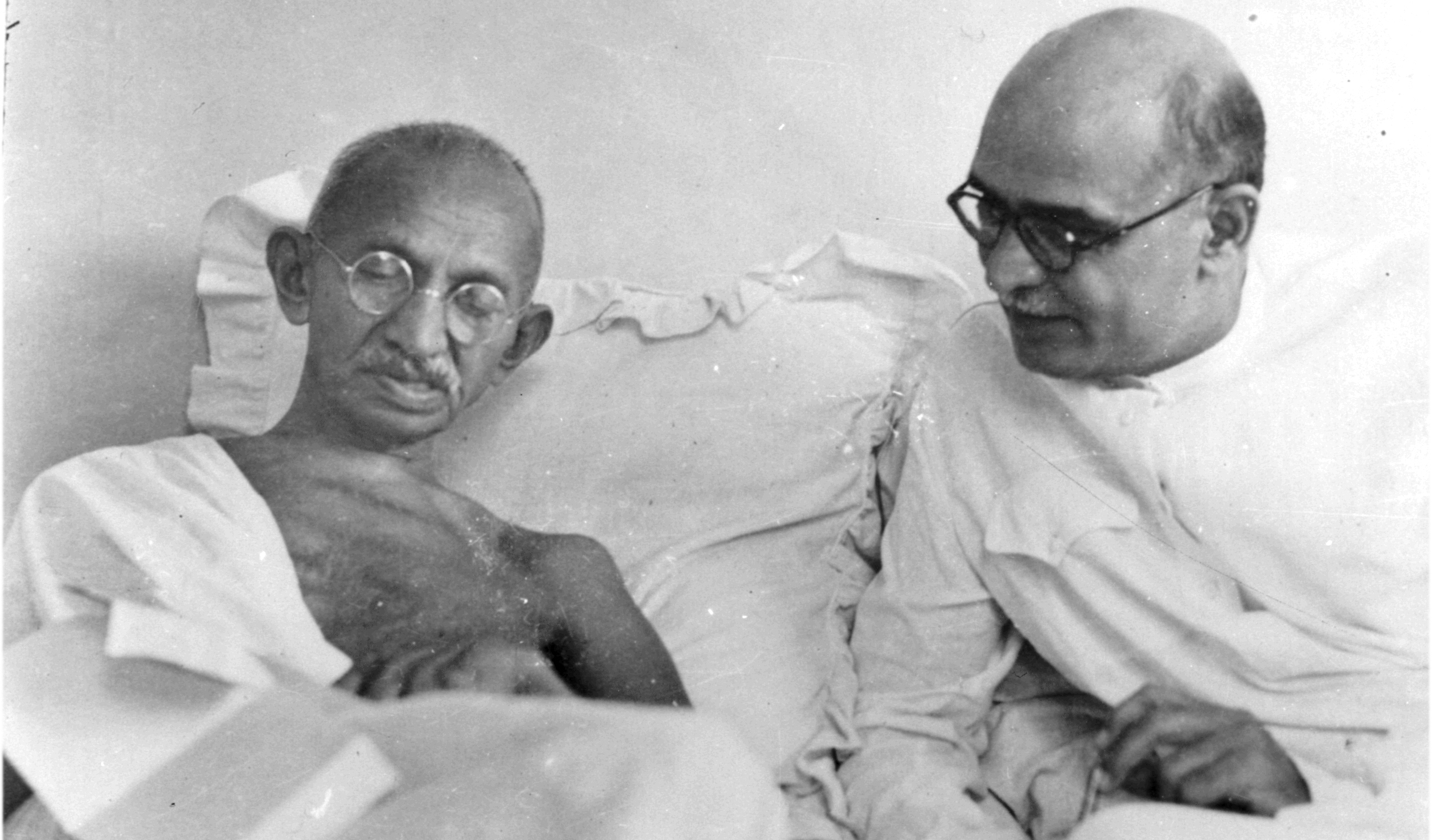
1932 Caste, Gandhi and the Man Beside Gandhi -
1933 - 1991 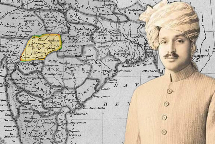
1933 - 1991 Raghubir Sinh: The Prince Who Would Be Historian -
1935 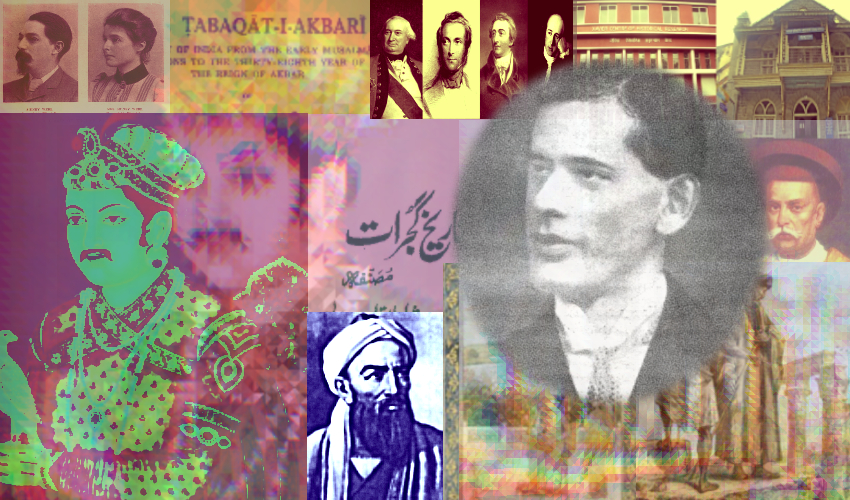
1935 A Historian Recommends: SA Khan’s Timeless Presidential Address -
1865-1928 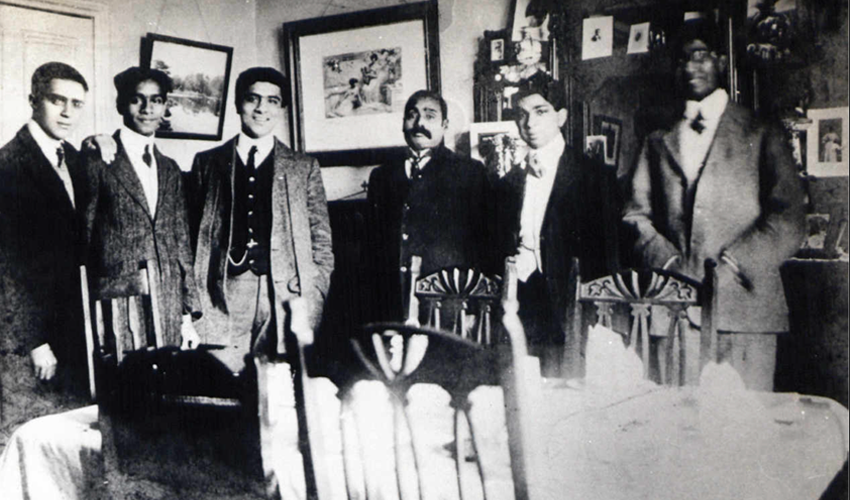
1865-1928 Understanding Lajpat Rai’s Hindu Politics and Secularism -
1935 Modern Review 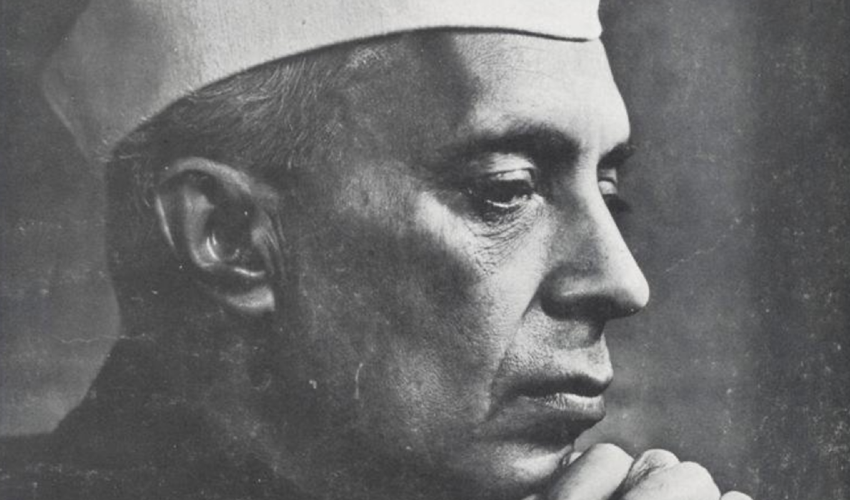
1935 The Modern Review Special: The Mind of a Judge -
1936 Modern Review 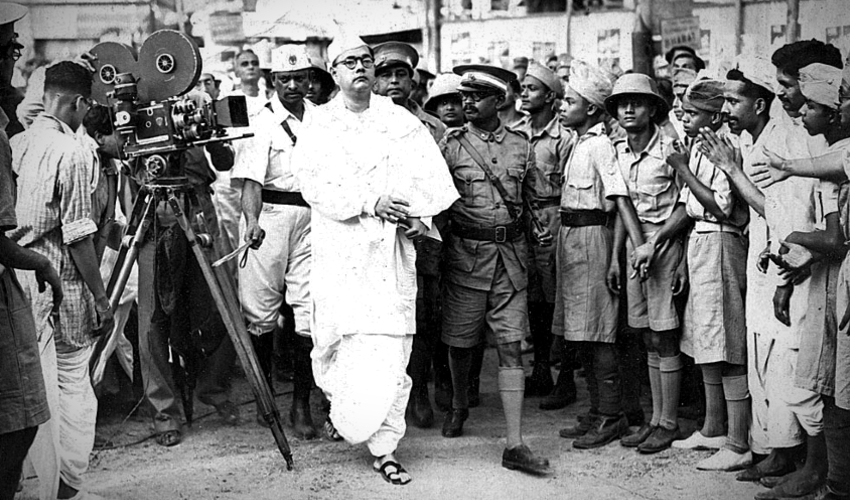
1936 The Modern Review Special: When Netaji Subhas Bose Was Wrongfully Detained for ‘Terrorism’ -
1936 
1936 Annihilation of Caste: Part 1 -
1936 Modern Review 
1936 The Modern Review Special: An Indian MP in the British Parliament -
1936 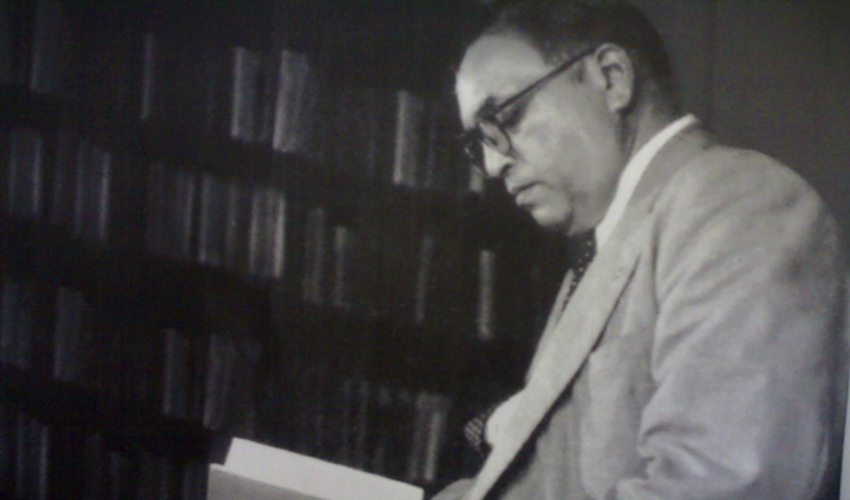
1936 Annihilation of Caste: Part 2 -
1936 
1936 A Reflection of His Age: Munshi Premchand on the True Purpose of Literature -
1936 Modern Review 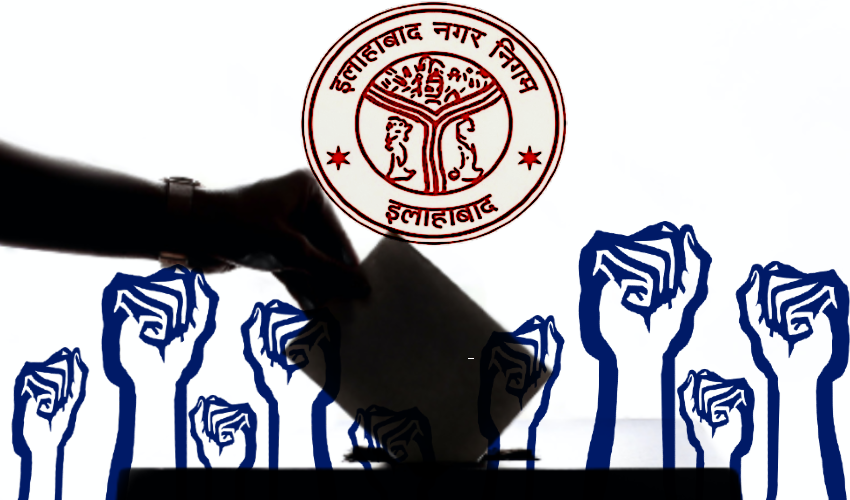
1936 The Modern Review Special: The Defeat of a Dalit Candidate in a 1936 Municipal Election -
1937 Modern Review 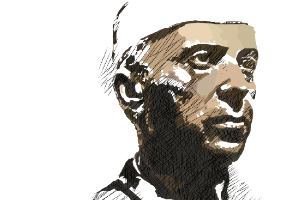
1937 The Modern Review Special: Rashtrapati -
1938 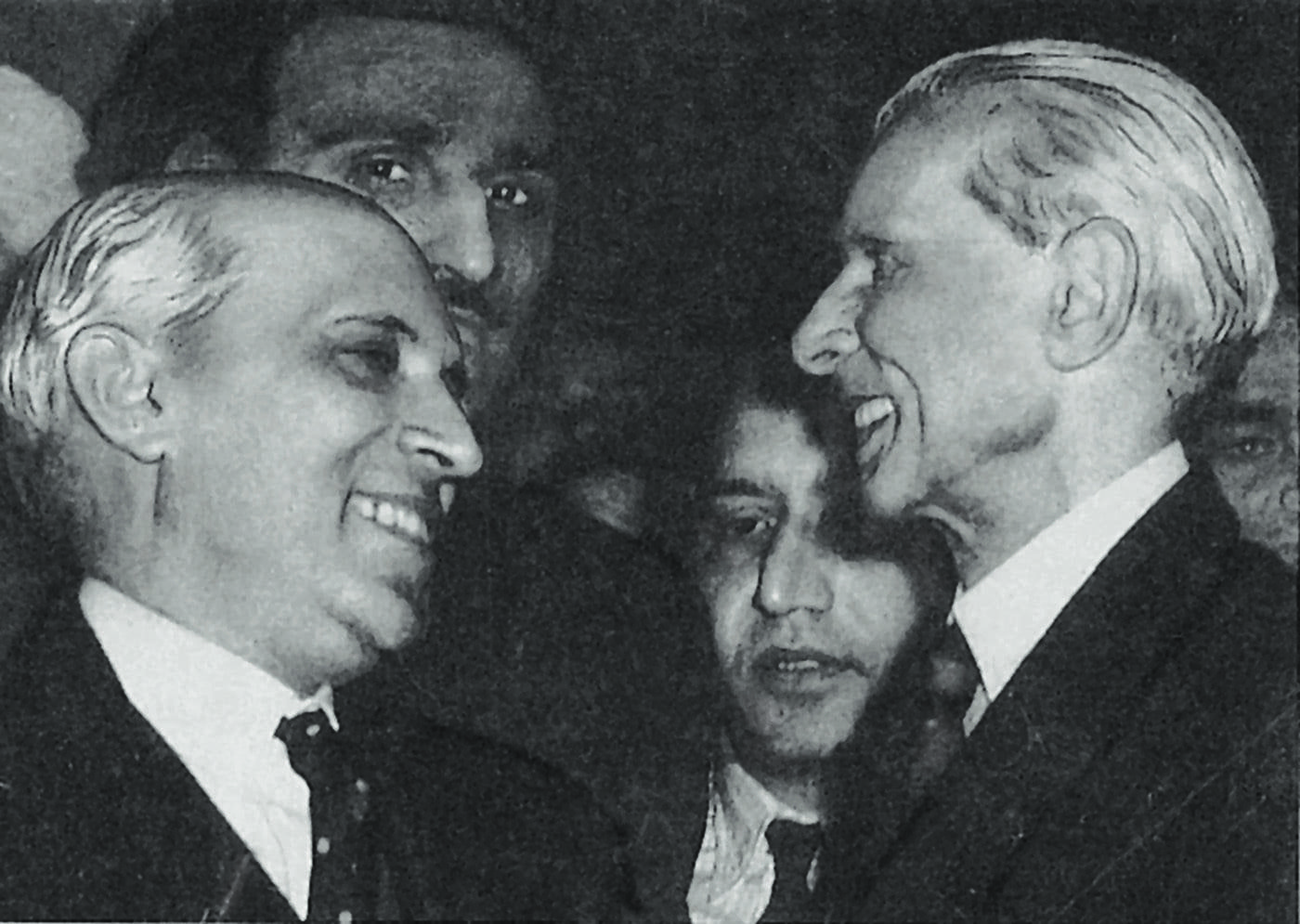
1938 Great Debates: Nehru Vs. Jinnah (1938) -
1942 Modern Review 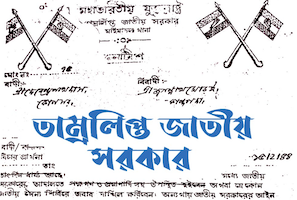
1942 IHC Uncovers: A Parallel Government In British India (Part 1) -
1942-1945 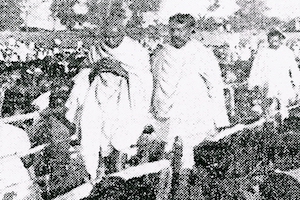
1942-1945 IHC Uncovers: A Parallel Government in British India (Part 2) -
1946 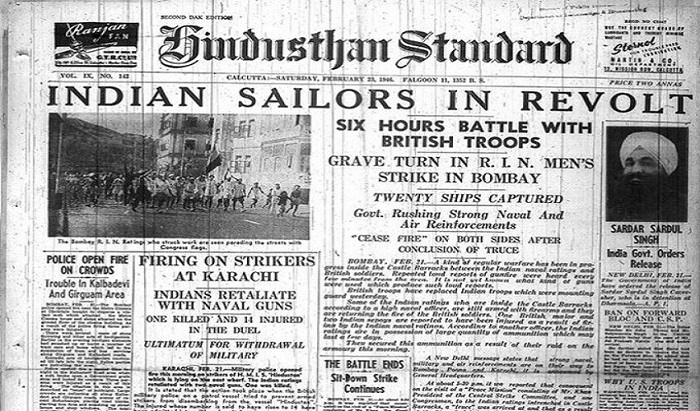
1946 Our Last War of Independence: The Royal Indian Navy Mutiny of 1946 -
1946 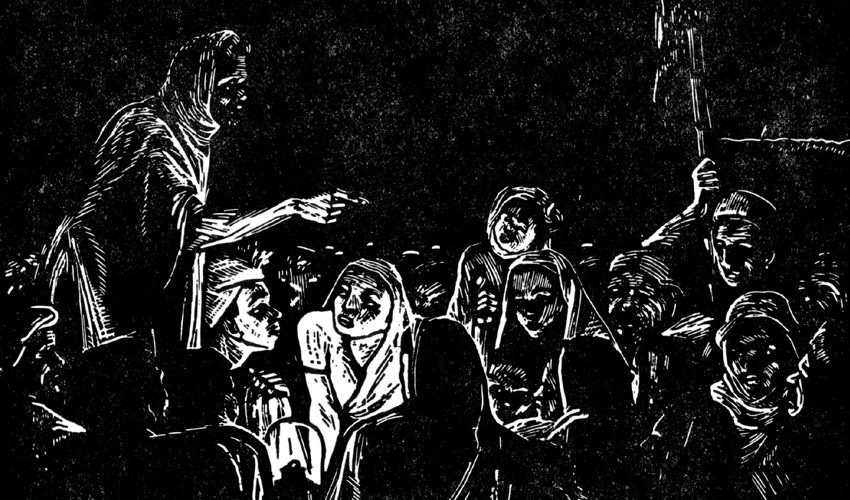
1946 An Artist’s Account of the Tebhaga Movement in Pictures And Prose -
1946 – 1947 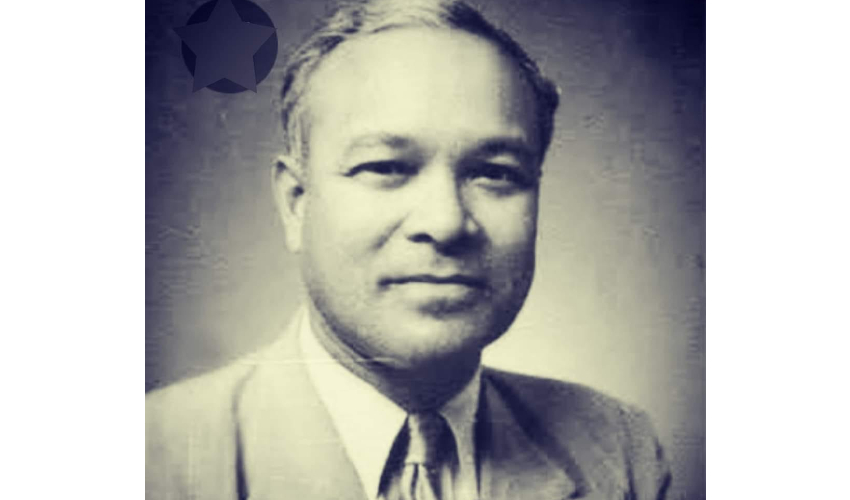
1946 – 1947 “The Most Democratic People on Earth” : An Adivasi Voice in the Constituent Assembly -
1946-1947 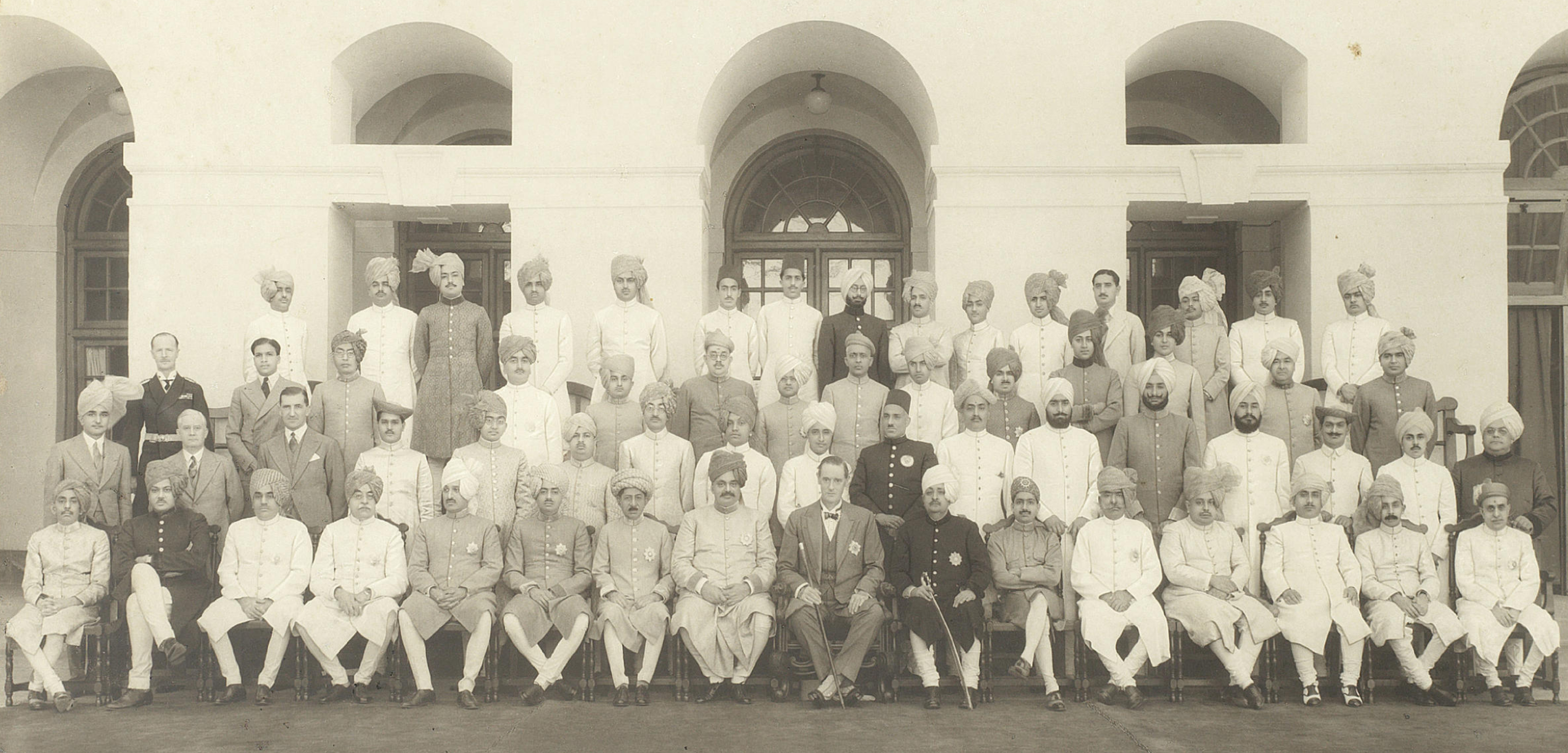
1946-1947 VP Menon and the Birth of Independent India -
1916 - 1947 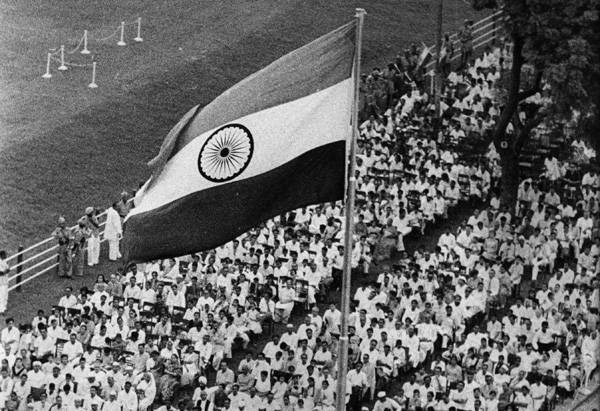
1916 - 1947 8 @ 75: 8 Speeches Independent Indians Must Read -
1947-1951 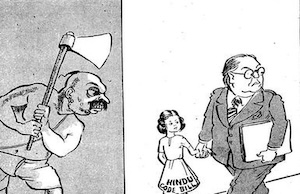
1947-1951 Ambedkar Cartoons: The Joke’s On Us -
1948 
1948 “My Father, Do Not Rest” -
1940-1960 
1940-1960 Integration Myth: A Silenced History of Hyderabad -
1948 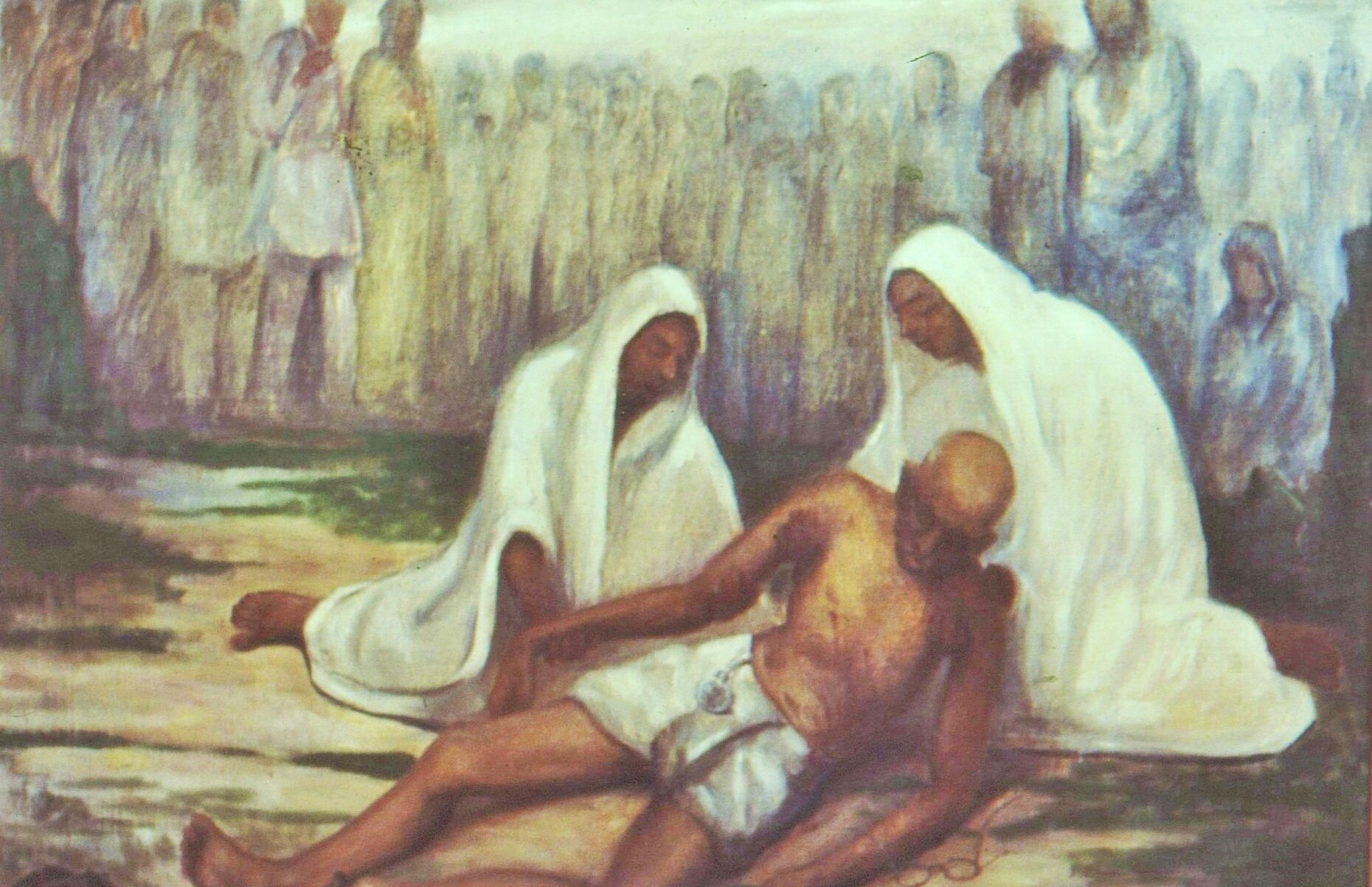
1948 The Assassination of a Mahatma, the Princely States and the ‘Hindu’ Nation -
1949 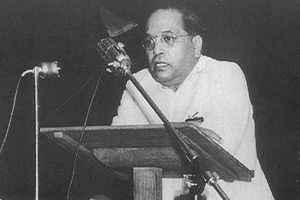
1949 Ambedkar warns against India becoming a ‘Democracy in Form, Dictatorship in Fact’ -
1950 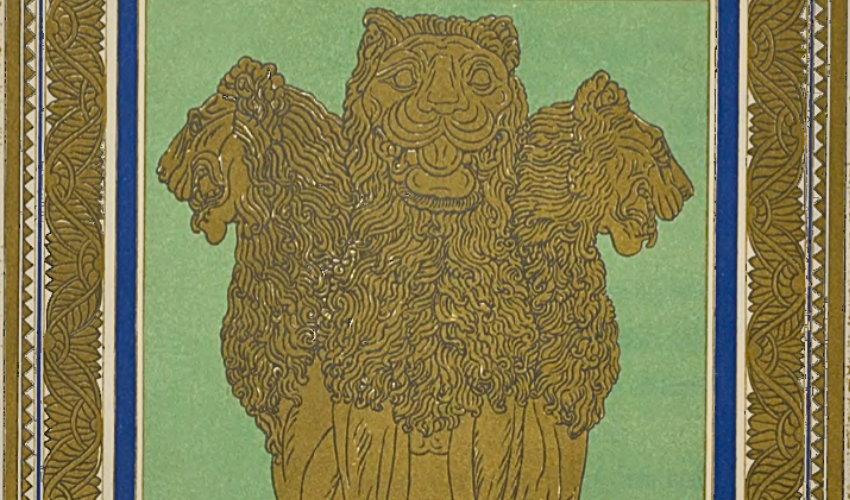
1950 Illustrations from the constitution -
1951 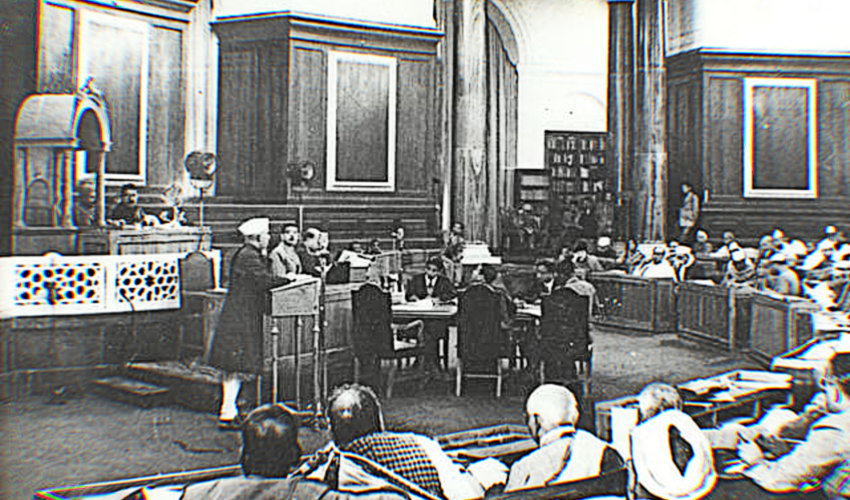
1951 How the First Amendment to the Indian Constitution Circumscribed Our Freedoms & How it was Passed -
1967 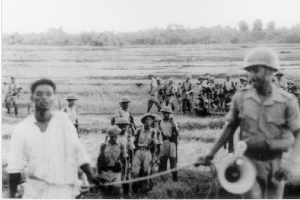
1967 Once Upon A Time In Naxalbari -
1970 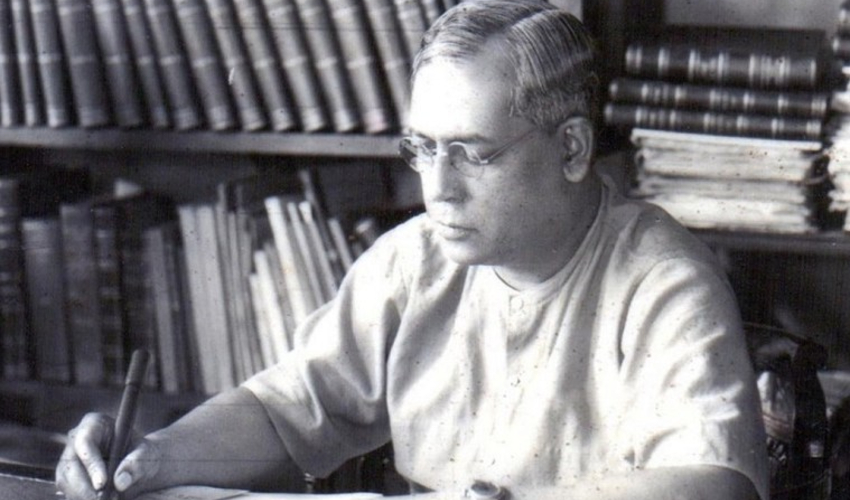
1970 R.C. Majumdar on Shortcomings in Indian Historiography -
1973 - 1993 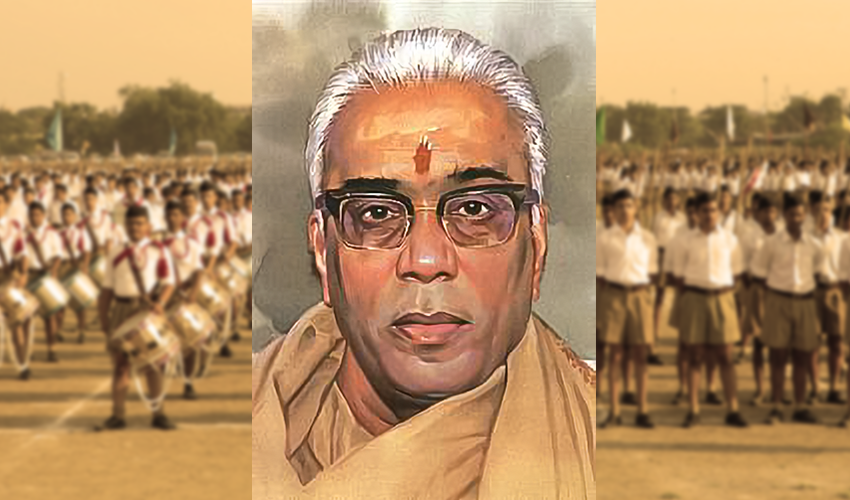
1973 - 1993 Balasaheb Deoras: Kingmaker of the Sangh -
1975 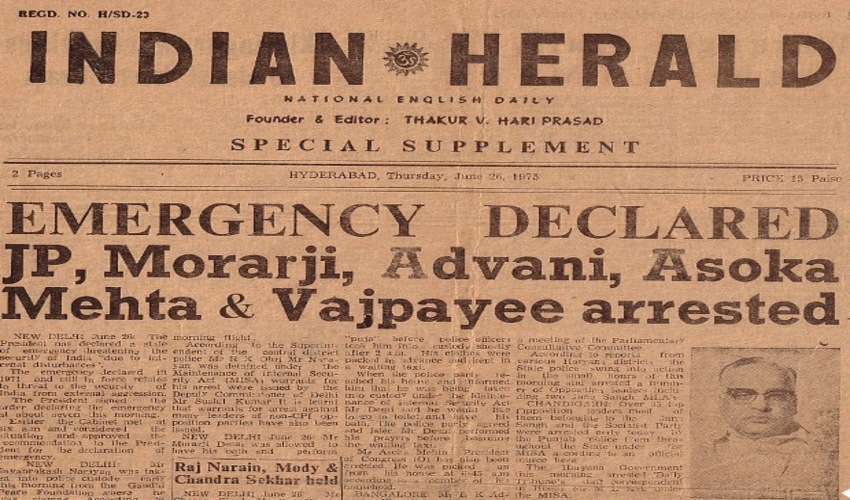
1975 The Emergency Package: Shadow Power -
1975 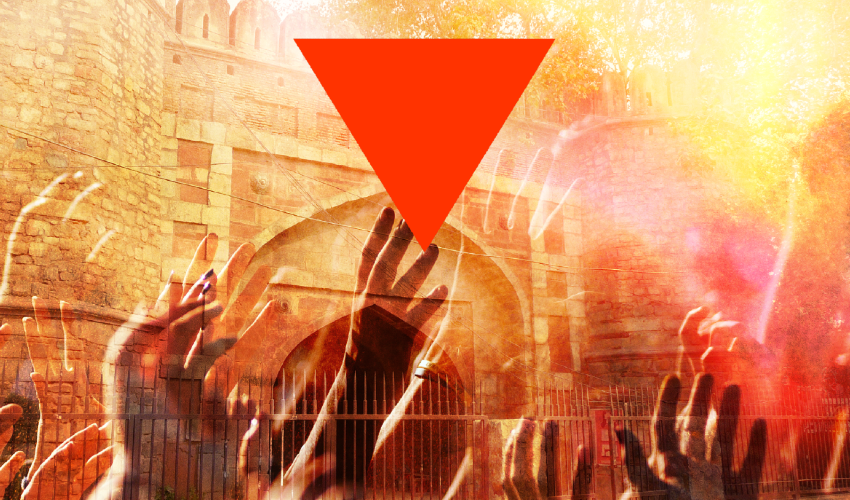
1975 The Emergency Package: The Prehistory of Turkman Gate – Population Control -
1977 – 2011 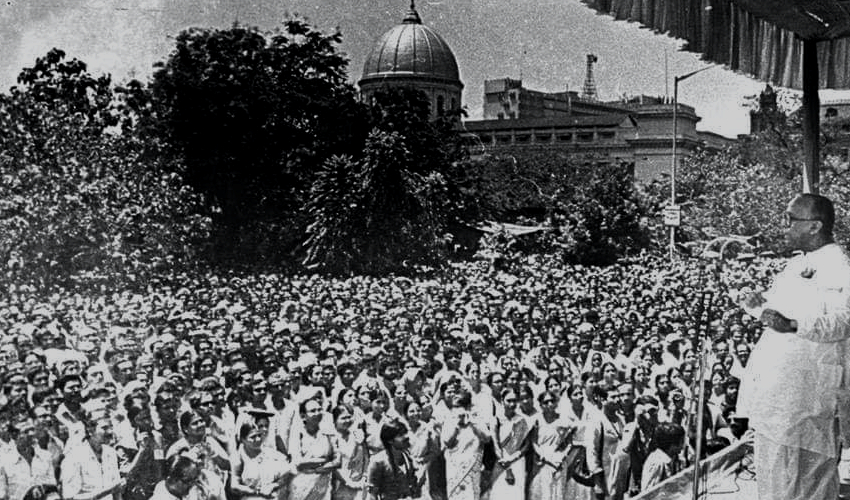
1977 – 2011 Power is an Unforgiving Mistress: Lessons from the Decline of the Left in Bengal -
1984 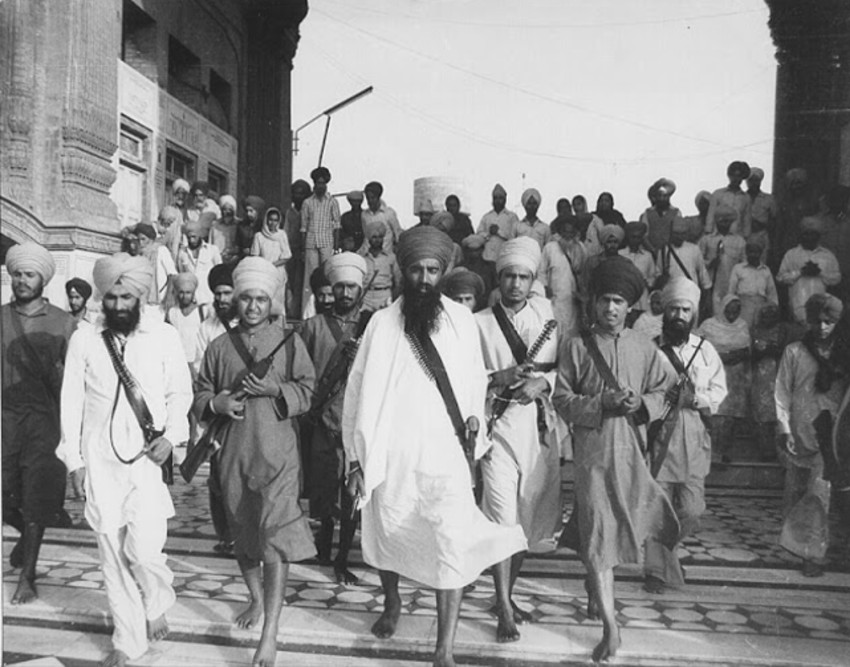
1984 Mrs Gandhi’s Final Folly: Operation Blue Star -
1916-2004 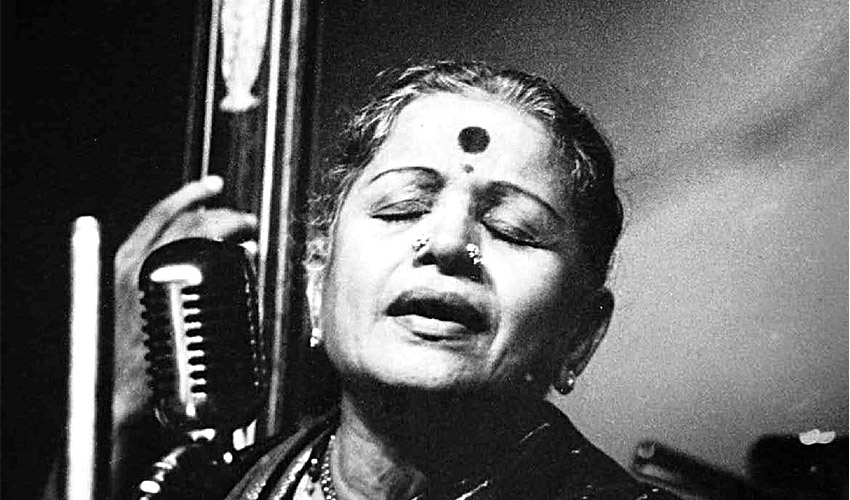
1916-2004 Amjad Ali Khan on M.S. Subbulakshmi: “A Glorious Chapter for Indian Classical Music” -
2008 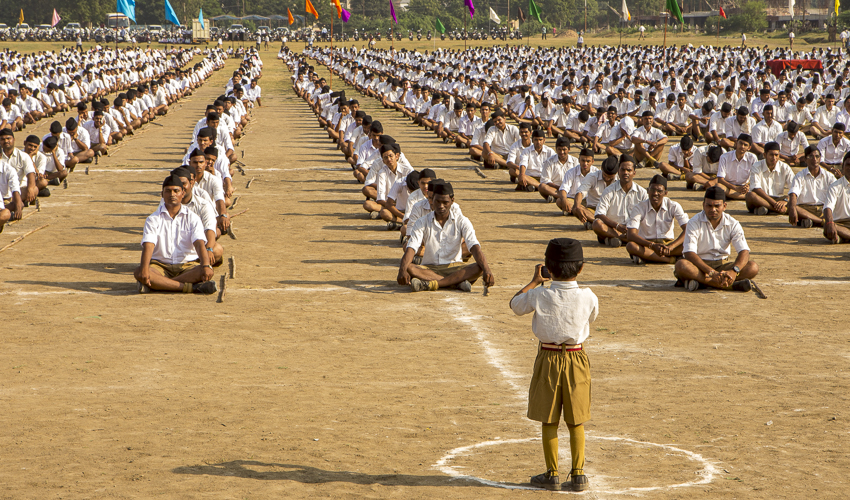
2008 Whose History Textbook Is It Anyway? -
2006 - 2009 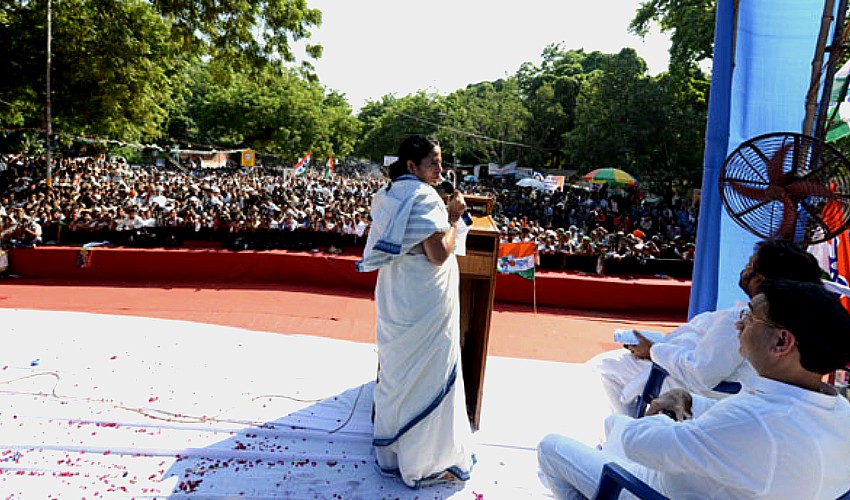
2006 - 2009 Singur-Nandigram-Lalgarh: Movements that Remade Mamata Banerjee -
2020 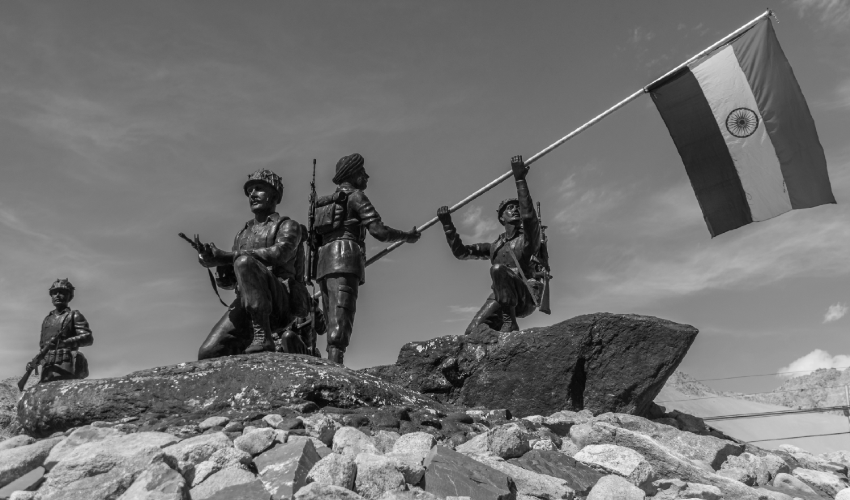
2020 The Indo-China Conflict: 10 Books We Need To Read -
2021 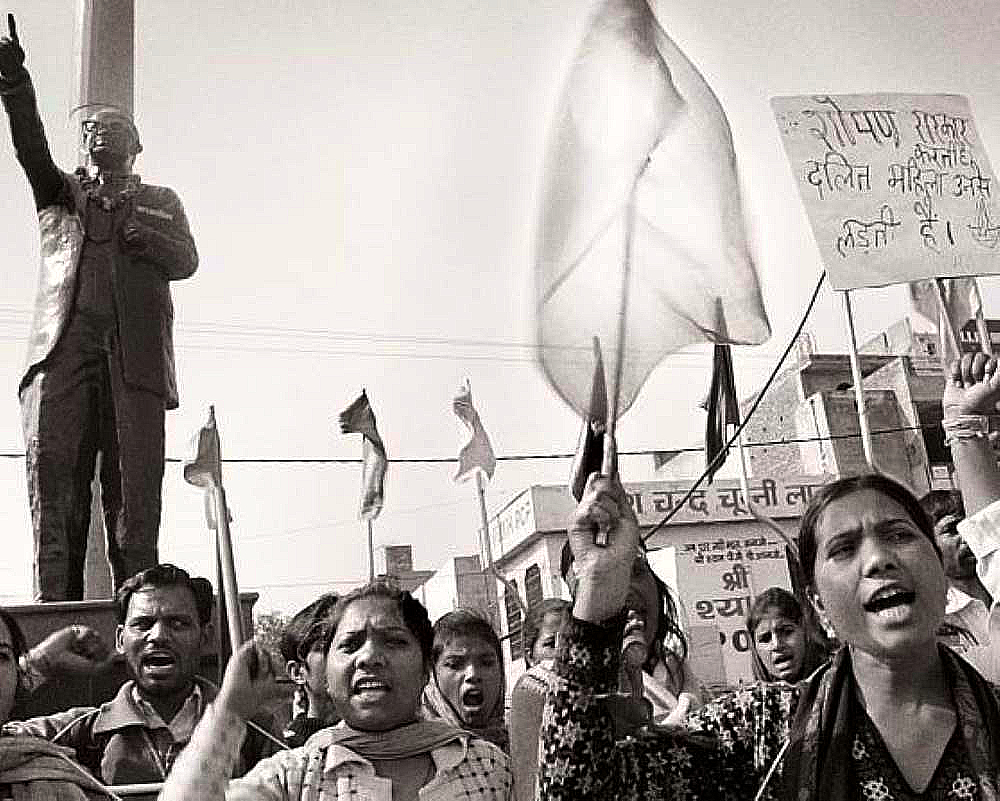
2021 Singing/Writing Liberation: Dalit Women’s Narratives

